 Where There's a Will
Where There's a Will
Shakespeareances Through the American Way
The Shakespeare Canon Project crisscrossed North America to see all 42 Shakespeare-penned plays at 42 different theaters in 2018—a year the 454-year-old playwright presciently depicted. Meanwhile, back home, a comic subplot twists into a mysterious drama.
Seeing every play in William Shakespeare's canon performed on stage is a bucket-list achievement for his fans.
Seeing every Shakespeare play in one year is a stunt.
Seeing all 42 Shakespeare plays each in a different theater in one year, that's insane, as more than one actor told me.
It's also revealing. What develops is Shakespeare's snapshot of America in 2018, his plays lining up with the year's headlines as Shakespeare himself embraces what it means to be American. Meanwhile, chaos comes into my own life during the journey. Seven plays into the quest, I take my wife to the emergency room during a snowstorm and soon discover that a more serious storm has been brewing inside her head.
Below is the real-time journal of this enterprise.
THE ITINERARY
Shakespeareances Announces Canon Project
Twelfth Night, or What You Will
Fiasco Theater
New York, New York, January 5
Hamlet
Shakespeare Miami
Miami, Florida, January 13
Richard II
American Shakespeare Center
Staunton, Virginia, January 27
Cymbeline (aka Imogen)
Pointless Theatre
Washington, D.C., February 10
Coriolanus
Brave Spirits Theatre
Alexandria, Virginia, February 10
Romeo and Juliet
Valley Shakespeare Festival
Shelton, Connecticut, February 15
The Merchant of Venice
Children's Shakespeare Theatre
Palisades, New York, March 3
Henry IV, Part 1
Southwest Shakespeare Company
Mesa, Arizona, March 29
Sir Thomas More (excerpt)
Night Shift's Drunken Shakespeare
New York City, April 16
Othello
Baltimore Shakespeare Factory
Baltimore, Maryland, April 21
Macbeth
Chicago Shakespeare Theater at Navy Pier
Chicago, Illinois, May 30
Much Ado About Nothing
Pigeon Creek Shakespeare Company
The Rose, Blue Lake Arts Camp, Michigan, June 2
Timon of Athens
Shakespeare in the Ruins
Winnipeg, Manitoba, June 5
The Comedy of Errors
Kentucky Shakespeare
Louisville, Kentucky, June 9
Pericles, Prince of Tyre
Sweet Tea Shakespeare
Fayetteville, North Carolina, June 15
King Lear
Shakespeare in the Vines
Temecula, California, June 22
The Winter's Tale
Shakespeare by the Sea
San Pedro, California, June 23
The Tempest
The Old Globe
San Diego, California, June 26
The Two Noble Kinsmen
Kingsmen Shakespeare Company
Thousand Oaks, California, June 30
The Merry Wives of Windsor
Fairbanks Shakespeare Theatre
Fairbanks, Alaska, Juy 7
Henry VI, Part 1
Utah Shakespeare Festival
Cedar City, Utah, July 10
Henry VI, Part 3
Taffety Punk Theatre Company
Folger Theatre, Washington, D.C., July 16
Antony and Cleopatra
Palm Beach Shakespeare Festival
Jupiter, Florida, July 19
King John
Texas Shakespeare Festival
Kilgore, Texas, July 21
Titus Andronicus
Shakespeare on the Saskatchewan
Saskatoon, Saskatchewan, July 25
As You Like It
Shakespeare by the Sea
St. John's, Newfoundland, July 28
All's Well That Ends Well
Ohio Shakespeare Festival
Akron, Ohio, August 3
Edward III
Colorado Shakespeare Festival
Boulder, Colorado, August 5
Arden of Faversham
Shakespeare at Winedale
Rount Top, Texas, August 10
Measure for Measure
American Players Theatre
Spring Green, Wisconsin, August 18
The Taming of the Shrew
First Folio Theatre
Oak Brook, Illinois, August 19
Henry VI, Part 2
National Asian American Theatre Company
New York, New York, August 25
Troilus and Cressida
Long Beach Shakespeare Company
Long Beach, California,
September 2
A Midsummer Night's Dream
Independent Shakespeare Company
Los Angeles, California,
September 2
Julius Caesar
Strratford Festival
Stratford, Ontario, September 12
The Two Gentlemen of Verona
Tennessee Shakespeare Company
Memphis, Tennessee,
September 22
Love's Labour's Lost
Oregon Shakespeare Festival
Ashland, Oregon, October 2
Richard III
upstart crow collective
Seattle, Washington, October 6
Henry VIII
Prenzie Players
Davenport, Iowa, October 12
Henry IV, Part 2
Atlanta Shakespeare Tavern
Atlanta, Georgia, October 20
The Spanish Tragedy
Hudson Shakespeare Company
Public Libraries in Montclair, Westfield, and South River, New Jersey, October
23-25
Friday, January 5—The Well-Worn Path
to Undiscovered Country
We're driving up the Jersey Turnpike. This used to be home for me. My father was a U.S. Air Force chaplain, and he was stationed at McGuire Air Force Base in central New Jersey during my high school years. My childhood finished up here.
One among the many times I've traversed this highway was on a bus. The Northern Burlington County Regional High School Drama Club was taking a field trip to the American Shakespeare Festival in Stratford, Connecticut, to see a production of William Shakespeare's Twelfth Night. My Shakespeareances started here.
I was not a member of the Drama Club—I had already launched my journalism career as editor of the high school newspaper and covering sports for the Bordentown Register-News. I was on this trip because my best friend, Mike, was the only guy going, and he wanted a bit of brotherhood for the road. I hated reading Julius Caesar in sophomore English, my only previous encounter with Shakespeare, and I had no knowledge of Twelfth Night. But hanging with Mike and a couple dozen girls seemed like a nice way to spend a Saturday. However, it was not Mike nor Sharon (a girl on the trip I would subsequently fall madly in love with) and not even Shakespeare that turned this into an extraordinary day.
It was Herman Munster. I didn't know it at the time, but at the other end of the bus trip was Fred Gwynne playing Sir Toby Belch in Shakespeare's play. I was a huge Munsters fan, and to see Herman right there, in person, and being more genially funny than he was on the TV show was a blow-away moment for this 16-year-old. "These clothes are good enough to drink in—and so be these boots, too," he said, pulling yet another hidden flask out of his boot as Maria stalked him around the stage intercepting his other drinking vessels in the play's third scene.
That was my first live production of a Shakespeare play. I've seen 493 since, including every play in the canon (the 36 First Folio plays plus Pericles and The Two Noble Kinsmen). Now I'm setting out to see all 42 Shakespeare plays—the 38 of the traditional canon plus four plays of the "Shakespeare Apocrypha" in which scholarship has found his hand—in 42 different theaters across North America in this single year, 2018.
Poetic justice is served by a production of Twelfth Night leading off my campaign, but that was not intentional. This Shakespeare Canon Project is built around opportunity more than sentimentalism, piecing together a matrix of what I can see when and where, and how by whom. Even as I start this journey, I lack assurance that five of the plays will be staged, though many theaters have yet to announce their summer or fall seasons. Henry VIII is rarely done, the Part Twos of two other Henry plays have empty lines on my matrix as does another obscure piece, Cymbeline. One apocryphal play is lacking, The Spanish Tragedy. The surprising absence in announced playbills is The Two Gentlemen of Verona, a play frequently staged the past few years. Perhaps it has ridden out its cyclic wave of popularity as King John and Love's Labour's Lost ride in on their waves in 2018. Or perhaps the socially and politically omnipresent #MeToo movement's focus on sexual assault and harassment might be scaring theaters away from The Two Gentlemen of Verona, a slapstick comedy with stalking and rape as plot points.
That, however, is the exact kind of context, specific to 2018 (as opposed to, say, 1600, the midpoint of Shakespeare's playwriting career), that this journey intends to engage through Shakespeare's plays. His works also titillate personal relevancy, pertinent especially at this particular stage of my life. I turn 60 this year; I'm entering Jacques' sixth age of man's mortality, shifting "into the lean and slippered pantaloon." I'm the father of two sons. The eldest is a Shakespearean actor in New York already playing old geezer roles. The youngest just announced his impending marriage in the fall in Seattle. They are the products of my first marriage. My second marriage, to a now-retired Air Force officer, Sarah, will enter its 26th year of bliss thiss summer.
And here I am reflecting on my first Twelfth Night 44 years ago that set me on the way to where I am today, heading up the Jersey Turnpike once again to see Twelfth Night—the 27th time I will have seen that play.
Sentiment of another kind made this Twelfth Night my first pick for this yearlong excursion through America's Shakespearean landscape. This time I know what's at the other end of the road: Fiasco.
Twelfth Night, Fiasco Theater
Classic Stage Company, New York, New York, January 5
Approaching New York City—by plane, by train, or, as now, by car—always thrills me. During the day, you're navigating a cat's cradle of roads while speed-reading highway signs when skyscrapers suddenly sprout up from the horizon beyond the Jersey swamps. At night, New York emerges from the distance as a galaxy of lights, the red rocket-topped Empire State Building piercing through the middle of it all. I love New York City. I love its vibrancy, its attitude, its pace, its people—salt-of-the-earth kind of people, brusque as they go about their business but courteous to the core.
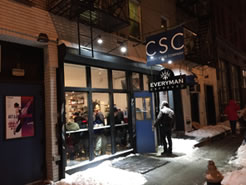
Classic Stage Company's entrance, 136 E 13th St., New York City, where Fiasco Theater is staging Shakespeare's Twelfth Night. Photo by Eric Minton.
New York is, of course, one of the world's capitals for theater. We come here a lot, but that's as much due to supply as quality. Broadway is famous, but we see Shakespeare as good or better in both talent and execution in regional theater or "the provinces" (which I'm here defining as anywhere outside a nonmajor metropolitan center; in America, "the provinces" is generally defined as anywhere but New York, Chicago, and Los Angeles; in New York it is defined as anywhere but New York). When we come to New York to see Shakespeare, it's usually at a theater (or even a space, like a parking lot) that is designated with one or more tags of Off before Broadway, or the production is a loaner from the world's other major capital for theater, London.
As inviting as we find this city, it is cold on this night: 15 degrees, snow piled along the sidewalks, and slush in the streets. Turn a corner and the temperature drops to well below zero as an arctic gust blasts your skin, even that covered in clothing. This is the day after a "bomb cyclone" hit the East Coast (meteorologists seem to come up with new names for "storm" every year), and even New Yorkers seem daunted by the bitter cold: the streets are relatively empty. We trudge our way to Classic Stage Theater on East 13th Street near Union Square and walk in to warmth: the lobby coffee shop is packed with patrons distributed evenly across four generations. The doors open to the 200-seat deep-thrust theater. Inside, all is brick walls, wood-board floor, and ropes under a barn ceiling's light grid. Rustic trunks, furniture, and a lobster trap occupy the center of the stage. At the back are various instruments, and a ship's wheel inside a fishnet attached to an upright piano.
Typical of Fiasco Theater, a company of young actors who delve deep into Shakespeare's texts to create vibrant theater using as few as six cast members. This is the fifth production by Fiasco Theater we've seen: Measure for Measure at New York's New Victory Theater (Off-Broadway, of course), The Two Gentlemen of Verona and Cymbeline at the Folger Theater in Washington, D.C., and Stephen Sondheim's Into the Woods at Washington's Kennedy Center. The company's breakthrough production of Cymbeline, featuring a multitasking trunk, remains one of my favorite productions of all time. For Twelfth Night, the company expands to a cast of 10, which, with David Samuel doubling as Antonio and Fabian, still requires textual massaging: Maria (Tina Chilip) gets additional duty in the play's last scene.
As I anticipated, Fiasco's Twelfth Night is not only worth the four-hour drive to New York (back home again in the morning), it is worth the frostbite. The actors stage a laughter-full play and create a community experience by interacting with the audience before and during the play. Feste, played by co-director Ben Steinfeld (co-founder of Fiasco along with Noah Brody and Jessie Austrian), is alone worth the effort.
Nevertheless, people wonder why I would see Twelfth Night, or any other Shakespeare play, 27 times. The answer is that I've seen 27 different Twelfth Nights. My niece was among many who saw the movie Titanic a couple dozen times, even though the director was always James Cameron at every showing, and Leonardo DiCaprio and Kate Winslet never changed their interpretations of Jack and Rose. Who questions how many times people see Monty Python and the Holy Grail or Rocky Horror Picture Show? Tonight I see a Twelfth Night I've never seen before, thanks to the intelligence and insight of this company. And if I were to go to the same show tomorrow night—the last of the play's run at Classic Stage Company—it would be a different Twelfth Night because the cast will be interacting with a different audience. That's the thrill and the art of live theater.
One scene in particular sets this production apart from all other Twelfth Nights, even though the way Fiasco does it seems the obvious way to stage the moment. It comes in the first meeting between Olivia (Austrian) and Viola (Emily Young) disguised as Cesario representing Duke Orsino (Brody) as a love emissary. Olivia asks how Cesario/Viola would woo in her "master's flame." "Make me a willow cabin at your gate," Viola starts in one of the play's most famous passages. Young, speaking the speech with rhythmic resonance, crosses to Austrian and grabs her shoulders, staring deeply into her eyes as she "halloos" Olivia's name "to the reverberate hills." Viola, trying to win Olivia's heart for her master, is all in (and as a woman, she knows better than a male messenger what works). Austrian's Olivia is transfixed: "You might do much," she replies in wonder. And in love. Fixing the physical to the poetical shows us that exact moment's overwhelming emotional intensity that Olivia can never shake off.
And neither will I.
To read the review of this production, click here.
Friday, January 12—Cornered
My Shakespeareances.com copy editor, Carol Kelly, questioned a phrase I used in my announcement of the Canon Project: "This endeavor will cast a wide geographical net, covering every region of the continent corner to corner.” "Or coast to coast?" she commented. She was worried I might sound like a flat-earther.
My phrasing was deliberate: I'm going to the corners of the continent in my quest to see the 38 plays in Shakespeare's Canon at 38 different theaters. Fairbanks, Alaska, is in the works. So is San Diego. Hawaii is in the mix—if I can work it into the schedule, it's part of the continent; if I can't, it's an island chain in the middle of the Pacific. My northeast corner is undetermined, as my intended target's status is in flux, but I have a couple of fallbacks in the queue.
As for the southeast corner, we're on our way there now: Shakespeare Miami to see Hamlet. We've visited Miami before (baseball trips), but this is our first visit to Shakespeare Miami, "Florida's professional Shakespeare company," says its slogan, "Saving the world … One iamb at a time." I love Shakespeare Miami's core values listed on its website (www.shakespearemiami.com): excellence, ensemble, courage, and respect for all. "Shakespeare Miami has a 'No Assholes Rule,'" says the explanation for the last.
The company offers free Shakespeare productions at different open-air venues each weekend this time of year in and around Miami as far north as Boca Raton, Florida. This weekend we will be seeing Hamlet at Pinecrest Gardens, a publicly owned outdoor recreation area with an amphitheater. We're still en route—air traffic today has been hampered by a fog-socked mid-Atlantic corridor—but our plans are to see the play tonight, and then tomorrow take in a sensory-friendly performance, which is the focus of this visit.
Colleen Stovall, Miami Shakespeare's producing artistic director, has coordinated an opportunity for us to meet with local Shakespeareans and historians who will give us specific insights into Miami's relationship with Shakespeare, which apparently dates to the community's founding.
Sometimes, the corner is a good place to be.
Hamlet, Shakespeare Miami
Pinecrest Gardens,
Pinecrest, Florida, January 13
Where once a large raptor swooped inches over my head from the rafters to the stage, I'm watching Hamlet set a mousetrap for Claudius in Shakespeare Miami's production of William Shakespeare's play—or, rather, a close proximity of his play.
One of the longest tenures of my journalism career was covering the amusement industry, i.e., theme parks, water parks, zoos, and their combinations/variations. I was, for real, a professional roller coaster rider. One of the theme parks I visited was Parrot Jungle, both at its original site in a residential neighborhood south of Miami, and its current location near downtown Miami (in fact, the park flew me in for a private visit a few months before the new location opened to the public in 2003). What I didn't know until today was that the Village of Pinecrest, that residential neighborhood south of Miami, took over the old Parrot Jungle property and turned it into a community recreation park, maintaining the paths, ponds, and flora of the theme park (but not the famous flamingos and its other fauna) and adding a new library and community center. The entire site was added to the National Register of Historic Places in 2011.
Sarah and I stroll through the grounds and past the original entrance gate, bird cages, and snake houses. The 550-seat amphitheater where Parrot Jungle staged its bird shows has become a venue for concerts (its jazz series is particularly popular), ballet and modern dance, and theater, including Shakespeare Miami, now in its 13th season, which spends one weekend of its four-site tour of South Florida on the premises. It is at times a challenging venue for watching Shakespeare: the acoustics (using stage microphones) can be problematic, the peacocks and peahens congregating on the roof next to the stage can be distracting (though a couple seem intrigued enough to settle in to watch the show), and the constant coming and going of patrons can be annoying. Nevertheless, the palm tree backdrop with fronds sashaying in the breeze, the rough stone-wall-lined amphitheater itself, and a generally appreciative audience, many new to the play (gasps when Polonius falls dead through the curtain), are gift wrap to Shakespeare's verse.


Top, the amphitheater at Pinecrest Gardens in Miami, Florida, with Miami Shakespeare's portable set for Hamlet. Above, the Banyon trees and Patrick Dougherty's Stickwork sculpture (right) adjacent to the amphitheater. Photos by Eric Minton.
Shakespeare Miami's Founding Producing Artistic Director Colleen Stovall, who directed and designed this Hamlet, has set the play in 1920s Denmark, a nation recovering from World War I's devestation and heading for capitulation to Nazi Germany in World War II. Ironically, the biggest chunk of the play Stovall excised to get down to a 2:40 run time (plus 15-minute intermission) was Fortinbras and the Norway threat. The '20s timeframe gives this Elsinore a Great Gatsby look of three-piece suits, capes, and flappers, which has the effect of turning Claudius into an ultracapitalist. That, in turn, brings incredible depth to his not-able-to-pray scene.
Stovall's most significant tweak of the text is transforming Ophelia's mad scenes by defining the term mad not as insanity but fury. In the scenes themselves, this reimagining of Ophelia works textually, but in the big picture it also requires changing the manner and the reporting of her death (and that would require a spoiler alert). Stovall tells me she not only doesn't believe a woman would react the way Ophelia does, she also had never seen the mad scenes work effectively in films and other productions. Thus, Shalia Sakona portrays an Ophelia of the #MeToo era, dealing with harassment from both Claudius and, after their break-up, the seemingly mad Hamlet.
Stovall waited to stage Hamlet until she could land an actor capable of doing the title role, and her patience paid off with Seth Trucks. Hamlet has a lot to deal with, but this Hamlet is also contending with flu-like symptoms of fever, sore throat, and good-god-I-feel-awful malaise. His performance last night was uneven, but today, though suffering physically (which I can confirm upon meeting him briefly after the show), I count him among the great Danes I've seen. His life of late keeps taking peculiarly bad turns, and suicide constantly crowds his thoughts, but he forges ahead on a vague sense of faith. This is the 22nd time I've seen a version of Hamlet on stage, and the first time Hamlet's Yorick speech goes beyond cliché to the psychological resonance that created the visual cliché in the first place.
I targeted this matinee performance of Hamlet because it's announced as a sensory-friendly edition for audience members on the autism spectrum. Stovall describes the protocols. "We don't want to reduce the experience but let them know what to expect," by the actors demonstrating some of the stagecraft before the play, she says. Then, in the production itself, the shouts and violence are toned down. She shows me the safe room where patrons can go for a calming environment yet still watch the play on a monitor if they choose to. Today, however, no one requiring a sensory-friendly performance has signed in, so we get the regular show.
Selfishly, I'm glad, because, Oh. My. God. The Hamlet-Laertes duel in the play's climax is the best stage combat sequence of any production in my recollection (afterward, I learn more about it from Joey Costello, the fight director). The fencing is exquisite, the battle is imbued with the personalities of a feigning-madness Hamlet and a feigning-courtesy Laertes (Lito Becerra turning in one of the production's most dynamic performances), and when it gets intense, effectively-delivered punches supplement desperate swordplay up and down and across the set. It lasts at least five minutes; seems like 30. I wish it were 90.
To read the review of this production, click here.
Sunday, January 14—The Barnacle
Ralph Munroe, who lived on New York's Staten Island, saw a sailboat drifting toward the rocks. An expert seaman himself (he designed 56 sailboats), Munroe sailed out to help guide the boat and its owner, William Brickle, to safety. Munroe asked his unexpected guest where he was from. "Paradise," Brickle replied: Biscayne Bay. Munroe had to see it for himself. When he did, he made Miami his home.
Munroe's house, which he built himself in 1891 (and expanded with a second floor in 1908), calling it The Barnacle because it is shaped like one, is the oldest house in Dade County still on its original site: 40 acres right on the bay and now surrounded by the condos, boutiques, and restaurants of Coconut Grove. Instead of giving in to salivating developers, the Munroe family turned the property over to the state in 1973, which now operates it as The Barnacle Historic State Park. One of South Florida's pioneers (yes, Florida was still a frontier for Americans even after the West was won), Munroe brought with him a taste for arts and culture. He hosted music concerts in his home, and his library included several volumes of William Shakespeare's works, some in languages other than English.
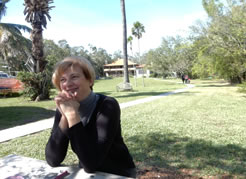
Katrina Boler is park manager at The Barnacle Historic State Park, one of the venues for Shakespeare Miami. Photo by Eric Minton.
Listening to Park Manager Katrina Boler describe the family's and the site's history, I feel like I've formed a first-name relationship with Ralph himself. Boler, with degrees in history and literature, is a big Shakespeare fan. She had her own sailboat-on-the-rocks moment in 2010 Shakespeare Miami's Producing Artistic Director Colleen Stovall called after a last-minute loss of funding for one of the sites where her free Shakespeare production was to be staged. Boler got excited until Stovall told her she needed dates in January, The Barnacle's busiest season. "I looked at the calendar for the dates she gave me, and they were all miraculously not booked," Boler says. "It was serendipity." Miami Shakespeare brought that year's production of The Taming of the Shrew, featuring a high school rock band on stage, to The Barnacle. The company went to other sites in subsequent years but in 2014 returned to The Barnacle with The Tempest.
Talk about a perfect setting for The Tempest: the house (with a brick patio for a stage at the front entrance) faces down a lawn to Ralph's boathouse and the bay, glistening blue on this Sunday afternoon with sailboats gliding back and forth. Thick forest covers the 30-some acres between the house and downtown with a paved path winding through the trees (Ralph considered boats to be the only necessary means of transportation; he hated the railroad and had little use for automobiles). There's even a sailboat on the lawn next to a pavilion that Shakespeare Miami uses as a stage for rainy nights. That boat doesn't belong there. It is a remnant of Hurricane Irma last September, deposited halfway up the lawn by the storm surge. The Barnacle, thanks to Ralph's barnacle design, has survived some vicious hurricanes, but the boathouse took serious damage from the passing boat.
The Barnacle has proved a perfect setting for all Shakespeare Miami productions that have played here, and the two organizations partner on a Shakespeare Birthday event every April. All much to Boler's delight. "The Barnacle gained a lot when Shakespeare Miami lost their stage in 2010," she says. While the mere report of rain can keep people home in South Florida, on nice evenings the plays fill the 2 1/2-acre lawn with 700 to 900 people, Boler says, even though the property has no public parking. Patrons must find a spot somewhere in the busy downtown and walk that path to the house. In Shakespeare Miami's wake, other theater companies have played here, and something called a haunted ballet has also taken hold (I must return to see that someday).
It's all so perfectly Shakespearean, as was Ralph. He encouraged a community spirit by inviting neighbors to his home for concerts and cultural events, perhaps even performances of Shakespeare plays. Shakespeare Miami flips that notion around: the company considers "accessible Shakespeare" to mean not only free and relatable but taking shows to the communities. "It's something for all ages, something on their turf, in their neighborhood, and not a daunting thing like going to a theater," Boler says of Shakespeare Miami's weekend residencies in Coconut Grove. "It brings the community together. You get to sit and laugh together and go 'oh my goodness!' together, which is especially important these days."
Monday, January 15—Warm Thoughts
We're heading home, leaving the warmth of Miami (70 degrees Fahrenheit) toward the 25 degrees the D.C. area will be feeling tonight.
The warmth we're leaving behind is not merely air temperature. The folks at Shakespeare Miami overwhelmed us with welcoming hospitality, and their hosts—the managers of the venues where Shakespeare Miami stages its plays, Jerry Kinsey at Pinecrest and Katrina Boler at The Barnacle Historic State Park—took time out of their busy schedules to show us around their parks and tell their stories. A highlight of the weekend was being treated to a private dinner backstage at Pinecrest Gardens. Shakespeare Miami board members Maria and Paul Eisenhart prepared a fantastic Cuban meal for us (including offering me the pork crackling—now that's hospitality!). “They are the very best kind of board members to have,” Producing Artistic Director Colleen Stovall told me. She and her abiding husband, John Stovall (a faithful volunteer for the cause), joined us along with board members Steve and Cyndy Hill, Florida International University Professor Jamie Sutton, and Doug Wetzel, who plays Polonius in Hamlet.
Thank you, Shakespeare Miami, Pinecrest Gardens, and The Barnacle Historic State Park.
 Sunday, January 21—"It Is the Stars," Says Kent
Sunday, January 21—"It Is the Stars," Says Kent
At every opportunity I look for affirmation that this Canon Project is a good idea: feedback from theater folks and friends, my sons drawing on their own particular expertise to lend enthusiastic support, the timing given the significance of 2018 in America and my life. Then there are the omens. I've had so many mystical signs and portents surrounding this quest that Shakespeare would blush to portray them in one of his plays. My dad even appeared to me in a dream and said, "Eric,  just do it," and then laid out a financial plan for the project, which I ended up following.
just do it," and then laid out a financial plan for the project, which I ended up following.
Today I happened upon a "Magic 8 Ball" that we got as a give-away at a Washington Nationals baseball game (it's red instead of black and has the GEICO and Nationals "curly W" logos adjacent to the "8"). I couldn't resist. "Am I going to see all 38 plays in the Shakespeare Canon this year?" I asked the 8 ball.
I pushed the button and turned it over to see the answer: "I foresee a home run."
Friday, January 26—What Shakespeare Means
It still feels early. We left the house just after 6 a.m., and a 2 1/2-hour darkness-into-daylight drive over Interstate 66 and down I-81 has brought us to Staunton, Virginia, a 25,000-people town undulating on Shenandoah foothills. We're downtown, finishing up breakfast at Rèunion Bakery & Espresso (ham and gruyere croissant, oh my goodness!). Across the street is the Staunton Visitor Center on the ground floor of the city's parking garage. Beyond that sits the Blackfriars Playhouse, the world's only re-creation of William Shakespeare's indoor theater in London.
Julie Markowitz , executive director of the Staunton Downtown Development Association, is meeting me in this bakery to talk about Shakespeare: not the man, not the plays, not the industry, but Shakespeare, a term with a Staunton-specific definition. When she was in her 20s and living in Harrisonburg 30 minutes up the interstate from Staunton, Markowitz would hear people say, "Hey, Shakespeare is coming to the park tonight!" Shakespeare was a dozen or so people wearing black turtlenecks and pants and black Converse high-top sneakers performing plays for an audience lounging on blankets and drinking wine. More formally known as the Shenandoah Shakespeare Express, Shakespeare to Markowitz was "youthful, spontaneous, incredible fun energy."

Beverly Street, downtown Staunton's main drag. Below, the Blackfriars Playhouse, home of the American Shakespeare Center (see the closest intersection in the photo above? The Blackfriars is a half block to the left). Photos by Eric Minton.
In the early 1980s, Markowitz lived for a couple of years in Staunton and doesn't have fond memories. Main Street was dying and an adjacent psychiatric hospital (the creepy, old generation of such institutions) was closing, its de-institutionalized residents being moved into subsidized housing downtown. Markowitz remembers being chased to her car every night after work. She returned to Staunton for a job in 1993, and though conditions had improved, she still describes it as dark times.
Then, in 2001, Shakespeare came to town.
In fact, it was the Shakespeare of Markowitz's past. Shenandoah Shakespeare Express built a permanent home in Staunton, making its debut in September 2001. The Blackfriars Playhouse is the perfect environment for the company—founded by Ralph Cohen, a professor of Shakespeare at James Madison University in Harrisonburg, and one of his students, Jim Warren—to stage plays using the theater conditions and staging practices Shakespeare's company would have used between 1590 and 1630. No longer wandering players (though a national touring troupe is still part of its operation) and with a growing education program, the company changed its name to the American Shakespeare Center.
Staunton already had a thriving arts community, says Markowitz, who became executive director of the Downtown Development Association in 2006. Several galleries and theater community groups were operating when the Blackfriars opened, and church concerts were part of the social scene. Arts and entertainment are in the town's DNA. Staunton incorporated in 1801 and became a railroad center in the mid-1800s (today it is at the intersection of Interstates 81 and 64). Warehouses and commercial businesses clustered around the depot; up the hill, the downtown district became the center for hotels, bars, theaters, and other venues of pleasure, arts, and entertainment, inspirational and carnal. Though Virginia is replete with Civil War battlefields, Staunton served as a rest-and-recreation center for both armies, so the town escaped armed combat.
 Shakespeare, the man, would feel at home in such a community then, and Shakespeare's arrival in 2001 provided a steroid jolt to the culture and commerce of the town and to the academic and social offerings of Mary Baldwin, a women's college sitting like an acropolis in the center of town. Chefs turned Staunton into a culinary enclave. Small businesses thrived downtown. Next door to the Blackfriars, a derelict hotel, the Stonewall Jackson, was remodeled and expanded as a conference center and designated a historic hotel.
Shakespeare, the man, would feel at home in such a community then, and Shakespeare's arrival in 2001 provided a steroid jolt to the culture and commerce of the town and to the academic and social offerings of Mary Baldwin, a women's college sitting like an acropolis in the center of town. Chefs turned Staunton into a culinary enclave. Small businesses thrived downtown. Next door to the Blackfriars, a derelict hotel, the Stonewall Jackson, was remodeled and expanded as a conference center and designated a historic hotel.
When asked what the Blackfriars most brought to the town, Markowitz doesn't hesitate. "Visitors," she says. Only 15 percent of the Blackfriars audience is local. The American Shakespeare Center has a growing international reputation for the quality and style of its productions and for its education program that brings in students to learn how to stage Shakespeare and teachers to learn how to teach Shakespeare. Many of the theater artists needed for the company's year-round calendar of productions end up settling in Staunton, captured by the combination of small-town atmosphere, a lively cultural vibe, and the surrounding wilderness beauty of the Shenandoah Valley. You want to see the entire Shakespeare canon? Live here.
This is all part of the definition of Shakespeare for Staunton. Nobody calls the entity the American Shakespeare Center or ASC or the Blackfriars or the Playhouse. It is simply "Shakespeare," meaning the place, the product, its people, and their presence. Shakespeare is "a feeling," Markowitz says. "The word Shakespeare conjures up different things for different people. If you're in school and studying, it might be work. If you're in our community and you don't quite understand it, it might mean those artsy people. If you're in my job and you see the impact of it, Shakespeare is the reason people gather. It represents quality, it represents intelligence infused with humor and a sensibility that everybody can understand. He wrote for the common man. He wrote about situations that everybody encounters, and everybody can relate to it. It's couched in this old-world way that a lot of people think is snooty, but it's really not. And I love the way the theater company presents it. It's so high energy, it's so much fun."
She pauses a moment and then strikes home with what makes this Shakespeare stand out. "And I think that it is authentic, so it's fresh." Old is new. Staging plays in the conditions for which Shakespeare wrote them brings out an improvisational vitality long buried by the technology-aided, proscenium-arch, director-centric theater of the past two centuries.
Markowitz thinks back to the "youthful, spontaneous, incredible, fun energy" that Shakespeare brought to her life 30-some years ago. "It's still there," she says of the company that provides a real-time conduit to the man. "They've managed to have a very sophisticated, big business and still maintain in their performances that youthful sort of innocent, lighthearted spirit."
That is Shakespeare in Staunton: a spirit.
Richard II, American Shakespeare Center
Blackfriars Playhouse, Staunton, Virginia, January 27
One year ago to this day, a Friday night in Staunton, Virginia, the actors of the American Shakespeare Company converged on the Stonewall Jackson Hotel's lounge. They were celebrating two members in the company "completing the canon" (playing in every Shakespeare-written play over the course of their careers) with their opening-night performance of Coriolanus that had just concluded next door at the Blackfriars Playhouse. My wife and I happened to be in the lounge when they arrived, and one of the actors sidled up to me and whispered in my ear: "Sarah Fallon is coming back next Ren Season to play Richard II." This for me was a Christmas-morning-Santa-booty moment. Then the actor whispered more: "And Josh Innerst is going to play Hamlet."
One year of excited anticipation culminated today, a day of incredible theater and exceptional Shakespeare. Fallon's Richard is everything I knew it would be, and the ensemble work is exquisitely nuanced. As for Hamlet, well, I'm a guy who spent his formative years attending theater in England, where standing ovations are rarer than comets passing earth. I normally don't stand until the second curtain call, and that only because I don't want to stand out—or sit out (in America, not standing is rarer than comets). Tonight, I rocket out of my seat with hand-hammering applause even before the dead bodies can get up to take their bows. Floating out of the playhouse, I catch up with Joan Saxton, who lives in Sausalito, California, and has come to almost every Blackfriars production a continent away over the past 12 years. She just shakes her head indicating she has no words to offer; her contented smile glazed on an expression of awe more than suffices. We and other patrons walk to the Stonewall Jackson for a formal reception unveiling the American Shakespeare Company's 2018–2019 lineup of plays. The buzz, though, is all Hamlet. People strain to constrain themselves from saying this might be the best Hamlet ever staged.
This is not hyperbole; but now comes the part where the uninitiated are inclined to tell me, "pshaw!" The actors staged both Hamlet and Richard II by themselves in just two weeks.
The company is one week into its annual Actors' Renaissance Season. During the "Ren Season" the theater uses original production practices. Twelve actors with cue scripts (their parts plus a line or two before they speak) put on the play without any director or production team. The cast works out all the blocking and the look of the production in only about a week's worth of rehearsal time. By the end of the three-month season they will be doing a repertory of five plays. This, scholars believe, is how plays were produced in Shakespeare's time, a collaborative effort by the actors. The result is textually pure productions. The actors simply don't have time to contemplate or argue about concepts or interpretations; they have to play what they read, and they have to listen to the other characters on the stage because they have to hear the cues when they arrive.
Key phrases here—"original production practice," "textually pure," "Blackfriars Playhouse" (a re-creation of Shakespeare's indoor theater), "original staging conditions"—would incline many to think this is "museum Shakespeare." It's not: it's closer to improvisational theater with the actors on a mostly bare stage interacting with an audience in the same light (no darkened theater) and in close proximity—patrons even sit on the stage itself. Shakespeare wrote for such conditions and, reportedly, more raucous audiences than today's. How he navigated such an environment with his plot and verse structures emerge during these Ren Season productions, some of the most dynamic live theater—modern, early modern, or Greek—I've seen anywhere.
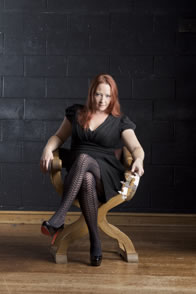
Sarah Fallon plays the title character of William Shakespeare's Richard II at the Blackfriars Playhouse. Photo by Michael Bailey, American Shakespeare Center.
Richard II is 100 percent verse: Shakespeare even uses rhyming couplets for the comic scene of the Yorks on their knees competitively begging before King Henry IV (David Anthony Lewis). Fallon portrays Richard's crumbling state—his crumbing psychological state as much as his regal one—speaking Shakespeare's most lyrical poetry. Being king is all Richard has known, and he relies totally on divine right, anointed by God, for his political standing. Watching Fallon's Richard discovering that he is as human as everybody else is devastating, no matter how petulant we might think him early in the play.
Casting Fallon as Richard II is a no-brainer. I've admired this actress's work on this stage since 2004. She has portrayed Cleopatra exactly as Enobarbus describes her. Her Lady Macbeth was, along with Judi Dench's, the truest portrayal of the role I've ever seen. She played all four iterations of Queen Margaret in Shakespeare's Henry VI tetralogy produced one part per year over four years, one of the few women to ever do so (a boy or young man would have played the part in the original productions). Her iconic pairings with René Thornton Jr. in several plays (from Tamora and Aaron in Titus Andronicus to Beatrice and Benedick in Much Ado About Nothing) includes Fallon as Cassius to Thornton's Brutus in Julius Caesar: I've never seen the tent scene argument so electric.
Fallon playing Richard II is not stunt casting. Cross-gender casting is common at the Blackfriars. Just as Fallon playing Cassius was all about chemistry with Brutus, to Jim Warren, the American Shakespeare Center's artistic director through last year, Fallon is perfect for Richard because of her verse-speaking skills and her abilities in portraying regality and psychological disintegration—even at the same moment, as she does in the deposition scene at the center of Richard II. Critics often see Richard as an effeminate tragic hero, but Warren knew Fallon wouldn't play the part that way. I've seen Fallon effectively lead armies, torture dukes, go toe-to-toe with Richard III, beat up messengers, psychologically castrate Scotland's greatest warrior, and, in Beaumont and Fletcher's The Maid's Tragedy, physically castrate a king, all while playing women; and I've seen her manage and participate in a successful assassination plot while playing a man.
Here she's playing a king. Sure, Richard is spoiled, loves flattery, is inefficient in governance, and not politically astute, but he keeps a firm grip on his core ethic, divine right. In the final scene he fends off four murderers, killing two of them before being fatally stabbed himself. That moral strength and physical danger runs through Fallon's performance from the start. I knew she'd be scary good as Richard II, and the payoff has been one year coming.
To read the review of this production, click here.
Tuesday, January 30—A Shot in the Arm
It took two, big, burly corpsmen and my father to hold me down as the doctor gave me a penicillin shot when I was 7 years old. My distaste for needles hasn't abated since. Bravery for me was getting a vaccine during a hepatitis outbreak on the Air Force base in Alaska where my father was stationed when I was a young teen. One of my classmates had been stricken, so I weighed the odds—and gave in only to the base commander's orders for all families to get the shot at the base clinic.
I've never gotten a flu shot. I've also never had the flu. Heck, I average a cold only once every three years. But I've had three colds already since October, and there's been a particularly virulent strain of flu going around the D.C. area and down in Staunton, Virginia, where we were this past weekend. Today, when I was at a doctor's appointment for an unrelated matter, the nurse asked, "Have you had your flu shot?" "No," I mumbled, knowing I would have to explain myself and still get a lecture. "Would you like one today?" she asked.
My life flashed before my eyes: not my past but my future, cramming as much as a dozen Shakespeare plays in a dozen locations into the next three months. "Yes," I heard myself mumble. Holy cow, I just agreed to get a shot! How's that for dedication? Honestly, I didn't feel a thing when she gave me the shot. Not that I'll volunteer for future needling, but 53 years of imagined terror seems kind of silly to me now.
Wednesday, February 7—It's a Puzzle
My parents once gave me a jigsaw puzzle of the moon. I've never been good with jigsaw puzzles. I was in junior high school at the time and I didn't think to report them to social services. Then my wife, Sarah, topped them: one Christmas a couple decades ago she gave me a 500-piece, double-sided jigsaw puzzle of The Beatles eponymous LP—better known as "The White Album." It's still in its shrink-wrapped box. She's still my wife, too.
And now I'm staring at my Shakespeare Canon Project matrix.
Traveling back and forth across the land, seeing all that Shakespeare and visiting all those theaters, what fun! Planning it all out, not so much. It is part of the adventure, but in manner much like Alaska's giant mosquitos that suck on you as you hike through that land's majestic splendor (something I can look forward to in late July).
Timing, I knew, would be the biggest contention. So many productions were bound to land during festival season, June through September. It's worse than I imagined, however. Most of the productions—including so many on my "must do" list of priority theaters and only-playing-there titles—have their runs in a three-week period from the end of July into August. The Major League Baseball All-Star Game on July 17 hosted by our Washington Nationals is further exacerbation. Attending an All-Star Game has been one of our primary baseball goals, and when the Nationals were announced three years ago as hosts for 2018, we became season ticket holders to get first crack at tickets. It's not just the game; it's four days of festivities and showcase games from Saturday through the main event Tuesday night. As soon as Major League Baseball set those dates last August, I booked a hotel room across from the downtown ballpark. At that time, seeing the Shakesperae canon in one year was a fleeting wish. Now, the All-Star Game is trimming significantly my canon-completing opportunities.
Back to the matrix. I'm working with several different priorities. Number One, to see all 38 plays in the traditional canon (the First Folio plus Pericles and The Two Noble Kinsmen) and productions of Shakespeare's poetry and apocryphal plays as a bonus. Equal priority is to see each play in a different theater. Next priority is to cover the breadth of the land, starting with the four corners of the continent: Miami (done), Fairbanks, and San Diego are on the table, as is Hawaii if I can work out the schedule (I'm quibbling with the definition of continent here). As for the northeast corner, my preferred theater, Shakespeare by the Sea in Newfoundland, is currently in flux, but I have geographical fall-back options. I aim to get to at least two productions in each of 12 regions: New England, New York Metro, Middle Atlantic, Deep South, Mid-South, Industrial Midwest, Agricultural Midwest, Rockies, Southwest, West, Northwest, and Canada. Except for the last, these regions have blurry borders. I also intend to limit myself to no more than five productions per region, but the midsummer traffic jam of plays I see ahead of me might detour me off these standards. After consideration of geographical spread, I'll focus on covering a full spectrum of theater spaces, production styles, and company compositions.
With about 30 theaters linked on Shakespeareances.com still to announce their 2018 titles, five plays have not yet shown up on this year's playbills: The Two Gentlemen of Verona; Henry VI, Part Two; Henry IV, Part Two; Cymbeline; and Henry VIII. Ironically, it's not lack of plays but too many productions of the same play that's giving me fits. So many theaters this year are doing All's Well That Ends Well, Love's Labour's Lost, and King John. Then there's Macbeth, not only with productions aplenty but a great variety in styles: the experimental version at Shakespearemachine in Fort Wayne, Indiana (in November, yes!), or the Elizabethan stage setup at Lake Tahoe (by the lake, yes!), or the Aaron Posner and Teller version at Chicago Shakespeare (in the new theater, The Yard, yes!).
All these Macbeths, but not necessarily enough Shakespeare variety to spread out my calendar or attain my regional goals. When Sarah and I were first laying out our ideas for the Canon Project, we had a short list of theaters and festivals we wanted to visit, some longtime favorites, some places we have never been (in fact, one of my goals is for at least half of the productions I see to be at venues new to me). Idaho Shakespeare Festival in Boise was on that short list; we've been there twice and love the theater and the productions. However, for 2018, of the five plays the Idaho Shakespeare Festival is staging, only one is by Shakespeare: yep, Macbeth. This is a notable trend at Shakespeare-named theaters. Of the Oregon Shakespeare Festival's 11 titles this year, only four are by the namesake playwright, plus one about the namesake playwright. At least they're not doing Macbeth, but three of their four Shakespeare titles I've already assigned to other theaters: Romeo and Juliet (I'm opting for the choose-your-own-ending version being presented in a bar next week), Othello (I'm opting for an original pronunciation version in April), and Henry V (I have two more intriguing options that I can't reveal as one is not yet publicly announced). That leaves Love's Labour's Lost, which, if I choose that one, several other preferred theaters come off the chart.
Ultimately, many of my final selections will come down to time and travel: when can I get where, and where can I get when. Even my desire to get to the continental corners will have to contend with that reality.
Puzzles. At least they look good when they're done.
Friday, February 9—A Web of Imogenation
Yay! Fist-bump-times-eight the spider! Insider information assures me a Henry IV, Part Two, is coming to a stage late this year, and The Two Gentlemen of Verona showed up on a playbill as I caught up Bard on the Boards this week. Just three Shakespeare Canon titles have yet to find a home in 2018: Cymbeline, Henry VIII, and Henry VI, Part Two.
Piecing together my calendar provided a mix of bad news and good. As I expected, the run dates of so many plays appearing at only one theater this year fall between July 19 and August 5. Meanwhile, a couple of regions ended up lacking representation on the calendar. I will have to forego a couple of really-want-to-see productions, sacrificing my own preferences for the greater cause. Nevertheless, laying out the calendar of potential productions brings this project's ultimate goal into clearer focus. I will be able to see every play in the Shakespeare Canon that is produced on the North American continent this year, plus at least three apocryphal plays, each produced by a different theater company. It will take a lot of hustle, but the goal is within reach. I just need those last three missing titles to be staged somewhere.
In a seemingly unrelated matter, this week I also posted my review of the Folger Theatre's production of The Way of the World, Theresa Rebeck's modern adaptation of William Congreve's Restoration Era comedy. The production is part of the Women's Voices Theater Festival here in the Capital Region, with 24 companies currently staging plays written or directed by women. As I was about to toss the play program into my recycling bin, I glanced at the festival flyer, and a title caught my eye: Imogen.
Pointless Theatre in downtown Washington combines puppetry and other graphic elements with live action in its productions, and this particular outing does so with Shakespeare's play Cymbeline. The adaptation further retitles the play to focus on the play's true leading character, King Cymbeline's estranged daughter, Imogen. However, the play's run ends this weekend. Can I get tickets?
Yes, I can! So now, Cymbeline is in the fold for the Shakespeare Canon Project, and I don't have to fly cross-country or try to squeeze it into a three-week, cluttered window in late July. Serendipity strikes again. High-five the spider, post this update, and head downtown for an evening with Pointless Theatre.
OK, about Spider. My dad had this plush toy spider next to his computer in his home office. I don't know when it showed up, where it came from, or anything about its backstory. My mom 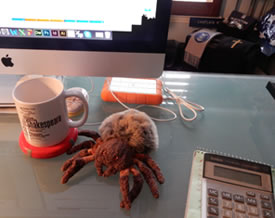 collected teddy bears and other plush animals, and because of her obsessive-compulsive nature she had more than 3,000 such critters of varying sizes and species at the time of her passing. "Spider" may have been one of them (she named all of her bears, but I never heard the spider named). Dad obviously was attached to it. When Mom and Dad moved to their retirement center, Spider was one of the first items he packed in his office and unpacked in their new apartment. After his stroke, Dad had to move out of his apartment to the center's assisted living wing, and Spider accompanied the computer upstairs. Near the end of his life as his condition deteriorated, Dad twice had to move to a new room for increased levels of care, and he would grab Spider and make sure it didn't get waylaid (he may have suspected I was coveting it; he would have been right).
collected teddy bears and other plush animals, and because of her obsessive-compulsive nature she had more than 3,000 such critters of varying sizes and species at the time of her passing. "Spider" may have been one of them (she named all of her bears, but I never heard the spider named). Dad obviously was attached to it. When Mom and Dad moved to their retirement center, Spider was one of the first items he packed in his office and unpacked in their new apartment. After his stroke, Dad had to move out of his apartment to the center's assisted living wing, and Spider accompanied the computer upstairs. Near the end of his life as his condition deteriorated, Dad twice had to move to a new room for increased levels of care, and he would grab Spider and make sure it didn't get waylaid (he may have suspected I was coveting it; he would have been right).
Upon Dad's passing, I took custody of Spider. It now sits next to my office computer. Because my dad's legacy is largely inspiring me to do the Shakespeare Canon Project, Spider serves as the physical representative for my father's spiritual presence, even accompanying me on my travels. He's a spider: he fits easily in my bags and likes tight spaces.
Imogen (née Cymbeline), Pointless Theatre
The Dance Loft on 14, Washington, D.C., February 10
We start our interrogation of William Shakespeare's feminist cred by challenging his choice of title for this play, Cymbeline. At 290 lines, the titular king of Britain speaks just 8 percent of the script. His daughter, Imogen, has more than twice that: 594 lines which, at 16 percent, is so dominant that the next-largest speaking part, her husband Posthumus Leonatus, gets 12 percent of the total with his 442 lines (I'm indebted to ShakespeareWords.com for line counts and the Royal Shakespeare Company's edition of William Shakespeare Complete Works, edited by Jonathan Bate and Eric Rasmussen, for percentages). King Cymbeline, in his own play, is such an insignificant puppet manipulated by the Queen, Imogen's stepmother, that Pointless Theatre's production of the play presents him as just that: a hand puppet manipulated (and spoken) by the Queen (Hilary Morrow).
It's more than just word counts. This is Imogen's play, her story. All plot threads—the banished husband, the chastity wager, the court intrigue, the lost princes, Rome's invasion of Britain—wind through Imogen on their way to being audaciously tied up in Shakespeare's deftest denouement. By titling her adaptation Imogen, Charlie Marie McGrath, who also directed, is setting the record straight, a starting point for not only honing the play's focus on Imogen but also revisiting Shakespeare's tragicomedy through a woman's lens.

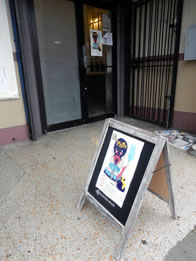
The Dance Loft on 14 is a complex of dance studios plus a small theater upstairs in a building housing a mattress showroom on 14th Street in Northwest Washington, D.C. Pointless Theatre uses this space to stage its production of Imogen, an adaptation of William Shakespeare's Cymbeline. Photos by Eric Minton.
This production is part of the Capital Region's Women's Voices Theater Festival during which 24 theaters in and around D.C. are staging plays written and directed by women. As McGrath is doing with her retitled version of Cymbeline, the Women's Voices Theater Festival is intended to highlight the too-often-downplayed role of women in theater, what McGrath calls in her Imogen program notes, "a correction of a deficit, a need, a desperate need to put women's voices at the forefront of 21st century American theater."
With Imogen, the nine-year-old Pointless Theatre is making its first foray into Shakespeare. Our getting to the company's current space, The Dance Loft on 14, is a foray in itself, though it's only 30 miles from our house. We give up on our confounded GPS to find street parking in a two-block business district of 14th Street that traverses this mid-20th century Northwest D.C. middle-class residential area. We park in front of a mattress store housed in a drab-yellow Mediterranean-style building. Across the street is the bus barn, resembling a gothic fortress, for the Washington Metro Area Transit Authority. As I look about, Sarah spots a banner over the mattress showroom entrance: "The Dance Loft on 14." Imogen posters point us to the door, and up the stairs we reach a complex of dance studios and the 68-seat theater where Imogen is playing, all carved out of what appears to have once been a 1930s-era ballroom.
Pointless Theatre productions merge live action with shadow puppetry while layering scripts with heavy doses of music and movement. McGrath, a product of Chicago's rich theater scene and assistant director for several productions at the Shakespeare Theatre Company in D.C., approached Pointless Theater about applying their aesthete to her idea for remaking Cymbeline. In addition to casting Cymbeline as a hand puppet, she uses shadow puppetry to illustrate off-stage elements of the plot, such as Leonatus, on his way to banishment, fighting with Cloten, and Guiderius, represented as a bear, knocking off Cloten's head in the Welsh woods. The production begins in a fairy tale world with the medieval look of a children's book but transforms into modern dress as the play progresses.
Two musicians sitting in the corner of the stage provide a constant soundtrack of music and environmental sounds (composed by one of the musicians, Pointless Company Music Director Michael Winch). Choreographer Ryan Sellers creates mime and dance sequences for Fidele's funeral, the battle between the Britons and Romans (including strapping on body armor and then, locked and loaded, crouching with bent elbows to represent bearing rifles), and Imogen's disguising herself as Fidele, a nightmarish trip for the woman as the ensemble strips and re-dresses her on stage.
Think about that: for Katelyn Manfre's determined and intelligent Imogen, becoming a man is a bad dream. “I am nothing,” she says soon after; “Or if not, nothing to be were better.” She's witnessed in abundance how the XY chromosome combination creates nightmarish figures. Her father is a peevish blowhard. Her stepbrother is a crude lout with a violent temper. Her husband has accused her of adultery and wants to kill her for it. Iachimo is a slimy self-styled stud (which comes across to women as, simply, a slimy jerk). Emerging from the trunk in Imogen's bed chamber and wearing gloves with elongated fingers, Iachimo does more than just note her bed chamber, take her bracelet, and inspect her body: he slips those elongated fingers up Imogen's nightdress for his own private climax.
Not all men are bad. The two princes are pure honor and adorably played by Renaldo McClinton as Guiderius (who sheds real tears as he dances Fidele's funeral) and Kevin Thorne II as Arviragus (who sings the funeral dirge, the production's most moving moment, spurring those tears in Guiderius and some in the audience, too). But, then, living with their supposed father out in the Welsh woods, they don't bear society's imprint (nor has Imogen met them yet). And in this production, it's not their supposed father but their supposed mother: Belarius (Lee Gerstenhaber) has been re-gendered, as has Leonatus' trusty servant working for Imogen, Pisanio (Acacia Danielson). That alone infuses the play with female perspectives as the lines they speak or are threatened with take on #MeToo and Children's Health Insurance Program significance.
McGrath's adaptation remains relatively true to Shakespeare's text, though many lines are transplanted within the play and from other plays. She also transfers passages to a different character to suit her thematic purpose. It is Imogen, not Leonatus, who forgives and pardons Iachimo at the end (but, then, Leonatus doesn't seem capable of doing that), and it is Guiderius who pardons the Romans. Cymbeline has retired, a la Lear, leaving the princes and princess to rule in equipollence. "Never was a war did cease, ere bloody hands were washed, with such a peace," Imogen speaks the final line. A fairy tale ending, perhaps, but not pointless.
To read the review of this production, click here.
Coriolanus, Brave Spirits Theatre
The Lab at Convergence, Alexandria, Virginia, February 10
It wasn't that I miscounted, I just didn't recount. For more than a week, my upcoming trip to Connecticut would take me to my 500th staged William Shakespeare production. I was at 498, and a production of Coriolanus by Brave Spirits in Alexandria, Virginia, was coming up on this Saturday night, but not as part of the Canon Project.
Brave Spirits had originially been the representative theater for Coriolanus, but when late this week I inserted Pointless Theatre's Imogen into the matrix, my need to spread out the Canon Project's geography trumped my desire to profile Brave Spirits. That was a hard call for me, too, as this company is one of my favorites, and it plans to stage the entire Shakespeare history cycle as a repertoire in 2020, a sequential staging of the eight War of the Roses plays reflecting on current political conditions. That's exactly something I've envisioned since I was in college (in every age of man, "current" political conditions are always fraught, it seems), and I want to give Brave Spirit's ambitious "History Is 2020" project wider notice. Nevertheless, I had another Coriolanus glowing on the matrix, a Stratford Festival production in Ontario already generating buzz before opening. Stratford was my initial choice to see Julius Caesar, but there always comes such another Caesar.
So, Brave Spirits dropped off the Canon Project itinerary. Still, this production was a significant one in my lifelong Shakespearean trek. By inserting Imogen and seeing it this afternoon, tonight's Coriolanus is now my 500th Shakespeare production. That doesn't occur to me as I wait in the theater lobby wondering why, five minutes before showtime, the theater has yet to open for seating.
Then something more significant than a benchmark number happens: The plebeians start uprising—in the lobby. The small room barely has enough space for patrons, and now the first scene of Coriolanus is playing among us. I jerk as a firm hand clasps my shoulder from behind. "What work's, my countrymen, in hand?" the man attached to that hand says to me. It's Menenius, and he moves on into the room to address the rabble. Ian Blackwell Rogers, a longtime fave of ours, is playing Menenius, and he chooses the target for his entrance knowing he would not get punched or sued. Things really get intense in that little room when Caius Martius himself (later to become Coriolanus) arrives. Looking around the room, I notice that the nonactors are worried: they might have to choose sides if a real riot breaks out. But, no, the action is moving to the capitol, Martius bids us follow, and we do—except in the hallway to the theater, the newly elected tribunes, Sicinius and Brutus, waylay us to worry openly about Martius.
Only then, for the play's second scene, do we enter the theater, its 52 seats arranged in a square. A couple of seats already are occupied. I sit next to a woman stitching a pair of pants. This turns out to be Virgilia (Renea S. Brown), wife of Martius. The play continues in the same manner as what we experienced in the lobby, scenes exploding from behind and among us into the center of the play space. Virgilia doesn't leave her seat as she plays her entire scene with Martius's mother, Volumnia (Jessica Lefkow). The knife fight between Martius and Aufidius (Robert Pike) takes place on the floor a couple of feet from us. For the second half of the play, Aufidius takes the seat next to me where Virgilia had been sitting. Pike plays Aufidius as a coiled cobra, and I spend much of the rest of the play wondering when he would snap my head off at the mere memory of a fight he lost to Martius some years back.
Fourth-wall-shattering theater is no longer a novel concept, though the large number of companies that still strictly adhere to proscenium arch conventions might make you think otherwise. Fourth-wall-shattering was standard practice in Shakespeare's time, but these days it's often treated as theatrical calisthenics—gimmickry. Brave Spirits Artistic Director Charlene V. Smith, who helms this production of Coriolanus, does not indulge in gimmickry. She explores Shakespeare's texts with both a trust and openness that results in some of the most stimulating Shakespeariences I've known. She does so again with this Coriolanus.
This is a play of the people. Literally: the word people is spoken more than 80 times. It's used with both positive and negative connotations, as a badge of honor and an entity to scorn. Nevertheless, this play is peopled with equal representation from all classes and different countries, too. Coriolanus has famously been staged as an exemplar for political positions across the entire spectrum of ideologies, from communism to fascism. Smith doesn't assign any person or party as righteous or villainous, nor does she assign us, the audience, to any particular faction. She integrates us into the whole of Roman (and Volscian) society. In that opening scene in the lobby, the rabble direct their distrust at us, Menenius directs his parable at us, Martius directs his scorn at us, and the two Tribunes engage us in their concerns. Which side are we on? Everybody's.
O Martius, Martius! Would that this production represented you in the Shakespeare Canon Project. (A domino effect later this year would make this so.)
Wisely or not, I am not restricting my theater attendance this year just to the Canon Project itinerary. We have subscriptions to Brave Spirits and other theaters in the region, and while visiting a company on the Canon Project itinerary, I intend to see as many of their productions as I can fit in. This means a few more scheduling headaches and a lot more work, as I plan to review for Shakespeareances.com all the plays I see, but it pays off in the experience. Just six weeks into the year, in addition to four Canon Project plays, I've attended a Hamlet (American Shakespeare Center) that is among the best theater experiences I've ever had, and now I've seen Brave Spirits' scintillating Coriolanus.
That Hamlet was Shakespeare stage production number 498 in my lifelong tally, and this Coriolanus is 500. The benchmark doesn't mean nearly as much as the ongoing proof that you can never see enough Shakespeare.
To read the review of this production, click here
Wednesday, February 14—Flurple Reigns
Yes, it's Valentine's Day, and I'm apart from my valentine here in Shelton, Connecticut. So what? She was in the Air Force. I'm a journalist. For the first dozen years of our courtship and marriage, we didn't spend a single Valentine's Day together. She was deployed or doing distant duty somewhere, or I was traveling on assignments. For many of the past half dozen years, my dad-care duties had me away from home on Valentine's Day, too. Even when we do happen to be home together on February 14, we treat it as just another day—probably because we approach every day of the year as our Valentine's Day.
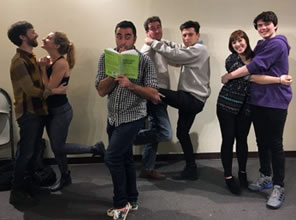
Valley Shakespeare Festival Founding Artistic Director Tom Simonetti (center with script) leads the cast into the multitrack script of Romeo and Juliet: Choose Your Own Ending by William Shakespeare, Ann Fraistat, and Shawn Fraistat during rehearsals in Shelton Connecticut. From left: Sam Plattus (Benvolio, Capulet), Ella Smith (Juliet), Jeremy Funke (Mercutio, Nurse), Jack D. Martin (Tybalt, Paris, Montague), Jessica Breda (Rosaline, Friar Laurence), and Killian Meehan (Romeo). Photo by Cheryl O'Brien, Valley Shakespeare Festival.
I spend all of today with Romeo and Juliet—and Mercutio and Nurse, Tybalt and Paris, Benvolio and Capulet, Montague and Friar Laurence, and an unexpectedly inordinate amount of time with Rosaline. Today has been day three (of 3 1/2 days total) for the Valley Shakespeare Festival's six-person cast, plus Artistic Director Tom Simonetti, to rehearse Romeo and Juliet: Choose Your Own Ending before their performance at Tavern 1757 tomorrow night. The play by Ann Fraistat and Shawn Fraistat (and William Shakespeare, of course) stops at three points for the audience to vote on the fate of the young lovers, starting with whether Romeo should pursue Juliet or stay true to Rosaline. That means a total of eight different potential endings—a one-hour show with a 147-page script. For a one-night-only performance, Simonetti and the actors have to rehearse each track. Just the logistics of keeping the blocking straight is mind-blowing, and seven-eighths of what they are working on today will not see the public light of day.
Turns out I have a lot at stake in the audience's votes tomorrow night, too. I've seen all the endings, and one stands out for its brilliant hilarity: the flurple ending. I saw it once in rehearsal today, and I want to see it again. I get my chance at the end of the day. For their single run-through at the end of a nine-hour rehearsal, I serve as the audience, voting on which turn the play would take. It's a lot of responsibility, especially as the script includes direct-address reminders to the audience that characters' fates are in their hands so don't [screw] it up. This is an adult-language play, so it's disconcerting to have actors level the f-word with the full force of a glare directly at me. Though I knew which conclusion I wanted, I hadn't figured out how all the tracks pieced together (as I said, the logistics are mind-blowing, and I'm not playing in or directing it). My choices led to the one happy ending for Romeo and Juliet and Rosaline and Mercutio and Tybalt, too. The only one here not happy was me: I didn't get to see the flurple ending again.
So, on this Valentine's Day night, my loving energy goes out to tomorrow's sold-out audience at Tavern 1757; may your votes lead us all to a flurple ending.
Romeo and Juliet: Choose Your Own Ending,
Valley Shakespeare Festival
Tavern 1757, Seymour, Connecticut, February 15
Tom Simonetti is from The Valley, a cluster of small cities and large towns along the Naugatuck River. Its population is mostly working-class people, resiliently powering through the economic ebbs and flows of the past several decades and dedicated to their community, which, though comprising the municipalities of Seymour, Derby, Ansonia, and Shelton, they consider collectively as The Valley. Though located in southwest Connecticut almost equidistance between New York City and Hartford, The Valley is isolated from a mass transit perspective. Valley residents might have an appreciation for culture but no convenient access to the cultural institutions of the Northeast Corridor.

Tom Simonetti, founding artistic director of the Valley Shakespeare Festival, stands at the Tavern 1757 bar before his production of Romeo and Juliet: Choose Your Own Ending. Photos by Eric Minton.
Simonetti is a theater artist, an actor and director who honed his craft in New York. He also has Valley DNA. From the time he was in college he dreamed of bringing a Shakespeare festival to The Valley. Even if he didn't sense a demand, he knew the need, and as he was nearing his 30th birthday, he founded the Valley Shakespeare Festival and staged its first free play, The Comedy of Errors, for one weekend in the summer of 2013 in downtown Shelton's Veterans Memorial Park. Simonetti estimates a hundred people showed up that first night. Each night, the crowds grew. They continue to grow, now averaging 400 to 500 per show, even in rain.
One person who attended that first year was Mark S. Holden, an insurance agent and chairman of the Shelton Public Schools. Growing up in nearby Trumbull, he remembers a Shakespeare acting troupe visiting his school with "gorgeous costumes and props and absolutely horrid actors, people who knew their lines but didn't know what they meant." Most of his life he "knew Shakespeare was someone I was supposed to like," but he didn't know why until he saw Simonetti's new company play Shakespeare with "$50 worth of costumes and props and great actors." He approached Simonetti about taking his productions to the schools.
This played right into Simonetti's dream. He didn't just want to do free Shakespeare in the park of his hometown. He wanted to build a local institution, one with a professional (i.e., Equity) foundation, one with a workable business plan, one that would address the needs of literacy and access to theater throughout all elements of Valley society. "The schools always want them back," Valerie Knight-Di Gangi, program officer for the Valley Community Foundation, told me earlier in the day. "Schools can't afford the time or resources to bring people back unless it's worthwhile." This worthwhile endeavor has spread to other institutions throughout The Valley: libraries, senior centers, and homeless shelters, conducting workshops in addition to performing.
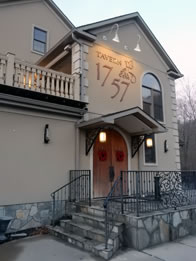 And bars, too. Valley Shakespeare Company will do one or two plays in taverns during the winter. Simonetti and company believe the plays are a perfect fit for such an environment. Imagine mutilated Lavinia walking among the tables in Titus Andronicus or Falstaff hanging out at the bar during The Merry Wives of Windsor, both of which the Valley Shakespeare Festival has done. One establishment, in fact, begged out of future shows because the crowds overwhelmed operations.
And bars, too. Valley Shakespeare Company will do one or two plays in taverns during the winter. Simonetti and company believe the plays are a perfect fit for such an environment. Imagine mutilated Lavinia walking among the tables in Titus Andronicus or Falstaff hanging out at the bar during The Merry Wives of Windsor, both of which the Valley Shakespeare Festival has done. One establishment, in fact, begged out of future shows because the crowds overwhelmed operations.
Tonight, Holden is sharing a high table with me at Tavern 1757. We are among the 80-plus people who have filled to capacity the restaurant's upstairs banquet room (with a bar) to see Romeo and Juliet: Choose Your Own Ending, a one-hour adaptation of Shakespeare's play by Ann Fraistat and Shawn Fraistat. Three times in the play, the audience votes on a decision Romeo must make. The play continues with the audience directing Romeo into one of eight endings, ranging from everybody living and happy to everybody dying and angry. The Fraistats supplement Shakespeare's verse (mostly from Romeo and Juliet, but other plays, too) with some modern applications of thou and thine. Nurse identifies Juliet to Romeo or Benvolio (depending on the track) with "Marry, bachelor, her mother is the lady of the house, and a good lady, and a wise and virtuous. I nursed her daughter that you talked withal. So whate're you're thinking, Montague, hands off!" The play is also infused with clever digs at Romeo and Juliet's own plot, characters, and conventions.
I've been in The Valley for three days and hanging out with Simonetti and his cast for rehearsals. I've been exposed to three things: a Valley-wide spirit of community fealty and generosity; a Valley-wide admiration for Simonetti and Company Manager Cheryl O'Brien; and the talent of this cast, all of whom welcome the challenge of playing Shakespeare in a bar. Jeremy Funke, playing an attention-deficit Mercutio and the randy Nurse, and Jack D. Martin, playing workout wonk Paris and an arrogant Tybalt, leave their fellow actors in stitches. The cast comprises New York–based actors (most originally from The Valley) except one: 16-year-old Valley resident Killian Meehan playing Romeo with only three years of stage experience and learning stage combat for the first time in this production. Meehan nevertheless leads the charge for the entire production with a commanding presence in a character who, in this version, is more straight man than blubbering lover.
Certainly, some in the audience are friends and family of company members, but the majority are Valley Shakespeare Festival fans generating a cult-following buzz. Rosaline is played by Jessica Breda, identified in the production's flier not by any of the many roles she's played but as "VSF Audience Favorite!" She clearly is. As Romeo, having to choose between Rosaline and Juliet (Ella Smith, channeling 13-year-old essence), introduces the two women for the first time, Breda gets an especially enthusiastic greeting. Then, too, the audience has already shouted for Romeo to stick with Rosaline.
"Embrace the wacky," Simonetti tells his cast before a final run-through in the afternoon. This evening, with just a couple days to rehearse and only Smith off book (the other actors carry scripts), the cast not only embraces the wacky, it embraces the atmosphere and the audience, too. Funke's Mercutio switches "lawyer" to "architect" in the Queen Mab speech as he addresses a man who, based on audience reaction, is a known architect in The Valley. Patrons also get many of the play's Shakespeare insider jokes. As the audience chooses Romeo to stick with Rosaline, Benvolio (Sam Plattus playing an awkward teen) hits on Juliet with "rub a dub dub, it's time for some love." This fails to impress the romantically charged Juliet, so Benvolio begins speaking what he remembers of Romeo's pickup lines. This works in getting Juliet worked up, but Benvolio doesn't know what to do with her replies, so she ends up taking over both sides of the play's famous meet-up sonnet, a sly piece of verse humor many patrons get into even before Benvolio's payoff line: "Wait, I'm sorry, lips are doing what now?" he says, forcing Juliet to "show thee" what lips can do.
The audience's votes send the plot to the most tragic and hilarious of the play's eight endings. Romeo and Benvolio see the dead-like girls in the Capulet monument and poison themselves. Juliet and Rosaline wake up, see the actually dead boys, and fatally stab themselves. Tybalt and Mercutio arrive, start arguing over trivialities, and stab each other in a snit. As they fall to the floor, Mercutio tells Tybalt he'll see him in hell. “Hell!” Tybalt yells; “I hate the word as I hate hell, all Montagues, and thee.” Mercutio wonders if there are any words Tybalt doesn't hate, and the fiery Capulet offers one: “flurple.” The dying antagonists argue over whether flurple is a color and threaten to kill each other double. Everybody in the play is dead, but everybody else in the room is laughing, and I'm especially happy: I got to see the flurple ending again.
To read review of this production, click here
Thursday, March 1—Field and Dream
About to depart on my next trip, this one to Palisades, New York, to see the Children's Shakespeare Theater's production of The Merchant of Venice—a perfect production for this time as teens have a lot to say on social issues right now. In my mind, though, I'm grousing about the summer and, specifically, an addition to the itinerary for the Shakespeare Canon Project.
 This story begins three years ago. At Christmas, my wife and I each state a dream wish tied to one of our favorite passions, and we set out to achieve that dream together. Sarah's big wish that year: to attend the Major League Baseball All-Star Game in Cincinnati. I began booking rooms and looking into getting tickets, but just ahead of that 2015 baseball season, the Washington Nationals were named host of the 2018 All-Star Game. We changed our strategy. Abandoning efforts to make the Cincinnati game, we instead upgraded our partial season ticket plan with the Nationals to half-season tickets so that we would get guaranteed first crack at tickets to this year's All-Star Game. In fact, I paid the first installment on our All-Star tickets just last week, and we're one row back and over a few numbers from our usual seats.
This story begins three years ago. At Christmas, my wife and I each state a dream wish tied to one of our favorite passions, and we set out to achieve that dream together. Sarah's big wish that year: to attend the Major League Baseball All-Star Game in Cincinnati. I began booking rooms and looking into getting tickets, but just ahead of that 2015 baseball season, the Washington Nationals were named host of the 2018 All-Star Game. We changed our strategy. Abandoning efforts to make the Cincinnati game, we instead upgraded our partial season ticket plan with the Nationals to half-season tickets so that we would get guaranteed first crack at tickets to this year's All-Star Game. In fact, I paid the first installment on our All-Star tickets just last week, and we're one row back and over a few numbers from our usual seats.
The All-Star Game on July 17 will be part of a five-day festival for the city. There is a Fan Fest, a Futures All-Star Game played by minor league players destined for the Majors, an open-to-the-public workout by the players, and the Home Run Derby, all before the actual All Star Game on that Tuesday evening. When the dates for this year were set last August, I booked a room in a hotel across the street from Nationals Park for the duration of the festivities. This was before the Canon Project took root.
My strategic plan for the Project dictated that I should take some enforced "oblivion breaks" during the year to recharge my brain and spirit, and the five-day All-Star block in the middle of July seemed perfect for that purpose. However, in working out my Canon Project calendar, the All-Star break seriously crimped my travel schedule, knocking out theaters (Hawaii is no longer part of the continent for the purposes of the Project) and leaving me with only one night to see King John at Texas Shakespeare Festival and needing to get there that day from Palm Beach, Florida. Then there was the looming matter of a production destined from the very beginning to be featured in the Canon Project, Taffety Punk's "Bootleg Shakespeare" Henry VI, Part Three. The company's Bootleg Shakespeare shows are the full play rehearsed in one day and performed that one and only night at the Folger Theatre.
I've just received confirmation from Taffety Punk: The date for that one-and-only night is July 16, the day of the team workouts and Home Run Derby. What can I do? It's Henry VI, Part Three, so I'm not going to get other theater options. It's rehearsed and staged in one day, so I don't have alternate dates. It's Taffety Punk, one of my favorite companies. It's the Folger—duh! So it's oh well: I'll have to take a break from the oblivion break.
At least Sarah still gets her big wish (and on my bucket list, too) to attend the All-Star Game. Plus, I have a friend ready to pounce on our Home Run Derby tickets. He might only get one of our pair of tickets, though: Sarah has yet to opt out of the Home Run Derby in order to see Henry VI, Part Three.
Friday, March 2—It's The Bomb—Again
What is it about Fiasco Theater and nor'easters? When we drove up to New York City on January 5 to see the company's Twelfth Night, we arrived at the tail end of what meteorologists were calling a bomb cyclone. That's essentially a winter hurricane, when a cold air mass collides with a warm air mass causing a rapid drop in barometric pressure that creates windy cold and wet conditions. Before then I'd never heard the term bomb cyclone; now I'm hearing it again, today, as I'm driving into, yep, New York City to see, yep, Fiasco. This time I'm interviewing the three founding members of the company, Noah Brody, Ben Steinfeld, and Jessie Austrian, to talk about their particular theatrical aesthete, Twelfth Night in general and theirs in particular, and New York City's relationship with William Shakespeare.
Neither the Fiasco folks nor I could schedule this interview when I was up here in January, so I piggy-backed this meeting onto my trip to see The Merchant of Venice at the Children's Shakespeare Theatre in Palisades, New York. That's about an hour's drive up river depending on the traffic—and the weather. I'm currently sitting in a Schnippers at 8th Avenue and 41st Street. Self-proclaimed famous for its sloppy joes, Schnippers is an efficient and economical source of good burgers, dogs, sandwiches, salads, and “Macs and Joes.” Outside, the rain is falling like Niagara and the wind exploding down 8th Avenue is turning umbrellas convex; Mary Poppins would go supersonic before reaching 40th Street. People, wrestling with zombie umbrellas, stumble through Schnippers' double doors—air locked tighter than a safe. They look relieved to have escaped even for a moment the maelstrom outside but wordlessly go about their business. No grousing. Even if you offer a friendly comment like, “That's something else out there,” people look at you like you're from Virginia.
According to my iPhone GPS I have a 9-minute walk to Fiasco's office: enough time for a soak, rinse, and spin cycle all in one. So, time to bundle up, give my umbrella a pep talk, and head out into a storm that even Cassius might think too ominous. After the interview I have to drive back up to Palisades for Merchant's Opening Night, the GPS timing it out at a couple minutes over one hour. The only thing worse than walking in this weather is driving in it, especially as the rain is now a "wintry mix" of sleet and snow. But I'm in New York; just join the jam (I love New York, even in this mess).
This day's consistent theme isn't the weather, however. My interviews, first with Fiasco and then with people associated with Diana Green's Children's Shakespeare Theatre, end up focusing on the role of camaraderie in staging Shakespeare plays.
Fiasco was formed by young actors who sought to create productions out of a shared experience of discovering the plays. Brody describes his early days bouncing around as an actor in New York when the 9/11 terrorist attack shook him into a deeper self-evaluation. Not only did he feel he was far from his potential capabilities as an actor, he noted that he didn't have "a community that I felt was nourishing me." That drew him to the Brown University/Trinity Rep resident theater master's of fine arts program. He earned his MFA and learned the merits of an ensemble approach to creating theater. This is especially true with Shakespeare, as Fiasco's casts tease out the themes and individual personalities in the plays to reveal wondrously fresh productions.
Later, in the Palisades Presbyterian Church where the Children's Shakespeare Theatre stages its productions, I meet Jonah Levine, 22 years old, a recent graduate of Williams College with a bachelor's degree in philosophy, psychology, and cognitive science. On Monday he starts his job in a spinal cord research program at the Bronx Veterans Affairs Medical Center. Levine grew up in the Children's Shakespeare Theatre, debuting when he was in middle school as a numbered soldier in one of the Henry plays and getting disemboweled. "That really did it for me," he says, and went on to a career playing Richard III ("As an eighth grader, that was viscerally satisfying"), Hamlet ("Split personality") and Cornwall in King Lear ("Ripping out some eyes"). Levine always loved Shakespeare's language, and he attributes many life lessons to the plays, but his foundational memory of this theater and the atmosphere Green strives to inculcate among the casts is the camaraderie. He has no friends from his high school, but he stays in touch with the wide array of kids he performed with as Children's Shakespeare Theatre cast mates while in high school. His new boss is the mother of a couple of those cast mates.
As we head into the church's community room that serves as the theater, I mention that as a reviewer I analyze these productions as Shakespearean presentations, not harping on age of the cast nor regarding shortcomings in skill levels of the actors, whatever their ages. Levine nods. "The true value is not the performance," he says. "It's the process."
The Merchant of Venice, Children's Shakespeare Theatre
Palisades Presbyterian Church, Palisades, New York, March 3
The Knaves are crowded onto the platform in the Palisades Presbyterian Church's parish house. This community hall lies at the back of a tiny, white-clapboard, steep-ceilinged church in a big-home neighborhood along the Hudson River a couple of miles north of New York's border with New Jersey. By Knaves we mean the younger company of actors in the Children's Shakespeare Theatre: these are kids ages 8 to 14; the other company, the Rogues, are teens 14–18.

The Palisades Presbyterian Church where the Children's Shakespeare Theatre performs its plays in the Parish House at the back. Below, the Prince of Morocco's card, good for a discount at his tanning salons. Photos by Eric Minton
It's talk-back time after the curtain calls for their production of William Shakespeare's The Merchant of Venice. The audience, many parents, many siblings, many friends, and a few "general public," range in age from second grade to senior-discount eligible, and the questions run the gamut of topics.
"What's it like to act blindfolded?" a little girl asks Alex Barsanti, who plays the "sand-blind" Old Gobbo. "It's really cool," Barsanti replies, and describes how he keeps bumping into the audience.
"What's it like to play falling in love?" a member of the Rogues asks, probably having had to do so herself when she was a Knave. "It's weird," replies Ethan Lee, who plays Bassanio, the young Venetian who courts and wins Portia. "But then you get to know the other person and it's OK."
"What's the moral of the story?" a man asks. After some disjointed comments about needing to respect people who are different and Cooper Rosen describing his approach to playing Shylock, 10-year-old Hela Giaever, who plays Shylock's daughter, Jessica, says, "You need to know someone's backstory before you judge them." Into the silence that follows this statement, Cole Massaro, who plays Antonio, Shylock's enemy, speaks: "There are no heroes and villains in life; everybody is much deeper than that."
In my lifetime, children and young adults have been at the vanguard of the great social movements: the civil rights marches, boycotts, and Freedom Rides in the 1960s; the anti-war protests of the late 1960s and early 1970s; and, today, the gun control debate. I also grew up in the shadow of "The Greatest Generation," whos members were teens and in their early 20s when they forged their greatness. Are these Knaves old enough to tackle the racism in The Merchant of Venice? They're tackling it every day in the news and in their communities, where, here in Rockland County, hate crimes are on the rise.
Yes, but can they tackle Shakespeare? Remember, these are kids—so of course they can. As with any language, children tend to adapt to Shakespeare's early modern English more swiftly and thoroughly than stubborn adults do. This doesn't mean they all are great Shakespearean actors, but some I'll put in the company of my faves from among the 18 previous productions of this play I've seen. Adam Greenberg is hilarious as Gratiano, Bassanio's overly gregarious buddy, and still brings real empathy to the character in the trial scene. Liam Rigney's Launcelot has me in stitches with his fiend vs. conscience schtick, and throughout the rest of his performance he lands every joke while elucidating the social contexts of Launcelot's behavior.
Diana Green, CST's founding artistic director who helmed this production, never holds back from either the subject matter or the language in the plays her charges stage. She has a thorough, studied understanding of Shakespeare, and her rehearsals feature as much instruction on verse structure and social and language contexts as on character development and blocking. This means that while she puts Merchant's social debate front and center, she also embraces the play's comic DNA.
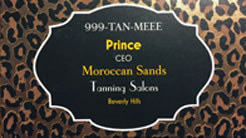 This production generates much textual and visual humor (all legitimate laughs, not "aren't-they-cute" titters), especially among Portia's royal suitors who must choose among three chests—gold, silver, and lead—to discover her picture and win her as wife. Journee Benjamin playing Portia is African-American, so Green wanted a boy of a different complexion to play the Prince of Morocco. That complexion is orange. In this modern-dress setting, the Prince is CEO of Moroccan Sands Tanning Salon (his entourage hands out cards good for a 50 percent discount) with an unhealthy glow to his skin except the pale circles around his eye sockets. George Kozaitis's Prince also has the hair, gestures, and conversational cadence of President Trump. Certainly, there's social commentary in his courting a woman of color, but textually, too, a Trumpian reading of Morocco's meditations on "dull lead" and "angel" gold is a perfect match. The three suitors' attendants are the play's comic highlights. A half dozen actors in shining silver or gold shirts and hats dance and party with Morocco. Handlers wearing black shirts and silver sashes fawn over their overly dramatic idol, the Prince of Arragon, played by Jasper Macri in glimmering silver jacket. Launcelot and Gratiano serve as Bassanio's entourage, entering in a soulful R&B groove to Anita Baker's "Sweet Love."
This production generates much textual and visual humor (all legitimate laughs, not "aren't-they-cute" titters), especially among Portia's royal suitors who must choose among three chests—gold, silver, and lead—to discover her picture and win her as wife. Journee Benjamin playing Portia is African-American, so Green wanted a boy of a different complexion to play the Prince of Morocco. That complexion is orange. In this modern-dress setting, the Prince is CEO of Moroccan Sands Tanning Salon (his entourage hands out cards good for a 50 percent discount) with an unhealthy glow to his skin except the pale circles around his eye sockets. George Kozaitis's Prince also has the hair, gestures, and conversational cadence of President Trump. Certainly, there's social commentary in his courting a woman of color, but textually, too, a Trumpian reading of Morocco's meditations on "dull lead" and "angel" gold is a perfect match. The three suitors' attendants are the play's comic highlights. A half dozen actors in shining silver or gold shirts and hats dance and party with Morocco. Handlers wearing black shirts and silver sashes fawn over their overly dramatic idol, the Prince of Arragon, played by Jasper Macri in glimmering silver jacket. Launcelot and Gratiano serve as Bassanio's entourage, entering in a soulful R&B groove to Anita Baker's "Sweet Love."
This is the third Children's Shakespeare Theatre production I've seen, and I regard them with the same standard as I do any other Shakespearean staging. Nevertheless, the fact that these are kids does factor into how I receive the plays. In this case, I realize that The Merchant of Venice is not merely a play about racism, it's a play about bullying. Antonio bullies Shylock, and when Shylock gets the economic upper hand, he bullies Antonio. The various Christians bully Shylock, but they also bully each other. All the suitors are bullies, and Portia (often listed among Shakespeare's great comic heroines) bullies Shylock and, in the last scene, Bassanio. Lorenzo and Jessica bully each other. Launcelot's comic schticks are expressive of this theme: he's bullied by his conscience and the fiend, he bullies his blind father, and his dull-servant act counters Lorenzo's bullying. I don't think Green is calling particular attention to this theme in her production (though why else keep the awful sand-blind father scene?), but, for me, the mere fact that school kids who likely face bullying every day are playing these roles brings it to the fore.
The play also is about bonds: the loan bond at the center of the Shylock plot, the bonds of love (the rings) and duty (the chests), and the bonds that bound all members of a society, which is integral to Venice's city charter that serves as a subtext to the trial scene. In my conversations with the actors, their parents, and CST alumni this weekend, I keep hearing the same word over and over: community. These kids come from all over the region to participate in Green's program, which she founded 20 years ago, and they form close bonds that last into their adulthoods. Cole's mother, Karen Massaro, describes parents sitting in the church driveway for up to 40 minutes after rehearsals are supposed to end because the kids just don't want to leave; but that's fine because the parents form their own bonds, too. You see this community spirit in the hugs among the audience members before the play and in the handshakes and fond smiles of the actors during curtain calls.
Sitting next to me on this night is a mother, Karen Hughes, a risk management program project manager for a Wall Street firm and president of the Nyack School District Board of Education (sitting with board of education leaders at plays is becoming a trend on this Shakespeare Canon Project). Her son, Nicolas Hughes Barrow, joined the Knaves three years ago and is now a newcomer to the Rogues. Through Nicolas, Hughes is reacquainting herself with Shakespeare, whom she left behind after reading Romeo and Juliet and Julius Caesar in high school. Mother and son now attend Free Shakespeare in the Park productions in Central Park and have twice been to England, seeing Shakespeare's Globe and visiting Stratford-upon-Avon. At Shakespeare's Birthplace, a docent selected Nicolas to read Hamlet's "To be" speech; Nicolas did it beautifully, she reports in awe of what her son has learned through Green's program.
Hughes is attending tonight with Nicolas to show their support for the Knaves. But there's more than that for her. "I'm here to see the play," she says. "The last three years have been an education for me. I haven't been to a bad Shakespeare performance." Not in London, not in Central Park, and not here in Palisades. I concur—well, in regards to Shakespeare performances here.
To read the review of this production, click here.
Tuesday, March 6—Huh! Oon-Gahwah! Shakespeare's Got the Powwah!
Anna Katerina Baryshnikov, appearing on The Late Show with Stephen Colbert in April 2017 after making her cinematic debut in Manchester by the Sea and starring on the CBS sitcom Superior Donuts, revealed that in the neighborhood where she grew up about 30 minutes north of New York City, "the cool thing to do was Shakespeare performed only by children." She compared the community's enthusiasm for this children's Shakespeare theater to infatuation with high school football in other locales.
"Shakespeare for children?" Colbert repeated, chuckling and getting a laugh from his audience. Baryshnikov, slightly giggling, said the group even had a cheer. "You had a cheer?" Colbert asked. "What's your Shakespeare cheer? I hope it's in iambic pentameter." Cue laugh. Baryshnikov did the cheer: "Huh! Oon-Gawah! Shakespeare's got the power!" (pronounced, pow-wah).
Actually, this isn't merely a cheer. It's one of the many warm-up exercises that casts do before rehearsals and plays at that very Children's Shakespeare Theatre in Rockland County, New York. Some of the other warm-up chants are far funkier and impossible to replicate phonetically in the written word. Skimmed context, however, is the fodder for late night talk show laughs, and the notion that a neighborhood would be so eccentric as to get excited over children doing Shakespeare—imagine that! Children doing Shakespeare!—is in itself a punchline (by the way, the Children's Shakespeare Theatre draws participants not from a single neighborhood but from communities all across the region).
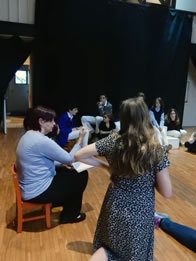
Diana Green, founding artistic director of the Children's Shakespeare Theatre in Palisades, New York, gives director's notes to the cast, all between the ages of 8 and 14, of William Shakespeare's The Merchant of Venice. Photo by Eric Minton.
Children's Shakespeare Theatre has been making me laugh since before this episode of Colbert's show aired: But it was Touchstone, Phoebe, Corin, Rosalind, and Orlando in As You Like It that were funny because the actors, all between 8 and 14, played those parts so well. It was the 17-year-old Amalia Baker playing the Fool that blew me away in Queen Lear (nee, King Lear) a month before Colbert led his audience's laughter over the notion of children playing Shakespeare as Baryshnikov sat on his couch. That audience wouldn't be laughing if they encountered Regan from that production. Here is my review's description of that performance:
"What makes the eye-gouging scene so arresting is not because teens are doing it but because it shows how scary Regan is as a character (and how scary good Elinor Greenway is playing her). … The second eyeball ends up in the possession of Regan, who drops it on the floor and stomps on it with such ferocious gusto—resulting in substantial blood spray—it generates gasps in the audience (and some covering up of eyes, too). Yet, we could see this demonstrative behavior coming in Greenway's performance of a disturbed Regan dealing with pent-up mommy issues."
Cue respect. Colbert and anybody else who respond incredulously to children doing Shakespeare need to remember that many of Shakespeare's greatest roles—Rosalind, Viola, Olivia, Portia, Juliet—were written for youths to play.
The name Baryshnikov is a familiar one beyond Anna's rising star, and her face is a dead giveaway to her genetic makeup. She is the daughter of dancers Mikhail Baryshnikov and Lisa Rinehart, and three of their children spent several years performing in the Children's Shakespeare Theatre, I learn from founder Diana Green on my visit here this weekend.
It is the quality of that theater's work that drew me to its production of The Merchant of Venice this past weekend, not merely that children comprise the company. Seeing Merchant here certainly was worth the trip. However, I'm heading home today with a bit of sadness. During my time here in Rockland County I've also attended rehearsals of the company's upcoming plays this season, The Winter's Tale and Romeo and Juliet. The latter will be the next to hit the stage in mid-April, and it also will tour to a middle school in Brooklyn. Having witnessed Sunday's rehearsal of it, I would love to get back up here to see it. But other plays in the canon at other theaters in America must be my priority.
There's always next year and beyond: Huh! Oon-Gahwah! Children's Shakespeare Theatre's Got the Power!
To see the clip of Baryshnikov's appearance on Colbert, click here.
Friday, March 23—Storm Front
 Clouds are covering the landscape to the horizon. Faith is my sole navigation.
Clouds are covering the landscape to the horizon. Faith is my sole navigation.
Back on the road again—actually, in the air as I leave the Eastern Seaboard and stretch west the geographical boundary of the Shakespeare Canon Project. I'm flying to Mesa, Arizona, where next week I will visit with the Southwest Shakespeare Company for its production of Henry IV, Part One. I'm tacking on a side trip to Los Angeles where the Independent Shakespeare Company is opening its new studio theater with William Shakespeare's All's Well That Ends Well.
As I head for the great American desert, my every second thought is back home where snow still covers the earth. Two days ago—the first day of spring, no less—we got our first significant storm of the winter. We would end up getting 6 inches, and we were in the thick of it by 8 a.m. as we finished up breakfast. Sarah was home because the federal government was closed due to the storm, and so was the research and consulting firm where she works. I was cleaning up after breakfast when I heard from upstairs an eerie sound that shook me to my core.
It was my name, "Eric!" but in a tone totally strange to me. I heard it again as I leaped up the stairs, dashed around the banister to our bedroom and, seeing the light on in the bathroom, ran to the open door. Sarah was standing at the other end of the room, paralyzed by profound alarm. "Something's happening!" she wailed. "I don't know what!"
Recollection of three events collided in the moment. A little over three years ago, I was in this bathroom getting out of the shower when I heard what sounded like a car crash—in the bedroom; I rushed out to find Sarah on the floor, unconscious and bleeding above her eye where her skull had hit my bed stand on her way down. It would take doctors almost eight months and several more such episodes to finally figure out that her heart was stopping for a few seconds at a time and she needed a pacemaker (my account of that year, in which she simultaneously dealt with thyroid cancer, is at "A Happy Birthday: Enduring Wind and Weather"). Eight years ago, my father, living in Charlotte, North Carolina, had a stroke, and though I wasn't present when it happened, I got there the next afternoon, saw the state he was in, and heard both his account and that of the retirement center nurse who answered his emergency call and got him to the hospital. That led to six years of constant commutes between our Northern Virginia home and Charlotte as I became Dad's health care manager (and financial manager and IT expert). About three years ago, I had an attack of vertigo, this bedroom spinning out of control though I otherwise felt fine (my father also had a vertigo attack when I was a high school senior, so I know this condition from two perspectives). Now? Is Sarah suffering vertigo? Is she having a stroke? Has her pacemaker malfunctioned?
I started asking questions: are you dizzy, are you nauseous, is the room spinning, do you feel faint, do you feel numb? I couldn't get straight answers beyond "A little—I don't know." She felt clammy to my touch. She was suffering, physically in some way but the psychological suffering seemed outsized to what was happening physiologically. Vertigo can certainly do that to people who have never had an experience with it (I was fortunate to have my father's experience to help me identify when it happened to me). But Sarah's descriptions, scant as they were, didn't match vertigo. "I don't know—a little" is not descriptive of vertigo's spinning sensation.
So, concentrating on my other two concerns, heart and stroke, I determined to get her to the hospital. And I determined that an ambulance wouldn't get here faster than I could get there. Call me cocky, but I grew up in Alaska and Michigan and learned to drive in New Jersey and Missouri—I have driven in blizzards before. After a quick text to my neighbors, "Sarah sick. Heading to ER," I put my socks and her shoes on her feet (she has a new closet—I couldn't find her socks in 5 seconds and grabbed mine instead), walked her down the stairs, bundled her up, and got her into the back seat of our car. Even major thoroughfares hadn't been plowed yet. I made my way past a pas de deux of minivans pirouetting on the snow-capped ice then serving as the Fairfax County Parkway. Meantime, Sarah was about to be overcome by nausea (no longer "a little"), and all I had for her was my Blackfriars Playhouse stocking cap, which I yanked off my head and handed to her in the back seat just in time. We reached the emergency room. I got her checked in, parked the car, and tossed the cap in the trash can.
I hate to say how much I've become a veteran of hospital rooms, protocols, and technology, thanks to caring for my dad and Sarah this decade. The nurse was impressed that I knew how to raise and lower Sarah's bed. I also was keeping my eyes on the vital signs monitor. Nothing amiss except her body temperature: three different thermometers in three different body points all measured her in the low 90s. Lab tests, CT scan, and chest X-ray (impressive how much gentle care the technician took with Sarah getting those X-rays) revealed no underlying cause. The low body temperature remains a mystery, given how all her other vitals were fine. After five hours on intravenous feeding and medication and lying under a dozen hospital blankets, Sarah began feeling better. Now more lucid, she could answer the doctor's interrogation more clearly, after which both he and I said simultaneously, "Vertigo." She was cleared to go home, the doctor labeling the dangerously low body temperature an anomaly. By now, the roads were cleared (as was our driveway: we've got great neighbors, one of whom brought Sarah a pot of delicious chicken soup). Sarah spent most of yesterday in bed and medicated while I pondered cancelling this trip.
 She, of course, insisted that I do not. She has her work computer with her and can do her job at home. I've left her plenty of meals to microwave (meant for lunches at work, but suitable for quick, no-hassle feeding at home). The neighbors are keeping an eye on her. With vertigo, there isn't much you can do about it or with it until the condition eases after a few days.
She, of course, insisted that I do not. She has her work computer with her and can do her job at home. I've left her plenty of meals to microwave (meant for lunches at work, but suitable for quick, no-hassle feeding at home). The neighbors are keeping an eye on her. With vertigo, there isn't much you can do about it or with it until the condition eases after a few days.
Nevertheless, I worry: about today, the next week, or if more is in store. When I launched the Shakespeare Canon Project, always casting a shadow over the attempt were some lingering effects of Sarah's previous illnesses, most notably a decline in her cognitive skills. She's a retired Air Force colonel, and in the 10 years since a defense researcher and analyst, but lately she has been having trouble doing math, following instructions, figuring out the New York City one-way street grid, and remembering things I said or she said 10 minutes ago. Her current vertigo may not be related, but it puts to the test just three months and six plays into the quest our joint resolve to do this thing and chronicle the journey, come what may.
It's all about experiencing Shakespeare's relevance in our time and in our daily lives. However, no Shakespeare quote comes to mind right now. Perhaps the instructive thing is that tomorrow night I will be seeing a play titled All's Well That Ends Well, the story of a woman's steadfast faith, a woman who heals the king of some mysterious medical ailment. Maybe that's the thematic arc to this Canon Project trip. Looking out the window as we begin our approach into Phoenix, I see blue skies expand over the desert landscape.
Wednesday, March 28—Auto Speller

My drive through the desert (left) from Los Angeles brings me to the Valley of the Sun and my Tempe, Arizona, hotel. It sits next to a rock formation (below) that is a typical feature in the Valley, except the other rocks don't bear a "T." Photos by Eric Minton.

I just texted Sarah to tell her I've arrived in Phoenix (actually Tempe) after my six-hour drive from Los Angeles through desert terrain I've always loved since I was a kid. I'm now readying for my Shakespeare Canon Project visit with the Southwest Shakespeare Company.
My text to Sarah is a courtesy to her, yes, but also a prompt to get a daily report from her on how she's doing. As of yesterday, she's generally recovered from her vertigo attack of last week, and her primary physician isn't concerned of anything long term.
Auto speller is giving me fits. When texting on my iPhone and writing these journal entries and my reviews on my iPad, the speed with which I compose and type often leads to innocent typos becoming guilty grammatical errors. The people who program auto spellers have never read Shakespeare or dealt with a cast of Equity actors. It also thinks it is a better writer than I am. The other day, bona fide became "bone find," which I took as a snarky attitude toward my use of bona fide. Do you get annoyed when people are always trying to finish your sentences, especially when they're almost always wrong? Yeah, so do I.
In 1998, Sarah, then the commander of an Air Force maintenance squadron, was deployed to the AOR (Area of Responsibility, euphemism for war zone) when things were getting testy with Iraq's Saddam Hussein (called Operation Desert Fox, it was a U.S. troop buildup few people outside those involved remember). At that time, email was not readily available for deployed troops, but because Sarah was the forward commander for the logistics group, she had email access for the purposes of official communications, including with me. As the squadron commander's husband, I was the point person for the family network at the home base. "Official communications" did not include personal business (except what she needed to know to do her job), let alone any romantic cooing or sexual innuendo. So, since she was the forward LG in the AOR, I used an acronym for my sign-offs: ILU. The first time I did it, she got it, and did the same in return. We've maintained this sign-off on our emails and texts ever since.
Before this trip, I could just punch a capital "I" when texting and auto composer brought up "ILU" as a suggested option. Now, just a period at the end of a sentence triggers "ILU" as a suggestion for my next word. What's most impressive is that my iPhone only does this on texts to Sarah. Thank goodness.
Henry IV, Part One, Southwest Shakespeare Company
Nesbitt/Elliott Playhouse, Mesa Arts Center, Mesa, Arizona, March 29
Sitting on a stool atop a tavern table, Prince Hal, a dagger in hand and a pillow perched on his head, is playing his father, King Henry IV in William Shakespeare's Henry IV, Part One. Falstaff stands before him playing Prince Hal. Tony Latham, playing the real Prince Hal, has just delivered his famous crux line, "I do, I will," in answer to Falstaff's plea to not be banished when suddenly comes a cry from the wings of the stage. "Stop! Stop!" and the scene stops. This might not be unusual in a rehearsal with the director intervening, but this is a paying public performance, and it is the dramaturg who strides onto the stage. Then she starts lecturing—to us.
That is one dedicated dramaturg, right? Or one downright crazy dramaturg. The former is definitely right (and the latter a little true, too), for this moment is integral to tonight's "Stop-Action" presentation of the Southwest Shakespeare Company's Henry IV, Part One. Mary Way, SW Shakespeare's executive director, says she came up with the idea when a patron complained that he couldn't always understand what was going on and wished he could hit the pause button. The company tried to do exactly that in its first Stop-Action show last year with Hamlet. "Talk about throwing crabs in the pot," says the dramaturg, Susan Willis. The pause-button process proved too difficult for the actors, so the program was tweaked for Romeo and Juliet earlier this year and further refined for this night's production.
Willis begins her lecture on Henry IV, Part One, and then Stage Manager Kate Weir in the booth calls over the intercom, "Ladies and gentlemen, we're doing one-one." Three actors in costume walk on stage, Henry (Eric Schoen), Westmorland (Libby Mueller), and Princess Joan of Lancaster (Bonnie Beus Romney in one of several re-gendered roles). Walter Blunt (James Cougar Canfield) soon joins them and Henry reads Blunt's letter about Hotspur's exploits. The action continues into the king's bitter comparison between Northumberland's son Harry Hotspur and his own son Harry Monmouth, whereupon Dramaturg Willis stops them and opines that Hal is part of Henry's public relations effort. She then describes how the play questions not just who would be a better son, Hal or Hotspur, but, "More important, who would make a better king? And this becomes the gist of the next two scenes."
This is a three-front history, literature, and theater lesson. Willis covers the actual events surrounding Henry IV, describes the play in the context of Shakespeare's career and his second Henriad Tetralogy, and reveals the play's production history. For example, every leading actor from the 17th century to the 1950s played either Falstaff or Hotspur, depending on their age at the time. Then, in 1951 when the Shakespeare Memorial Theatre in Stratford-upon-Avon staged the four-play cycle, a historical first, Prince Hal became the centerpiece role with a then-unknown actor, Richard Burton, playing the part.
The actors are called upon to play moments that Willis has selected from Southwest Shakespeare's full production:
- Poins (Drew Leatham) proposing the robbery at Gads Hill to Hal and Falstaff;
- Hal's "I know you all" soliloquy;
- Hotspur (Joshua Murphy) speaking his Popinjay speech to the king and exploding when Henry refuses to ransom Mortimor (Seth Scott);
- Falstaff''s (Keath Hall) tall tale of the Gads Hill robbery;
- The role-playing scene in the tavern;
- Prince Hal's meeting with his father;
- Falstaff describing his army, which is us, the audience;
- Hotspur's pep speech to his army (us, again);
- The Hal vs. Hotspur fight through Falstaff pretending to have killed Hotspur.
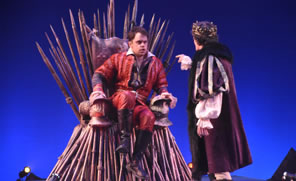
Prince Hal (Tony Latham) gets thrown into the throne by his father, King Henry IV (Eric Schoen) in the Southwest Shakespeare Company's production of William Shakespeare's Henry IV, Part One. Photo by Laura Durant, Southwest Shakespeare Company.
At the end of some scenes, Willis engages the cast. She probes Schoen for the king's emotional state in the meeting with Hal. "I'm not a real touchy-feely guy," he says still in character. During that scene, Henry grabs his son and throws him into the Game of Thrones–inspired throne of spears. Willis asks Latham what that felt like. "I feel really small in that seat," he replies, though that might be as much physical as emotional: Set Designer Tiana Torrilhon intentionally built a large-scale throne, and Latham's Hal looks like a toddler in a high chair.
The production's director, Asia Osborne, is on hand to describe her staging choices, including using the audience for Falstaff's "food for powder" army. "We love this character," Osborne says about Falstaff, "until you get in the way of something he wants." Willis points out that because the audience is engaged directly in Falstaff's and Hotspur's speeches, "We have a choice. One offers you death, one offers you a piece of the future. Who do you root for in the upcoming fight between Hal and Hotspur?"
Tickets for this show are deeply discounted compared to the rest of the run, and audiences are aware they are not getting the whole play. The go-and-stop nature of this format, however, is not easy on the actors, who must jump into character and are sometimes stopped short just as they are moving into their moment. Eye-rolling and frustrated faces are evident on stage. Though Willis has the director's script and has been in touch with Osborne, the dramaturg has only seen the production for the first time at a student matinee this morning, during which she's furiously scribbling notes. She works out her scene choices with Weir, but doesn't get more than a meeting with the actors.
Collaboration evolves as the program progresses. Latham starts hanging out on the stage during Willis's lecture, and she uses him for his insights into Hal. The prince's "I do, I will" line is "A complicated four words," Latham says; "and there's a comma in there which makes it even more complicated." By the curtain call the cast applauds Willis, and I hear afterward from close associates with the actors that even some cast members who had been skeptical or frustrated ended up appreciating the program. Many, too, would take part in the Willis-led Flachmann Seminar, a deeper dive into the play occupying a full Saturday morning two days later.
Then, too, actors know a star turn when they witness one, and that is what Willis accomplishes. The dramaturg sets an easy-intellectual tone right off the bat. She can out-pun Hamlet, slapping her own cheek on particularly bad ones. She drops in pop culture references. Noting that head jewelry comes with being king, "It's all about the bling," she says. She has a podium on the stage but spends only a few seconds at it. Prowling the stage she displays as much energy as Hotspur. Above all, for 2 1/2 hours, her knowledge of and insights into the play—historical, textual, structural—keep coming. A professor of English at Auburn University Montgomery, Alabama, Willis has been the dramaturg for Alabama Shakespeare Festival since 1985, including teaching in that company's master of fine arts program. She's also directed at Alabama Shakespeare, so she knows theater from the inside. Her relationship with Southwest Shakespeare began about five years ago when Michael Flachmann died shortly before one of his seminars, and Willis was called "in desperation." She's been de facto Southwest Shakespeare dramaturg ever since.
Since my college days, Henry IV, Part One, has remained one of my two favorite Shakespeare plays (King Lear being the other). Willis has taken my appreciation of it to new heights. Though we only see about an hour of the actual Southwest Shakespeare production, this is one of the most complete presentations of this play I've experienced, viscerally as well as intellectually.
To read the review of this production, click here
Friday, March 30—Surviving
He swishes his bourbon on the rocks in a clear plastic tumbler. "Shakespeare has been in my blood all my life," 56-year-old Raj Sivananthan says. He remembers when he was 3 years old growing up in his native Sri Lanka and his parents read to him from one of four books every night: Tales from Shakespeare by Charles and Mary Lamb, Bedtime Bible Stories, Persian Fairy Tales, and Russian Fairy Tales. His parents had no obvious reasons to choose those particular books, Sivananthan says, "But I'm glad they did."

The entrance to the Nesbitt/Elliott Playhouse at the Mesa Arts Center in downtown Mesa, Arizona. Below, Raj Sivananthan relaxes in the Mesa Arts Center Plaza. Photos by Eric Minton.
We are sitting at a table in the plaza of the Mesa Arts Center. This multidisciplined, multigeometric, 210,000-square-feet complex of various theaters, studios, and galleries—the "largest comprehensive arts campus" in Arizona, according to Wikipedia—sits on Main Street right in the middle of downtown Mesa. Arts is, physically if not literally, at the heart of this Phoenix suburb.
When the complex opened in 2005, the Southwest Shakespeare Company was one of the residents. Through the glass lobby door behind me is the 200-seat Nesbitt/Elliott Playhouse where tonight Sivananthan and I will be watching Southwest Shakespeare's production of William Shakespeare's Henry IV, Part One. The law firm Bowman and Brooke LLP is the sponsor of this production, and Sivananthan, a product liability defense lawyer, is a managing partner at the firm's Phoenix office. He also is on the Southwest Shakespeare Board of Directors. That both Southwest Shakespeare and Sivananthan are here on this evening is a remarkable tale of survival.
In Sivananthan's family, his destiny was to be a doctor or engineer. Those bedtime stories, however, set his bearings on theater and language. He acted in school plays in Sri Lanka and as an exchange student in Gallatin, Tennessee. He attended the University of the South in Sewanee, Tennessee. "It was like Hogwarts, literally," he says of both the environs and the scholastic atmosphere. Back home, though, civil unrest forced his family to flee to Australia. To make sure Sivananthan had barrier-free access to them, Sewanee officials helped get him a scholarship to England's Oxford University. He eventually attended Vanderbilt University's law school and almost quit. Ironically, his Shakespeare professor convinced him to stick it out. After earning his law degree, he had opportunities to work in New York or Chicago, "But I couldn't stand the weather," he says. When he came out to Phoenix he never left.
 About 20 years ago, a few years after he settled in Phoenix, he happened upon a listing for a Southwest Shakespeare production. He attended and was impressed. "It was high quality. I can tell good from bad," says the former Oxford student experienced with theater in England. He regularly attended—and spoke up—at after-performance talk-back sessions. Then-Producing Artistic Director Jared Sakren took notice. "I stick out in Mesa," says the trimmed-bearded Sri Lankin lawyer with a coffee complexion and Indian accent.
About 20 years ago, a few years after he settled in Phoenix, he happened upon a listing for a Southwest Shakespeare production. He attended and was impressed. "It was high quality. I can tell good from bad," says the former Oxford student experienced with theater in England. He regularly attended—and spoke up—at after-performance talk-back sessions. Then-Producing Artistic Director Jared Sakren took notice. "I stick out in Mesa," says the trimmed-bearded Sri Lankin lawyer with a coffee complexion and Indian accent.
As Sivananthan was increasing his involvement, the theater ran into a plague of troubles. First came the flood. A costly outdoor production fell victim to prolonged rainy weather, a no-go for people living in the Valley of the Sun. This tilted the company into a spiral of debt. In a parallel universe, the Phoenix chapter of the English Speaking Union, which holds a national Performing Shakespeare Competition for students between the ages of 11 and 14, shuttered to the consternation of one Mary Way. She had been serving seven years on the Southwest Shakespeare Advisory Board, and when she discovered that the English Speaking Union chapter could be reactivated under an umbrella organization, she took the proposition to Southwest Shakespeare, which agreed to form a chapter if she would join the company's executive board in a reshuffling of its members.
At the first meeting of the newly constituted board, the president resigned, and the members discovered a theater teetering on the edge of extinction. Despite the company's daunting debt, the new board voted to carry on with Way as president. That was two years ago.
As the board tackled the debt—Sivananthan describes it as a "Houdini escape"—it named Way executive director, and she set about reconstructing the company. Much of the current operating staff has been hired in the past two years, including Managing Director Michele Peters, Director of Education and Strategic Initiatives Roxane Smyer, and the Co-Producing Artistic Directors, Betsy Mugavero and Quinn Mattfeld (a married couple, they have had successful acting careers on Broadway and in regional theaters, and Mugavero is still contracted to play Desdemona at the Utah Shakespeare Festival this summer).
Then came the fire. Last June, a blaze believed to have been started by a discarded cigarette outside the company's warehouse swept through the building, hot enough to melt metal on the door. It destroyed 25 years of props, costumes, sets, and equipment. "All that's left was a concrete slab," Managing Director Peters says. With its next season in jeopardy, Southwest Shakespeare received an outpouring of assistance from local theaters and the international Shakespeare community, including England's Royal Shakespeare Company. "We knew we had no choice: We had to continue," Peters says. Now the company is on a growth trajectory, including establishing a presence in Peoria on the opposite side of the Valley from Mesa—a world away for the people who live here.
Peters, Way, and Sivananthan point to the company's mere survival the past three years as testimony of Shakespeare's importance to the community. Shakespeare is clearly important to Sivananthan, but he also says he is just having so much fun serving on the board. "There are no conflicts, no sharp elbows," he says. In my three days here, I experience a company brimming with fellowship, optimism, and creativity. "That's what keeps me coming," Sivananthan says. "I want to be with the players, the writers, the creators, and the crazies. I think Shakespeare was right: We should kill all the lawyers. But never kill the players. And never kill the writers."
Thursday, April 5—Home Opener
The phone rings—literally. Cascading wedding bells announce that Sarah is calling my iPhone. In public, it makes people smile, and, of course, I answer with a smile. I'm in an Office Depot looking at traveling office cases on sale. The one I've been using is getting wobbly and likely won't make it through the summer of the Shakespeare Canon Project. I am checking these guys out and wanting to discuss it with Sarah when, perfect timing, she calls. I answer the phone with a singing "Hello." …
 This was Monday, the day after I returned home from my Canon Project trip to Los Angeles, California, and Mesa, Arizona. I had arrived in Mesa one week ago today to visit with the Southwest Shakespeare Company. It was the eve of Major League Baseball's 2018 Opening Day and a few days after spring training had wrapped up in the Valley of the Sun (the Chicago Cubs and Oakland A's have their camps in Mesa). Our team, the Washington Nationals, like me, was on the road when the season opened, and, like me, are today in downtown D.C. for their home opener. As is our annual tradition, we've booked a room at the Hampton Inn across from Nationals Park through the weekend to attend all three games of the opening series with the New York Mets. We are Nationals season ticket holders, but this year I inevitably will miss several games because of my Canon Project travels.
This was Monday, the day after I returned home from my Canon Project trip to Los Angeles, California, and Mesa, Arizona. I had arrived in Mesa one week ago today to visit with the Southwest Shakespeare Company. It was the eve of Major League Baseball's 2018 Opening Day and a few days after spring training had wrapped up in the Valley of the Sun (the Chicago Cubs and Oakland A's have their camps in Mesa). Our team, the Washington Nationals, like me, was on the road when the season opened, and, like me, are today in downtown D.C. for their home opener. As is our annual tradition, we've booked a room at the Hampton Inn across from Nationals Park through the weekend to attend all three games of the opening series with the New York Mets. We are Nationals season ticket holders, but this year I inevitably will miss several games because of my Canon Project travels.
The pause on the phone is long enough for me to repeat, "Helloooo," but with more aggravation than melody in my voice, drawing out the second syllable with the questioning tone that comes with wondering if this is an accidental dial. "Eric?" Sarah finally replies. Her voice sounds strained. …
 Two five-day periods on my Canon Project calendar are blacked out: this Home Opener weekend and the festivities leading up to the Nationals-hosted All-Star Game in the middle of July, which we have been planning to attend for three years. Knowing how intense my work would be balancing the Canon Project with Shakespeareances.com and my freelance work, I determined to include three "oblivion breaks" this year. These would be five-day, no-obligation, get-away-from-all-work-and-household-duties, mind-and-spirit-recharging breaks. Opening Day, the All-Star Game, and Sarah's birthday in November would be the centerpieces for these breaks.
Two five-day periods on my Canon Project calendar are blacked out: this Home Opener weekend and the festivities leading up to the Nationals-hosted All-Star Game in the middle of July, which we have been planning to attend for three years. Knowing how intense my work would be balancing the Canon Project with Shakespeareances.com and my freelance work, I determined to include three "oblivion breaks" this year. These would be five-day, no-obligation, get-away-from-all-work-and-household-duties, mind-and-spirit-recharging breaks. Opening Day, the All-Star Game, and Sarah's birthday in November would be the centerpieces for these breaks.
"Are you OK?" I ask Sarah. There is another pause before she answers. "Can you come get me?" "Are you at work?" I ask. "I'm still in the car," she says. …
The All-Star Break lost its oblivion tag when Taffety Punk scheduled its Bootleg Shakespeare Henry VI, Part Three, at the Folger Theatre for the day before the All-Star Game (I'll miss the Home Run Derby). While I was in Mesa, I realized that this Opening Weekend break would not be obligation-free, either. With a trip pending next week, I have to sort through my matrix of plays, theaters, and run dates to establish a final selection for my Canon Project itinerary. With two reviews to write and one freelance assignment due, too, I knew I couldn't get it all done before shutting down my office yesterday. Nevertheless, I intended to make this a special break with Sarah.
"What do you mean 'still'?" I ask Sarah. "How long ago did you get to the car?" I have to admit I am as much annoyed as worried. She had fully recovered from her vertigo episode on the eve of my leaving for my 10-day trip out West—she went to work every day last week—but she was feeling "light headed" when I got home Sunday morning after my red-eye flight, and she spent the rest of the day in bed. Nevertheless, Monday morning she was up with the alarm (having had just three hours of sleep over the weekend, I drowsed through it), and she kissed me goodbye at about 7:15. Sarah, though, has a habit of pretending she's not as sick as she really is and ends up, well, inconveniencing people. "I didn't get into work," she says. "I've just been sitting here in the car." Annoyance dissipates and my worry sprints into alarm. …
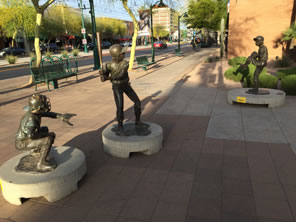 Between the matinee show of Southwest Shakespeare's Henry IV, Part One, at the Mesa Arts Center and my midnight flight home on Saturday, I strolled up and down Mesa's Main Street. Statues of iconic institutions and people representing the community's history decorate both sides of the boulevard. I came upon one of a boy sitting on a bench and holding a baseball, a dog sitting expectantly in front of him. Another statue—actually, three individual bronzes—portray children playing baseball: a catcher and a batter near the street corner, a pitcher several feet away. After my hugely enjoyable and productive Canon Project visit with Southwest Shakespeare, these statues seemed such a great segue to the coming start of our baseball season.
Between the matinee show of Southwest Shakespeare's Henry IV, Part One, at the Mesa Arts Center and my midnight flight home on Saturday, I strolled up and down Mesa's Main Street. Statues of iconic institutions and people representing the community's history decorate both sides of the boulevard. I came upon one of a boy sitting on a bench and holding a baseball, a dog sitting expectantly in front of him. Another statue—actually, three individual bronzes—portray children playing baseball: a catcher and a batter near the street corner, a pitcher several feet away. After my hugely enjoyable and productive Canon Project visit with Southwest Shakespeare, these statues seemed such a great segue to the coming start of our baseball season.
"Are you at the [office] garage?" I ask. "I don't know," she says, effort becoming more obvious in her voice. "I see the highway and the ramp. Yes, I think I'm at [office]." She might drift away any moment. "I'm on my way," I say, realizing I can't call 911 because I'm not certain where she is. …
For Sarah and me, baseball is as great a passion as Shakespeare. Why not this year combine them in the upcoming breakaway weekend? I thought. My "oblivion break" would instead be a great opportunity to set aside all other responsibilities and give dedicated time and attention to the Canon Project together when we are not attending a game. With no game tomorrow and Sunday's game starting at 8 p.m., that's two fully open days (plus, snow is in Saturday's forecast, jeopardizing that day's game). With this simple reconsideration of the weekend, the Canon Project's biggest organizational task began looking like real fun. I photographed the statues of the kids playing baseball and was all smiles as I headed to the car and on to the airport and home.
I call Sarah as I drive into her workplace parking garage. She guides me to where she is parked, next to a pillar in deep shadows where nobody would have spotted her passed out in the car. She is woozy but OK and determines that she wants to go home rather than to the hospital. I get her and her purse and lunch bag into my car, call one of her colleagues to get word to her boss about what has happened and that her car would be in the garage overnight. We head for home. Her haziness bothers me, though; she can't tell me anything about her morning except that at one point she noticed the dashboard clock saying 9:00—she doesn't even remember driving to work. I detour toward the emergency room. The same doctor who treated her vertigo attack is on duty, but immediately upon seeing her he says, "This is not vertigo." But what is it?…
We still don't know. Sarah was discharged that evening but destined for another series of medical tests, which began yesterday. Meantime, she is not allowed to drive. She's been terribly tired and has mostly been lying in bed. At times she seems alert, but most of the time she looks dazed. She's suffering no pain, but her gaze testifies to psychological distress, a deeply distant look I saw in my dad's eyes in the weeks after his stroke. I know what mental instability is like from my own deep bouts of depression, but how does one deal with a brain that just decides to shut down for whatever reason?

Sarah, on the roof of the Hampton Inn across from Nationals Park in Washington, D.C., two hours ago when I started writing this entry. Above: Spring training banner in Mesa; Nationals Park at the dawn of Opening Day; statues of children playing baseball on Mesa's Main Streat. All photos by Eric Minton.
With her prognosis a mystery, the questions pile on. Can I leave her for the many trips the Canon Project will require? She can't drive, so how does she get back and forth to work when I'm traveling? Can we afford hotel rooms near her workplace while I'm traveling? That's what we did three years ago when she went through her heart trouble and I was commuting to Charlotte, North Carolina, every three weeks to tend to my father. However, the Canon Project and emergency home remodeling have left our ledger riding on a thin margin. If she's not working (she's a contractor), two-thirds of our income vanishes. How much do we rely on her working remotely? Don't think I'm being self-centered in asking these questions because the solution, I know, is obvious: kill the Canon Project. Sarah bristles when I broach it, so I put that decision off until we know more.
Every day this year we are reading a Shakespeare sonnet—kind of a daily Shakespearean devotional. Today's is omen-worthy perfect, Number 75:
So are you to my thoughts as food to life,
Or as sweet-season'd showers are to the ground;
And for the peace of you I hold such strife
As 'twixt a miser and his wealth is found;
Now proud as an enjoyer and anon
Doubting the filching age will steal his treasure,
Now counting best to be with you alone,
Then better'd that the world may see my pleasure;
Sometime all full with feasting on your sight
And by and by clean starved for a look;
Possessing or pursuing no delight,
Save what is had or must from you be took.
Thus do I pine and surfeit day by day,
Or gluttoning on all, or all away.
What is the omen? I wonder. When I started writing this entry, Sarah was eager and alert; now she's lying on the bed, appearing woozy and complaining that she feels bad but not able to describe symptoms.
It's Opening Day, the start of an Oblivion Break dedicated to baseball and Shakespeare. Or…
Tuesday, April 10—Yes, Ma'am
When my wife, Sarah Smith, goes all colonel on you, just salute and say, "Yes, ma'am"—even 10 years after her retirement from the Air Force.
Sarah was still wobbly as noon approached last Thursday when I posted my previous entry on this journal, but she insisted that we go to the home opener ball game. Yes, ma'am.
It was windy cold, the Nationals lost, and Sarah was miserable the entire time. She sat as still as possible, eyes closed in a constant battle to maintain equilibrium. She stood only for the National Anthem before the game and "God Bless America" at the start of the seventh inning stretch, but she didn't even remain standing for "Take Me Out to the Ballgame"—by that time I'm sure that was not a sentiment she could embrace. Our season-tickets friends around us queried me surreptitiously and, after the game, wished her well as we waited for the crowd to thin before we headed up the stadium steps to the concourse and back across the street to the hotel. Dinner afterward was an abbreviated affair, and she was in bed by 8 p.m.
She was chipper and eager Friday morning—for about an hour. The dizzy spells hit her again, and this time I went all colonel spouse on her. We checked out of the hotel, went home, and I got on the phone to various doctors and MRI labs to get treatment going (I went all colonel spouse on everybody). We at least got in to see the nurse practitioner of our primary care physician who, upon examining Sarah, joined our efforts to expedite matters with Sarah's neurologist (whose offices had moments earlier told me to "follow up in eight to nine weeks").
One hangup is that Sarah needs an MRI, but her pacemaker requires special protocols. Despite the fact that she's had such a protocol-specific MRI a couple of years ago at the same lab, we're hitting a bureaucratic buzz saw. They don't have access to her records the last time she had the procedure done? They don't have access to her cardiologist with the information they need? They don't accept that information from me who easily got it from her cardiologist? They can't return phone calls? Of course they do, do, could, and can, but won't, won't, won't, and won't.
More and more I'm feeling like we're an inconvenience to our health care providers when it should be the other way around. I salute our primary care physician and his team at Fox Mill Family Practice, who made time for us, did a thorough exam, listened (and read the emergency room reports), and turned advocate. Exemplifying the more prevalent attitude we're encountering is what I saw when I took Sarah to her neurologist last Wednesday for an EEG: the reception windows are completely covered in paper with a sign saying "use computer to check in." You want bedside manner in health care? Go to a good hotel. The folks at the Hampton Inn Navy Yard in Washington were deeply caring and bent over backwards to assist us as we checked out three days early on a filled-to-capacity weekend. There's a reason I'm a Hilton Honors diamond member. Too bad Sarah can't get diamond membership credit for the various doctor visits she's had to make the past three years.
By the way, going "all colonel" is not a casual joke. It factors into the future of this Shakespeare Canon Project, so allow me to explain this attribute by describing two events.
When Sarah was a lieutenant colonel and maintenance squadron commander, she was deployed and, by virtue of her rank, ended up being troop commander for the contracted flight of military members heading overseas from Atlanta. The plane had mechanical problems after arriving in Ramstein Air Base, Germany, and was grounded. A couple of days passed, and other deployment flights passed through, but Sarah's flight and all the other passengers in her charge kept getting pushed back, whereupon she took the matter up with the Ramstein aerial port commander. In her email to me, Sarah said she went "wall-to-wall" with that person. That night I attended a unit banquet and met up with some of her squadron's senior NCOs (non-commissioned officers) who told me she and the rest of the flight were now en route to the Middle East. I told the guys that she told me she had gone "wall-to-wall" with the aerial port commander, and they all said, "Oh, yeah, we know what that's like." "I guess you do, too," one said. No, I didn't, and they went on to describe the ferocity they had sometimes seen in her or heard through the closed door to her office. "She's great: I'll take a bullet for her," one said. "But don't be stupid and piss her off."
When I was the magazine editor for the Reserve Officers Association, one of my peers, the director of industrial affairs, was a retired Air Force chief master sergeant (the most senior of NCOs). "Chiefs" are the backbone of the U.S. military services, highly respected by most officers (and especially by Sarah), so I knew to strike up a close relationship with her. We became good friends—and had been for four years when one morning she told me, "I met Colonel Smith for the first time yesterday." I looked at her, puzzled. "You've met Sarah before," I said; in fact, we've often socialized together. The chief looked at me steadily: "Oh, I know Sarah. But yesterday I met Colonel Smith for the first time." Ah, right. Sarah was waiting in the car outside to pick me up for a dinner date, but my boss had waylaid me on my way out. The chief, leaving work herself, saw Sarah and with a cheerful greeting told her I would be down soon. From her own 30-year service career, the chief recognized from the look and vocal tone of Sarah's response that it was best to turn around and stay clear of the colonel.
That colonel was actually in a great mood this past Saturday. The medicines prescribed on Friday appeared to have stopped the dizzy spells, and she was well-rested enough to determine we should go to Saturday's ballgame. We spent Sunday working on the Canon Project itinerary, but because of the time and temperature of Sunday night's game, we opted to stay home and watch it on ESPN (I'm beginning to worry about how many tickets we'll have to eat this season). Yesterday she was ready to return to work. I offered to camp out at a coffee shop nearby, just in case, but she didn't see the need. Moot point: by the time I drove into her workplace, she was in distress. I drove her back home, got her back to bed, and made another appointment with her primary care physician for this morning. She's spent the entire time since in bed.
Let's survey my own situation here. I can't leave Sarah alone until we get a diagnosis and treatment, nor is she allowed to drive until then. She can't travel—for two days now, 30 minutes in the car wrecks her. Meantime, the medical community is dragging its feet (though today, her doctor did a few more lab tests to rule out other factors and, armed with that information, got the neurologist to see Sarah tomorrow). Clearly, at the least, I have to suspend the Shakespeare Canon Project, right? Except that Sarah goes all colonel on me when I bring that up, even in her current condition. There's a history here, the flip side of what being "all colonel" means. That colonel's spouse altered his career and passed up opportunities to accommodate his wife's service. Then, even after her retirement, that spouse sidetracked his career to care for his stroke-adled father. Sarah doesn't want to be the cause of sidelining me again—and I'm cognizant of not unsettling her psychological state anymore than it is. So, we'll carry on, planning ahead but taking it day by day.
The experience of the past week has taught me that I have no choice but to take each of Sarah's days according to its own dictates. Yet I also have no choice but to complete the Shakespeare Canon Project. Yes, ma'am.
Monday, April 16—Puzzlementation
The puzzle is completed—except for one missing piece. Last night I finished working out my Shakespeare Canon Project itinerary, scheduling more than 38 plays at more than 38 theaters. The journey resumes—egads! this morning.
I've been able to fit in all but 1 2/3 of the traditional canon plays. Henry VIII still has not made it on to any playbills for 2018 (I've heard of a couple of productions planned for 2019). Any artistic directors out there who want to do a staged reading, let me know. Also lacking is Henry VI, Part Two. One theater is doing a conflation of the entire first Henriad tetralogy, and I've included that on my schedule, but so far I've seen no individual production of Part Two announced for this year. Resorting to a conflation for Part Two credit is not my ideal, but it at least allows me to address the debate over whether the Henry VI plays (and the two Henry IV plays, for that matter) should be produced separately or combined. My personal opinion can be summed up in the fact I've subtitled this project "38* Plays, 38* Theaters, One Year" with asterisks denoting "productions of apocrypha plays or the poems that would increase this number," not "productions combining the three Henry VI plays or both Henry IV plays that would decrease this number."
Two titles I have not yet assigned as I await a couple more scheduling announcements and weigh geographical considerations with calendar space. Meanwhile, three plays from the Shakespeare apocrypha are on my schedule, two of them full-scale productions and one—well, I'll explain a little lower down. Another apocrypha play has been announced but not scheduled.
Was it easy? No: I've spent two days lining up the schedule (neglecting our income tax returns). Between Memorial Day and Labor Day I will be home only a dozen days, and the extensive travel continues into October. The next hurdle: actually booking the trips. For example, many one-chance-only productions are scheduled the last two weeks in July, so I'll be heading down to Florida, then over to Texas, then up to Saskatchewan, and over to Newfoundland with hardly any time to spare. I've been able to achieve good geographical coverage of Shakespeare across the continent, and all four corners are represented (a fifth corner, Hawaii, didn't make it through the late July traffic jam). I've also made a concerted effort to represent the full spectrum of theater types and presentation styles, from puppets to musicals. The only style of staging I currently lack is a staged reading (Henry VIII, anyone?).
Credit me not with planning skills; credit Shakespeare. That I will be able to see in one year every play (save one) that he's said to have had a hand in writing, each at a different theater on one continent, is a testament to his continuing popularity.
One production I hoped to work into the schedule is a Southwest Shakespeare Company conservatory project centered on Sir Thomas More, including a production of the play touring to other theaters in Arizona and Southern Utah. Unfortunately, that tour lands during that July jam. Anticipating I wouldn't be able to see a full production of the play, I worked out an arrangement with the artistic director of New York City's Night Shift theater company, which has been hosting "Drunken Shakespeare" at Bar Nine in New York City for several years (not to be confused with the "Drunk Shakespeare" production in New York). This is a kind of Shakespeare karaoke. Anyone—actors or not—is invited to speak speeches and play scenes from Shakespeare's plays for fun, prizes, and patrons' entertainment.
At tonight's Drunken Shakespeare, the company's artistic director will present the Shakespeare-penned speech on immigration from Sir Thomas More. I've added it to the itinerary: hey, it's an apocryphal play, so I'm allowed an apocryphal representation of it. At least Shakespeare's single and singular contribution to the play, addressing an important social issue in 2018, makes it into this discussion. It also allows me to turn the Canon Project spotlight on a particularly personal relevance of Shakespeare. The artistic director of Night Shift is my son, Jonathan Minton.
Speaking of personal relationships…
I venture back up the Jersey Turnpike today with some trepidation, for I'm leaving Sarah at home. We have had progress in her medical situation. The neurologist diagnosed a condition, which may be adult epilepsy, that is causing "intellectual seizures" along with the memory and cognitive issues I've been witnessing in her the past couple of years. The seizures are hitting the left lobe of her brain, so it doesn't cause the convulsion type of seizure but rather cramps the brain's intellectual processing. He believes the condition can be controlled with medication, and he's started her on a two-phase regimen to test the diagnosis and establish a prognosis. Meanwhile, her lab work indicated the presence of an infection, which could have exacerbated her condition. So, she's on antibiotics, too. She had more episodes last Wednesday and Friday, but since starting the new meds she's had a great weekend—she even took over the income taxes for me (so maybe she is delirious). Still, since these episodes started happening two weeks ago, she's not gone more than two days without one, so today is a big test of the medicine's efficacy. I won't leave the house until I'm reasonably certain she's going to be OK and safe (and the neighbors are on standby).
Sir Thomas More (excerpt),
The Night Shift's Drunken Shakespeare
Bar Nine, New York, New York, April 16
Two elderly men walk into a bar. "We've come for Shakespeare," one says. This is not a joke. Nor is this event they have come to see, Drunken Shakespeare, which its organizers, The Night Shift theater company, proudly describe as Shakespeare karaoke.
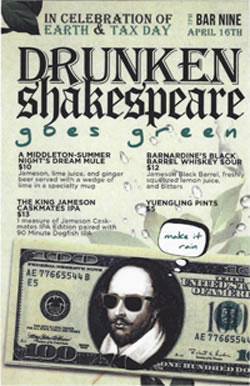 I am at Bar Nine on 9th Avenue in Manhattan's Hell's Kitchen where people will take the stage to speak a Shakespeare speech or sonnet, off or on book (or mobile phone). The evening encompasses four "acts" of six presentations each, with one of the participants in each act winning a free drink at the bar by luck of the draw (there's also raffle prizes by sponsors). For one such draw, the host tucks slips of paper bearing the participants' names in his belt, and the "raffle wench" pulls the winner out by her teeth—quite the erotic name-from-a-hat technique. "Hey nonny, nonny!" the host shouts to open the proceedings, triggering the nightlong call-and-response cheer. Performers use the phrase to signal the end their speeches, and the audience responds in kind with a hearty "Hey nonny, nonny!" Such hijinks and low-jinks run through the festivities, but as for the Shakespeare itself, the deal is real. Speeches include Puck, Richard II, Rosalind, Benedict, Henry V's Chorus (not his first speech but "a little touch of Harry in the night"), Lady Anne (chugging a pint glass of brew midway through), Gonzago, Paulina, and a sonnet sung.
I am at Bar Nine on 9th Avenue in Manhattan's Hell's Kitchen where people will take the stage to speak a Shakespeare speech or sonnet, off or on book (or mobile phone). The evening encompasses four "acts" of six presentations each, with one of the participants in each act winning a free drink at the bar by luck of the draw (there's also raffle prizes by sponsors). For one such draw, the host tucks slips of paper bearing the participants' names in his belt, and the "raffle wench" pulls the winner out by her teeth—quite the erotic name-from-a-hat technique. "Hey nonny, nonny!" the host shouts to open the proceedings, triggering the nightlong call-and-response cheer. Performers use the phrase to signal the end their speeches, and the audience responds in kind with a hearty "Hey nonny, nonny!" Such hijinks and low-jinks run through the festivities, but as for the Shakespeare itself, the deal is real. Speeches include Puck, Richard II, Rosalind, Benedict, Henry V's Chorus (not his first speech but "a little touch of Harry in the night"), Lady Anne (chugging a pint glass of brew midway through), Gonzago, Paulina, and a sonnet sung.
Drunken Shakespeare is always on a Monday night though irregularly scheduled. Waiting for the event to start, I often hear mention of Shakespeare in the oscillating hum of bar conversation. Many in the room seem to be frequent attendees, the majority in their 20s and 30s. Those two elderly newcomers are sitting around the corner of the bar from me, so I eavesdrop awhile on their Shakespeare-infused conversation as I watch the start of the Nationals–New York Mets ballgame on a TV screen above the stage (I will have to purposely employ my amblyopia tonight, with one eye on the Shakespeare performances and the other on the Nationals, who are slumping and in danger of falling insurmountably behind these Mets in the division).
I'm about to introduce myself to the two men when another Drunken Shakespeare first-timer approaches me to say hi: Ross Neal, a two-year member of American Shakespeare Center's touring troupe based at the Blackfriars Playhouse in Staunton, Virginia. Neal, now working in New York and living in the neighborhood, read about Drunken Shakespeare and decided to try out one of his audition pieces tonight, Brutus's contemplation over joining the conspiracy to assassinate Caesar. I later note the Blackfriars quality in his performance: solid verse-speaking technique and direct address to individuals as he strolls through the crowd of about 30 raptly attentive people (no one's watching the Mets beating up the Nationals, the Yankees routing the Marlins on a TV screen at the far end of the bar, or a pro wrestling "Raw" telecast on a screen high on the wall in the middle of the room). I begin thinking that casting directors should attend Drunken Shakespeare (incognito, of course). Neal not only gets a hearty "Hey nonny, nonny!" and applause from the crowd, the raffle wench picks his name out of the host's breast pocket for the free drink (she uses her fingers for this first drawing).
Many performances are serious. Chris Diaz does Lady Macbeth's letter-reading scene infused with such heartfelt romantic devotion for her husband that I am left slack-jawed. Others play to the room's party atmosphere. Tom Harney does Touchstone's shakedown of his love rival, William, from As You Like It, ending with "I will kill thee a hundred and fifty ways," whereupon Harney shows us some of those ways. He channels The Lord of the Rings, Star Wars, Alien, and The Walking Dead, then asks for suggestions, receiving audience prompts to hang himself (even miming kicking the chair out from underneath), be struck by a train, drown, and succumbing to an attack of killer bees. I am left slack-jawed.
A woman named Madison and her friends, regulars at Bar Nine, happen upon Drunken Shakespeare tonight, and she becomes fascinated in the program. I see her at the back of the bar mouthing along to Diaz's Lady Macbeth speech. She signs up to do one of the Jailor's Daughter's speeches from The Two Noble Kinsmen. I have no idea if she is a trained actress, but she gives an arresting performance of a young woman caught up in her own romantic fantasies. She, too, wins a free drink, the raffle wench using her teeth to pull Madison's name from the host's teeth as they do a dance dip.
The Nationals, down 6-1, score six runs in the eighth inning and tack on a home run in the ninth for an essential 8-6 win. It's a good night, though I marvel most at the rich Shakespeare I'm seeing, ranging from an electrifying Portia (Lucy Lavely, the raffle wench) trying to waylay Bassanio from choosing among the chests in The Merchant of Venice, to Sam Finn Cutler doing Caliban from The Tempest like Gollum from The Lord of the Rings: "All the infections that the sun sucks up from bogs, fens, flats, on Prosper fall and make him by inch-meal a disease!" "When I first read Caliban I pictured Gollum in my head," Cutler tells me afterward. He says he attended his first Drunken Shakespeare about a year ago, "and I'm addicted. I love karaoke, and I love Shakespeare."
"When you walk into karaoke, you don't expect to get Whitney Houston, but sometimes you get Whitney Houston," the host, Night Shift Artistic Director Jonathan Minton, says after the show. The other Shakespeareans have headed out into winter's return to New York on this April evening, and he and I are sitting together at the back of bar, he downing glasses of water, me sipping from a goblet of cabernet. Having hosted Drunken Shakespeare for about four years now, he says, "I continue to be surprised by a performance every time we do this. Honestly, some of my favorite Shakespeare, and in some cases best Shakespeare, I've ever seen has been here."
This is a guy who has been watching live Shakespeare productions since he was 7 years old. That's when I took him and my other son, 2-years-younger Ian, to their first live Shakespeare production, Hamlet at American Players Theatre in Spring Green, Wisconsin. Jonathan has seen the breadth of prime North American theater companies from his childhood to now, and he has acted with Pennsylvania Shakespeare Festival and Shakespeare Theatre of New Jersey, as well as several New York City companies. He directed Measure for Measure last year for Night Shift.

Jonathan Minton, right, performs William Shakespeare's penned speech in Sir Thomas More during Drunken Shakespeare at Bar Nine as a discerning critic (his father) watches. Photo by David Bradford, Night Shift.
This night, it is he who reaches the highest of echelons, achieving pin-drop silence as he speaks the Shakespeare-penned speech by the title character of Sir Thomas More—even Bar Nine's ambient sounds cease during his performance. Written in the early 1590s, the play had trouble getting through England's censor. Some 10 years later, several playwrights worked on a revision. Shakespeare wrote just the one scene of More as undersheriff of London quelling an uprising by London's apprentices and laborers against "the strangers," i.e., immigrants. I've never seen the play—only read it for the first time today—but I wanted to represent at least Shakespeare's speech in the Shakespeare Canon Project, so I suggested to Jonathan that he perform it for Drunken Shakespeare—which I'd never seen before tonight, either.
Yes, I'm opportunistic, but I also knew what Jonathan would do with the passage. He gives a gripping performance as he moves through the room. "You'll put down strangers, kill them, cut their throats, possess their houses, and lead the majesty of law in lyam to slip him like a hound," he says with piercing authority, turning the audience's polite listening into conscience-disturbing attention. The Bar Nine patrons know what More is referring to and why Jonathan is speaking these lines in 2018—even in New York City, the most multiculturally blended city I know. More's logic comes full circle as he points out that, should the Londoners treat foreigners so atrociously, "What country, by the nature of your error, should give you harbor? Go you to France or Flanders, to any German province, Spain or Portugal—nay, anywhere that not adheres to England—why, you must needs be strangers." The complete silence gives way to utterances of consent.
"There's no doubt but mercy may be found, if you so seek it," Jonathan's More says looking into the eyes of various Drunken Shakespeare patrons. He pauses a short moment and, still using More's serious, firm tone, says, "Hey nonny, nonny."
"Hey nonny, nonny!"
To read the review of this production, click here.
Friday, April 20—Magic Waters
There is nothing quite as fun as two Shakespeare geeks getting together over their shared passion.
We arrive at Tom Delise's townhome in a leafy neighborhood in downtown Baltimore, Maryland. What looks like a shaggy white pillow on legs (a Japanese spitz) greets us with excited barking. His name is Shakespeare. “Hey,” Delise greets us, intervening in Shakespeare's path to allow Sarah and me through the door. “You're in the proper colors,” he says noting our black and orange garb. Watching us intently from her bed in the dining room is Hermione, a 13-year-old shepherd-chow mix with paralysis of her hind quarters. Delise picks her up and carries her as he ascends the winding staircase. Sarah, Shakespeare, and I follow to Delise's library, boasting more than 1,000 books on and by William Shakespeare. An all-black cat, Ophelia, joins us.
Delise is counting the days to his retirement as a high school English teacher. "Thirty-eight! I hate the weekends because the number doesn't go down." In that career he started staging touring Shakespeare plays by his students, which led to his other career, as founding artistic director of the Baltimore Shakespeare Factory. "Bare Bones Shakespeare" is the company's motto, producing plays relying on text-centric presentations and original staging practices. The company takes the latter a significant step further by producing one play each year using Original Pronunciation. We are in Baltimore this weekend to see this year's OP offering, Othello.
But not tonight. Delise is taking us to a baseball game. We're in the "proper colors" of the Baltimore Orioles: Sarah in her quilted Orioles team jacket, me in an Oriole-emblem polo shirt over a historic, orange-sleeved t-shirt, both of us wearing official team hats. Delise is wearing an orange Orioles jersey. He has a two-seat season ticket plan and added a seat next to his pair for tonight's game against the Cleveland Indians at Camden Yards. Sarah and I travel the country each year attending Major and Minor league games, and we've been to Camden Yards many times starting with its debut season in 1992. Before the Nationals arrived in Washington, D.C., Sarah, a Cal Ripken fan, pledged her devotion to the Orioles while I maintained my allegiance to the Atlanta Braves, but we also have the official game hats of every team we visit (current count: 268 hats).

Tom Delise, left, and Eric Minton stand outside Camden Yards. Photo by Sarah Smith.
Delise and I talk baseball whenever we get together at Baltimore Shakespeare Factory plays, and the topic occupies the latter half of every email we send each other. We've often mentioned seeing a game together, either here or down in D.C., and we're finally doing it. He's a traditionalist, as am I. Despite following an American League team, he prefers baseball without the designated hitter, and he doesn't like the instant replay on umpire calls instituted a few years ago. Human error is part of the game for umpires as well as players, he contends. Delise has been so busy directing Othello and making up for the loss of his managing director, who left for another job a few weeks ago, that he isn't aware of the new rule limiting mound visits per game (I like it—it does speed up the game, but it does so by inserting a new element of contextual strategy). Another new rule being tested in the Minor Leagues is to start each extra inning with a runner at second. "Are you serious?" Delise cries incredulously. I shake my head, too. That rule undermines the essence of baseball the same way that making the goings on in Elsinore a figment of Hamlet's or Horatio's imagination runs contrary to the essence of Shakespeare's Hamlet.
Orioles starting pitcher, Dylan Bundy, throws the game's first pitch as we reach our upper deck seats just to the third base side of home plate. Good seats: we have a perfect view of every pitch's location as it passes (or doesn't pass) the batter. We immediately witness why these Orioles are off to a horrendous start this season as their catcher, rookie Chance Sisco, lollygags on a foul popup that drops to the ground a couple feet in front of him. Pretty soon the bases are loaded with only one out, and Bundy hits Edwin Encarnacion with a pitch, scoring the game's first run. That's all Cleveland gets.
When Delise was 7 years old growing up in New York, two bullies pinned him against a fence and ordered him to cast his lot for the Yankees or the Mets. Choosing the Mets, they told him, guaranteed a beating. Delise had no affinity for either team, but he told them the Mets, early evidence of the defiant nature of a man who now steers a text-centric, OP-playing Shakespeare company into the headwinds of an attention deficit disorder–afflicted society. He took the beating, developed a passion for the Mets, and gained his baseball identity, even burning his Mickey Mantle baseball cards. "He was not even worthy of putting on my bicycle wheel," Delise says. "I was a Mets fan. I burned Roger Maris, Yogi Berra." Yogi Berra?! I reply, astonished. "He was a Yankee," Delise says matter-of-factly.
This was back when the Mets were perennial losers, before the "Miracle Mets" won the 1969 World Series against the Baltimore Orioles behind pitcher Tom Seaver, Delise's childhood hero. The most searing heartbreak he has ever known, he says, occurred when the Mets traded Seaver to the Cincinnati Reds, a tragedy of Shakespearean proportions. He's a solid partisan for the Orioles now. Still, attending every Opening Day with a lifelong Oriols fan, Delise can't help dropping the date 1969 into their conversation, poking into his friend's own wounded heart.
After his rocky first inning, Bundy has been handcuffing Cleveland's batters. In the fourth inning, Orioles shortstop Manny Machado's line drive over the center field fence ties the game. In the next inning, Trey Mancini's double to deep center field puts Baltimore on top 3-1. A couple innings later, Machado makes a diving snag of a ground ball up the middle to kill a Cleveland rally.
I've encountered several Shakespeareans who, like Delise and me, are as passionate about baseball as they are about the Bard. We like other sports, but baseball reaches our emotional-intellectual core the same way Shakespeare does. Within baseball's strict rules and mathematical structure resides a vast canvas of human drama, just as in Shakespeare's rhythmic verses. Despite its centuries-old traditions, Shakespeare's plays are always new and in the moment; so is every baseball game. Shakespeare's plots, themes, and imagery play out on multiple layers, each character as complex as human nature, each word carrying varying contextual meanings. In baseball, every single pitch resides in the context of that one of three outs in that one of nine (or more) innings, each inning approached in the context of that one of 162 (or more) games in the season. When the pitcher releases that ball, life unfolds in infinite ways.
Baltimore's 3-1 lead holds up for a win. In just under three hours we are walking out of Camden Yards, buzzing about the game, the one we've just seen and the one that fuels the memories in our heads and the possibilities in our hearts. "They'll watch the game, and it'll be as if they'd dipped themselves in magic waters," says Terence Mann in the movie Field of Dreams. "The memories will be so thick, they'll have to brush them away from their faces. The one constant through all the years… has been baseball. America has rolled by like an army of steamrollers. It's been erased like a blackboard, rebuilt, and erased again. But baseball has marked the time."
We can substitute "Shakespeare" for baseball in that passage. The speech even sounds Shakespearean, given that the actor who speaks it in the movie is James Earl Jones. People here in Baltimore still talk of Jones and Christopher Plummer in a touring production that stopped at the Mechanics Theater downtown in the early 1980s. That production was Othello.
Othello,
Baltimore Shakespeare Factory
St. Mary's Community Center,
Baltimore, Maryland, April 21
I hear the question this weekend more than I ask it: Why stage a Shakespeare play using Original Pronunciation?
OP is the brogue of English spoken during Elizabethan and Jacobean times. It is the dialect William Shakespeare spoke and, more importantly, heard when he wrote his plays. It is the reason Shakespeare rhymed love with move. It is not Early English (Beowulf) or Middle English (Chaucer) but early Modern English, and though it sounds unlike anything we hear today on the streets of America, Australia, or England, it yet seems familiar. Some liken it to the dialect of New England watermen or the Deep South—or both in one. When I first heard a small sample in my college days, I thought it sounded like pirates, but the more I'm exposed to it, the more I hear echoes of the North Carolina Appalachia of my hillbilly heritage.
Even without OP, many proclaim to have issues with Shakespeare's early Modern English spoken in contemporary Modern English. That issue, though, is not Shakespeare's language but actors not well versed in speaking it (I can't count the times I've heard people think a textually pure Shakespeare production expertly delivered has been "translated" into Modern English or is being "dumbed down"). Nevertheless, if Shakespeare already suffers an accessibility issue, why layer on OP? The Baltimore Shakespeare Factory's production of Othello is the company's fourth annual OP outing, and for its director and Founding Artistic Director Tom Delise, it's about the company's core value of getting to the roots of Shakespeare's staging practices.
With its slogan "Bard to the Bone," the BSF strives to re-create Shakespeare's staging conditions: universal lighting (stage and audience share the same light), no sets, few props, and audiences sitting in close proximity to the stage and drawn into the action. The productions are text-centric in that they rely totally on Shakespeare's script for thematic resonance and character arcs rather than a director layering on his or her own conceptual theme. They also are text-centric in performance quality: Delise puts his actors through stringent textual work in rehearsal (see accessibility issues above). All of this, Delise believes, make Shakespeare more resonant for modern times and more entertaining as it reveals the breadth and depth of the Bard's humor—which is really broad and gutter-deep—while many passages invite audience interaction and create an improvisational vibe. Adhering to such principles also sets the Baltimore Shakespeare Festival and its five-figure annual budget apart from the mostly conceptual-style productions at better funded companies abounding in the Capital Region's Shakespeare scene.
"The reason OP appealed to me immediately was if we are going to re-create the lighting, re-create the movement, re-create the characterization, re-create the staging practice and the fast pace—all the things that scholarship seems to agree on regarding the way Shakespeare put on plays—then what is more natural then to actually bring back that language?" Delise tells me. We are sitting in black leather-looking chairs in his office behind the former church's sanctuary that now serves as the playhouse. Delise is describing how he got here aesthetically (starting with his high school students staging Shakespeare plays) and physically (in the one-time home of the now-defunct Baltimore Shakespeare Festival). Delise was introduced to OP in a seminar by Ben Crystal, an English actor who has become a leading practitioner and whose father, English language scholar David Crystal, worked with the Shakespeare's Globe in London to stage full-length OP productions of Romeo and Juliet in 2004 and Troilus and Cressida in 2005.
Delise committed to staging one OP production per five-play season, starting with The Merchant of Venice in 2015. Subsequent productions of The Winter's Tale in 2016 and Antony and Cleopatra in 2017 had mixed results, in part because the OP element ran up against other production issues. For this year's Othello, Delise hired Ann Turiano, who had acted with the company and has expertise with the International Phonetic Alphabet, to become a certified OP coach to train the cast. The result is the most consistent playing of OP I've yet seen.
For the audience, the results are mixed, too, exemplified in the assessments of my wife and me. Sarah says she understood the play better; I feel OP interferes with an otherwise outstanding production featuring a cast as strong as any I've seen in an Othello. That said, OP adds to Othello's masculine musicality as played by Troy Jennings in only his second-ever Shakespeare performance. He and other cast members describe how speaking with OP forces them into a lower register, speaking from the abdomen where the characters' emotions swirl. Jennings and the rest of the cast do not superimpose any psychosocial attributes on their characters—they are just people: rather, such attributes arise naturally through our own relationships with the archetypes these people represent.
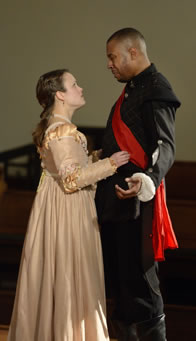
Desdemona (Kathryn Zoerb) and Othello (Troy Jennings) in Baltimore Shakespeare Factory's production of Othello. Photo by Will Kirk, Baltimore Shakespeare Factory.
With a résumé of modern plays and a particular affinity for August Wilson, the 29-year-old Jennings made his Shakespearean debut as Octavius Caesar in Baltimore Shakespeare Factory's Antony and Cleopatra last year. Such was the quality of Jennings' performance that Delise immediately asked him to play Othello. Jennings is a rare specimen: an actor whose multiplay Shakespearean experience is only in OP. Nevertheless, he believes playing in OP has improved his vocal skills for modern roles.
Desdemona in this production, 28-year-old Kathryn Zoerb, has been performing for Baltimore Shakespeare Factory for five years. I've been a fan of hers not only here but also down in Washington, D.C. (she lives in Arlington, Virginia, a two-hour commute to this theater), including with Faction of Fools, a commedia dell'arte company. We are sitting in one of the church pews a few hours before tonight's performance, and I ask her straight up if OP is worth doing. "Yeah," she replies, instantly and forcefully. "It's important to know where things come from, where we come from, how things evolve, why things change." Through both OP and commedia dell'arte, she appreciates digging into theater's roots, which, she feels, enhances her other work in both classic and modern drama. "I think that enriches your soul, not just as an actor but as theater goers. There's a magic in going back to the original version. It's taking a very old thing and dusting it off to feel brand new."
Then Zoerb says something that will spin some heads: OP is the antidote to the pretentiousness Shakespeare is too often dressed in because it brings his work back to the groundlings for whom he wrote it. In other words, Baltimore Shakespeare Factory is being anything but pretentious doing OP, original-staging-practice productions. "This dialect reminds us how growly, earthy, and low" these plays used to be, Zoerb says. When you hear hour sounding like whore and foot rhyming with boot and thereby punning on an appendage of another sort, Shakespeare begins keeping company more with the likes of Amy Schumer and Quentin Tarantino than with Oprah Winfrey and Steven Spielberg.
"Why do OP?" asks a member of the audience in an after-show talkback with the cast. Many among the patrons who stay for the talkback (an audience of about 50 attend this evening) say they appreciated the experience; we don't know the opinions of those who didn't stay, of course. After several actors answer the question, making similar observations to those I've been hearing in my conversations with Delise and cast members, the play's music director, Jim Stimson, provides the coda. Stimson performs in early music and folk ensembles in the region, playing, among other instruments, guitar, cittern, bandora, shawm, and recorder. For Othello he plays a crumhorn in one scene and a lute to accompany Zoerb's performance of Desdemona's song "Willow, Willow" during intermission. "It's like playing a lute instead of a guitar on a Renaissance song," Stimson says. "It's a journey of discovery."
To read the review of this production, click here
Monday, April 23—Vision
Today we celebrate William Shakespeare's birthday. Today, though, we're getting new windows installed in our home (and my office). I'm looking for metaphor in that costly undertaking.
Friday, April 27—You Go, Marbury!
Troy Jennings was a shy kid. He never raised his hand in class. In the ninth grade at Loch Raven High School in Baltimore, Maryland, Jennings' reputation was so entrenched that when a substitute English teacher leading the class through William Shakespeare's Romeo and Juliet called on Jennings to read Mercutio aloud, the other kids laughed. "You want Troy to read? He never talks. How can Troy possibly read this part?" Jennings remembers these taunts with humor, because they were the truth. But the substitute teacher insisted. "He said, 'Troy you can do it, because as an actor it's all about becoming the character,'" recalls Jennings, who describes how the teacher passed his palm down across his face. "I've always remembered that."
Jennings read Mercutio and, by his account, "did a pretty good job. It was like, you go, Mercutio! That was my first time ever really reading something out loud, and it gave me the inspiration to want to do that more."
That substitute teacher didn't inspire Jennings, now 29 years old, to become a Shakespeare fan, but the moment did steer him toward an acting career. Shakespeare didn't really enter his consciousness until last year when he took up a colleague's recommendation to audition for Antony and Cleopatra at the Baltimore Shakespeare Factory. He won the part of Octavius Caesar but was ready to quit after the first rehearsal focused only on textual interpretation and the Original Pronunciation (OP) that particular production would be using. Jennings felt overwhelmed, but he decided that tackling the challenge could only be good for his career, even if he failed.
It was like, you go Octavius! At the end of the play's run, Baltimore Shakespeare Factory Artistic Director Tom Delise asked him to play the title role of this year's OP production of Othello. Because he is playing the title character of the Othello that I am profiling for the Shakespeare Canon Project, on my visit to Baltimore last weekend I interviewed Jennings. Baltimore Shakespeare Factory performs in the sanctuary of the former Episcopalian church that now serves as the St. Mary's Community Center, reconfigured as an Elizabethan theater. I was sitting in the pews with Jennings and Jess Behar, the production's Emilia. Delise was standing by to let me know the next pair of actors were ready for their interviews. As I wrapped up with this pair, Jennings, upon some reflective silence, said, "I kind of got into acting, I feel like, through Shakespeare," and he told his story of the substitute teacher. Behar got excited. She's a former elementary school teacher who now serves as a resource teacher for the Office of English Language Arts with Baltimore County Schools. "Yes!" she occasionally interjected in Jennings' story: "Teachers!" she proclaimed triumphantly.
Jennings nodded. "The power of the teacher," he said. "A great teacher can really inspire you." Behar imagined how cool it would be if that substitute teacher could come see Jennings now, as Othello. She was willing to make tracking down that teacher one of her goals at work for the upcoming week. Delise, a high school English teacher himself, jumped in: if Behar could find the teacher, Delise would invite him to one of the shows on this the final weekend of the production's run. I, however, pointed out that Jennings described him as a substitute teacher: did he even remember the name?
"Edward Marbury," he said. "That would be great to see him and thank him."
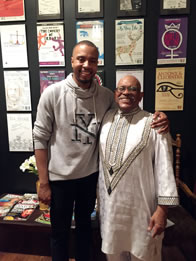
Troy Jennings, left, meets with his ninth grade English class substitute teacher, Eddie Marbury, in the lobby of the Baltimore Shakespeare Factory after Jennings's performance as Othello. Photo by Eric Minton.
Behar tracked him down. Tonight, Eddie Marbury, wearing a white, gold-embroidered dashiki and pant set, walks into the church's vestibule, which serves as lobby and box office. Ed is the name his parents gave him, and because people want to turn that into Edward he goes by Eddie. He was a career teacher who had become something of an institution at Loch Raven, so when he began substituting after his retirement the kids knew him.
He also has theater cred. He was a good enough actor while earning his master's degree at New York University to get noticed in the plays he performed in and had offers to launch an acting career. He chose to teach instead. He's now the director of the Youth Theater of Northern Baltimore County for children 7 to 18 years old; they are currently producing The Pajama Game. He demonstrates the gesture Jennings described of passing his palm over his face, literally wiping off the perpetually smiling expression of this truly genial individual and leaving behind a hard-edged, stoic look. "You have become this character," he says; "you are not John or Sally." Or Troy. Or Ed.
Marbury does not specifically remember calling on Jennings to read Mercutio, but it fits the lesson he always stressed when he taught Shakespeare, even as a sub: read the text out loud. "The plays are meant to be heard, not read," he says, "You miss all the beauty of the language if you're just reading to yourself." By reading or playing the parts, the students begin hearing the rhythms of the verse structure and comprehending the lines' meanings. What seems like a bunch of obtuse words in the head become "you go, Mercutio!" in the room. Marbury leans in close to me to emphasize a point he needs to make: "Teachers in some cases have elevated Shakespeare to the point where they think it's supposed to be difficult and untouchable, and if you understand it then you're an exception. No, no, no, no. Shakespeare didn't write for the exception, he wrote for the people."
On this night, Marbury himself is hearing Shakespeare as if for the first time through the OP presentation. He loves its earthiness, its flow, the clarity in the rhymes and meanings of words, and the way it makes the characters seem more natural. After the actors have taken their curtain call, Jennings addresses the audience, describing his ninth grade Mercutio moment. "You never know the impact you might have on someone; you never know how the words someone might speak to you can move you and inspire you to do better and better in life. And one source for that is a teacher." Jennings invites "Mr. Marbury" up to the stage and hands him flowers and a poster of the production. They hug.
Afterward, back in the vestibule, still shaking his head trying to comprehend the miracle of this moment, Marbury says, "Sometimes we don't know how we affected people. It's incredible to know because you always wonder, did you make a difference? Did what I say in any way make a difference to these students? To see this and have him tell me that is humbling." The satisfaction is not only that Jennings stepped forward to acknowledge him, but Jennings might represent others that Marbury has influenced.
Marbury also experiences on this night the fruit of his teaching methodology. "The tragic thing is that teachers are no longer allowed to teach; now they must prepare students for tests," he says. "Unfortunately, those tests are not what it's about." He points toward the stage in the sanctuary. "This is what it's about. This is the culmination of it. Out of a moment, a quiet individual found his voice, and that gave him a sense of direction, his 'I got it' that he has continued to do what others were saying he could not, and he has done it well." Marbury has just witnessed how well. "I am impressed," he says of Jennings' Othello. "Very much so. Oh my gosh."
Marbury could have earned his own ovations playing Othello, but this night he reaps applause for choosing to be a teacher. This night, he says, is "the paycheck you get that doesn't come from your employer. And it's that which doesn't come all the time, but when it does, it's a big payday. It's incredible. It has to make you feel that you have touched at least one somebody. That's what teaching is all about."
Saturday, May 5—What's in a Number?
One of the driving inspirations for doing the Shakespeare Canon Project this year was this year.
2018 was bound to be volcanic politically and socially, and I wanted to see what William Shakespeare had to say about it as I criss-crossed the continent. The magnitude of all the earth-shaking headlines this year has been far more intense than I could ever have imagined, but Shakespeare seems to have imagined it 400 years ago. He is, incredibly, keeping up with current events, even in original pronunciation and original-staging-practices productions.
I also was certain 2018 would have personal significance because it's the year I turn 60 years old. It certainly has been a year of personal significance, but turning 60 is just a blip that will, in fact, happen tomorrow. Is it a day of dread or celebration? Actually, it's a day I'm hoping to get caught up with work in the office and around the house. I've been kind of busy and distracted lately, and clearing the physical and mental clutter is as nice a gift as I can expect this year.
That actually is a commentary on the whole turning 60 thing. It's supposed to be a benchmark number but, like decades, centuries, and millennium, does the zero on the backend really have significant implications to the state of things? I figured that the Canon Project would somehow bring the day of 60 into some perceptive focus, but you know what? Shakespeare says nothing about 60. Eighty, yes. We know who exactly is 80 years old in the canon—Adam, King Lear, and the Old Man—but the rest of the characters are somewhere between 16 and 80. The closest my age gets to specific mention in Shakespeare is Jacques' reference to the “pantaloon” in the Seven Ages of Man (that would be age number six: Add a zero on the backend and there I am). So, maybe I should have waited until the year 2038 to do the Canon Project.
What is 60? What's in a number? A Sarah by any other number would be just as hot (and, other than her hair, it's all natural). For her 60th birthday last November, we took a romantic getaway to a resort for five days of oblivion. The 20-something guy I saw ogling her at the poolside I'm guessing thought she was pretty hot for a 30-year-old. Now, six months later, it's the oblivion, not the significance of turning 60, that I was looking to replicate this weekend from Sarah's birthday experience (I don't look 30; I look and am shaped as a man in his sixth decade of existence). But life intervenes in other ways than age. That woman just turned 60 but still looking 30 is incapacitated half of the time because of her seizure disorder. Medical report update: her prognosis is still a “work in progress” according to the neurologist, and we're adjusting to a lifestyle in which seizures are becoming an integral part. And that kind of live-alterning plot twist is as Shakespearean as they come, whether tragical, comical, historical, pastoral, pastoral-comical, historical-pastoral, tragical-historical, tragical-comical-historical-pastoral, scene individable, or poem unlimited.
With that, let's turn to the number that really counts for me this year, what started as 38 and is now 41.
I now have scheduled 28 plays at 28 theaters into November. Combined with the nine productions I've already seen, that's 37 plays at 37 theaters, including Henry VIII (three of those are apocryphal). Two titles that have made it onto the matrix I have not yet assigned as I await more information and consider scheduling options. One title has been assigned but the production not yet formally announced. Just one title, Henry VI, Part Two, has not yet appeared individually on a playbill, but I have the option of attending a production conflating it with the other Henry VI plays. Although a couple of regions ended up with five productions each—and that was more a product of the types and titles of those particular productions rather than locale (even scheduling didn't factor into it)—I reached my goal of getting representation in every geographical region of the continent. I'm also going corner to corner: Miami, Newfoundland, Fairbanks, and San Diego. I could not fit a trip to Hawaii in, but I am going to Saskatoon.
So let's not wish me a happy 60th. Let's make it a happy 41!
Saturday, May 12—The New Normal: Hope Less
Sarah is upstairs. She's in bed. It's just turned 3 on this Saturday afternoon. I expect her to stay in bed for another hour, and another of her days will have passed by without her. Everything we planned to do today—and we spent more than $5,000 yesterday in anticipation—has slipped into the murky domain of "someday, maybe."
Our new normal is hope less. Not a typo, that, nor should it be misconstrued as giving up. Quite the opposite: It speaks to a determination to do and be all that we still want to do and be.
Starting last Friday, a week ago yesterday, Sarah had no seizures or dizzy episodes for six days. The previous such stretch was three days. We didn't celebrate my 60th birthday last Sunday because Sarah was due for an episode, so why tickle me with anticipation? However, she not only kept churning along, she began displaying marked improvement in her cognitive abilities. By Tuesday I was marveling at the witty, intelligently decisive woman I fell in love with but hadn't seen for the past couple of years. Her intellectual lapses I originally thought were an aftereffect of her heart disease and thyroid cancer three years ago; I feared might be the early onset of dementia; and now I've learned is a by-product of the condition causing her seizures. Her current medication seemed to be working on all fronts.
Wednesday evening, with hope riding high, we made our plans for this weekend: replace my laptop, which had become too ancient to handle the heavy lifting the Shakespeare Canon Project will require on the road and get Sarah a new iMac. Sarah's "new" computers have always been my hand-me-downs when I upgrade. She gets all the latest technology she needs at her job, and at home she uses a computer only to surf through news and clothing sites. Now that she has to work from home for the foreseeable future and I'm still happy with my office iMac, we decided to get her a new desktop that she can set up any way she likes rather than inheriting my quirks and anal tendencies.
Thursday morning, she got up—and then she was down and out, suffering from another seizure and its consequences. That was the moment I decided to quit hoping, and I put this determination to the test yesterday. She made it through the day OK, but because her spells seem to come around midmornings, we waited until late afternoon to leave the house (also allowing her to make up the work hours she lost on Thursday). In addition to getting our new computers, we shopped for Shakespearecurean ingredients, planning to work this weekend on improving our Macbeth menu of recipes. We kicked off the weekend by staying up to midnight watching the Washington Nationals on TV win yet another baseball game (they're on a roll), after which we went upstairs and circled the bases ourselves.
This morning was like Christmas: I woke up around 6, raring to go. Sarah slept another two hours, came down to the office, cleared off her desk for her new computer, and then watched as I finished fixing breakfast. The centerpiece was an omelet themed on Lady Macbeth with green onions, roasted red peppers, smoked ham, savory, and sour cream. I was just about to dollop on the sour cream when I looked over and saw Sarah staring down at an empty space of the counter.
"Are you alright?" I ask this question a dozen times a day now. She looked up and I saw that "out of sorts" look, her description of how she feels at the onset of a seizure. "I think I'm going to sit down," she said, weariness in her voice, absence in her eyes.
"No, get upstairs to bed," I said. Reluctantly, she did. I finished cooking the omelets, laid out the plates, and then went up to check on her. She was cold to the touch, which seems to be a symptom of these spells, so I told her to get under the covers. Then I saw the tear pooling in the corner of her right eye and spilling toward her temple.
Being a caretaker is stressful, frustrating, aggravating, irritating, angering. I admit all that. My back is so knotted my massage therapist scheduled me for four sessions this month, evidence of what I don't express outwardly. It's honorable to say, "I do it because I love her," and that's true. It's also honest to say I'd be much, much happier if she'd just get well, you know? Nevertheless, the greater emotional toll for the caretaker is watching the person you love toiling with her new reality. I learned that in the six years I took care of my father after his stroke. I never grumbled about the long drives, the social and work disruptions, and dad's new behavioral quirks because I saw the real struggle in his eyes: a man missing what he once was but still striving with great courage, humor, and determination to be loving, loved, and useful.
I'm back in the caretaker role again with Sarah. Three years ago, until they discovered what was happening with her heart, my key responsibilities were doing all the driving and being hyper-aware of her proclivity for passing out every 36 days. This time, again I have to do all the driving and make sure she's in a safe space, but we never know day to day if we're getting the fully engaged Sarah or that "out of sorts" look leading to four or five hours in bed and a troubled demeanor afterward. Because of Sarah's situation, I have adjusted my schedule, expectations, and priorities, as I did with my father, who lived a seven-hour drive away; but, as with my father, I can't adjust my empathy for a person I love dearly having to deal with her new reality, even if she is addressing it with great courage, humor, and determination.
It hurts to see her hurting, especially when I knew this morning that she was hurting because she not only felt she let herself down, she felt she let me down. She did (through no fault of her own). But my dwelling on that  would only foment more frustration for both of us. So, I mitigate such notions however I can. I wrapped her plated breakfast figuring that someday, maybe, a zap in the microwave will let her enjoy what turned out to be a delicious omelet along with bacon, hashed browns, and toast. And I'll be there to watch her enjoy it (I hope—she might not think it's delicious).
would only foment more frustration for both of us. So, I mitigate such notions however I can. I wrapped her plated breakfast figuring that someday, maybe, a zap in the microwave will let her enjoy what turned out to be a delicious omelet along with bacon, hashed browns, and toast. And I'll be there to watch her enjoy it (I hope—she might not think it's delicious).
It's not that her prognosis is bad. In fact, we still don't have a prognosis. Though the neurologist is reasonably certain of his diagnosis, Sarah needs to try different medications and doses to control the seizures without making her otherwise incapacitated. In the meantime, I'm working to reconfigure my hard-wired penchant for hope by accepting Sarah's new normal as daily routine and calculating that into our ongoing plans, dreams, and passions.
That adjustment is essential to accomplishing the Shakespeare Canon Project. Prior to Thursday, I had been wondering how I would pull it off with Sarah's situation (and she won't let me postpone the project). Now I ask the same question, but with a different inflection—no longer a whine or rhetorical but a causal interrogation requiring an answer. Questions: How am I going to pull off the Canon Project travels given that I can't leave her alone for more than a few days, but if she travels with me her seizures could be disruptive? Answers: In booking hotels I'll choose proximity to the theaters over price to give us greater flexibility in the event of an oncoming seizure; on long drives she can sit in the backseat in the mornings so she can get comfortable should a spell overtake her; I'll break up the longer trips if she's not with me, though that might require additional flights. I'm still pondering how she herself will handle long flights, but I'll come up with an answer.
One how I haven't addressed is how my extremely tight budget for this project will afford these new considerations. I admit, I'm leaving that one to faith for the time being, because, one, there is nothing I treasure more than Sarah, and, two, I'm keeping my eyes solely on Sarah's eyes as I make "someday, maybe," every day, somehow.
Sunday, May 20—The Domino Effect
Paata Tsikurishvili, founding artistic director of Synetic Theater in Arlington, Virginia, effused excitement in the email to his company's patrons. "This note is to inform you that the 2018–2019 Synetic season will now open with an all-new Synetic adaptation of the classic Sleepy Hollow," he wrote, boldface in the original.
My stomach turned. What had been scheduled to open Synetic's season was William Shakespeare's King Lear.
Tsikurishvili's note explained that the company originally planned to revive its King Lear, one of the hits of Synetic's signature "wordless Shakespeare" series, because he had received an invitation to tour the production to Moscow. The tour was postponed, however, and "it now makes more sense to devise a new production for you and all of our friends," Tsikurishvili wrote. "We are pleased to take this opportunity to bring you something that our team has long wanted to tackle—the mysterious, supernatural Sleepy Hollow. I am extremely excited to stage this American classic ghost story in Synetic's unique style that no other theater can do. Perfect for Halloween!"
It certainly put a fright in me. Synetic's King Lear was a Shakespeare Canon Project lynchpin selection. Last fall when I conceived the idea of seeing each of Shakespeare's plays at different theaters in one year, six theater companies immediately jumped onto the must-include list because of their presentation or production styles. Another couple dozen theaters galloped onto the want-to-include list, but most of those ended up not making the cut because of play selections and timing. All of the "must-includes" got in because the itinerary was built around them.
Synetic Theater was one of those. This movement-based company's wordless Shakespeare productions—it has now done 13, and I've seen nine of them (but not King Lear)—are unique not only for their style but also in the way their sets and choreography visualize the rich imagery in Shakespeare's plays, from an ensemble representation of Hamlet's "To be" soliloquy to the twins dancing opposite each other through a mirror in Twelfth Night. The Tempest was performed in ankle-deep water on the stage (these are dancers, remember), and while Titus Andronicus had no blood, it featured disturbingly effective stage craft.
Another key reason I wanted to profile Synetic was a 2015 report by U.S. Senator James Lankford of Oklahoma titled “Federal Fumbles: 100 Ways the Government Dropped the Ball." Number two in that report was Synetic's "Silent Shakespeare" as Lankford took aim at National Endowment of the Arts funding for what he considered ridiculous: Shakespeare without words. My job as a journalist is to combat such narrow perspectives (I've never known ballet presentations of Shakespeare to use words, either), and profiling Synetic in the Canon Project was going to be part of that. I even planned to take a Russian friend to the show with me. She accompanied me to Synetic's As You Like It, and in addition to better appreciating the play than she would have if it were all spoken in English, she enlightened me on the Russian underpinnings of the production directed by Tsikurishvili and choreographed by his wife, Irina Tsikurishvili.
When I launched the Canon Project, Synetic's Titus Andronicus immediately went on the itinerary. Then, a couple months ago, the company announced its 2018–2019 season leading off with King Lear. That being my favorite play, I thought a "wordless version" would be perfect for the Canon Project. Onto the itinerary it went for the fall, and I switched from Synetic's Titus (running now) to Shakespeare on the Saskatchewan's production of Titus using puppets in July. By the time I received Tsikurishvili's note this week, I was financially committed to the puppets in Saskatoon. A "must-include" theater dropped off my itinerary.
But was King Lear itself going to make the itinerary at this late date? With Synetic's King Lear in the fold, I had taken a pass on a couple of important spring productions, and my summer is booked solid (Hawaii Shakespeare Festival is doing King Lear during the traffic jam of late July–early August, where Saskatchewan's Titus now sits). A glimmer of light pierced into the calendar from Temecula, California, home to Shakespeare in the Vines, which stages plays in a vineyard. They are opening their seaon in June with King Lear (actually, Queen Lear—cool). We can fit it in by tacking two additional days to the front of our Southern California trip that month.
That region will be over-saturated with six theater visits, but we'll have to live with that, and I balance that with the fact I now have a vineyard setting for a theater, something I wanted to include in the Project but couldn't previously schedule. In fact, after the Titus-to-Lear domino effect knocked Synetic out of the mix, the Lear-to-vineyard switch reversed a previous domino effect on the itinerary. Back in February, when I discovered Pointless Theatre's Cymbeline adaptation in Washington, D.C., geographical density considerations knocked out Brave Spirits' Coriolanus in Alexandria (we attended anyway, my 500th staged Shakespeare production) which meant switching Stratford Festival in Ontario from Julius Caesar to Coriolanus (I had another Caesar in the wings for the end of the year). Now that the itinerary is losing its single representation in the District of Columbia's northern Virginia suburbs (where we live), I am re-inserting Coriolanus at Brave Spirits, which allows me to match Stratford with the play I originally wanted to profile there, Julius Caesar featuring Seana McKenna in the title role, Michelle Giroux as Antony, and Irene Poole as Cassius (women are having a good year Shakespeare-wise).
I'm sorry to lose Synetic, but the Shakespeare Canon Project rolls on—it seems to have a mind of its own (tonight, attending Faction of Fools' commedia dell'arte production of Anton Chekhov's The Cherry Orchard, I say that to Artistic Director Paul Reisman, who replies, "All of the best projects do"). And just like that, without lifting a finger except to hit "delete" on Tsikurishvili's email, we're now 10 plays into the adventure, a quarter of the way there.
Saturday, May 26—Stumbling Out the Gate
Here we go. I've planned for first, second, third, and even fourth order of consequences, and Sarah has already thrown a fifth at me.

Charlie Forest pilots a 17-day trip's worth of luggage to a hotel room. Photo by Eric Minton.
It's Memorial Day Weekend. The radio deejay says this is the kickoff to beach season. For us, this weekend kicks Shakespeare season into high gear. Between now and Labor Day, we'll be visiting 23 theaters (maybe 25) for the Shakespeare Canon Project and seeing 34 plays (maybe 37), an endeavor that will continue into November. We're heading out today on a 17-day trip taking in four theaters: Chicago Shakespeare Theatre; Pigeon Creek Shakespeare at The Rose in the Blue Lake Fine Arts Camp near Muskegon, Michigan; Shakespeare in the Ruins in Winnipeg, Manitoba; and Kentucky Shakespeare Festival in Louisville.
No change in Sarah's status. Her neurologist yesterday adjusted her medications for another round of “work in progress” to get her seizures under control without making her sick otherwise. I've planned this trip around the patterns we've discerned and anticipating the worst. “The worst,” by the way, is nothing fatal. When the seizures come, they don't put her in any danger in and of themselves. These seizures are hitting the cognitive portion of her brain. They impact her short-term memory and her logical sequencing capability while making her dizzy and giving her slight headaches. At their onset, she just needs to sit or lie down, whereupon she remains out of it for four or more hours.
For this trip, this means having a pillow and blanket ready in the car. We're staying in hotels in close proximity to the theaters (including downtown Chicago, he notes grumbling about the budget). That way I can leave her alone in an environment where she can get help if she needs it, but also I can check on her and retrieve her to rejoin me when she's feeling better. Because these spells seem to hit in the morning (usually two hours after she wakes up), I've arranged the bulk of our travel time for afternoons, including our flights between Chicago and Winnipeg (for future trips, when we have to fly in the morning, I'm putting us in first class—budget budget grumble budget budget grumble). Blue Lake Fine Arts Camp is in the middle of a wilderness, so the folks at Pigeon Creek Shakespeare are working with me to make sure Sarah, if she accompanies me, will have a safe, comfortable place to park herself if she needs to (alternatively, I block off an hour of time to retrieve her at the hotel).
Yesterday a spell hit her three hours after she got up. I'm not sure it was a seizure, though. Thursday evening, we attended Pointless Theatre's production of Rite of Spring, so we got home late and then had to be up five hours later for her 6 a.m. appointment with the neurologist—yep, this doctor is in by six, and Sarah wasn't his first patient. So, maybe she was just tired (though a friend who has a friend with the same condition told us to make sure Sarah doesn't get overtired—something I'm also taking into consideration for this trip).
Today, the Keep Sarah Safe Operations Plan of the Shakespeare Canon Project went into effect (KSSOP for you acronymers, or "KaySOPP" if you're in the Navy). We split our drive to Chicago into three days, about four hours of driving each day (I'm doing all the driving—legally she is not allowed to drive). All drives were to begin early afternoon—which, today, is exactly when she started acting “out of sorts.” I flagged her, she admitted feeling lightheaded with a headache, and to bed she went. We finally hit the road at 5 p.m. and ran into several bands of thunderstorms as we drove through the mountains—there's a combination for an already-exasperated driver.
Never ever think you can control your life, let alone someone else's—especially someone who can't control her own life right now. Shakespeare probably has something to say about that, but no quote is coming to me at the moment. Rather, I'm concentrating on amending the KSSOP, not for the sake of more control but for the sake of improving how we go with the flow, whatever flow Sarah sends us down. Of course, we're joking about it, but I also see her silent meditations over there in the passenger seat next to me. Frankly, I've got the easy job; my most difficult task is how to fully assure her that she shouldn't feel responsible for what's happening to her. The KSSOP assigns her just one role, but it is the toughest job of all: When a seizure hits, accept, admit, submit, and get in a safe state.
I've got a feeling I'll hear a perfectly pertinent Shakespeare quote for our situation—many, in fact—between now and Labor Day.
Monday, May 28—A Memorial Day Tribute
My first decision as managing editor of The Officer magazine was to fire Carol Kelly.
When the Reserve Officers Association in Washington, D.C., hired me in January 2006 to run its magazine, my orders were to cut costs and improve efficiency, and my intent was to improve quality. The lay of the land, I learned on my first day, included a copy editor, “an old lady,” I was told, in Cincinnati. Articles were sent to her and she did “suggested edits” which were then accepted or rejected by the writers. Such an arrangement, along with the poor editing I saw in the page proofs of the edition I inherited, made letting her go an easy decision on the efficiency and quality fronts. It would cut costs a little, at least, because she wasn't getting paid much. Yet, I procrastinated.
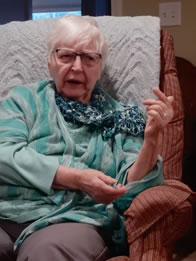
Carol Kelly in her Cincinnati home. Photo by Eric Minton.
We are in Cincinnati. After we got here yesterday we visited Carol in her lovely basement apartment in the home of her son Matt and his family, who treated us to a tasty Cincinnati institution, slabs of Montgomery Inn BBQ ribs. I had planned to celebrate her 87th birthday with her in April in conjunction with a visit to the Cincinnati Shakespeare Company, but I had to cancel that trip due to the initial onset of Sarah's illness. We routed this trip to Chicago through Cincinnati to make up for missing Carol's birthday, and it's right that we should visit with her on the eve of Memorial Day. Even though I grew up and continue to reside in the servicemember community, I've never known a person more devoted to honoring the service and sacrifices of the U.S. military men and women than Carol Kelly.
Oh, and she's the copy editor of Shakespeareances.com and this Shakespeare Canon Project, continuing our association that began when I finally stopped procrastinating and gave her a call back in January 2006.
I delayed “letting Carol go” as I handled more pressing matters in my new job. Plus, I was scared: though I've fired employees before, I don't like letting people go. Her husband had died a couple of months before, and in her grieving, she did not work on the magazine I inherited. Now, here I was about to hit her with dismissal. While working up the nerve to tell her she would not be working for me, I read a year's worth of The Officer and realized that up to the one I inherited—the one Carol didn't work on—the magazines were well edited. As we were about to start production on my first issue—in other words, at the last minute—I called her. She was waiting for my call. We had a nice conversation, and though I didn't tell her I was dropping her, I did end our talk by saying I was considering some major changes in the production process and would get back to her.
I did the next day to tell her of one such change in the production process: she no longer would be doing “suggested edits” for The Officer. Instead, she would do final edits, including on my work. That was the way to improve efficiency and quality. Six months later when the Air Force reassigned Sarah to a command in Utah, the Reserve Officers Association and I worked out an arrangement in which I would continue as a contractor rather than an employee, receiving a single fee to produce the magazine as a turnkey operation.
My first decision as the newly minted editor of The Officer was to pay Carol a higher salary.
Carol was long established as a copy editor for various community newspapers and magazines and edited prayer books and liturgical texts for 10 years for the Rev. Lucien Deiss when she began working as a freelance project and copy editor for The Officer in 1984. For the 50th anniversary years of World War II, she was assigned to shepherd and edit a series of memoirs from veterans, which were later compiled into a book, Voices of My Comrades (New York: Fordham University Press, 2007). The original series predated my time with The Officer, but I helped get the book over the finish line, and I heard much gratitude from veterans for the work Carol did and the care and attention she gave their stories. She's made lifelong friends among them. But, then, Carol has a tendency to make lifelong friends.
Carol outlasted me at The Officer. I departed in 2010 to handle the care of my father after his stroke. When I decided to launch Shakespeareances.com the next year, my second decision was to ask Carol to be my copy editor. This time, though, I couldn't pay her anything. Yet she agreed. She has little expertise in the subject, but the quality of her editing capabilities is what matters most.
Memorial Day is set aside for us as a nation to honor the men and women who serve in the military—my wife, for one. We also now are honoring the families of those who serve, for, in addition to the sacrifices that Gold Star families have endured, the hardships spouses and children put up with during deployments have been overlooked too long. Now I, as a military child and spouse, would like to use this Memorial Day during the year of the Shakespeare Canon Project to pay tribute to Carol Kelly and other journalists who, often at their own sacrifices of life, health, and finances, chronicle the service of our military and keep veterans' vital memories alive.
As I know you will be proofing this, Carol, let me tell you personally thank you for all you do.
Tuesday, May 29—It Could Only Happen in a Town Like This
A map of the United States comprises a giant mural on one wall of the former Chicago Motor Club's lobby. Squiggly lines represent mountain ranges, and a list of National Parks occupies one corner. On a balcony at the far end of the lobby is an original 1928 Ford Model A, its headlights on.

The lobby of the Hampton Inn in downtown Chicago. Photo by Eric Minton.
This art deco building constructed in 1928 is now the Hampton Inn where we are staying for our time in Chicago (its free breakfast buffet is spread out in the space below the Model A's perch). This is one of my favorite cities in the world, one of only a handful I'd choose to live in. I adore its Midwest friendliness, its youthful vigor, it's cultural variety, and its downtown avenues through a canyon of grandeur comprising over a hundred-plus years of architectural evolution.
We emerge into the hotel lobby through the carved-steel elevator doors under the mural, cross to the revolving doors and out onto Wacker Place. Across the street is the gold-trimmed, black marble Carbide and Carbon Building, topped with a gold, phallic-shaped spire. We walk a half block to Michigan Avenue, turn left, pass the three-story gold-arched entrance to the Old Republic Building, and come to the London House, a neoclassic skyscraper that once housed one of the nation's premier jazz clubs. At the Chicago River, looking to our left, we see two round towers standing like tall coils. Sarah and I have always called these two residential structures the Jetsons towers as they evoke a past era's vision of the future. Across the river is a hulking, brooding tower made of dark glass with a giant san serif “TRUMP” stuck on its façade. We continue on, past the French Renaissance–style Wrigley Building's two towers, the gothic “wedding cake”–topped Tribune skyscraper, and a sleek art deco needle rising to the NBC peacock logo at its peak.
Our 28-minute trek takes us to Navy Pier. Long one of the most visited tourism destinations in the Midwest, Navy Pier is now a popular gathering place for Chicagoans, with restaurants, bars, shops, a cinema, the Chicago Children's Museum, and amusement rides, including a 196-foot-tall Ferris wheel. The first Ferris wheel, by the way, was built for Chicago's Columbian Exposition of 1893 (a World's Fair), which also debuted another amusement park staple, the midway. The world's first modern, ride-oriented amusement park opened in Chicago a year later. As we stroll down the tree-lined pier, past the tour boats departing for forays onto Lake Michigan and river-routed architectural tours, we see ahead of us a green marquee towering over the pier with one word spelled out vertically in white lightbulbs: “Shakespeare.” Get closer you can read “Chicago” at the top of the marquee and “Theater” at the bottom.
The Shakespeare Repertory Company founded by Artistic Director Barbara Gaines in 1986 moved from the Ruth Page Theater downtown to this newly built, glass-walled, two-theater complex (the 500-seat deep-thrust Courtyard Theater and a 200-seat studio space) in 1999 and changed its name to the Chicago Shakespeare Theater on Navy Pier. “Location location,” Gaines says of her company's name change. “Chicago, it's Shakespeare, and it's a theater on Navy Pier. We didn't want anyone to make the wrong turn. We figured if they knew it was on Navy Pier, everyone would have no trouble finding it. And it's a gorgeous location.” She's telling me this as we're sitting in the theater's office conference room, and through the windows we can see the Chicago skyline from this pier jutting into Lake Michigan.

The Chicago Shakespeare Theater on Navy Pier. Photo by Eric Minton.
Walk a little farther down the pier and turn back, and the “Shakespeare” sign becomes part of that city skyline. Shakespeare literally is at the core of Chicago, and not just physically. The reason the theater is here is because then Mayor Richard Daley, a frequent patron of the Shakespeare Repertory Company, lobbied Gaines to make her theater part of a major renovation project on the Pier. Current Mayor Rahm Emanuel, also a Shakespeare fan, has continued both the Pier's renovations and the partnership with the Chicago Shakepeare Theater, including adding a third theater, The Yard, which opened last fall. The Yard is where we'll be seeing Shakespeare's Macbeth this week, the company's first major production for the new space.
Daley wanted an artistic anchor for the pier. "'We don't want it to be just fun and games, we want it to have culture,'" Gaines remembers Daley telling her. “And culture, of course, is the essence of life,” she says. While Gaines, who grew up in New York but graduated from Northwestern University in Chicago, is thoroughly Chicagoan, she made a point of reaching out around the globe to bring international perspectives through directors and productions to her theater, beginning with Czech Director Roman Polak's Macbeth in 1992. “There are no barriers and there are no labels when you see great art,” she says. “You're just experiencing what it is to be you, to be human. This international program could do more for healing wounds of a political nature than almost anything.”
A harder wound to heal, though, is national, not international: the rise of anti-intellectualism, its representation sitting atop the nation's political system like a hulking, translucent tower on Chicago's multicultural cityscape. Even before the 2016 election, Gaines's Tug of War adaptation of Shakespeare history plays portrayed the mob leader Jake Cade in Henry VI, Part Two, with orange hair, orange face, and a red tie entering to Leonard Cohen's song "The Future": "Give me absolute control, over every living soul, and lie beside me, baby, that's an order!" The Republicans laughed just as hard as the Democrats, Gaines says. "Believe me, I know them." She laughs at the memory, but she is not laughing when she says, "Trump is Jack Cade, who puts people to death for reading, speaking French, or knowing Latin and starts riots all over the place. And he demeans humanity." She calls the current state of the nation a "profound malignant, anti-intellectual, nationalistic tragedy.”
Shakespeare, displaying a profound empathy in the spectrum of characters he creates, is her champion. “Shakespeare fought for human rights,” Gaines says. “Empathy is how we started this country. Empathy was within Washington, Adams, even Jefferson, even though some of them owned slaves, which is unforgiveable in my book. So, what's happening with [Trump's] administration is anti-Shakespeare, anti-life, anti-art, and, especially, anti-democracy. It is an anti-human rights administration. And these are dangerous waters.” As I am here to see Macbeth, Gaines offers me her favorite line from the play: “I think our country sinks beneath the yoke; it weeps, it bleeds; and each new day a gash is added to her wounds."
If Shakespeare is her champion, her weapon of choice is education. Chicago Shakespeare Theater's education program reaches 40,000 Chicago students a year. The theater engages in outreach to and training of teachers and mounts a summer touring production to the city's parks. Students come by the busloads to the theater for special programming and main-stage productions. On these visits, Marilyn Halperin, the theater's director of education and communications, makes sure the students feel welcomed. The entire staff, from box office to actors, undertakes training in this regard. Her goal is to encourage the students to get beyond treating theater as an annual school field trip and making it a regular asset of their lives.
Certainly, the theater's location plays a part, too. Being on Navy Pier gives Shakespeare cool cred. Halperin, who has been with the company 25 years, says the move to Navy Pier met much resistance within the company. Subscribers, donors, board members, and even staff opposed it. “There was a sense that the Pier was a carnival and not a place for high art,” Halperin tells me as we talk in the circle lobby of the Courtyard Theater. “But Barbara never felt that what she was doing was high art.”
Gaines is doing Shakespeare, who wrote his plays for theaters located in the amusement districts on the edge of London. Navy Pier is as Shakespearean as it gets. And Chicago is Shakespeare's kind of town.
Macbeth, Chicago Shakespeare Theater on Navy Pier
The Yard, Chicago, Illinois, May 30
The Yard, Chicago Shakespeare Theater's new flexible theater at the company's Navy Pier complex, was built for this show, William Shakespeare's Macbeth adapted and directed by Aaron Posner and Teller (as in one half of the Penn and Teller magic team). True, The Yard, which debuted last fall, is built and rebuilt specifically for all shows that play there, but Macbeth is here at Chicago Shakespeare Theater because The Yard is here.
In just a few years after its move to Navy Pier in 1999, the rechristened Chicago Shakespeare Theater, founded as the Shakespeare Repertory Company in 1986, already started running into capacity problems. Though it had a 500-seat theater and a 200-seat studio space—the deep-thrust Courtyard Theater and the Upstairs at Chicago Shakespeare, respectively—the company believed it could expand both the size of its audience and the variety of shows with another space. Specifically, the company needed a proscenium arch stage, a need best exemplified by Posner's and Teller's 2015 production of Shakespeare's The Tempest in the Courtyard. The thrust stage limited the range of Teller's magic tricks while the theater's limited capacity couldn't take full advantage of what became a huge hit.
Chicago Shakespeare eventually took possession of the large, tent-covered amphitheater next door, but the wish list for how to use that space was at least full-fathom-five deep. “We knew we wanted a proscenium stage, and we wanted everything else, too,” says Chris Plevin, director of productions who oversaw the design of The Yard. “Everything else” included theater spaces they couldn't even imagine. “We did not want to presume what artists of the future would want,” he says.

The interior of The Yard in a proscenium arch configuration at Chicago Shakespeare Theater on Navy Pier. Photo by James Steinkamp Photography. Below, the Weird Sisters (McKinley Carter, Emily Ann Nichelson, and Theo Germaine) watch the Macbeths (Chaon Cross and Ian Merrill Peakes) in the Aaron Posner and Teller production at The Yard. Photo by Liz Lauren.
Plevin is taking me on a tour of The Yard, which currently is set up as a 700-seat proscenium theater for Macbeth. Three levels of balconies arranged in a horseshoe enclose sloped seating in the center. The balconies are actually seven 18-foot-wide and two 9-foot-wide steel towers with wood trim and two rows times three levels of fabric-backed theater seats. These towers are completely independent of each other and can be arranged in any configuration: a horseshoe, a circle, a square, a rectangle, in parallel lines, and any other shape anybody can imagine for proscenium, deep thrust, in-the-round, arena, or any other type of stage anybody can imagine. Seating capacity ranges from 150 to 850.
Though the larger towers weigh 35,000 pounds each, they can be moved into place by three stagehands thanks to a cushion of air via air casters inserted below the towers (think giant air hockey pucks). Once in place, the towers are clamped together with joints of various sizes and shapes per their purposes. Each tower has fire sprinklers, safety lighting, air conditioning and heating vents, and stage lighting and audio-visual mounts, their hoses, ducts, and electrical and digital cables plugged into the building. Total cost of this theater's construction was $35 million, about half what erecting a new building would have cost, Plevin says. He describes it as a giant erector set; I'm a K'Nex fan, and he agrees with that analogy as stagehands use diagrams matched with labeled parts to piece together a theater for a production, then disassemble it and reassemble a new structure for the next production.
Theater magic starts with merely entering the theater. You pass from a permanent new lobby into a carpeted but otherwise industrial-looking structure—kind of like a backstage. Then you turn through a portal into a stunning theater space of vast intimacy. Like walking through the gangway into a baseball stadium for the first time and seeing that expanse of green open out before you, this view takes your breath away.
For Macbeth, the next bit of magic comes in the play's opening scene. A small coffin sits in the center of a stage with false walls and three red doors set in an open-ended quadrangle. Above is a balcony holding a congregation of percussion instruments. This is Hecate's perch, though this Hecate, Ronnie Malley, doesn't speak but drums the production's soundtrack. His soundtrack is filled out with the dissonant vocalizations of the Weird Sisters (McKinley Carter, Theo Germaine, and Emily Ann Nichelson) who glide through the doors to join Lady Macbeth (Chaon Cross) as she opens the coffin, takes out an infant's corpse, and cradles it in her arms. After Lady Macbeth returns the baby to the coffin and slams down the lid, the Weird Sisters begin chanting the play's opening lines, "When shall we three meet again,” as they encompass Lady Macbeth; “Upon the heath,” the witches chant as Lady Macbeth disappears behind their cloaks, “There to meet with Macbeth,” as Ian Merrill Peakes appears from behind their cloaks and launches into battle with the rebels.
Banking on the popularity of The Tempest and a more suitable theater for a Posner-Teller production, Chicago Shakespeare brought the duo back to revive their adaptation of Macbeth that they first mounted 10 years ago for the Folger Theatre in Washington, D.C., and Two River Theater Company in Red Bank, New Jersey. Peakes played Macbeth in that production, and he returns to the role 10 years older and as a father (his wife, Karen Peakes, played a pregnant Lady Macduff in that initial production, and the son in her belly will be playing Fleance this September in Folger's upcoming production of William Davenant's adaptation of Macbeth with Peakes again in the title role). Cross played Lady Macbeth almost 20 years ago with the Shenandoah Shakespeare Express, forerunner of the American Shakespeare Center in Staunton, Virginia. Both actors tell me in an interview how their own maturity and becoming parents have reshaped their character portrayals, he from a warrior of almost blind ambition to a man more conscious of the choices he's making, she from a warrior's wife of almost blind ambition to a mother turned bitter with grieving over her loss.
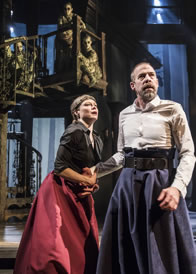 Other than this subtle change in portrayals, the production generally follows in the steps of the original version with one significant exception: the role of the Weird Sisters has been expanded. In heavy makeup, ethereal movement, and spine-chilling singing, the three witches show up at every key, plot-turning moment, from King Duncan (Christopher Donahue) decreeing the Thane of Cawdor's death and bestowing that title upon Macbeth through the Macbeths' soliloquies and conversations and on to the subsequent murders. Though they seem to hypnotize Macbeth when they first meet him, these Weird Sisters are less instigators of the tragic chain of events than observers, keenly watching a car wreck unfolding in slow, meticulous motion.
Other than this subtle change in portrayals, the production generally follows in the steps of the original version with one significant exception: the role of the Weird Sisters has been expanded. In heavy makeup, ethereal movement, and spine-chilling singing, the three witches show up at every key, plot-turning moment, from King Duncan (Christopher Donahue) decreeing the Thane of Cawdor's death and bestowing that title upon Macbeth through the Macbeths' soliloquies and conversations and on to the subsequent murders. Though they seem to hypnotize Macbeth when they first meet him, these Weird Sisters are less instigators of the tragic chain of events than observers, keenly watching a car wreck unfolding in slow, meticulous motion.
And, yes, right before our eyes, one of them vanishes “Into the air; and what seem'd corporal melted as breath into the wind.” Teller uses a variety of magic forms to accomplish effective gotchas; even though I know what's coming, the second appearance of Banquo's ghost still gives me a start. When I was a trade journalist covering the amusement industry, I got to know several haunted house designers and learned many tricks of that trade. On this second night of watching this production, I look for the trade tricks behind the magic, and I get all of them except how the one Weird Sister vanishes (and, of course, in our interview, Germaine who plays that Sister won't reveal the secret). Yet, the magic all derives from the text—though much of the text has been sliced, diced, and mixed into a more cinematic aesthete than Shakespeare's original.
Taken together—Teller's tricks, the Sisters' performances, the portrayals of Peakes and Cross as the Macbeths, the ingenuity behind The Yard, and a lovely theater filled to near capacity with patrons from a wide spectrum both demographically and geographically (trekking in from distant suburbs)—it is all theater magic. Shakespeare may be somewhat diluted by it, but he's still at its core.
To read the review of this production, click here.
Much Ado About Nothing,
Pigeon Creek Shakespeare Company
The Rose, Blue Lake Arts Camp, Michigan, June 2
You have to drive deep into the woods to find the Rose.
You'll take a four-lane freeway north out of Muskegon, Michigan, that leads to a two-lane highway, then to a paved road of barely two lanes as you head deeper into the Manistee National Forest. You turn onto a barely paved road at the entrance to Blue Lake Arts Camp, and then you're on dirt tracks that take you to Camp Sousa, Camp Bernstein, and Camp Gershwin. Founded in 1966, this 1,600-acre campus combines wilderness and intensive arts education in a typical summer camp experience: rustic wood structures, picnic tables, wildlife, a lake, a giant music shell, and a re-creation of an Elizabethan outdoor theater.

The Rose at Blue Lake Arts Camp in Michigan. Below, "the hug." Photos by Eric Minton.
The Rose. This wattle-and-daub–looking theater you would expect to see on the south bank of the Thames sits in the middle of a meadow down past Camp Gershwin. At first glimpse through the trees, you might make an exclamation of wonder. What is that doing here? Walk inside, and you are transported to another dimension, not merely of time and place but of essence.
Andrew Anglin tries to describe that sensation of entering The Rose, looking up at the hut—the heavens in William Shakespeare's plays—atop two-story-tall pillars over the wooden O. “The sun is coming in, and the way the sun hits the beams, it's warm and wooden and earthy and soaring at the same time,” he says. He repeats these attributes in various starts and stops—and throws in “exciting,” as well—before settling on metaphor. “It feels like a hug, you know?”
I do know. That is the perfect description of how I feel entering the Rose. Anglin isn't only describing his own feelings; he's seen the glaze-eyed expressions on the faces of campers—middle and high school kids—and their slack-jawed parents as they walk into the Rose—once, twice, or as countless many times as has Anglin, Blue Lake's Theater Department Director, since the Rose was built in 2010. In 2006, Blue Lake hired Anglin, a theater teacher at Byron Center High School south of Grand Rapids, to design a theater program, which includes Shakespeare, contemporary theater, and musical theater. With development of the Shakespeare program, the camp's leadership decided the students should ply their craft in the kind of theater for which Shakespeare wrote his plays.
It is not an exact replica of the Rose of Shakespeare's time but incorporates elements from several theater drawings of the era. It is round and has two pillars, the "heavens" (which is not used), and the “Juliet balcony.” Roughly half the size of Shakespeare's Globe Theater, the Rose has a two-level gallery (not three) able to seat about 600 and an area on the floor for about 150 groundlings. The stage currently has no trap door. In keeping with Shakespeare's time, the Rose has no plumbing or electricity (restrooms are located in a neighboring modern theater building), but in keeping with our times of state codes, it does have a fire sprinkler system.
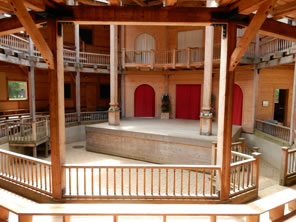 I first felt the Rose's hug last July. Sarah and I were on a Minor League baseball tour of Michigan and took a slight detour to meet Katherine Mayberry at Blue Lake Arts Camp, which is so far out in the woods our iPhone GPS got as lost as Lysander. Mayberry teaches in the Shakespeare program here and is also the executive director of Pigeon Creek Shakespeare Company, a troupe of professional actors who tour productions around Michigan and sometimes beyond. The company performs two plays a year at the Rose, benefit performances for Blue Lake Public Radio. She escorted us past tall pine trees, wood cabins, and a disinterested fox to that first “wow!” glimpse of the Rose. We entered through the tiring house, and as I walked onto the stage into this wooden O, wow went off the scale. I determined then to see a play there, and when a few months later I decided to do the Shakespeare Canon Project, Mayberry was one of the first people I contacted to get Pigeon Creek at the Rose on my calendar.
I first felt the Rose's hug last July. Sarah and I were on a Minor League baseball tour of Michigan and took a slight detour to meet Katherine Mayberry at Blue Lake Arts Camp, which is so far out in the woods our iPhone GPS got as lost as Lysander. Mayberry teaches in the Shakespeare program here and is also the executive director of Pigeon Creek Shakespeare Company, a troupe of professional actors who tour productions around Michigan and sometimes beyond. The company performs two plays a year at the Rose, benefit performances for Blue Lake Public Radio. She escorted us past tall pine trees, wood cabins, and a disinterested fox to that first “wow!” glimpse of the Rose. We entered through the tiring house, and as I walked onto the stage into this wooden O, wow went off the scale. I determined then to see a play there, and when a few months later I decided to do the Shakespeare Canon Project, Mayberry was one of the first people I contacted to get Pigeon Creek at the Rose on my calendar.
Here we are, almost 11 months later, still wowed sitting in the gallery for Shakespeare's Much Ado About Nothing. The play is not in this season's Pigeon Creek Shakespeare repertory; it and Henry V playing here on August 25 are remounts of productions from last year. The audience comprises mostly National Public Radio listeners: I'll go out on a limb and say they are somewhat Shakespeare savvy.
Not that this production needs savviness to appreciate it. Director Alisha Huber keeps the production grounded in the text, but the actors deliver the scripted humor and the play's physical humor with honed, verse-speaking expertise that lands every joke with clarity. Kathleen Bode playing Beatrice displays particularly exquisite timing while delivering her lines with a modern, no-BS attitude. Brad Sytsma's Benedick is a good match, depicting a strong moral core from the beginning—he just wants to remain a bachelor, but Beatrice gets under his skin like no other woman can, in love or hate.
I move down to join the groundlings for the second half of the play and get wrapped in the wheelhouse of Scott Wright's Dogberry. Wright lets Shakespeare's text make the man: a well-meaning soul who thinks of himself as highly learned delivering his malapropisms with intellectual certitude. Devoid of extratextual layering, Wright's performance is refreshingly subtle but gut-busting funny.
The acoustics are great in this theater, and that goes both ways: laughter carries toward the stage. And laughter explodes from the audience when Beatrice demands that Benedick “Kill Claudio.” The actors tell me later that while they never play that line for laughs they often get one; but nobody in the cast had heard such an enormous laugh as this one. The play's tone has turned here, and it's sometimes hard for a Beatrice and Benedick, especially a pair as funny as Bode and Sytsma, to nudge the audience toward the serious side. Yet Bode is allowing no doubt about Beatrice's state of mind as she goes into her “O that I were a man” rant. I'm right below her, watching the mascara smear down her cheeks as she roars, “O God, that I were a man! I would eat his heart in the market-place.” I'm so caught up in her performance that the laughter rippling down from the galleries behind me takes me by surprise.
Of the many peculiarities of playing in this space, one that Mayberry has noted is that laughter among the groundlings creates a ripple effect up through the galleries. This incident was a rare opposite, and it took Bode by surprise (though she played through it nonplussed). “We've never had people laughing at that [marketplace] line,” she says later. “And I wonder if the proximity of it has something to do with it, because the people who are close are right in that raw moment. But the people who are removed from it a little bit—I am looking up at the upper gallery at that moment, my eye contact is up with them—they don't know what to do with it. Where Beatrice is at, it isn't funny. She means it. She would absolutely eat his heart in the marketplace.”
The Rose gives you many such a-ha! moments watching Shakespeare, be it physical—the way the architecture keeps the glaring sun and rain off the actors and the patrons in the galleries (only the groundlings get wet and sunburned)—or theatrical. For example, the two pillars create an outer edge to the stage that becomes a separate play space where characters can be seen walking toward the scene (“Who comes here?”) a couple lines before entering the dialogue. Mayberry and Huber have also learned that almost every Shakespeare play has a line about the weather—and depending on the weather, those lines become pointed jokes when delivered in the Rose.
This is no academic exercise, however. This is a well-executed production, a great play, a laugh-filled afternoon. And it all started with a hug.
To read the review of this production, click here.
Saturday, June 2—Life Imitating Art
Beatrice and Benedick are at it again. Actually, it's Kathleen Bode and Brad Sytsma who are sniping at each other like the characters they play in William Shakespeare's Much Ado About Nothing.
We are on the deck of Karen and Ken Lange's house in Grand Haven, Michigan, with much of the cast of Pigeon Creek Shakespeare Company's production of Much Ado, which just played at the Rose in Blue Lake Arts Camp some 30 miles north of here. Karen and Chris are the parents of Scott Lange (who played Leonato) and the in-laws of Pigeon Creek Executive Director Katherine Mayberry (who played Margaret). Karen Lange assists the company however she can, providing lunch for the actors at the theater, tending to the Pigeon Creek Shakespeare information table before the performance and during intermission, and now hosting a postshow pizza party on her deck.
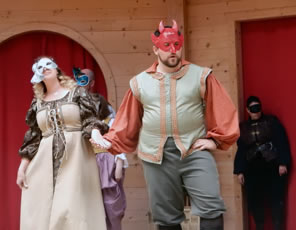
Beatrice (Kathleen Bode, left) and Benedick (Brad Sytsma) dance at the masque as Don John (Kat Hermes) lingers in the background in Pigeon Creek Shakespeare Company's production of William Shakespeare's Much Ado About Nothing at the Rose. Photo by Eric Minton.
The group pulls together three tables and crowds around, most sitting on different species of chairs, a few standing, everybody chowing down on a variety of pizzas from Domino's and talking about the play in general and their production in particular. Pigeon Creek Shakespeare tours around the state, and Much Ado was part of the company's repertory last year. The company remounted the production specifically for the Rose performance and its short rehearsal time. So, this cast, with a couple of replacements, returned to the play this week several months after last playing it.
We pick up the conversation about 30 minutes in. Bode is describing the masque (Act II, Scene 1) at Leonato's house in which Beatrice and Benedick, both wearing masks, end up dancing together and trading barbs, supposedly not knowing who the other person is.
Bode: It's interesting, too, because in the dance, the masque, when there's this moment just after Benedick leaves, and he's just insulted Beatrice to her face, essentially, calling her a harpy—
Sytsma: She did it first.
Bode: —In front of everyone! She has to put on this public face of, oh, it's fine, whatever, this is totally how we are. But that stings.
Sytsma: So does having her talking trash about him while dancing with him, and then spreading it to the entirety of the party. Because Don Pedro knows five minutes later that Beatrice has insulted the crap out of Benedick.
Bode: No, no, no.
Sytsma: The entire party knows that she hates Benedick, so he comes back because he's genuinely hurt at that moment, and that's why he lashes out as hard as he does.
Bode: No. Beatrice says that she was wronged by the man that she danced with. Because Benedick starts it and he says these things, and she says, who said that? Who are you?
Shakespeareances: Do you think she knows—
Bode: Oh, Beatrice absolutely knows it's him. Because he's being a dumb-ass and she's like, do you really think I don't know who you are? Like, really?
Alisha Huber (the production's director): When you're dancing, you have the line about, “I would he had boarded me.” What is that?!
Bode: I feel like that's I wish he had come to dance with me.
Huber: I know what the line means, Kate.
Bode: Here's the thing: I absolutely believe that she knows who's dancing with her, and she's trying to get him to say, she wants him to say—
Bode and Huber (in unison): It is me.
Sytsma: Why would he after she's said all these horrible things about him?
Bode: Because she's bating him. She's bating him.
Sytsma: But he didn't mean to hurt her.
Scott Wright (Dogberry): “I would he had boarded me” is a naval reference where I want him to come over here so I could cut his ass.
Bode: Yes, it's also about beating his ass. It's also about having sex. It's also about revealing that it's actually you so that I could belittle you to your FACE.
Sytsma: Beatrice's virtue is intact, and Benedick admits it. She is “virtuous, I cannot reprove it.” Benedick is the kind of character who would have claimed what he did if he had gotten in the car, and he didn't.
Bode: They definitely toed that line a little bit. She might have gotten in the elevator, they just didn't go to the top floor.
Shakespeareances: You two really are Beatrice and Benedick.
Bode and Sytsma (in unison): We're very good friends.
Shakespeareances: You do this for a year, and it's like the play, you're just back together and you're already at each other.
Sytsma: Kind of our relationship anyway.
Bode: Yeah, it kind of is our friendship anyway. But I just absolutely love working with Brad Sytsma. I adore it. He's wonderful to work with. Despite your cold face, you are an incredibly good scene partner to work with.
Monday, June 4—Border Song
We step up to the booth and hand our passports and declaration cards over the counter to the Canada Border Services officer at Winnipeg James Armstrong International Airport. It's just after midnight. The officer takes the documents with practiced indifference, glances over them. His eyes land on the departure date. “What will you be doing in Canada for four days?” he asks.
“Going to Shakespeare in the Ruins,” I reply.
The officer's expression brightens. “Are you here to see them or are you in the play?”
“We're going to see them—and visit with them.”
The officer, clearly pleased, stamps the passports with a bit of flair and hands back the documents with quick instructions on where to deliver the declaration cards after we retrieve our luggage. “Welcome to Canada,” he says, smiling. “Enjoy your visit.”
Timon of Athens, Shakespeare in the Ruins
Trappist Monastery Provincial Heritage Park,
Winnipeg, Manitoba, June 5
It's not something you would expect to see in a Trappist monastery: trays with wine bottles, goblets, and a decanter of spirits with shot glasses; an ornate, gold telephone; a nude, female mannequin; decorative glassware in the windows. Certainly, it's not something you'd expect to see in the stone-wall remnants of a monastery in ruins—that's literally in ruins, by the way, not figuratively.
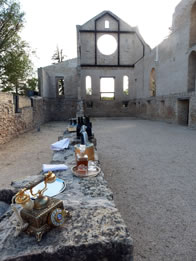
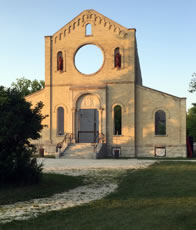
The Trappist monastery ruins set for Timon of Athens. Photos by Eric Minton
This is Shakespeare in the Ruins (literally, not figuratively), a Winnipeg, Manitoba, theater company celebrating its 25th anniversary season of presenting Shakespeare plays in the Trappist Monastery Provincial Heritage Park. The Order of Cistercians of the Strict Observance (known as Trappists) founded Our Lady of the Prairies in 1892 and erected the stone church in 1903 and the monastic wing in 1905. They moved out in 1978, worried that Winnipeg's urban spraw would soon encroach on their isolation, though still today, a few miles of farmland and dirt roads lie between the park and Winnipeg's southern Perimeter Highway. A 1983 fire gutted the buildings, but the property was established as a heritage site five years later, and Shakespeare in the Ruins began performing here in 1993.
The property provides a variety of vistas for Shakespeare in the Ruins' promenade-style productions. We're here to see William Shakespeare's Timon of Athens (that explains the booze). The company provides the audience easily foldable chairs, and with these we are guided by Timon's in-character servants from the front of Timon's house (the steps of the church) to her great hall (the nave), around the parameter for three scenes of the servants seeking loans for their boss from Timon's friends, and then back to the nave for Timon's second party. We spend the second half of the play, set in the Athenian woods, in a tree-edged meadow neighboring the ruins. The La Salle River flows through the property, and even this has been used in past productions. A Midsummer Night's Dream's Titania entered on a barge, Antony entered in a birch bark canoe to meet his Cleopatra, and in a production of The Tempest, back when the company was performing its shows in May, Stephano, “the belligerent one,” entered by emerging out of the cold water.
“Believe me, I was feeling belligerent by the time I got out of the water,” says Shakespeare in the Ruins Artistic Director Michelle Boulet, who played that Stephano and tells me she had no trouble getting into character with that entrance. “I was a mean son of a bitch.” Boulet is one of the company's founding members. She was a theater student at the University of Winnipeg when she was invited to join a group of actors performing Romeo and Juliet at the ruins. “I have no idea why I was chosen,” she says. Boulet played Lady Capulet, though she was younger than the actress playing Juliet.
Boulet directed this Timon of Athens, and if you picked up on my pronoun reference above, Timon has been regendered. In fact, all the roles have been regendered, but to call this an “all-female cast” is not entirely correct: Timon's entertainment for his party has also been regendered, from the dancing “masque of ladies as Amazons” to a grinding trio of gentlemen as Chippendales (one of whom did a close-to-lap dance for my wife, much to her enjoyment). Boulet saw Stratford Festival's production of Timon last year—her first experience with the play (she had never read it, either)—and though that production was male-centric, she immediately saw that the play has no specific gender dynamics and could be done with an all-female cast. “People are like, well, you're just jumping on an all-female bandwagon,” Boulet says. “You know what? It's been an all-male bandwagon for about 1,000 years. So, if you don't mind, we'd like to give it a whirl.” She says this in a tone that indicates she would give it a whirl even if you do mind.
Nevertheless, it's not single-gender casting that most distinguishes Boulet's adaptation of Timon of Athens but her setting it in 1983 New York, a hedonistic era when the upper class indulged in showing off its wealth while patronizing street art and culture. Something else was on the rise in that time: Donald Trump, then 33 years old and about to erect Trump Towers. In this early 1980s setting of New York socialites, a military general invading Athens made no sense to Boulet, so she turned Alcibiades into a real estate mogul. Her assault on the city is turned into a development spree, including replacing Timon's estate with Alcibiades Tower at the end of the play (by coincidence, Toni Reimer playing Alcibiades wears a red dress suit).
To pull off this makeover using the text (albeit trimmed to 90 minutes playing time), Boulet's adaptation mashes Alcibiades with portions of Lucius, one of Timon's flattering friends. Lucius is the second of the three lords to turn away Timon's request for a loan, but both Boulet and Reimer tell me that in replacing Lucius with Alcibiades in this scene, her lines that she had just “disfurnished” herself the day before by purchasing “a little part” is played as sincere rather than the disingenuous excuse pointed to in the text.
Purists may shake their heads, but this play never was pure. Scholars generally have come to the conclusion that Thomas Middleton collaborated with Shakespeare in the writing of Timon of Athens, and still it reads like an unfinished draft and may have been. The play has no record of performance in Shakespeare's time and appears to have been included in the First Folio at the last minute when it looked like the publishers wouldn't be able to get the rights to Troilus and Cressida (they did, finally, and squeezed that play in, too).
Though losing some of the play's more subtle thematic arcs, Boulet's adaptation maintains its satirical portrait of status-conscious flatterers who measure friendship in dollars. Along the way, Boulet brings home the play's thematic point of money's decaying effects. She adds a further moral that came about upon her needing a new ending after she excised Alcibiades' army entering Athens. She found her ending by moving back Act IV, Scene 2, in which Timon's loyal steward, Flavius (Brittany Hunter), shares “the latest of my wealth” with the other displaced employees of the Timon household (Flavius's soliloquy at the end of this scene about continuing to serve Timon remains in its original place back before she visits Timon in the woods). With the scene shifted to the end, the money Flavius shares with her fellow servants is the money Timon gave her in the woods. The servants then share in a group hug, fitting with Shakespeare's canon-wide penchant for showing the common people more wise and worthy than the nobles. It is Flavius and her peers at the end of the play who earn what Timon incorrectly believed she had when she says early in the play, “I am wealthy in my friends.”
Despite these revisions and the setting, the most striking quality of this production is the corps of actors working in and with this space. Sarah Constible is an engaging Timon, nonjudgmental, friendly (to a fault), and doting even on Apemantus (Andrea del Campo) in the play's first half. In the second half, Constible's Timon, in tattered gown and dirty fur coat, yields a destitute but proud disposition as she pushes her shopping-cart, digs for roots (but to her frustration finds a bag full of money instead), and bandies with various visitors. The play's centerpiece is Timon railing at the walls of Athens before banishing herself from the city, a speech Constible delivers from the other side of one of the monestary's crumbled stone walls. The setting is perfect, but the lasting impression is Constible projecting such a forceful delivery that lands in our gut from at least 50 feet away through the breezy summer air.
The evening's most arresting moment, however, is the end when the nine women in the cast take their bows. I could have sworn I saw a cast of 15, but such is the quality of the doubling, quadrupling, and quintupling of roles. Claire Thérèse plays six roles—a busker, the Jeweler, Ventidius (an heiress Timon bails out of jail), a debt collector, a contractor for Alcibiades, and one of the two thieves—each indelible portrayals, including Ventidius sleeping on the lawn with two of the male dancers as we pass by after Timon's party. That's certainly not something you expect to see in a Trappist monastery, or in a Timon of Athens production, either.
To read the review of this production, click here.
Friday, June 8—Brotherly Love
Tony Milder is closing in on a rare Shakespearean acting grand slam. He made his stage debut as Dromio of Syracuse in a sixth-grade production of William Shakespeare's The Comedy of Errors. In a Concordia College production of the play, he took on the role of Antipholus of Syracuse. Now, for the Kentucky Shakespeare Festival, he's playing Dromio of Ephesus. “I just have to get my Antipholus of Ephesus on, and I'll have it!” he says in feigned triumph.
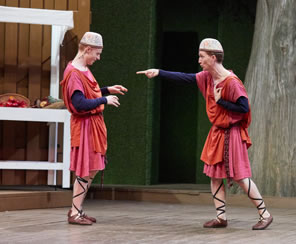
The two Dromios, of Ephesus (Tony Milder, left) and of Syracuse (Neill Robertson, right) meet each other for the first time since they were infants in The Comedy of Errors. Photo by Billy Brymer, Kentucky Shakespeare Festival.
Meanwhile, his sibling counterpart in this production, Neill Robertson, has his own particular landmark moment playing Dromio of Syracuse: After three years of being mistaken for Milder in Kentucky Shakespeare productions—even his own parents have been confused, he says—the two actors are finally playing twins and proving they are two different people. And yet, some people still aren't sure.
The twins—including the two Antipholuses (Antipholi?), Crystian Wiltshire as the Syracusean (third year with the company) and Shaleen Cholera as the Ephesian (second summer here)—are sitting around a table waiting for me as I rush in two minutes late to Kentucky Shakespeare's offices. I've just driven into downtown Louisville from Chicago, stopping for a lunchtime visit with my nephew's family in West Lafayette, Indiana, where my niece and her boyfriend were also visiting from Portland, Oregon. Immediately upon arriving in Louisville, Sarah and I check into the historic Seelbach Hilton Hotel (with a bar oft visited by F. Scott Fitzgerald, inspiring his novel The Great Gatsby) at the corner of Muhammed Ali Boulevard and Fourth Street, and before fully emptying the car I race-walk the three blocks to the ArtsSpace complex on Broadway.
Other than the physical resemblances of not only the Dromios but the Antipholuses, too, the four actors share a few other attributes. They have each performed in at least a dozen Shakespeare plays (Robertson in more than 20), and none of them consider Comedy of Errors to be one of Shakespeare's gems. Yet, they all contend they are having some of the most fun they've ever had performing in a Shakespearean comedy. They have high regard for the direction of Matt Wallace, the company's producing artistic director, and they are astonished by the audience's enthusiastic reaction.
At 58 years, Kentucky's is the oldest free-to-the-public Shakespeare festival in the nation. And this means truly free for all: no special sections or reserved seats for people who make donations. The shows genrally draw between 700 to 1,200 people to the outdoor theater in Central Park two miles down Fourth Street from the Seelbach. The audience is as demographically diverse as any audience I've seen anywhere, on the age spectrum and in socio-economic-ethnic-racial composition. With The Comedy of Errors, the four actors all say patrons have been telling them of the multiple times they've come to this production, as many as five times though it's only been playing for a little over a week. Much of this reaction could be due to the crowd's unfamiliarity with Comedy of Errors. Kentucky Shakespeare hasn't performed the play here "in decades," Wallace says later.
“We've had people tell us this is their favorite production they've seen from us,” Wiltshire says, and he's incredulous that people would say that. “But that's beautiful, because it's not a common play that they will see from Shakespeare companies. For this to be their favorite, that means a lot: that there is a clarity to the story that we're telling, that it is not just funny it is something that is memorable to them. I'm really proud of that, because it's not often that you hear someone say, ‘Their Comedy of Errors was way better than their Romeo and Juliet [Wiltshire played Romeo two years ago here] or way better than the Midsummer that they've done.'” Cholera describes a man who saw the production with his wife for the first time after which the two read the play and returned for a second viewing “on a deeper level.”
These four actors hear such comments because cast members are tasked with “barreling” during intermission, roaming about the grounds with sacks to collect donations. During these brief conversations with patrons, Milder gets queried about which twin he is playing or, indeed, if he is playing both twins. Which brings us to the particular milestone this production offers Robertson. “This show has been a long time coming because Tony and I have been mistaken for one another for years. I have been congratulated for Puck in Midsummer, which was him. He has been congratulated on work that I have done. We did The Winter's Tale together, and my dad said, ‘I didn't realize you were such a great dancer,' and I said, ‘I'm not. That wasn't me.'”
“And I've been complimented on my singing in a show that Neill did,” Milder says. “I take it as such a compliment when people say, ‘Are you Neill?' No, but thank you!"
“Sometimes I don't correct people,” Robertson says. He says his mother even mistook Milder for him when Milder was barreling. “So, this definitely feels like a full-circle moment to finally get to play an identical twin to Tony Milder. Because I'm sure there are people out there who don't realize we are two people.”
The company itself even got in on the fun. Check out this BuzzFeed post.
The Comedy of Errors, Kentucky Shakespeare
Central Park, Louisville, Kentucky, June 9
Leah Stewart was in the eighth grade when she bought the Complete Works of William Shakespeare. “It's good stuff,” she says, her simple description for why she has read all the plays and remained a fan through her school years and her first career as a technical writer. Stewart lives just a couple blocks from Louisville's Central Park where the Kentucky Shakespeare Festival stages its free Shakespeare in the Park productions, and she gets to as many Festival performances as she can. However, she's not seen any of them.
For about seven years, Stewart has been owner-operator of the Louisville Dessert Truck. As president of the Louisville Food Truck Association that she helped found in June 2012, she struck a deal with Kentucky Shakespeare four years ago to provide food for its summer festival productions. This evening, Grecian Mama (serving “Big Fat Gyros” and rice bowls) and Germany's #1 (Döner Kabobs and bratwurst) join Stewart's truck (it's slogan, "Life Is Uncertain. Eat Dessert First"). Last night, Louisville Sushi was here with Grecian Mama and the Dessert Truck.

Kentucky Shakespeare Festival patrons visit the food trucks parked for the evening's performance of William Shakespeare's The Comedy of Errors in Louisville's Central Park. Below, Kentucky Shakespeare performs in this theater, its stage redesigned last year to give more prominence to the park's trees. Photos by Eric Minton.
The association has 27 members, representing about half the food trucks operating in the city. Festival patrons get a variety of choices over the course of the summer, from barbeque and tacos to lobster rolls and deli sandwiches. Kentucky Shakespeare lists the food truck schedule on its website, and both Stewart and Kentucky Shakespeare Producing Artistic Director Matt Wallace say patrons choose their nights according to the food truck schedule. The trucks start serving at 6:30. Pre-shows—featuring local organizations—begin at 7:30, the play starts at 8.
Stewart is not your typical theater ice cream lady. She serves homemade sweets, including artisan popsicles, a selection of thick ice cream sandwiches, DIY root beer floats, “turtle sticks” (pretzels coated in caramel, chocolate, and pecans), and a Louisville delicacy called Modjeska, large marshmallows coated in caramel and dipped in chocolate. She takes her truck to a variety of events and businesses, so I ask how she compares the Shakespeare clientele from other customers she serves. Every place is different, she says, but what's notable here is the variety. “You get families, you get kids, you get teens, you get grandparents. This is a real cross-section. There's really not a demographic that comes here. This is an everybody.”
“We love the fact that, since we're free and in the park, we can get a millionaire sitting by somebody who could be homeless, both engaging in and enjoying the artistry that we bring to the stage,” says Kerry Wang, chairman of the Kentucky Shakespeare Board of Directors. I interview him over morning coffee and tea in the ornate lobby of the Seelbach Hilton, the historic hotel downtown where Sarah and I are staying and on Wang's way to his job as leader of Humana's Business Technology Leadership–Intelligent Automation Center of Excellence. “We love that not only are we bringing joy and leisure to people with the artistry that we're putting on, we're bringing our city together a bit more and an audience that would not have interacted with each other otherwise if they're not at the park.” Central Park lies in Old Louisville, a residential neighborhood a couple miles south of downtown with houses dating to the early 20th century. The theater, capable of seating about a thousand on benches plus rows for people to place their own chairs and adjoining lawns for blankets, lies at the bottom of a gentle incline. The food trucks are parked over the crest of the hill at the back of the amphitheater.
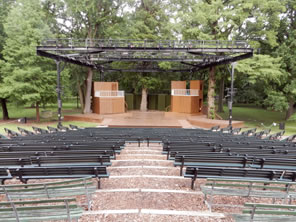 Last year Kentucky Shakespeare pared down the stage to make more prevalent the three huge trees—a ginkgo stage right and cypress trees at the rear and stage left—that create a canopy of fan-shaped and spindly leaves over the play space. You get park noises during the performance, including wind-rustled leaves, dogs barking, sirens in the distance, and the occasional UPS jet flying low on its landing approach. The actors simply pause at an aircraft's arrival, which Crystian Wiltshire in this evening's The Comedy of Errors turns into a lovely theatrical moment as his Antipholus of Syracuse, newly arrived in Ephesus, looks up in puzzled awe at this particular “manners of the town.”
Last year Kentucky Shakespeare pared down the stage to make more prevalent the three huge trees—a ginkgo stage right and cypress trees at the rear and stage left—that create a canopy of fan-shaped and spindly leaves over the play space. You get park noises during the performance, including wind-rustled leaves, dogs barking, sirens in the distance, and the occasional UPS jet flying low on its landing approach. The actors simply pause at an aircraft's arrival, which Crystian Wiltshire in this evening's The Comedy of Errors turns into a lovely theatrical moment as his Antipholus of Syracuse, newly arrived in Ephesus, looks up in puzzled awe at this particular “manners of the town.”
Unlike many other “free” Shakespeare-in-the-park operations, Kentucky Shakespeare does not set aside a special space for donors or reserve seats for a fee. A Kentucky Shakespeare core competency is to embrace the democratic nature of a city park open to everyone who comes and goes as they please. The company started that way in 1960, the nation's oldest free Shakespeare-in-the-Park festival. But after legendary Producing Artistic Director Curt L. Tofteland retired from the festival in 2008 to concentrate on the Shakespeare Behind Bars program that he had founded, Kentucky Shakespeare went in a different direction for its Central Park productions, building elaborate sets and offering ticketed premium seats with wait service.
Attendance nosedived to 4,800 for a one-play season in 2013. The next year, the board hired Wallace, who had acted and directed in the company from 2001 to 2010. While he focused on making festival the foundation for the audience experience, he invested in developing a corps of local talent, both actors and designers. The results are in the numbers. Last year, attendance for a three-play repertory plus hosting performances from other regional arts organizations drew 36,000 people. The company not only has become more efficient in its expenditures, it also has seen increased income from sponsorships, donations (including those larger crowds putting money in sacks the actors carry around during intermission), and a cut of the food trucks' takes.
I see the results in the production quality, too. Two years ago, we attended Kentucky Shakespeare Festival and saw reasonably good productions of Romeo and Juliet and The Two Gentlemen of Verona. Tonight, watching The Comedy of Errors, I'm impressed by the rich top-to-bottom talent in this company. The individual performances of all 14 actors stand out in some way, such as Dathan Hooper as the Jailer. He has one line in two scenes—and he's wearing a hood over his face the entire time—yet his mannerisms induce as much laughter as do the antics of the two Dromios and the confusion of the two Antipholuses. Then again, this is a repertory company: Hooper, a veteran actor, will be playing Othello later this season.
Wallace helms this Comedy of Errors, and he approaches the play as a simple farce, setting it in ancient Ephesus. The elaborately colorful Grecian costumes designed by Donna Lawrence-Downs create a cartoon aesthete. The actors often over-emote, especially Abigail Bailey Maupin as Adriana and Ernaisja Curry as her sister Luciana, who shadows Adriana's declarations like a Pentecostal parishioner reacting to a sermon. The comic effects of such performances are matched by more subtle gestures, such as Dromio of Syracuse (Neill Robertson) looking askance at the audience in reaction to the hyperdramatic Adriana. Yet, never do Wallace and company lose touch with the play's heart. When the Abbess (Jennifer Pennington) makes her big reveal at the play's climax, gasps ripple through the audience, and some tears flow, too.
Leah Stewart is not here to see that moment. Once she serves her desserts to the long line of customers at intermission, she heads home. Her retirement dream, she says, is to be on the other side of her truck's counter. “One day I'll get to sit here and watch [the play], and go to a food truck and get some food, and go to the bar and get a drink, and actually be a consumer of Shakespeare.”
To read the review of this production, click here.
Thursday, June 14—The Time of Our Lives
Fitting 38-plus William Shakespeare plays at 38-plus different theaters across the breadth and depth of the continent into one calendar year, that's the easy part. It's the rest of life that's proving my biggest challenge.

Our Skyline Chili order in Cincinnati, Ohio. Photo by Eric Minton.
As with so much in my life, it starts with my wife. On our just-finished, 17-day, four-play/theater trip, Sarah suffered a seizure on each of the first three days as we drove to Chicago. My planning paid off, however, so that the only time her condition interfered with our activities was when she didn't get to fully enjoy our stop at Skyline Chili, a must-do every time we go into or through Ohio. She only ordered a small five-way and could only eat half of that. Though I had the regular five-way, coney, and Greek salad that I always order, I finished her five-way for her (that was so kind of me, I know). She had another seizure the first full day we were in Chicago, but rather than four hours of recovery, she was up and active in two hours.
Then, no more episodes. Even the bumpy flights to and from Winnipeg didn't cause her any dizziness. Our big mistake was getting cocky. After 10 straight seizure-free days, we started talking about asking the neurologist if she could start driving again and if drinking wine was OK with her medications. In other words, we started hoping for the best.
The seizure-free streak ended the next day (the previous record was six days), last Saturday in Louisville when she went down for the afternoon. Though she insisted on accompanying me to The Comedy of Errors that evening, she was out of sorts for much of it. On Monday, she had another episode while waiting for me to finish my interviews. She's never in danger during these episodes, as long as she's in a comfortable, safe place, which she was while waiting in the Seelbach Hilton lobby. I found her there with her eyes closed, sitting in a chair in one corner. We had a nine-hour drive home ahead of us, so I got her to the car, and she slept out the dizziness for most of the trip. In our visit to her neurologist on Tuesday, we didn't ask him about driving and drinking. Instead, he again adjusted Sarah's medication and ordered a 48-hour EEG test, which we still have to schedule.
Once home after 17 days of travel, that's when the real crush hit. Because I'm leaving early tomorrow morning for a four-day trip to Fayetteville, North Carolina, and Sweet Tea Shakespeare Company (Sarah is staying home, our plan for my shorter trips), I've had just three days to
- Chauffeur Sarah to the neurologist,
- Stock up on food for her while I'm gone,
- Go through 17 days' worth of mail,
- Drop the car off for its 90,000-mile service (that's one of the big ones),
- Pay nearly-due bills,
- Catch up on 17 days' worth of laundry,
- Pick up the car after its 90,000-mile service,
- Schedule repairs on our outdoor lamp post and a leaking pipe under the kitchen sink, and
- Try to keep up with all of the administrative chores associated with the Canon Project.
The travel to and time with the theaters is only one-third of each Canon Project visit. I'm also booking the trips and arranging interviews beforehand and transcribing notes and writing reviews afterward—all on top of my regular Shakespeareances.com duties (Bard on the Boards, Shakespeare News, those reviews). While traveling I've made an effort to keep up with all these administrative tasks, including staying on top of emails and the budget. I feel good about what we accomplished those 17 days on the road, and what the Canon Project overall is achieving. It's these three days at home that have left me feeling overwhelmed. My calendar through the middle of September is dominated by green, signifying the travel days; it's those few white days between the long strings of green that I'm fretting.
My life these days is defined by this formula: w(-i) + s + h = -x, where w is Wife, i is the Impact of her medical condition, s is Shakespeareances, h is Household tasks, and x is tasks accomplished. It's a negative factor—I never was good with math. The mere fact that Sarah can't drive exponentially impacts how much work I can get done, especially today when she went into her office for the day (only the second time she's done that since the seizures began). I'll gladly spend three to four total hours in the car for that as it's a sign she's feeling confident, if not better. Plus, because a seizure can leave her out of whack for up to six hours, I've encouraged her to spend her upright time doing her job while I take over all the household chores.
I'm not complaining. I'm not allowed to. My strategic plan for the Shakespeare Canon Project clearly states, “Do not complain about time spent on tasks if I've stayed focused and earnest while doing those tasks” (I know me so well). That was written before Sarah's current health issues cropped up, but I'm still staying focused. It's just that Sarah is taking up more of my focus in ways I'm still trying to comprehend in the context of a 24-hour day. I'll adjust. I have to.
We are now one-third through the Shakespeare Canon Project. I want to express my sincere appreciation for all the theater companies that have shown such enthusiasm for this endeavor, for the warm welcomes I've felt everywhere I've been, and for all the artistic directors, general managers, education and marketing directors, and actors for their time and willingness to share their experiences. Along with Sarah, I also want to thank those who accommodated her in certain times of need, as well as for the expressions of love and support from so many of you.
Hither and yon, this is such a great community.
Pericles, Prince of Tyre, Sweet Tea Shakespeare
1897 Poe House, Fayetteville, North Carolina, June 15
It's preshow, and two actors are off to the side of the stage playing beanbag toss. Their T-shirts identify them as Antiochus (Evan Bridenstine) and Gower (Duana M. Burby). Malik Watson is keeping tally for them with his two hands as the scoreboard. His outfit identifies him as an employee of the North Carolina Special Police LLC, a security firm contracted by Sweet Tea Shakespeare for its outdoor production of William Shakespeare's and (as most scholars believe) George Wilkins' Pericles, Prince of Tyre.
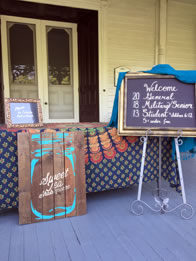
Left, Sweet Tea Shakespeare welcomes patrons to the 1897 Poe House, part of the Museum of Cape Fear in downtown Fayetteville, N.C.
Below, audiences gather to wach a Shakespeare play in the backyard of the house. Photos by Eric Minton.
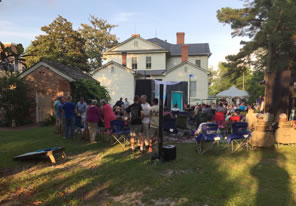
We are in the backyard of the 1897 Poe House in downtown Fayetteville, North Carolina, a home, now part of the Museum of Cape Fear, built by Edgar Allan Poe. Not that Edgar Allan Poe, who died in 1849, but a native Fayetteville businessman. “People were naming their children for famous people,” says David Reid, the museum's administrator. “There was a James Fenimore Cooper here in town at the same time and Oliver Wendell Holmes. Just seems to be that people were literate.” Reid moved to Fayetteville 19 years ago to take his position with the museum. Wearing a green museum-logo polo shirt, he is handling preshow duties as landlord support for the Sweet Tea Shakespeare cast and crew setting up their theater. That stage includes a three-entrance backdrop, a rug of artificial turf laid on the brick patio for the play space, rudimentary lighting and sound systems, and a tent labeled “Mytilene” for the production's musicians playing guitar, cello, bass, and drums.
Reid will later change out of his uniform into casual clothes and remain to the end of the play, but as a patron. He attended the 6-year-old Sweet Tea Shakespeare plays when they were being staged at the Cape Fear Botanical Garden and already was a fan when the company came to the 1897 Poe House looking for a new outdoor space. “I just like the way they work,” says Reid, who himself was involved in theater and Shakespeare studies when he attended King University in Bristol, Tennessee: “Their interaction with the audience, everybody's chipping in and doing things, just great people.”
With the audience sitting on three sides of the play space, Sweet Tea uses simple staging techniques and incorporates lots of music into its productions. Founding Artistic Director Jeremy Fiebig aspires for what he calls “the early modern ballpark atmosphere,” with universal lighting and audiences enjoying food and drink while watching the play. Here, it's more like a backyard party, with about 70 patrons sitting on lawn chairs or quilts enjoying barbecue and Sweet Tea Shakespeare jars of tea (buy the jar for $10, refills are free).
For more than a half hour before the play, the cast sings songs, hawks raffle tickets, auctions off the best seat in the house (a sofa right up front with foot rests), promotes upcoming shows, and reads poems highlighting sponsors. At one point, the 33 cast members for Pericles line up from one side of the stage around the back of the audience to the other side of the stage to sing "Silver," a Gray Havens song with the chorus, "We will cross any water any water, and if we find, there's a song that's getting stronger, we will sound all our silver songs, and we will know if they belong." Lined up with the actors is Watson the security guard, dancing with the rest.
Fiebig normally uses smaller casts and doubles roles, but he found that during the company's two-play repertory runs (one per season), the double duty of doubling was hard on part-time actors. Only a handful of actors play multiple one-scene roles in this Pericles while its repertory partner, The Tempest, uses 16 actors with only two of them doubling roles. Fiebig also likes fielding a wide representation of the community. In fact, one of the knights, a soldier stationed at neighboring Fort Bragg, had to drop out because of a deployment. The Army is nevertheless well represented at this performance: Tohry Petty, an Army spouse, plays Helicanus, and Staff Sergeant Ryan Kaluza, a percussionist with the 82nd Airborne Division Band, plays drums in Sweet Tea's house band, the Worshipful Company of Spectacle Makers.
From my lifelong experience as an Air Force family member plus as a rock, country, and classical music critic early in my journalism career, I know that military musical units contain some of the most accomplished musicians in the world. Kaluza, who has served 12 years in the Army, exemplifies that standard. I take note of his playing during the show, and only by inquiring about him afterward do I learn he is a soldier. He brings distinguished dynamics to various percussion instruments and plays interesting rhythm sequences on his drum kit. His Army duties include performing rock, jazz, and American songbook, along with marches and formal ceremonial music, but his Shakespearean duties allow him to add atmospheric elements to his playing. “I don't get to do this kind of avant-garde type of stuff in the Army,” he says.
Pericles has one of the most rambling plots in the Shakespeare canon. Prince Pericles escapes an assassination attempt by an incestuous emperor, survives shipwrecks, participates in a knights tournament in disguise and wins a princess for his wife, loses that wife during a sea storm as she gives birth, and then learns that his daughter has died, too, leaving him in the deepest of depression. Meanwhile, that daughter survives kidnapping by pirates and endures life in a brothel where her virtue ends up converting all the customers, including the governor. Pageantry is a primary element of the play, but under the direction of Jessica Schiermeister, Sweet Tea's production is endearingly simple. The costumes are those character-labeled gray T-shirts along with black or blue jeans and suspenders supplemented by various props, such as robes, crowns and vests (except the mermaid; she's rather elaborately outfitted). The “special effects” are like something you would see children come up with staging a play in their backyard. In one shipwreck, for example, Pericles founders amid cast members rippling large sheets of varying shades of blue; fish swim above him (on poles manipulated by cast members), as the ship's mast, a cello, and that mermaid float past (the mermaid dancing, the mast and cello carried by actors).
The large ensemble represents a range of acting talent and projection skills. Dialogue sometimes is difficult to hear over the guitar emanating from the speakers behind me, the traffic on Martin Luther King Freeway just beyond the Poe House's back fence, and the cicadas occasionally breaking out into their own music of the heavens in the tree limbs above us. Richard Adlam rises above it all, anchoring the production with his mesmerizing portrayal of the title character. A native of Jamaica (and 17-year resident of Fayetteville), Adlam employs his musically rich Caribbean voice in delivering the verse with emotional resonance, whether he's lusting for Antiochus's incestuous daughter, issuing a ruler's command, recovering from shipwreck, timidly courting Thaisa, passionately mourning her death, and celebrating his unexpected reunion with his daughter Marina, which leads into the play's even more emotional climactic ending when father and daughter reunite with wife and mother.
Among those in attendance most moved by the climactic scene is Watson. The security guard is an Army brat whose father retired in 2008 while stationed at Fort Bragg. At 22, Watson has lived the majority of his life in Fayetteville, except when he served a four-year stint in the Army himself. The security firm assigned him to work the Sweet Tea repertory's opening night, and feedback from both company members and patrons resulted in his being assigned to work much of the rest of the run. “I'm not one for theater,” he tells me, “but ever since I've been coming out here providing security for them, I've been able to get the great fortune of watching the plays, and I want to enjoy theatrics more often now.” Pericles and even The Tempest can be confusing to those uninitiated in Shakespeare, and Watson says he has asked the cast to explain some of the lines and plot developments. Nevertheless, he says, “I like them both. Both have their funny moments.”
I ask him his favorite moment in Pericles: “The ending,” he says. “It reminds me about how much you have until you lose it, and then when you get it back, it makes everything worthwhile.” It's a lesson resonating with him at the moment. “I'm in the middle of a relationship right now, and she has a 3-year-old who means the world to her. I'm taking that into consideration and trying to have [her daughter] be in the middle of my world as well.”
To read the review of this production, click here.
Monday, June 18—My Periclesian Life
From a drawing on my birth certificate, I recognize the building, at least the original portion peering from behind a new entrance and modern wing. I can even see the lettering on the original façade: “Bladen County Hospital.” I'm in Elizabethtown, North Carolina, 40 miles southeast of Fayetteville where I've spent the weekend with Sweet Tea Shakespeare, the Pericles stop on my yearlong journey through William Shakespeare's Canon across North America
Elizabethtown was my home for just two weeks, or maybe three—I've heard both. My family then moved across North Carolina to Mars Hill near my parents' Appalachian hometown of North Wilkesboro. We did not make the move to be closer to family, however. That same year, 1958, my father joined the Air Force Reserves, and three years later he would start his 20-year active duty career with moves almost every 2 1/2 years. My Periclesian life was destined:
- Elizabethtown
- Mars Hill
- Reno, Nevada
- Ankara, Turkey
- Tucson, Arizona
- Eielson Air Force Base, Alaska (remember this one later this summer)
- Oscoda, Michigan
- McGuire Air Force Base, New Jersey
- As mom and dad moved to Lakenheath, England, I attended the University of Missouri-Columbia.
- I got a job in Biloxi, Mississippi, married an Air Force officer, and set sail again to
- Oklahoma City, Oklahoma
- Mildenhall, England
- Anderson and Charleston, South Carolina
- Dayton, Ohio
- Warner Robins, Georgia
- back to Dayton
- back to Tucson
- Alexandria, Virginia
- Ogden, Utah
- and back to the Washington, D.C., suburbs of northern Virginia, my Pentapolis.

The original structure of the Bladen County Hospital, where I was born. Below, the former site of the Elizabethtown Baptist Church where my father was pastor and where I lived the first two weeks of my life. Photos by Eric Minton.
People with similar backgrounds make up a significant proportion of the Fayetteville population, thanks to the U.S. Army's Fort Bragg dominating that community's geography. Soldiers and their families are assigned here and transferred to another assignment a couple years later. Many retire here. Not only does this population contribute to Sweet Tea's audience, the theater company itself includes soldiers, Army family members, and veterans.
Shakespeare fits right in with this landscape, says Jessica Osnoe, Sweet Tea's associate artistic director, who also plays Thaisa, Pericles's wife. “One thing about Fayetteville: People in the military—friends that I've known, people I've worked with—are great at making home wherever they go.” We were talking last Friday right after I arrived in Fayetteville and joined her and Sweet Tea's Founding Artistic Director Jeremy Fiebig for lunch at Fayetteville Pie Company. Osnoe and I munch on beef and Irish stout pies while Fiebig digs into the Gobbler Cobbler, “a Thanksgiving Day Feast” says the menu.
Osnoe likens the Sweet Tea Shakespeare brand to the experience of walking into someone's home for the first time and seeing a shared interest in the décor that serves as a conversation starter. The company's staging techniques—Shakespeare “with a children's theater and musical theater lens over the top of it,” as Fiebig says—“give people a way in,” Osnoe says. “So even if they walk into a Shakespeare performance and think, ‘I know nothing about Shakespeare, this is not really my thing, I just came because somebody brought me,' our goal is that they find something there that is accessible and a way into the story for them. Gradually, through whatever means we have, we've made them feel at home.”
I've often joked that my own first move was due to our family being driven out of town because of my birth. The adjective most often applied to me and my two brothers is crazy, usually affectionately and always when we get together. My oldest brother, Dean (aka Deano, whose cartoons adorn Shakespeareances.com) was born in 1952 before my parents moved to Elizabethtown. John was born here in 1955, three years and one month to the day after Dean. I joined the family three years and one month and two weeks after John—I was two weeks late. My mom was into planned parenthood long before such a thing became a political issue. I often said a third such son was the last straw for the people of Elizabethtown, but I would learn much later that my “driven out of town” joke might not have been far from the truth—but it wouldn't have been because of the sons.
Driving into town today, I pass the Elizabethtown Baptist Church, its tall brick steeple towering over a campus as large as some small colleges. My father became pastor for the church in 1954 after earning his master of divinity from Southern Baptist Theological Seminary in Louisville, Kentucky. Is this Shakespeare Canon Project tracing my father's life? Last weekend I was in Louisville for the Kentucky Shakespeare Festival's Comedy of Errors. Indeed, I share with Fiebig a particular subset of humankind: preacher's kid (PK). His father, Greg Fiebig, was a Baptist minister, too, but followed in his son's footsteps, catching the Shakespeare bug by taking in plays at American Shakespeare Center's Blackfriars Playhouse when visiting Jeremy, then in the master of fine arts program at Mary Baldwin University in Staunton, Virginia. Greg Fiebig has since founded Hoosier Shakes in Marion, Indiana, where Jeremy directed a production of Pericles.
Jeremy calls himself a “recovering evangelical.” “I grew up in the Baptist churches of Missouri,” he says. “There are things I don't love about that anymore. But there are things about that that are right and that are good; like they know how to have a potluck that's really awesome, and they know how to use music to shape emotion. That value-added proposition, that's very much sewn into this Sweet Tea thing.” He also cites the rhetorical style of Baptist preaching as influential. “I learned early how to play with language and make it yours and affective, and all that is definitely one of the reasons I'm doing Shakespeare now.”
Fiebig's upbringing underpins his attraction to Shakespeare's late romances in particular: the idea of resurrection and baptism by water that Shakespeare presents in The Winter's Tale, The Tempest, and, most especially, Pericles. “I am more inclined to see what we do as a theater company as a nonchurch church. That's our role in the community.” Then, as PKs tend to be an irreverent lot, the two of us start riffing on assigning Christian denominations to styles of Shakespeare theater companies. As for Sweet Tea Shakespeare, Fiebig says, “We're probably American Baptist meets Episcopal.” That, in fact, exactly describes my father, a Southern Baptist by ordination who became Anglican in temperament.
 The current Elizabethtown Baptist Church was built after Dad's time here (and rebuilt after a devastating tornado in 2011). One of the buildings of the original church campus where Dad preached still stands one mile closer to downtown, now housing Yia Yia's Gifts & More. Behind the brick building are four old clapboard houses, one of which probably was my first home. The porch resembles what I've seen in home movies, and nearby is “the cliff.” Dean always talked about his girlfriend pushing him down “a cliff.” We thought he had a 5-year-old's imagination, but no. A sign on a fence along a driveway tells an obvious truth: “DANGER STEEP DROP OFF.”
The current Elizabethtown Baptist Church was built after Dad's time here (and rebuilt after a devastating tornado in 2011). One of the buildings of the original church campus where Dad preached still stands one mile closer to downtown, now housing Yia Yia's Gifts & More. Behind the brick building are four old clapboard houses, one of which probably was my first home. The porch resembles what I've seen in home movies, and nearby is “the cliff.” Dean always talked about his girlfriend pushing him down “a cliff.” We thought he had a 5-year-old's imagination, but no. A sign on a fence along a driveway tells an obvious truth: “DANGER STEEP DROP OFF.”
The key date of my father's time in Elizabethtown was 1956—but it wasn't an event here that so influenced him but in Montgomery, Alabama, where the black community's successful boycott of the city bus service kicked off America's civil rights campaign in earnest. My dad admired the work and words of Martin Luther King Jr., and he was determined to put those ideals to practice. His gesture seems simple today: in the Sunday service bulletin he put the title “Mr.” before the name of the church's custodian. It caused an uproar with the deacons. In answer to their suggestions on the proper nomenclature for men of color, my dad responded, “He's not my uncle, nor is he my son, and he's not a boy; I always refer to gentlemen older than me with the respectful title of Mr.”
The tale has always been part of family lore, but the Reverend Daniel White, who was a young boy at Elizabethtown Baptist Church when Mom and Dad were there, confirmed the story in his eulogy at my father's funeral. White went on to describe how my parents' social awareness extended beyond the general intolerance of the local community. Dad got a job as minister of Christian education at the more liberal-leaning Mars Hill Baptist Church and then began his active duty service in the Air Force (he didn't stop raising ruckuses, advocating for gay servicemembers as early as 1966).
Revisiting my origins today in Elizabethtown, I stop for lunch at the aptly named Corner Café and order fried pork chop, green beans, black eyed peas, salad, and corn bread—Southern cooking I don't get enough of. The bill comes to $8.03. I stroll down Broad Street, the town's main drag that runs north past the original Baptist Church, the current Baptist Church, and, as Highway 87, continues on to Fayetteville. At one intersection, I start counting my steps, speaking out loud as I get to “98, 99, 100!” At that century mark I'm standing in front of the porch of the original Elizabethtown Baptist Church where Dad was pastor. It is exactly 100 steps from the intersection of Broad Street and Martin Luther King Jr. Boulevard.
Thursday, June 21—Descending into Chaotic Darkness
The standard preshow message at every play includes “no photography, video, or audio recording of any kind is allowed before, during, or after the performance.” Nobody ever mentions painting.
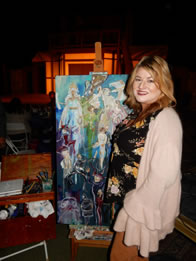
Lisa Owen stands with her live painting in progress of William Shakespeare's King Lear during intermission of Shakespeare in the Vines' production. This is Owen's third year doing these paintings for the company. Photo by Eric Minton.
Lisa Owen sits at her easel before tonight's presentation of Shakespeare in the Vines' production of William Shakespeare's Lear. A professional artist from Seattle who settled in Southern California in 2005, Owen does “Live Painting,” creating in real time a montage of an event's scenes and atmosphere. She works weddings and bar mitzvahs and also paints ballet performances and polo matches.
This is her third year painting for Shakespeare in the Vines at the Baily Vineyard and Winery in Temecula, California. Her work goes onto Shakespeare in the Vines literature (this season's playbill features a painting of a past production) and is auctioned in support of the organization. Her Shakespeare passion is evidenced in the young woman standing with Owen, her daughter whom she named Juliet. Lisa traces her affinity for Shakespeare to playing one of the Weird Sisters in a middle school “modern art” production of Macbeth. “My name was the Earth Sister,” she says, and describes how she spoke lines about the earth rejecting Macbeth. “It was in the '70s; it was very artsy.”
Owen has read every play and generally knows their plots, characters, and major themes, but she likes to attend a Shakespeare in the Vines production before doing the live painting. King Lear (this production regenders the title character and renames the play just Lear) gives Owen many potentially interesting visuals to work with, from three sisters and a Fool to eye-gouging. She tries to capture the production's mood, too.
When I meet her she's already touching up a map of Lear's territories, which will serve as the painting's background for a sweep of characters and moments in the play. “Just vivid scenes,” she says. “There's always letters in Shakespeare's plays, so I always have stationary flying all over the place. There's one with a knife through it, so I'm going to do a knife through a letter. There's some violence in this one, so I'll be doing blood here and there. There will be some missing eyes.” When I check in with her at the intermission, much of the painting is completed: a few touchups to come, she tells me. She has captured a fairy tale–like pageantry descending into chaotic darkness.
That's kind of my state this evening. I'm at the tail end of 40 mostly sleepless hours. After a normal 5:30 a.m. wakeup yesterday morning and taking Sarah into her workplace, I worked steadily through the day before picking her up about 6 p.m. She had one of her seizures on the way home and went down for the rest of the night. By myself I finished all pretrip preparations, and as midnight arrived and a 3:30 departure from the house for our 6 a.m. flight approached, I decided to wait until I was on the plane to sleep. I did nap about an hour on the flight from D.C. to Detroit, but a four-hour-plus delay in Detroit due to a maintenance problem on the Boeing 757 knocked my strategy awry. I never sleep in an airport waiting area. Then, I only got an hour's sporadic sleep on the cross-country flight, despite sitting in first class per my strategy catering to Sarah's condition on these longer trips. Instead of arriving at Los Angeles International at midmorning, we got in after 2 p.m., hitting the highway at the height of gridlock. We passed one interstate traffic monitoring sign informing us that the next 12 miles would take 60 minutes. Really? Yes, really. What would have been a 90-minute drive in the morning was a 4 1/2-hour drive this afternoon.
Not even stopping to check into our hotel, we arrive at Baily Vineyard late for my first round of interviews and close to the scheduled start of the play—a start delayed almost 40 minutes because Lear herself is stuck in traffic from the other direction. Shakespeare in the Vines' Founding Artistic Director Sheila Havens Ryle greets us with a bottle of wine. She's about to have it opened when I say, um, not tonight (and Sarah can't drink alcohol for the foreseeable future). I visit with Ryle, a couple of the company's board members, and Lear's director, Zack Bonin, as well as Owen.
I make it through the play's first half, and see Gloucester use his dagger to stab the supposed Edgar letter to the wall, Owen's reference to “knife through a letter.” However, after 38 hours of little sleep and lots of sitting—at my desk, on an airliner, in an airport, in a car, and now on a folding chair—I succumb, slipping in and out of consciousness. I see Lear storm in the storm right after intermission, but I miss the hovel, waking up only to see Lear kill the Fool (WTF?!!). I drift away trying to make sense of it, then screaming awakes me in time to see an eyeball fly across the stage toward the audience. I'm out all the way to Dover, though I do see Gloucester not die. Somehow I miss Oswald's noisy death, but I catch Edmund being killed by his sister, the third character she would have killed in this production, assuming she offed Oswald. From thence I make it through the end as Kent carries the dead Cordelia onto the stage while Lear issues forth spine-chilling screams of woe.
I'm trying to attend at least two performances of each production on my Canon Project itinerary, which gives me two choices for officially checking off that play and theater. The determining factor is my goal to see every play in the canon, not just attend. Obviously, I'm going to have to wait until tomorrow evening's performance—and better understand all the WTFs of this evening—before checking off King Lear at Shakespeare in the Vines.
King Lear, Shakespeare in the Vines
Baily Vineyard & Winery, Temecula, California, June 22
That the title character in William Shakespeare's King Lear is played by a woman is not new. That the role is regendered as Queen Lear is not new, either. This Shakespeare in the Vines production is the second Queen Lear I've seen, and the woman in the title role, Bobbie Helland, is portraying Lear for the second time, having played it at another theater seven years ago.
This Lear is unusual in that age is not necessarily her infirmity. A four-score person during the Renaissance (the setting suggested by this production's costumes) was at the extremity of age, relative to five score today when we have people like Supreme Court Justice Ruth Bader Ginsburg, U.S. Senator John McCain, business magnate and philanthropist Warren Buffett, journalist Helen Thomas, and baseball broadcaster Vin Scully all fully functioning 80-plus-year-old statespeople. In temperament, however, a closer example to a modern-day Lear would be President Donald Trump, who just turned 72. “Better thou hadst not been born than not to have pleased me better,” Lear says to his youngest daughter, Cordelia, after she would not engage in an over-indulging public display of flattery. Lear uses vague hyperbole when he threatens revenge on his other two daughters, whom he calls “unnatural hags”: “I will do such things—what they are, yet I know not: but they shall be the terrors of the earth.” He equates love with material status, deeming the retinue of 50 knights that one daughter allows him compared to the other daughter's allowance of 25 as "twice her love.”
Under the helm of Zackary Bonin making his director's debut (he played Edmund to Helland's previous Lear), this Lear is a quick-tempered egomaniac whose impetuosity leads to governance by chaos that inevitably slides into the play's nihilistic landscape. “I'm all sweetness and light until I'm crossed, and then you're banished,” Helland says in describing her Lear's temperament. “Zack said I needed to be really careful to hear [the other characters] as very reasonable. I'm going to bring a hundred people to your house and you're going to support me? That's unreasonable. I've got to hear them, acknowledge that they're right and reasonable, and then say, ‘I'm the queen.' That turning off what's reasonable to insist on my way—and of course they screw me over—leads to shame because I'm wrong, and I can't acknowledge that I'm wrong. It's the beginning of this powerlessness and rage that I'm afraid is going to turn into madness and even more rash decisions. That's the journey Zack took me on for this version of it, and I feel like it works better than starting off crazy.”
Helland is describing her Lear as she and her daughters in the play—Rebecca Reber playing Goneril, Monica Reichl as Regan, and Hannah Dorss as Cordelia—along with the actors playing the regendered Fool (Wendi Johnson), the regendered Edgar (Sam Maybrier, now Gloucester's daughter), and Edmund (Preston Helms as Gloucester's bastard son) have gathered for interviews at Baily Vineyard & Winery in Temecula, California. This is the "Vines" in the theater company's name. Because of the afternoon heat, we've moved the interview indoors to the vineyard's Carol's Restaurant, where Sarah and I ate lunch earlier in the day (sweet potato fries in special dipping sauce, baby Portobello mushroom bruschetta, and a “duet of raviolis” in the vineyard's own Montage wine sauce). We're gathered around a large table in the now-empty restaurant.
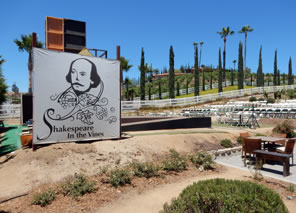
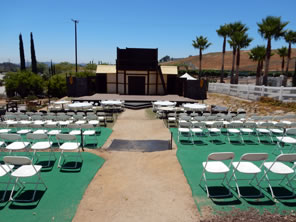
Photos by Eric Minton
On one of our baseball journeys through Southern California 10 years ago, Sarah and I came upon Temecula with its array of vineyards blanketing a landscape of steep, arid hills caressed by Pacific breezes. We loaded up a case of different varietals from the region and determined to return someday. It's someday, but we're not stocking up on wine this time. We're here to see my favorite Shakespeare play. Sheila Havens Ryle, then a high school theater and music teacher, moved here from San Pedro in Los Angeles County and was inspired to launch her dream of creating a Shakespeare company in this dramatic landscape. Her Shakespeare in the Vines started in 2005 at Keyways Vineyard and moved to residencies at other vineyards before Phil and Carol Baily made Ryle an offer four years ago: If you come, we will build a theater. The outdoor stage sits to the side of the winery's parking lot, pomegranate shrubs bordering the backstage space. Tables for prime seating fill in the ground between the stage and three terraces of seats with views of vineyards rising to Mediterranean-style homes and chateaus.
The temperatures we're avoiding now we yearn for a couple hours later. As the play starts at 7:30 pm, we are comfortable in long-sleeve shirts. By the end of the first scene, I'm folding my arms around myself to fend off the chill. Three more scenes into the play, I'm wrapped in a blanket. Shakespeare in the Vines provides blankets for a donation of our choice. I pay $10 for two blankets—cheap for their value on this night. By the time Lear loses her wits, the breeze has sent the night air into the 50s feeling like 40s.
During the cast discussion at Carol's Restaurant, I start feeling like Dr. Phil moderating the three actresses playing the daughters as they spill forth their characters' hurt feelings. Reber (Goneril) sometimes scowls at Dorss (Cordelia). Reichl noticeably bottles up her aggravation a la Regan. Goneril's Reber and Fool's Johnson begin openly sniping at each other: "They're horrible brats!" Johnson says; “We are traumatized and need therapy!" Reber retorts; “I can't stand the Fool!” Goneril continues; “You beat me!” the Fool responds. The actors' falling into their characters' mutual dislike suggests how the production probes their testy history, evidenced in the play's script. Lear's questionable choices don't begin with the play's first scene; they are obvious in the family dynamics. “The best and soundest of his time hath been but rash,” says Goneril, agreeing with a sentiment Regan has just expressed at the end of that first scene. Obviously, both have long put up with the put-downs Lear uses in the play—and what kind of mother wishes sterility on her daughter, as Lear pronounces? Cordelia had a more favorable upbringing, but she is yet young: Dorss says her Cordelia has seen enough of Mom to know that anything can happen, so she's careful—but you can never be sure of yourself with this Lear.
Helland reads the opening scene's love contest as an idea that has just struck her Lear, going off the intended script for this public pageant of splitting her kingdom among her children in order to retire from her duties as queen. The resulting eruption not only shocks Cordelia (and Goneril and Regan, too, but they are pleased that Cordelia is getting what they've long endured), it seems to shock Lear. In her cornered impetuosity she tumbles down a sequence of rash actions: disowning Cordelia, banishing Kent for trying to offer honest, insightful advice, and, in Helland's opinion, an in-the-moment decree of a 100-knights retinue. The whirligig of Lear's temperament continues in this vein through the play's first half, through, even, the storm. It is in the hovel that dementia takes over as, in this production, she suddenly recognizes the disguised Kent (Nick McAfee) but believes it can't possibly be him. “My wits begin to turn,” she says in that moment. And turn they do. When the delusional Lear puts her daughters on trial in the hovel, Johnson's Fool begins mimicking the girls, and Lear in a rage stabs her to death (this production's explanation for the Fool's disappearance for the rest of the play).
Helland's Lear doesn't come to her senses until her final scene, after her youngest daughter, with whom she had just been reunited, is killed. Kent gets the job in this staging of carrying the dead Cordelia on stage while Helland, walking behind, emits three screams of woe with such force Orion's Belt above vibrates. “Cordelia, Cordelia!” Lear says with defeated urgency as she cradles her daughter's body on the ground; “Stay a little.”
To read the review of this production, click here.
The Winter's Tale, Shakespeare by the Sea
Point Fermin Park, San Pedro, California, June 23
It's a happening. Three hours before showtime, a smattering of people sit on benches watching the cast and crew erect a set in the small amphitheater. More people arrive. Some lay out blankets on the lawn behind and on either side of the rows of benches. Others set up lawn chairs and portable tables. Two women set their chairs in the alcove of a Moreton Bay fig tree, a massive growth of limbs and branches with a trunk big enough to have alcoves. People coming to see the show converse with members of the company and catch up on family news, children wedded, and grandchildren born. A little boy dressed as a bear prowls the grounds, roaring on request, a clue as to what play we're about to see.
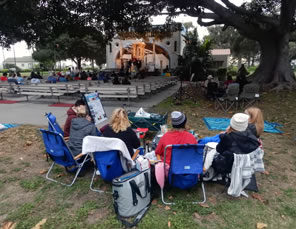
Picnickers prepare for Shakespeare by the Sea's production of William Shakespeare's The Winter's Tale at Point Fermin Park in San Pedro, California. Below, a boy in a bear suit shows off his best growl. Bottom, the cast gathers on stage at the end of the show. Photos by Eric Minton.
We are at Point Fermin Park in San Pedro, a seacoast community and part of greater Los Angeles. The coast is a cliff with Point Fermin Park and its 1874 lighthouse perched on top. Below, extreme tides create tidal pools where crabs and anemones feast on fare trapped when the tides go out. Earlier in the day, Mitch Boretz, a friend from my college days at the University of Missouri-Columbia, leads Sarah and me and another college buddy, Joan Sontag, for a hike across the shoreline boulders at low tide to explore these tidal pools and other-world rock formations. Joan stays with us for tonight's play, Shakespeare by the Sea's production of William Shakespeare's The Winter's Tale.
The boy in the bear suit is not a member of the cast. He just likes coming to the shows, though he did get to pursue the exiting Antigonus in a preview performance the night before. Tonight is opening night for this intelligently well acted, free-to-the-public Shakespeare production, running in repertory with Shakespeare's The Merry Wives of Windsor. Before the show, with the entire cast and crew on stage, the audience of about 400 offers a toast. At the end of the play, the cast hangs around to chat with audience members before changing out of their costumes to strike the set.
 Shakespeare by the Sea started as a master's thesis project. Lisa Coffi was an actress in Sacramento who first encountered Shakespeare when her friends encouraged her to audition for Sacramento City College's Shakespeare in the Park. “It was so much fun that—," she pauses as she recalls this pivotal point of her life: "And, yes, that was it. I got hooked. I thought it was so cool doing Shakespeare, outside, at night, with a lot of other artists. I loved being part of the whole thing.” When her then-boyfriend (now husband), a member of the California Highway Patrol, was assigned to Los Angeles, Coffi figured the best way to meet people in a new town was through an acting class. She enrolled at California State Long Beach and ended up in its three-year master's in theater management degree program. Rather than creating a theoretical summer Shakespeare festival, she decided to do one for real, choosing Point Fermin Park as her site. “We didn't have a lot of opportunity in the college to actually put what we were reading about into practice,” she says. She initially approached the city with a plan to fence off a portion of the park and charge admission. “I was pretty much told, ‘You're nuts. This is a port town. It's the highest concentration of bars in the City of Los Angeles. These people do not want to see Shakespeare.'” She persisted, agreeing to offer the shows for free.
Shakespeare by the Sea started as a master's thesis project. Lisa Coffi was an actress in Sacramento who first encountered Shakespeare when her friends encouraged her to audition for Sacramento City College's Shakespeare in the Park. “It was so much fun that—," she pauses as she recalls this pivotal point of her life: "And, yes, that was it. I got hooked. I thought it was so cool doing Shakespeare, outside, at night, with a lot of other artists. I loved being part of the whole thing.” When her then-boyfriend (now husband), a member of the California Highway Patrol, was assigned to Los Angeles, Coffi figured the best way to meet people in a new town was through an acting class. She enrolled at California State Long Beach and ended up in its three-year master's in theater management degree program. Rather than creating a theoretical summer Shakespeare festival, she decided to do one for real, choosing Point Fermin Park as her site. “We didn't have a lot of opportunity in the college to actually put what we were reading about into practice,” she says. She initially approached the city with a plan to fence off a portion of the park and charge admission. “I was pretty much told, ‘You're nuts. This is a port town. It's the highest concentration of bars in the City of Los Angeles. These people do not want to see Shakespeare.'” She persisted, agreeing to offer the shows for free.
Her production of The Comedy of Errors, which she chose because it is fun and accessible—“an easy sale,” she says—succeeded by one important measure: she earned her master's. A greater measure of its success, however, is that those involved and those who attended expected her to continue staging Shakespeare in Point Fermin Park. So she has, for 21 years, and not just here. After Shakespeare by the Sea's residency in San Pedro through the first weekend of July, the company will take its repertory to 21 other community parks and sites throughout Los Angeles before returning to Point Fermin for the “Grand Finale” on August 17–18. The city that questioned her sanity has provided Shakespeare by the Sea infrastructure upgrades to Point Fermin Park and offered Coffi a permanent theater space where she operates Little Fish Theater, now in its 18th season of staging contemporary and classic plays for paid admission. That first year's production of The Comedy of Errors cost $22,000; this year, her production costs total $325,000 for two shows.
Coffi and I along with Associate Artistic Director Suzanne Dean, who has been with the company 19 years, are sitting on one of the benches amid the bustling energy of the cast and crew erecting the set and rigging the lights and sound system. Though Coffi has moved back to Sacramento and Dean now lives in the San Francisco Bay area, the two women continue to run the company. They journey down to Los Angeles to oversee the mounting of productions and to reconnect with their audiences. Coffi describes it as “Thanksgiving in the summer time” without simmering family issues.
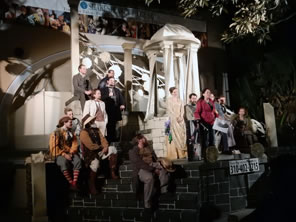 Being a member of this company requires more than acting skills. Construction, demolition, and public relations skills are prerequisites, too. “We are as true a traveling troupe as has been since Elizabethan times," says Patrick Vest, who has been performing with the company since 2002. "The people who do this are a special breed because nobody would do it, except the people who it draws." Erecting the set together—the very foundation of their art, Vest points out—builds tight camaraderie, and he appreciates taking the shows into communities that otherwise wouldn't have access to Shakespeare and becoming a part of those communities. “I do this every year because I absolutely love it. What I love about it is this kind of stuff,” and he motions to the last bits of set being packed away. It's past 11 p.m. and he's had a hard day's night. He helped build the set, he participated in a preshow Q&A with the audience, he helped dismantle the set, and, along the way, he played Leontes.
Being a member of this company requires more than acting skills. Construction, demolition, and public relations skills are prerequisites, too. “We are as true a traveling troupe as has been since Elizabethan times," says Patrick Vest, who has been performing with the company since 2002. "The people who do this are a special breed because nobody would do it, except the people who it draws." Erecting the set together—the very foundation of their art, Vest points out—builds tight camaraderie, and he appreciates taking the shows into communities that otherwise wouldn't have access to Shakespeare and becoming a part of those communities. “I do this every year because I absolutely love it. What I love about it is this kind of stuff,” and he motions to the last bits of set being packed away. It's past 11 p.m. and he's had a hard day's night. He helped build the set, he participated in a preshow Q&A with the audience, he helped dismantle the set, and, along the way, he played Leontes.
“It's emotionally very demanding. It's very tiring to go through it,” he says of the role (not the extra work). He estimates he has acted in more than 50 Shakespeare productions, playing, among many roles, Macbeth, Iago, Caliban, Marc Antony, Mercutio, King John, Malvolio, and Shylock. Leontes was one of the few roles remaining on his bucket list. “Doing Mackers was easier because he has such joy in what he's doing for most of it. Same with Iago. But with this, you're alone and you're experiencing it alone. Nobody believes you and everybody's giving you counsel. So, yeah, it is a hard role emotionally, but the journey's certainly rewarding, too, because the end of the journey, the reunion, is so beautiful and magical.”
He's talking about the play, but I'm applying those last words to this Shakespearean scene by the sea, too.
To read the review of this production, click here.
The Tempest, Lowell Davies Festival Theatre
The Old Globe, San Diego, California, June 26
Seaport Village at the juncture of downtown San Diego and San Diego Bay is a huddle of boutiques, eateries, duck-populated ponds, an 1895 Looff carousel, and fortune tellers (human and mechanical). One of the stores here is the Upstart Crow Bookstore and Coffeeshop, named for the first known reference—an insult, no less—to William Shakespeare as a playwright in London. To call Upstart Crow Bookstore and Coffeeshop eclectic is like saying the planet Pluto is far away. Books share shelves with toys, tchotchkes, and Beatles memorabilia. An upstairs play area for children has a giant chess set and a large crow manning (birding?) the register. And, yes, a shelf is devoted to Shakespeare books (and a Shakespeare finger puppet lies in a box of other such puppets upstairs).
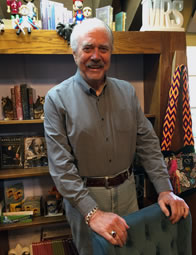
Darryl Woodson in San Diego's Upstart Crow Bookstore and Coffeeshop. Photo by Eric Minton.
I meet Darryl Woodson here and help him hang a banner announcing a July 3 reading of Shakespeare's Much Ado About Nothing at the Upstart Crow under the auspices of the San Diego Shakespeare Society. Woodson is the president of the society, founded in 2000 by Scottish immigrant Alex Sandie, who died this May. The society hosts play readings for the public at this bookstore and at the Veterans Museum (San Diego is home to many U.S. Navy and Marine units), runs the San Diego Student Shakespeare Festival, and presents Celebrity Sonnet readings at the Old Globe Theater.
Woodson was once an aspiring Shakespearean actor. After serving as a Navy hospital corpsman, including a 15-month tour in Vietnam, he started pre-med coursework in college but caught the acting bug and earned a scholarship at San Francisco's American Conservatory Theater. In 1970 he joined the New Shakespeare Company of San Francisco and fell under the spell of its founder, Margaret Roma. “She ignited my imagination for Shakespeare,” he tells me. But he eventually went into business, primarily in marketing and sales, and concentrated on building a comfortable living for himself and his wife Barbara. A job moved him to San Diego in 1985, and he retired here at age 60 in 2005 with a nest egg sufficient to allow him and his wife to travel extensively. Three years ago, Woodson encountered Sandie and joined the San Diego Shakespeare Society. He's even returned to acting, playing Ross recently in a small local production of Macbeth.
Though he was absent from acting all those years, he was never far from Shakespeare because he was never far from The Old Globe. The theater founded in 1935 and staging Shakespeare plays every summer since is as venerable a San Diego institution as the San Diego Zoo, The Old Globe's neighbor in the city's cultural centerpiece of Balboa Park. In my time here in San Diego, I encounter many “Shakespeare junkies” who came to the Bard as young children when their parents took them to plays at The Old Globe.
More than 45 years on from his first intensive encounter with Shakespeare, Woodson still appreciates how the plays speak directly to today, a lesson Roma, with her background in Bertolt Brecht's theater, pounded into her Shakespearean charges. “She had a way of opening your eyes to what was happening in Shakespeare and relating it to today's situation in the world,” he says. “Like what's happening on the border right now; she would use that as an example. If there was a scene involving an immigrant or people banished from the court (i.e., As You Like It), it could be related to the border crisis. Then you'd incorporate some of that feeling to open up your mind and your senses. Then you'd work on a sensory level: What do you see? What do you smell? What do you hear? What's it feel like? And from those senses and your outlook on the current situation, you would then try to bring today's truth into the text. That's what illuminates the text and makes it shine so bright. Otherwise, why do Shakespeare if it's just museum dust and has no relevance to our lives?"
The border crisis Woodson is talking about has been dominating the news this week with immigrant parents landing in detention and separated from their children. Back home in the nation's capital, political chaos reigns with President Trump passing the buck off to every conceivable entity while claiming himself powerless to alter conditions his administration's policies created. At the same time, I am in Southern California attending King Lear (impetuous ruler making rash decisions and refusing to listen to good counsel, creating chaos in his realm) and The Winter's Tale (impetuous ruler gripped by a self-created conspiracy and turning tyrannical as he demands loyalty over ethical governance and common sense). Neither of these productions directly reference President Trump—they don't even use modern dress—but just by watching Shakespeare, I see the truth of the world I'm living in.
Tonight, I do escape that world by immersing myself in the world of Prospera. Director Joe Dowling has set his Old Globe production of The Tempest in a ruined theater where the magical desert island is encroaching on the set (trees and vines sprouting here and there, pebbly sand on the floor). The scenic design by Alexander Dodge is full of clever clutter (theater seats, stacks of books, office equipment, a ship's wheel) and graffiti. At the center is a rotating platform, angled to match the slanted stage so that as it turns it creates a rise to the front of the stage serving as a ship's bow, Prospera's promontory, and the earth moving under the feet of Miranda (Nora Carroll) and Ferdinand (Sam Avishay) as they experience first love.
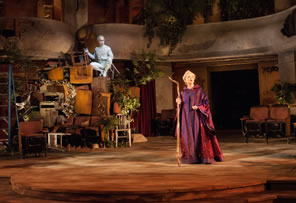
Prospera (Kate Burton, right) gives instruction to Ariel (Philippe Bowgen) in The Old Globe's production of Shakespeare's The Tempest. Photo by Jim Cox, The Old Globe.
Playing Prospero regendered as Prospera is Tony-nominated and Emmy-winning Kate Burton, who combines the practical and protective elements of being a parent to the play's lead role, which she delivers with exceptional verse-speaking skills. While it would be easy to point to her playing a man's part as exemplary of the #TimesUp Movement (already this year I've seen three male lead Shakespeare roles regendered and two male leads played by women in addition to two all-female casts), Burton's chief contribution in the role is in effectively bringing home this play's primary theme: forgiveness. With all her enemies finally in her grip—both those who usurped her rule as Duke of Milan and those who intend to kill her on the island—her desire for vengeance increasingly consumes Burton's Prospera. She's monstrously raging when Ariel (Philippe Bowgen) expresses his own sympathy for her captives. “Your charm so strongly works 'em, that if you now beheld them, your affections would become tender,” Ariel says.
“Dost thou think so, spirit?” Prospera replies, Burton's reading of this line implying a spirit to be something beneath her. “Mine would, were I human,” Arial replies. Burton turns away from the spirit. “And mine—shall.” Her pause is not so much one of effort, trying to cast off her desire for vengeance, but of dawning realization: forgiveness is the greater virtue and her truer self. The power of this scene profoundly reverberates when Prospera later tells her usurping brother, Antonio, “I do forgive thy rankest fault—all of them,” and René Thornton Jr. as Antonio looks on her astonished. To the end of the play, Thornton's Antonio watches in wonder as Prospera displays the power of virtue.
That's today's truth, too.
To read the review of this production, click here.
Thursday, June 28—He's an American Bard
Back at The Old Globe, but this time I'm in the reception area of the theater's administrative offices. I've seen the company's production of The Tempest the previous two evenings, and I'm here to interview members of the cast: Kate Burton, who plays Prospera, and two students in The Old Globe and University of San Diego Shiley Graduate Theatre Program, Nora Carroll playing Miranda and Sam Avishay playing Ferdinand. I've already had lunch downtown with René Thornton Jr., who plays Antonio in this Tempest. That interview was less about Antonio and more about the Prospero he played at the Blackfriars Playhouse two years ago, a single step in an acting career that has included every play in the Shakespeare canon. An actor completing the canon is a far more difficult feat than merely seeing every play in the canon as I've done (though I'd like to see him try to act in every Shakespeare play in one year—each at a different theater, no less). I've also visited the KPBS studios on the campus of San Diego State University to meet Beth Accomando, film critic and arts and culture reporter for the station. She fills me in on the Shakespearean and theater landscape of the community through her own avid enthusiasm for Shakespeare. Her parents began taking her to Old Globe productions when she was 6 years old, and she's so excited to talk Shakespeare with me, she wore her “Out damned spot” bracelet.
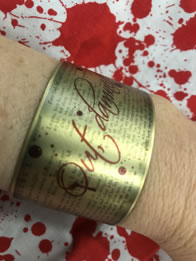
KPBS cultural reporter Beth Accomando's Shakespeare-themed bracelet. Photo by Beth Accomando.
Waiting to be escorted into The Old Globe's conference room by Public Relations Director Susan Chicoine, I read the company's mission statement. It starts with “The mission of The Old Globe is to preserve, strengthen, and advance American theater…”
“Shakespeare is American theater?” I ask The Old Globe's Artistic Director Barry Edelstein in my first interview this afternoon.
“Totally. Absolutely,” he says. “Since the early 1600s the first colonies in North America were happening while Hamlet was playing at the Globe. So, it's been part of American life from the absolute very beginning. It's in our DNA. Lincoln quoted him all the time. Obama said he read him. George W. Bush said he read Shakespeare on his vacations. And American actors have a combination of skills to express this material that I think is very unique around the world, which is the technical chops, as you see with Kate Burton—maybe she's a ringer because her father was Richard Burton, but I tend to think not—and certainly the young guy who plays Ariel [in The Tempest], Philippe Bowgen. That guy's as good a rising Shakespeare talent as we have. Why? Because he has the technical facility to get that language crisp and clear and make the thought razor sharp, but also he's got a physical engagement and an emotional engagement that is muscular and truthful and powerful.”
Prior to becoming the artistic director at The Old Globe, Edelstein spent 5 1/2 years at New York's Public Theater. As director of the Public's Shakespeare Initiative, he was in charge of Free Shakespeare in Central Park, the Mobile Unit, and the Shakespeare Lab along with other programs in the theater's Shakespeare department. He points out that the Public is across the street from the site of the Astor Place Riot of 1849 when fans of British Shakespearean actor William Charles Macready and American Shakespearean actor Edwin Forrest clashed at a production of Macbeth. “Edwin Forrest is a personal hero of mine,” Edelstein says. “I just love the idea of Edwin Forest rejecting the effete tradition of the English classical theater and saying you have to sweat and you have to shout and you have to have muscles bulging and you have to be playing your guts out so that after the show every night you're exhausted.”
Edelstein is on a roll, and I let him roll on. “In addition to [American actors'] technical facility and the emotional, physical connection to the material, the pluralism that makes America so unique around the world shows up in the way we approach Shakespeare. There's multiethnic, multiracial companies that do this work. And out of all these different approaches to language and all these different cultural associations that come up, something alchemical happens with Shakespeare that gives it a kind of charge. The strength and the interest and the fabulousness of American diversity sort of channels itself through Shakespeare in a way that's tremendously exciting to me.” The Hamlet he helmed for The Old Globe last year included 11 artists of color among the cast of 20, including Hamlet, Ghost, Gertrude, Claudius, Guildenstern, and Marcelus. “You feel a difference. You feel a kind of energy in the thinking and a wonderful excitement to the musicality of the language that comes from the diversity of our work.”
He says the best Shakespeare he's seen didn't even originate in English but were the works of the Berliner Ensemble and Ingmar Bergman. “Absolutely the most astonishing stuff I've ever seen,” he says. “But after that, the best Shakespeare I've ever seen has been American: Al Pacino's Shylock, The Peter Sellars Merchant of Venice at the Goodman Theater so spectacularly incredible, Keven Kline's Falstaff, Kevin Kline's Hamlet. These were magnificent, magnificent productions that thrilled and transported and delighted. So, yeah, I think there is an American Shakespeare, and I want to be part of it."
So much so that after he earned his master's in Shakespeare at Oxford, he turned down opportunities offered him from theaters in England. "All I ever wanted to do was do Shakespeare, but back at home—to do this great work but in the culture that was my culture. I wanted to come back to where people were wrestling with these plays to make them connect to the culture in which they live, and I ended up in the Public because that was the place that sort of figured that out in what to me was the most vivid way.”
He continues to carry that torch for America's Shakespeare on the opposite coast from the Public, at The Old Globe, dedicated to preserving, strengthening, and advancing American theater.
Friday, June 29—Enter, Pursuing a Bear
Remember the bear at Shakespeare by the Sea’s production of The Winter’s Tale? Not the bear in the play—that was a soundtrack of vicious roaring—but the bear at the play, the little boy in the brown bear outfit prowling the grounds of Point Fermin Park, Shakespeare by the Sea's venue in San Pedro, California. On our return visit tonight for a second viewing of the production, I decide to get the boy’s name, which I didn’t ask for when I received permission from his mother to take the picture that posted with last week’s journal entry.

Crockett Burke makes the scene before Shakespeare in the Sea's presentation of The Winter's Tale. Photo by Eric Minton.
Sure enough, the boy is here in his bear costume, and I see his mom volunteering at the Shakespeare by the Sea souvenir stand. I re-introduce myself to Ramona Burke and ask what I thought would be a simple, one-and-done question: what is your son's name?
“Crockett,” she says. However, the boy, who claims to be 5 1/2 years old but is within weeks of his sixth birthday, immediately says otherwise: “Gideon Alexander Burke.” He's correct—for the time being.
During Ramona's pregnancy, her daughter, Leonora (now 9 years old and also hanging out here with her mother and younger brother) had an ear infection that diminished her ability to hear. When her older brother started talking about Davey Crockett, she thought he was saying Baby Crockett. That became the unborn son's nickname. “The name wasn't supposed to last past the pregnancy, but it did,” Romana says. She and her husband are now trying to legally change the boy's name to Crockett, but the process is slow in California. Merely using it as a nickname in quotations won't do: “He's clearly Crockett,” she says, albeit he's wearing a bear-eared hood instead of a coonskin cap.
About that bear suit: It was Crockett's Halloween costume two years ago. Ramona tells me that also two years ago, on one of the family's visits to the park to see that year's Shakespeare by the Sea production of The Two Gentlemen of Verona, Crockett met one of the actresses. He was so excited over the encounter that on his return last year for Macbeth, he met up with the same actress, who painted his face with war paint during intermission. The Burkes returned show after show, the actress introduced Crockett to the other cast members, and the boy learned how to die dramatically and shout “For Scotland!” Ramona estimates that they attended 70 percent of Shakespeare by the Sea shows last year, including those at other parks around Los Angeles. Her expression now is evidence of her exhaustion then, but, she says, “When your kids beg to go see Shakespeare every night, how are you going to say no?” When The Winter's Tale was announced as one of the two shows in this year's touring repertory, Ramona pulled out Crockett's old Halloween costume for him to wear to the play.
As I talk to Ramona, Leonora fills in the details of her own fondness for Shakespeare. She rapidly recites all of the Shakespeare references in the musical Hamilton and shows me pictures of her models of stages that she constructs with natural objects from around the park (twigs, leaves, flowers, trash). If not a Shakespeare designer this girl is heading toward a career as an architect—or playing the part of Lafayette. She also volunteers for Shakespeare by the Sea, selling programs for $2 each. I ask Ramona if she set out to expose her children to Shakespeare, and she points beyond the park's parameter to the neighborhood a couple blocks away. "I was born on Shepard Street," she says—“on the kitchen table.” She and her husband performed in two different youth Shakespeare companies when they were in high school, but the family's association with Shakespeare by the Sea began on a hot night about 10 years ago. “The air conditioner was broken, and it was cool out here,” she says.

Darren Burke mans the concession stand for Shakespeare by the Sea in Point Fermin Park. Photo by Eric Minton.
When she escaped the heat in their home while taking in a bit of Shakespeare, Ramona brought along her 2-year-old son, whom she mentions by name for the first time in our conversation. “Darren is the one obsessed with Shakespeare,” Ramona says, going on to describe his knowledge of the plays. She now points to the opposite side of the park: Darren is manning the snacks and drinks concession.
I walk over, digital recorder now coming out of my workbag. I introduce myself and my mission to 12-year-old Darren and start the interview. “When I was really little, I was just reading everything,” he says. “I read Robin Hood books. I read all sorts of ridiculously advanced books. So, I came here one time because some of our friends had suggested that we come. I loved it. Then I got a bunch of books with every single Shakespeare play with less Old English, so it was more understandable at the time for me—it got the story across. And that made me even more obsessed. I wanted to read every single one.”
He has not read the actual plays, he says, though, “I'm looking into it, I'm looking into it. When it's scripted I do kind of prefer it as an actual show. The other way it's more like a novel except with the plot of a Shakespeare play. I like the original language when I'm actually seeing it on the stage because when you can get the actions and you understand the story, you get a better feel of the emotion than if you were just reading all the very strange words.” Merely reading the plays' texts, he says, “I'm not entirely sure what's going on there.”
A customer is waiting. As Darren is serving her, a short line forms. Over the loudspeakers comes the announcement that the play will start in five minutes. In the sudden crush of customers, Darren sells five cups of coffee and a couple of snacks, then discloses to me that he is also studying ballet. “I was at a ballet intensive camp today. Four hours of that. I'm kind of tired right now.” A ballet of A Midsummer Night's Dream, in fact, turned him onto Shakespeare, he says now. “I really liked that, and I think after that I looked into the books, and then I read the books, and then we came here and I was already interested. The timeline is a little bit blurry in my head; I don't remember.” I point out that he's 12 and fuzzy memory comes with age. “I'm an old man,” he replies.
At the play's intermission I seek clarification from Ramona. Comparing the two accounts, my understanding is that after his first exposure as a 2-year-old, Darren attended a friend's birthday party at Shakespeare by the Sea when he was between 6 and 8 years old and started coming every year since. Now, it's a family affair. What's in a name? A Crockett by any other name probably wouldn't have led to this profile.
Nor does this profile end there. Crockett's favorite actress is not in this year's company, but he has no shortage of friends. After the play, Patrick Vest, who plays Leontes, is conducting the nightly raffle. He pulls a slip of paper out of a bucket, looks at the sheet, and breaks into a surprised smile. "It's Crocket!" he shouts, and the cast and many in the audience cheer. Crocket walks up to the stage for his gift certificate, and while posing with the cast for a photo, he says, "It's about time."
The Two Noble Kinsmen, Kingsmen Shakespeare Company
California Lutheran University, Thousand Oaks, California, June 30
Timothy Hengst brings out a tray of fresh-made sushi, and the circling company of hungry feeders swarm in with subtly aggressive jostling to fill their plates. Company is the operative word here: These are the actors, technical artists, directors, and board members of the Kingsmen Shakespeare Festival, along with one journalist (who discovers his is not the most ruthless species when free food is on the table) and his wife. Tonight the company is celebrating the successful opening of its 22nd season with The Two Noble Kinsmen, written by William Shakespeare and John Fletcher.
Sarah and I are at the Hengsts' home in Thousand Oaks, a few blocks from California Lutheran University (CLU) and its Kingsmen Park, which gives the name to the university-affiliated professional theater company. Hengst, a 1972 CLU graduate and a medical illustrator by profession—a skill combining his visual arts talents with his love of anatomy—is a professor in the CLU Multimedia Department and chair of the Art Department. He also is Kingsmen's executive director, and though he has been overseeing typical season-opening responsibilities and hosting me, the afore-mentioned journalist, he has spent the better part of today preparing the sushi we are now devouring. “May be the only theater company to have an opening party with sushi made by the executive director,” Hengst wrote in an email inviting me and Sarah to attend. This bit of chef's bravado comes up short of his talents. Over the course of the day, I hear praise from University President Chris Kimball, from Kingsmen Artistic Director Michael J. Arndt, and from veteran Kingsmen actor and fight director Jason D. Rennie for Hengst's sushi-making skills and his willingness to donate his talent to a variety of Kingsmen, university, church, and community causes. "Tim Hengst sushi is in high demand here," Kimball says. Now, at the end of the day, I can attest to why: it's the best sushi I've ever tasted.
The party epitomizes our Kingsmen experience today, a mixture of warm fellowship in a beautiful community exhibiting exquisite talent that delivers a somewhat exotic offering, from homemade sushi to the seldom-seen Shakespeare-Fletcher collaboration of The Two Noble Kinsmen. We start the day over coffee and chai latte at the student union next to Kingsmen Park. Hengst introduces us to Kimball, who has combined this meeting with walking his dog, a Yorkshire-mix (Kimball thinks the other half is schnauzer) with a short attention span and an “irrational desire to attack things,” both manifested in near-constant barking. The dog at least succeeds in ending up in Kimball's lap. Kimball has been the university's president for 10 years. He views the Kingsmen Shakespeare Company as a great opportunity for CLU students and faculty to have access to a resident professional theater company, which serves recruiting and retention ends, too. The company also is a community asset, one that can impact charitable giving for the college as a whole. “There's people in the community who don't touch the university in any other way, but wouldn't miss a Kingsmen performance for anything,” Kimball says. “Even though we're a private university, we have to serve the public good, and this is one great way that it's done.”
California Lutheran College was founded in 1959 (it took on university status in 1986) on Ventura County farmland. Thousand Oaks grew up around the campus, and the institution has always served as the community's cultural centerpiece with civic programs, art exhibits (an art gallery is integrated into the football stadium), and concerts. Shakespeare was added to the spectrum in 1997 when television actor Lane Davies, artistic director of the financially teetering Santa Susana Repertory Company, asked CLU theater professor Arndt if the university could stage the company's production of Shakespeare's A Midsummer Night's Dream. No theater space was available, but Arndt offered use of Kingsmen Park.
They played on the grass with no stage, no sound system, minimal props, and minimal lighting. “But people came,” Arndt says. One of Arndt's colleagues told him, “This is what it's all about, people gathered in a circle listening to great stories,” prompting Arndt and Davies to form the Kingsmen Shakespeare Company as co-artistic directors. A few years later, Davies moved on to found the Tennessee Shakespeare Festival, and Arndt remains as Kingsmen's artistic director. His deep love for Shakespeare goes back to when he was serving in the 1st Cavalry Division in the Vietnam War. He would memorize passages from Shakespeare to steady himself during combat.
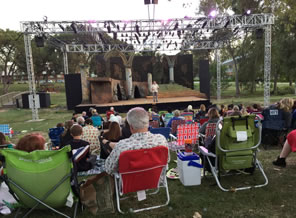
Kingsmen Shakespeare Company Artistic Director Michael J. Arndt adresses an opening weekend crowd at California Luthern University before William Shakespeare's and John Fletcher's The Two Noble Kinsmen. Photo by Eric Minton.
He's back for his 22nd summer in Kingsmen Park, but the company now uses a full stage under a light grid (moved out from the school's black box theater for the festival) and a cone microphone system. Though he's back in Shakespeare's theatrical Athens, it's a different play. As with A Midsummer Night's Dream, the wedding of Duke Theseus to Hippolyta is forestalled, but this time by three queens requesting that Theseus go to war with Thebes to allow them to recover their dead husbands' bodies. The play then turns its focus on the titular warrior cousins of Thebes, Palamon and Arcite, captured in Theseus's victorious campaign. When the imprisoned kinsmen see Hippolyta's sister, Emilia, through their jail cell's window, they become so infatuated with her that they determine to fight each other to the death for the right to love her—never mind that they are locked up in chains, Emilia doesn't even know they exist, and, in Director Elizabeth Swain's staging, Emilia is a lesbian. Arcite is released and banished by Theseus, and the Jailor's Daughter frees Palamon (and then embarks on her own subplot of descending into madness). The two noble kinsmen finally fight their duel, but Theseus interrupts them and orders Emilia to choose one and he will execute the other, terms she can't agree to because, well, duh! So Theseus orders the two kinsmen to round up three other knights for a tournament: winner gets Emilia, loser and his fellow knights lose their heads. "Is this winning?" cries Emilia after the competition delivers her a husband grieving over the immenent death of his best friend (though fate has yet one more plot twist).
“I was attracted first by this throughline of these two guys, but I was also fascinated about the fact that the women in this play are smart and the men are generally caught up in this chivalric code.” Arndt is telling me why he chose to do this piece this year. “And then you have the tragic tale of the Jailor's Daughter that starts with this comic kind of character and then you go into this role of madness. We were talking about the #MeToo year, and I think this play in some ways speaks to that, women caught in a world run by men. They're victimized by this society of men telling them what to do. Even with the Jailor's Daughter, this artificial solution that's brought about at the end may give her some comfort, but it's just creepy. And both Emilia and Hippolyta, they're warriors, they're Amazons, and they're caught in this world where they just have to stuff their own feelings down. That's why it was very important to me to hire a woman director to do this play.”
Swain embraces the strict formality of the play's first few scenes, presenting the Fletcher-Shakespeare script as a hybrid Greek tragedy and Italian adventuring hero flick. Theseus (Ross Hellwig) and Hippolyta (Angela Gulner) speak their mighty verses mightily before the three supplicating queens interrupt them in a dramatic burst of unearthly noise. The two noble kinsmen (Rafael Goldstein as Palamon and Connor Sullivan as Arcite) talk nobly of being noble before going into battle. After the almost mortally wounded kinsmen's capture, Theseus makes noble decrees about their nobility and orders them to prison, the queens make their ceremonial fairwells, and we suddenly are at the jail where a country swain comes acourting the Jailor's Daughter (Rachel Seiferth), who is obviously crushing on the noble kinsmen. They, though, only have eyes for each other, continuing to talk nobly of their circumstances until they spy Emilia (Samantha Eggers) in the garden. Goldstein now employs his notable skill in subtle comic timing as, upon comprehending that his best friend, also in chains, has designs on the woman of his own fantasies, he takes a slight pause before saying in an even tone: “I saw her first.” Suddenly, we're on a comical dark ride through scenes with tragic consequences.
Most of the company are encountering The Two Noble Kinsmen for the first time. Each actor I talk to admit to being baffled and worried by the archaically bizarre script. By the official opening night after a couple of preview performances, they've come to realize how the play makes for marvelous entertainment on the stage. The keys are balancing the chivalric formality with the human emotions and casting accomplished actors who can breathe life into even the most formal of verses. Both are on display this evening. Hellwig gives an intelligently off-kilter reading of a Theseus knocked about by one conundrum after another. Seiferth breaks our hearts with her aching yet sometimes funny portrayal of the Jailor's Daughter. Goldstein and Sullivan anchor the play as the titular kinsmen, combining the easy casualness of their friendship with strict adherence to chivalric code. Their conduct may seem off-the-chart stupid, but Sullivan and Goldstein give these guys such charm and earnestness you can't help liking them.
When Goldstein delivers Palamon's line, "I saw her first," a roar of surprised laughter engulfs Kingsmen Park. Goldstein and Sullivan tell me earlier in the day that all through rehearsals they had no idea how that moment would play with an audience. It plays well, sending us on a human comedy wrapped in a social tragedy.
To read the review of this production, click here.
Sunday, July 1—No Cone of Silence
Projection is becoming a lost art for new generations of actors. I base my opinion on 40 years of attending theater (seeing more than 780 plays), but it is shared by some within the acting community. I place at least some of the blame on technology that allows actors to wear microphones unnoticeable to the majority of audiences.
This convenience comes with consequences. Speaking actors often cannot be distinguished from the rest of the ensemble because their voices are not coming from the direction of their bodies (one of the reasons I stopped going to Public's Free Shakespeare in the Park productions in New York; unfettered technology in the audience by means of cell phones was another reason). Some performances sound like they are being delivered in phone booths; distortion measures the amount of passion the actor is portraying. Microphones short out, too. I saw Enjolras sing into the cheek of a woman at the barricades in Les Misérables until he could get offstage to get a new mic.
But in outdoor theaters, what are you going to do? God rested on the seventh day instead of creating acoustic masking for his new world. Stage microphones bypass some of the issues of personal mics but have their own problems adequately covering the stage, especially floor mics. Shakespeare by the Sea in San Pedro, California, positions its microphones at various locations within the set, which provides adequate aural coverage, but set designers hate the visual intrusion.
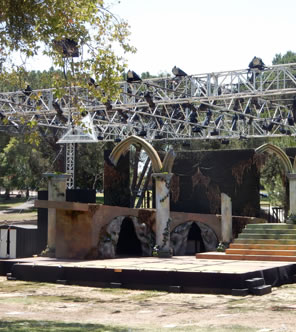
The Kingsmen Shakespeare Festival's stage on the campus of California Lutheran University, set for The Two Noble Kinsmen, includes a cone microphone, the clear-plastic, triangle-shaped device hanging from the front of the lighting rig. Photo by Eric Minton.
With the Kingsmen Shakespeare Festival on the campus of California Lutheran University in Thousand Oaks, California, we encounter an invention that does the job: a cone microphone. Attached to the front center of the lighting rig, the microphone sits inside a triangle-shaped plastic cone. Small speakers are set into the front of the stage, four large speakers are positioned on top of the lighting rig, and a couple of speakers with delays are hung in the sycamore trees up the hill for the general admission audience. “It's pretty amazing,” says Kingsmen Executive Director Timothy Hengst as he is showing me around the company's theater space.
It is pretty amazing. For opening night of The Two Noble Kinsmen, we were sitting in the front row, though that was still some dozen feet from the stage, and we could hear every line clearly, even those spoken at the back of the stage, and yet the acoustics still had a spatial quality. For tonight's performance of the play, we are sitting up the hill in general admission, and it's almost as good, with only a couple of actors difficult to hear (no different than sitting in the balcony of an indoor theater). “There's a few actors not used to outdoor theaters who really need to work on it,” Hengst says. “Our veterans never have any trouble here. They know how to project.”
The drawback to the cone mic is that it's too effective. The company's sound tech, Gary Raymond, who invented the cone microphone, has sold units to a couple of other theaters, but one discontinued using it because it picked up too much backstage ambient noise, Hengst says. Here at Kingsman Park, that background noise includes tiny frogs living in the creek running behind the theater. Powerful lungs those tiny frogs have: They sound like a hundred-member chorus. “We have to have as much masking as we can in the back to keep the frog noise down,” Hengst says. “But the frogs are pretty crazy loud.”
One effective tool for shutting up the frogs is William Shakespeare. Hengst reports that they will go silent at key dramatic lines in plays. On this night, when the Jailor's Daughter (Rachel Seiferth) says, “I am very hungry. Would I could find a fine frog; he would tell me news from all parts o' th' world,” she pauses at the semicolon, and the croaking suddenly and totally ceases. The amphibians apparently heed the danger of a very hungry girl hoping to find a fine frog, but eventually they resume croaking out news from all parts o' th' world.
Nature and civilized ambient noise can contribute magical moments to outdoor theater (church bells tolling for Macbeth, cicadas creating Pericles's music of the spheres, an acorn crashing to the stage at the moment Lysander calls Hermia an acorn), but ambient intrusions are more common. In this year's trek through Shakespeare's canon we've had to deal with planes, trains, automobiles (racing on a highway running past the play space), motorcycles, helicopters, sirens, a woman's argument escalating to catfight levels, cell phones going off, of course, people answering their cell phones, of course, and now these frogs. Sweet Tea Shakespeare in Fayetteville, North Carolina, once had a bicycle race pass its stage in the middle of a performance.
However, of all the tales of ambient noise intrusions I've heard, Hengst has one that tops them all, and it happened during the preview performance of The Two Noble Kinsmen the night before we came here. California Lutheran University has been holding a cheerleader camp this week, and when cheerleaders gather, they just have to cheer no matter where they are and when. Thus, one team of cheerleaders started a loud chant walking into Kingsmen Park during the play, startling the actors, probably stunning the frogs, and sending Hengst sprinting out of his lawn chair and up the hill to do a bit of assertive acoustic masking.
We see cheerleaders on our visit, but we never hear them: They reportedly got a memo the next morning. Maybe a memo to the frogs is in order, one that reminds them what they thought they heard from the Jailor's Daughter: They could be hors d'oeuvres.
Friday, July 6—Winter Wonders, Summer Sun
The experiences I had entering my teen years had less to do with the when of my life than the where: where I got lost in ice fog, where I took great effort to make sure my hair wouldn't break off, where I played softball with other neighborhood kids and without lights from after supper to past dawn before calling it quits around 2 a.m., where my brother was Santa Claus, not merely playing him.

Santa Claus has his list at the Santa Claus House in North Pole, Alaska. Below, the Fairbanks Shakespeare Theatre prepares to perform The Merry Wives of Windsor at Townshend Point. Photos by Eric Minton.
Looking out the Boeing 757 window last night as we flew over Fairbanks, Alaska, I watched us turn to land on one of two parallel runways. The other runway and its not-so-hard stands are comprised totally of water. The oddity I noted in this landscape was seeing four-lane expressways. The last time I was here, the lone four-lane divided highway was not paved down to Eielson Air Force Base where my dad was stationed. That was in 1971; I had just turned 13. We lived up here for 2 1/2 years, through three winters with temperatures reaching minus 67. It's not exactly the North Pole—that's a dozen miles south of here.
William Shakespeare is bringing me back. His only presence in my life back then was my middle brother, John, excitedly talking about seeing a film of Romeo and Juliet at school and catching a glimpse of nudity (this was the Franco Zeffirelli version). This year, Shakespeare is guiding me to the four corners of the continent, and in this corner I'm seeing the Fairbanks Shakespeare Theatre's production of The Merry Wives of Windsor. It turns out Shakespeare is taking me on a journey through my life, too. Last month I visited my birthplace and immediate start of my nomadic life as the son of an Air Force chaplain and, later, as the spouse of an Air Force maintenance officer. In November 1968, we arrived at the fifth station of my existence having left Tucson, Arizona, a week before in 100 degree temperatures and landing in Fairbanks at minus 26, a detail you remember when you experience such a shock to your psyche.
Today the temperature approaches a pleasant 80 degrees. We hit 99 here in the summer of '70—for reference, shorts and bikinis came out when we made it to 60 degrees Fahrenheit after subzero winter days. Jackets were unzipped when we hit 10 degrees Fahrenheit and came off when we got to 20. Landing in Fairbanks last night reaquainted me with one of the peculiar characteristics of this city's latitude: the Midnight Sun. The sun is not actually visible at midnight because we are some hundred miles south of the Arctic Circle, but it dips only slightly below the mountain-lined horizon for less than an hour, and the light is equivalent to 7 p.m. this time of year back in Virginia. It's disorienting to your society-dictated body clock; that's why we used to head out for neighborhood softball games and play until 2 a.m., the light of day never suggesting to us we should be tired. Last night when I checked into my hotel room, I was surprised to note it was already 11:30 p.m.; this morning I woke up thinking I'd missed my 6 o'clock alarm by two hours, but it was yet 30 minutes from sounding.
Merry Wives opens tonight, and my interviews with the director and cast members are not until tomorrow, so I use today to head down memory lane past Santa Clause Lane to Eielson about 20 miles southeast. Memory lane has undergone some rerouting in the 47-year interim. I pull off the now-paved Richardson Highway onto Badger Road. When we moved up here in 1968, before Dad could be assigned a house on base we lived six months in a fourplex log cabin at Six Mile Badger Road. Now, I can't find that house. I get back on the Richardson at North Pole. This is not the North Pole but a town in Alaska with Santa Claus House selling ornaments and fudge. A giant statue of Santa holds his list of nice (or naughty) boys and girls, the same statue I remember, but the house has moved to the south side of the highway. Childrens' letters to Santa at the North Pole would come here, and the Senior Protestant Youth of the Chapel, a chapel-operated teen group, were among the volunteer groups to write replies. My oldest brother, Dean, was in that group (required of chaplains' kids; I was in the Junior PYOC) and took part in answering letters as Santa.
I reach Eielson and see a KC-135 doing low approaches over the flightline, the same type of aircraft that flew here when I was a kid. I lose my orientation when I get to the base's community and housing areas, but the giant power plant (not so giant anymore) guides me to the senior high school that my brothers attended. I drive past what was then Snob Hill, our tag for the loop of houses where the highest ranking officers lived, but is now housing for lower-ranked individuals. I find where my elementary school used to be. Only the front drive remains. My junior high school also has vanished, now just an empty field. I do find the housing unit we lived in; I remember it as a sixplex row house, but now it has only four units but is still recognizable.
Alaska summers were idyllic. We picked wild blueberries in the surrounding woods and admired vivid, full-arc rainbows after storms. Moose were a common sight, even in our yard. Our favorite playground was the "gravel pit," a lake formed during construction of the base. It is now called Moose Lake—apt because we'd sometimes see moose hanging out there. We rode our bikes on the paths around the circumference of the lake, and on one such two-wheeling trek we came upon a cache of Playboy and Penthouse. A glorious new world opened up to me that day—not that it changed my behavior. I had a girlfriend in the seventh grade—at least, in my perspective she was my girlfriend—but not only did I never touch her (not even hands), she hooked up with another guy before I could express my feelings. If she did actually like me, she grew impatient with my months of procrastination. The site of that forest of forbidden pleasures behind the gravel pit is now base housing including—I have to smile—the current Snob Hill with bigger houses than before.
The base chapel where Dad worked and preached is gone, replaced by something that looks like a performing arts center. I have trouble identifying it with no sign or iconic symbol (military chapels are ecumenical), especially as the marquee out front is flashing notices of "Karaoke Night" and "Hip Hop Night" and "UFC Fight Night." Apparently, that refers to the Yukon Club sharing the parking lot with the chapel, which is, indeed, the performing arts center structure I'm looking at. The base gym is still the same, with its indoor swimming pool. We'd go swimming year-round, even when it was minus 50 outside. We'd cover ourselves in layers of clothing leaving only our eyeballs exposed, walk the dozen blocks to the pool, uncase ourselves to swim trunks, and dive into tepid water. Afterward, we made sure we dried our hair thoroughly. Even slightly damp hair would freeze in an instant. That and don't lick metal were the first two warnings you received upon arriving in Alaska in wintertime. The worst aspect of the winter was the ice fog, car exhaust freezing in tiny crystals creating a fog that thickens as the temperature falls. It got bad at minus 30, and at that temperature and below we had to eat at school instead of walk home for lunch. At minus 60 you could not see five feet in front of you. One of the most frightening moments of my life was getting lost on an open field between the school and our home on base, though it was a five-minute walk between the two. Cars have to be plugged in during the winter: parking lots have what look like hitching posts with outlets. And, of course, you only have two hours of dim daylight.
These winters do have their singular treasures, however. On clear nights you'd get the aurora borealis. One night a couple weeks before Christmas, I took a walk to my junior high school and heard a choir singing. A rehearsal at the chapel, I thought, though I was yet several blocks away and couldn't understand why they'd be practicing with the doors open at minus 20. Then I realized the singing was coming from above, and I looked up to see the most vivid curtain of shimmering colors I've ever seen creating an audible hum. Talk about a heavenly host.
 I drive back up to Fairbanks and pass through downtown recognizing certain landmarks. As much as the landscape of my memory has changed, the multisensory essence of Fairbanks and its environs has not. Because it is built to persevere in the winters and manage its geographical isolation, it's still a dingy looking town; blue tarp is integral to the community's look. The tallest structures are still the cedars and spruces. I point my rental car to the University of Alaska–Fairbanks campus, navigating a dirt road to get to a parking lot. I walk past a meadow and turn down a path through cloud-capped trees toward what looks like a pioneer stockade with a gatehouse in front and a canvass tent to one side.
I drive back up to Fairbanks and pass through downtown recognizing certain landmarks. As much as the landscape of my memory has changed, the multisensory essence of Fairbanks and its environs has not. Because it is built to persevere in the winters and manage its geographical isolation, it's still a dingy looking town; blue tarp is integral to the community's look. The tallest structures are still the cedars and spruces. I point my rental car to the University of Alaska–Fairbanks campus, navigating a dirt road to get to a parking lot. I walk past a meadow and turn down a path through cloud-capped trees toward what looks like a pioneer stockade with a gatehouse in front and a canvass tent to one side.
This is Townshend Point that serves as the home of Fairbanks Shakespeare Theatre. It looks "so Fairbanks." Locals use this term to explain away situations and personalities in this city of hardy, independent-minded folk who nevertheless have a great sense of tolerance and willingness to help anyone of any ilk who shows initiative and effort. I pick up my ticket for The Merry Wives of Windsor and will soon experience under the Midnight Sun how Shakespeare can be "so Fairbanks."
The Merry Wives of Windsor, Fairbanks Shakespeare Theatre
Jack Townshend Point, Fairbanks, Alaska, July 7
Bruce Rogers, with his black hair hanging to his neck, weather-carved face, and an ever-present distracted expression behind which resides theatrical genius, looks like he could have been an Alaskan gold-panner during the 1899 gold rush. Rogers is from Wisconsin. Wanderlust early in his life brought him up the Alcan Highway to Fairbanks. He has skills as a housepainter, a carpenter, and an actor, and he has a deep love for William Shakespeare.
“We'd sit around in the winter when we couldn't do anything: ‘God, we ought to start a theater,'” he says. Rogers recalls visiting Director Sean Ryan Kelly at the Colorado Shakespeare Festival and inviting him to come to Fairbanks. “All of a sudden, we put it on the calendar. I came back up and said, ‘Yeah, we're doing it. Here's the dates.' That's how you start a theater: you give it a date.” That was 1992. We are sitting at a picnic table under the shade of towering pines outside the Townshend Point theater where Rogers' company, Fairbanks Shakespeare Theatre, will be performing The Merry Wives of Windsor tonight. The gleam in Rogers' eyes as he recounts his life and that of the theater he founded and still runs as artistic director is evidence of not just his adventurous spirit but what he instilled in the culture of his company, a wherewithal attitude that has kept Fairbanks Shakespeare Theatre alive through financial whitewater and personnel upheavals.
Fairbanks, a city of about 32,000 people in Alaska's heartland, is full of culture, from classical orchestras to rock and roll bands, from performance arts to visual arts, from summer crafts festivals to winter ice-sculpting festivals. “It's a conservative town, but there are a lot of arts that go on around here,” says Tom Robenolt, longtime company member who went on to Perseverance Theatre in Juneau and was called in two weeks before rehearsal to take over as director for The Merry Wives of Windsor. “When I went in teaching at the schools, I couldn't believe the talent of the kids. I think that has a lot to do with winter. They're going to go out and ski or read a book or do something that keeps you busy when its 40 to 50 degrees below.”
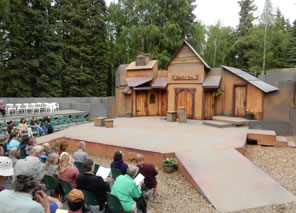

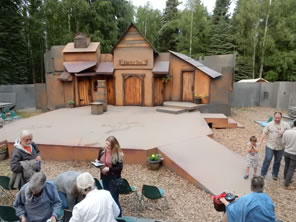
Townshend Point set up for Fairbanks Shakespeare Theatre's production of William Shakespeare's The Merry Wives of Windsor before the play's 7:30 p.m. start (top), during intermission about 9 p.m. (middle), and at the play's conclusion at 10:10 p.m. (bottom). Photos (all untouched) by Eric Minton.
The company has moved from location to location over the years and currently occupies Townshend Point on the University of Alaska–Fairbanks campus. The outdoor 200-seat theater sitting inside a stockade-like wall has a deep-thrust stage and, for this production, a wood street facade at the back. This Merry Wives originally was to be set in the Old West, but Robenolt switched to an Elizabethan setting because he feels that the only play Shakespeare set in his own time and place works best when staged in that manner. The walled, open O makes for good acoustics while letting in the universal lighting of a Fairbanks evening. From play's start at 7:30 p.m. to the curtain calls after 10 p.m., the sun is still up. One drawback to this outdoor setting are the creatures of the sky: prop-driven bush planes flying overhead (even when flying 5,000 feet up they are louder than jets) and the "Alaskan state bird," mosquitos larger than humming birds (that's not hyperbole), though it's the small, tiger-striped skeeters that leave you in bloodless, itching agony.
The soul of the company resides on the outskirts of town in what are now fallow fields that Rogers owns. This used to be the site of Shakespeare Camp, where guest artists would stay in tents or trailers, gather around campfires after rehearsals and shows, and talk Shakespeare into the morning. Such singularity drew the English director Graham Watts, who accepted Rogers' invitation to direct Love's Labour's Lost in 2001and returned to helm eight more shows. It was during this period and in part through his work at Fairbanks that Watts wrote his book, Shakespeare's Authentic Performance Texts: The Case for Staging from the First Folio. For Rogers, the language has always been the foundation for his Shakespeare direction and his acting, and under his and Watts's influence, the current generation of Fairbanks Shakespeare directors and actors adhere to these principles, obvious in The Merry Wives of Windsor.
The cast of 23 covers a wide spectrum of ages and skills. Robenolt overrides the unevenness of talent by going broad with the characters, embracing the farcical nature of the play. Yet, with the text as the lone source for these performances, not only do the overblown portrayals play true, the jokes land with a large measure of laughter in the audience. Textual fealty in these performances also unearths obvious discoveries. As Susie Duecker's Mistress Page reads her love letter from Falstaff for the first time—excitedly intrigued, as she doesn't yet know who wrote it—she has to pause and squint closely to read her name within the missive. The clue to this delivery comes later in the text when she is comparing her letter to an identical one received by Mistress Ford. “I warrant he hath a thousand of these letters, writ with blank space for different names,” she says. Rogers plays Ford, giving a soaring performance of jealous rage, yet when disguised as Brook on his second visit to Falstaff, he manages a brilliant yin-yang moment. As Rogers' Ford tries to contain his anger at Falstaff escaping him right under his nose after the fat knight's initial tryst with Mistress Ford, he also tries to contain his glee as Falstaff describes being carried “in grease, like a Dutch dish, to be thrown into the Thames.” Ford, for all his blind jealousy and mistrust of his wife, unconsciously appreciates her treatment of Falstaff.
Fairbanks Shakespeare Theatre veteran Andrew Cassel plays Falstaff, and he makes the fat knight bombastic in movement as well as voice—at one point posing with tankard raised like a Falstaff Beer advertisement. Despite this over-the-top presentation, Cassel's command of the verse is succinctly sharp and his comic timing sublime, a Falstaffian star turn as good as I've seen anywhere (this is my 12th stage production of this play). When, earlier in the day at my hotel lobby, we discuss one of Shakespeare's most famous creations, Cassel doesn't give a fig that critics consider the Merry Wives version of Falstaff a lesser creation than the character of the Henry IV plays. “You've got to treat the characters for the stories they're in,” he says. Trying to create a single arc for Falstaff through the three plays—the order of which we can't be certain for both composition and plot sequence—would be a disservice to the play, he says. “With this play particularly you've got to let those [Henry IV Falstaffs] go and let the story be what it is."
A significant exception to the broad performances and embraced slapstick of this production is Annabel Heyne as Mistress Ford giving a surprisingly serious presentation of an abused spouse—surprising until you dissect the lines Shakespeare has given the Fords. It seems out of place in this hijinks comedy, but probably because I've seen no other director with the courage to tackle head-on the bullying and threats Ford displays toward his wife. Robenolt takes to heart Mistress Ford's reply to Mistress Page's comment about Master Page's lack of jealousy, “You are the happier woman.” Heyne, just 18 years old, is a 10-year veteran with the company and currently a member of the board. After debuting at 8 as Mustardseed in A Midsummer Night's Dream, she was cast the next year as Prince Escalus in Romeo and Juliet, turning Verona's ruler into a 9-year-old prince. Such was the faith Rogers and company had in her talent, “Which was cool," she says. "I actually had a character and I actually had an objective and relationship with other characters, and I care about the plot. I would watch Romeo and Juliet die every night and I would cry every night. That's when I was like, OK, I love this, this is what I want to keep doing.” She's since played in Fairbanks Shakespeare Theatre's youth productions as well as main stage roles, from Dauphin in King John to Lavinia in Titus Andronicus. Last year she was Puck in a University of Alaska–Fairbanks production of Dream and says one man described her as Captain Jack Sparrow meets Shakespeare. Having already played a lead role in a college production, she's finally heading for college herself, Occidental College in Los Angeles this fall.
Now she's tackling Mistress Ford as a dramady role. “It's totally an abusive relationship. That's really hard to ignore in the script," she says, now occupying the picnic table interview seat. "As appealing as it is to ignore it, and as much as I wanted to at the beginning, it's there, it's in the text. It makes the payoff so much more valuable when he says, ‘I'll never mistrust my wife again.' And it makes my character dynamic. Starting with her being so scared of Ford and so unwilling to upset him allows for great change and great relief in her character and in their relationship. By the middle of it, she's openly defying him, and by the end of it, he admits that she's outsmarted him. I think that's so much more fun for the audience to see.”
To read the review of this production, click here.
Henry VI, Part One, Utah Shakespeare Festival
Engelstad Shakespeare Theatre, Cedar City, Utah, July 10
A few weeks ago, I had a watershed Shakespeareances. While visiting Sweet Tea Shakespeare in Fayetteville, North Carolina, to see Pericles for the Shakespeare Canon Project, I took in its repertory counterpart, The Tempest. I watched, I enjoyed, I ran it back through my head as I drove to my hotel, I slept. The next morning, I prepared to transcribe my notes when it hit me: Every role was played by a woman (none regendered) except the three goddesses in Prospero's pageant who were played by men as drag queens. For years I've been advocating for gender-neutral casting in Shakespeare no matter the role, but this was the first time the fact of it totally washed over me. I had proven my point by my in-the-moment obliviousness.
Now, Utah Shakespeare Festival ups the ante. In the Henry Woronicz–helmed production of William Shakespeare's Henry VI, Part One, the Duke of Bedford is a duchess and Sir Lucy is a lady (both played by Lisa Wolpe) on the English side, the Duke of Alençon is a duchess (Tarah Flanagan) on the French side. Both armies include other women, too. I don't care about these roles being women, per se, though this regendering, coupled with Wolpe playing Shylock (as a man) in The Merchant of Venice this season, has generated consternation and downright hostility among audiences here. Such casting choices are nothing new at other theaters and down through history, but the degree to which the Utah Shakespeare Festival has embraced gender-neutral casting this season has heightened the debate, given the generally conservative regional market from which the Cedar City–based festival draws the bulk of its audience. Nor is criticism merely based in chauvinism; it also arises out of a sense of realism and tradition. In one public discussion, a woman complained that when she comes to see a history play, she wants to see history, and she thought it absurd that a slight woman like Flanagan could play a warrior. I wanted to take the microphone and say, “Lady, you've not met my wife, a retired colonel.”

This publicity photo of Tracie Lane as Joan of Arc from Henry VI, Part One, graced the cover of this season's Utah Shakespeare Festival souvenir program. Below, Lane as Joan fights with Talbot (Geoffrey Kent) in their first encounter in the play. Photos by Karl Hugh, Utah Shakespeare Festival.
Still, even I cringed when Tyler Morgan, the festival's director of marketing and communications, told me about the regendering. My objection stemmed from thematic reasoning. Central to the plot is the fact that Joan la Pucelle (Joan of Arc) is a woman who out-combats the men, French and English alike, in both strategy and skills. I thought that populating the battlefield and war councils with other women would undermine this aspect of the play. I hear while here that cast members expressed their own concerns when the play was in rehearsal. This Henry VI, Part One, is set historically, with incredibly ornate costumes by Lauren T. Roark on a set designed by Apollo Mark Weaver featuring large wood crates and slats that the soldiers use to climb up to the balcony to represent scaling the walls of Orleans, et al. Just as Shakespeare used Tudor context to tell his pseudo-historical story, Woronicz uses modern sensibilities in staging this first installment in Shakespeare's War of the Roses tetralogy. Hence, Woronicz regenders roles, turns Exeter into the Duchess of Gloucester (who doesn't show up in Shakespeare's chronicles until Part Two), and uses tableaux of juxtapositions that press moral questions about war, about political factionism, and about mysticism.
Ah, mysticism: Joan of Arc. Tracie Lane is a spiritually luminous Joan, her face seeming to be in a perpetual heavenly glow such as Renaissance painters gave Jesus, Mary, and the saints. When Joan preaches her sermons on France's liberation from England, Lane delivers her lines with stirring spiritual fervor. One of Woronicz's most significant textual alterations is removing the demons when Joan calls on the devil to assist her late in the play; Lane instead plays the moment as a spiritual crisis as Joan begins to buy into her own mythology and loses her grip on her true origins. Before this scene, however, Lane is one bad-ass Joan, wielding sword, shield, and fists and riding into one battle inside one of the crates whirling across the stage. She not only gets her share of exit applause, she gets entrance applause when an English soldier sneaks up behind Joan and, without looking, she backhands her shield into his face. This particular stunt Fight Director Geoffrey Kent, who plays the English general, Talbot, later tells me he stole from Steve Martin's Roxanne. For Henry VI–One, Kent choreographs more than a dozen multiplayer battles (with swords, battle axes, a mace, and shields) plus several one-on-one fights with weapons, fists, and knees. My first impression is that of a Marvel action movie with Joan and Talbot as the superheroes. The Fast and The Furious is an apt comparison, too, for all the action sequences and fights.
Kent along with Lane and Josh Innerst, whom I saw as Hamlet in the brilliant American Shakespeare Center production at the Blackfriars Playhouse in January and is playing the earls of Salisbury and Sufolk here in Henry VI–One, are discussing the play and production with me over two large pizzas at Centro Woodfired Pizzeria across the street from the Utah Shakespeare Festival's three-theater complex. Lane achieves a 3D rendering of Joan (make that 4D with her gospel glow) because, she says, she feels that Shakespeare admired the woman even though he was constrained to depict the future saint according to English propaganda dictates. Kent also moves above and beyond his cartoon superhero character of Talbot, especially in the scenes with his son, John (Austin Glen Jacobs in a star turn). The two actors effectively deploy Shakespeare's rhyming couplets to raise their three scenes together—before the battle, during the battle, and at the end of the battle when, pietà-like, the dying Talbot cradles his dead son—to a level of emotional resonance as effective as any scene Shakespeare wrote.
The play's leads may be Joan and Talbot, but the centerpiece performance is that of Jim Poulos as King Henry. Granted, he is the title character, but he doesn't show up until Act III, and when he does he comes in late, sneaking up behind his throne as he listens to his nobles sniping at each other. Though historically Henry was a child, Shakespeare doesn't set a specific age for his depiction. I talk with Poulos in the festival's courtyard today before seeing the play, and he tells me he pinned his portrayal to Henry's behavior in two scenes. When he meets Talbot for the first time, he behaves as a fan boy meeting his movie or sports idol. When Suffolk describes Margaret, Henry gets so aroused—perhaps for the first time in his life—that he makes a rash decision. Poulos, who is 45, thus settles on Henry at around 17 and perfectly captures that age in his performance of a young man who knows how to command—and does at times—and has perceptive social vision, but, with zero political astuteness, he is uncomfortable with the more experienced nobles.
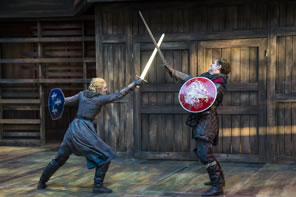 Upon watching the production, I realize my concern about so much regendering was shortsighted. Woronicz's regendering choices reveal a latent but no less potent form of sexism that exists in our society, including in our modern military. In this Henry VI filled with women warriors, Joan still can be singled out for her gender, not because she is a woman but because she's the most skilled fighter in the war. In the wake of the U.S. Armed Forces officially opening combat duty to women a few years ago (though American servicewomen have been dying in combat since Vietnam, due to the asymmetrical nature of modern warfare), two women successfully graduated from the Army's difficult U.S. Army Ranger School in 2015. Immediately, rumors began circulating that the standards had been lowered for them. I was working with the Army at the time and heard a male officer express that opinion even in the presence of several female officers. How so very like the English attitude toward Joan in this play who chalk up her combat skills to witchcraft. In a similar, nonmilitary example, a pilot safely and incredibly landed a crippled airliner a couple of months ago. Once the identity of Tammi Jo Shults was released to the press, she attained the label of "female pilot." Chesley "Sully" Sullenberger, who successfully ditched his airliner in the Hudson River in 2009, has never been labeled a "male pilot." How so very like the French court. In Henry VI's time, in Shakespeare's time, in our time, women can be warriors—they just aren't allowed to be the best warriors, even when they are.
Upon watching the production, I realize my concern about so much regendering was shortsighted. Woronicz's regendering choices reveal a latent but no less potent form of sexism that exists in our society, including in our modern military. In this Henry VI filled with women warriors, Joan still can be singled out for her gender, not because she is a woman but because she's the most skilled fighter in the war. In the wake of the U.S. Armed Forces officially opening combat duty to women a few years ago (though American servicewomen have been dying in combat since Vietnam, due to the asymmetrical nature of modern warfare), two women successfully graduated from the Army's difficult U.S. Army Ranger School in 2015. Immediately, rumors began circulating that the standards had been lowered for them. I was working with the Army at the time and heard a male officer express that opinion even in the presence of several female officers. How so very like the English attitude toward Joan in this play who chalk up her combat skills to witchcraft. In a similar, nonmilitary example, a pilot safely and incredibly landed a crippled airliner a couple of months ago. Once the identity of Tammi Jo Shults was released to the press, she attained the label of "female pilot." Chesley "Sully" Sullenberger, who successfully ditched his airliner in the Hudson River in 2009, has never been labeled a "male pilot." How so very like the French court. In Henry VI's time, in Shakespeare's time, in our time, women can be warriors—they just aren't allowed to be the best warriors, even when they are.
When Joan tells the Dauphin, "My courage try by combat, if thou darest, and thou shalt find that I exceed my sex," Lane says she knows exactly what Joan is really referring to. Lane has to out-bad-ass her male counterparts to break through lingering artificial barriers of gendercentric casting in her own profession.
Thursday, July 12—Heart Is Where the Home Is
We click. We're two strangers sitting next to each other yesterday in the Balcony Bards Seminar Grove, a canvas-covered venue in the middle of the Utah Shakespeare Festival's campus, attending a public discussion on the previous day's performances. The 15 benches of varying length are packed (about 200 people) as Kathryn M. Moncrief begins the 9 a.m. session. After providing a brief background on one of the plays, Moncrief turns the microphones over to the audience. Mingled among great comments and observations are those decrying cross-gendered and regendered casting. One guy asks why Shakespeare gives Othello an epileptic fit when he was such a strong captain of the army. That gets me muttering a chant of "Caesar! Caesar!" The woman next to me has been making under-her-breath remarks, too, and as we start whispered riffing with each other, I realize I'm in the company of deeper Shakespearean knowledge than mine.

Kimberly Dickstein, left, with Finger Puppet Shakespeare (who travels with her everywhere) poses with Michael Bahr, Utah Shakespeare Festival's Education Director. Photo courtesy of Kimberly Dickstein.
Kimberly Dickstein is attending Utah Shakespeare Festival's Teaching Shakespeare Workshop, a four-day program for English language arts educators. We agree to meet for an interview at breakfast this morning before I leave Utah to head home. Our conversation caps a lovely, two-theater, Canon Project trip (except that Sarah is not with me), thanks especially to the fellowship I share with Shakespearean actors, directors, theater managers, and junkies like Dickstein. She is an English teacher at Haddonfield, New Jersey, High School, and for the past six years has been teaching an elective Shakespeare course. "I have designed it page-to-stage, which means we study what is on stage in the Greater Philadelphia region," she says. Her summer assignment for her students was to read Troilus and Cressida, a prelude to the students seeing the play this fall, staged by Revolution Shakespeare in Philadelphia, and performing staged readings with that theater company's members.
She experienced the "spark" that turned her onto Shakespeare while attending Rutgers University. It came in an Emily Bartels–taught class on Jamestown, an interdisciplinary course combining English, history, art history, and anthropology. The Tempest, which Shakespeare based in part on the account of a Jamestown-bound supply ship that wrecked on Bermuda during a hurricane, was part of the curriculum. “It was my first exposure to Shakespeare where I didn't feel like I was reading, I didn't feel like I was in a classroom,” Dickstein says. “I felt like I was experiencing and living and doing and feeling as a human being.” In staging the play for class, Bartels assigned Dickstein to play Caliban. Dickstein was terrified about performing in front of 150 students in a large lecture hall, but the professor's only direction was that she should enter at the top of the room and come down the steep steps. This required volume in delivering her lines, and through that vocal effort emerged Caliban's strength, Dickstein says. "It's the first time I ever felt like the other. I am Jewish, so I understand other, but I can hide in my skin color. I consider myself an empathetic person, but I identify that as a moment of empathy that I hadn't felt before. That was cool, and Emily Bartels got me there.”
Dickstein has taken advantage of as many Shakespeare education programs as she can: Folger Shakespeare Library's Teaching Shakespeare Institute, Oregon Shakespeare Festival's Teaching Shakespeare Workshop, and a summer studying Shakespeare at Exeter College at Oxford. “When I come to these conferences, it's not necessarily that I'm looking for anything new, because I use a lot of these activities at present anyway,” she says. “What I am looking for is new understandings of those activities and practices and teaching methods, because it is different when you go to Oregon, Utah, D.C. The people bring a different energy and understanding and objective. I want my students to feel something as a result of my teaching practices so that we learn together, and programs like this sharpen my skill set.”
She's combining her trip out West with another of her loves, hiking—Bryce Canyon and Zion National Parks neighbor Cedar City— but she was most attracted by the Utah Shakespeare program's agenda, clearly spelled out online. Her colleagues back East wondered how she knew about Utah Shakespeare. “How do you not know about Utah Shakespeare?” she says, though in a class of 20 teachers, most from Utah, she's the only Easterner. “It's been fantastic,” she says. “Shawnda Moss, the woman leading it, is a fierce beacon of light for teaching Shakespeare. She has a real investment in empowering teachers to empower students, and you can feel that. And it's not just Shakespeare. I think if you looked at it as just Shakespeare, you're missing something, because this content reaches all content.” That's just so Shakespeare.
My Fairbanks Shakespeare Theatre–Utah Shakespeare Festival sojourn was a return to two former homes. My dad was stationed at Eielson Air Force Base outside Fairbanks when I was 10–13 years old, and Sarah was stationed at Hill Air Force Base outside Ogden, Utah, when I was 48–50 years old. I flew from Fairbanks to Salt Lake City on Sunday and drove to Utah Shakespeare Festival on the campus of Southern Utah University in Cedar City on Monday morning, a four-hour drive through the Utah desert along the Wasatch Mountain Range. This is one of the most dramatically beautiful places on earth. Pete Townshend of The Who said about flying into Salt Lake City, “It's extraordinary. You know you live on a planet.” When we lived here, my home office had a window to the mountains, and I was more distracted by that view than that of my office perched above a condominium swimming pool in Virginia. Utah mountains combine cliff faces and shrub-tree slopes to create variations of craggy red, white, and green depending on how the sun hits and the clouds cross, a landscape of infinite variety in a single hour.
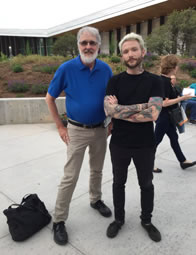
A "coupla nerds," Mac MacDaniel (right) and I, meet in Utah. Photo courtesy of Mac MacDaniel.
I reached Cedar City a half hour before the start of a matinee performance of Othello. Yes, this is Monday (the theaters are dark here on Sundays). I witness a stellar production featuring Betsy Mugavero as Desdemona. I met her in Mesa, Arizona, where she and her husband, Quinn Mattfeld, are the artistic directors for the Southwest Shakespeare Company. That evening I take in a women's suffrage era–set Merry Wives of Windsor with the longest choreographed curtain call I've ever seen other than Marcel Marceau. After Henry VI, Part One, on Tuesday evening, I see The Merchant of Venice on Wednesday featuring Lisa Wolpe as Shylock, a performance that had me stunned 10 seconds in and near tears at its end. Wolpe was sitting next to me at Othello, so I was able to have a brief chat with her. Afterward, I discovered through Twitter that Mac MacDaniel was in town. He's doing his own cross-country Shakespearean journey. Originally it was supposed to be by bike, but illness forced him to switch to car travel, and he's expanded the number of festivals he's hitting. We meet up for a chat before Merry Wives.
Knowing that Mugavero was going to be in the company this season (she also plays Nerissa in Merchant), we had already planned to get together on this visit. I meet her, Quinn, and their 18-month-old son at the Grind Coffee House on Main Street. Their son travels in a covered red Radio Flyer wagon—there's a life. Meantime, my interviews with members of the Henry cast become social events in themselves. The same thing happened in Fairbanks, where I began feeling like part of the company. Chris George, a member of the board, knowing I would be doing interviews at the theater for most of the afternoon, insisted on bringing me dinner, "the best Thai food in Fairbanks"—and well beyond Fairbanks, too, I must say. That night, on the eve of my departure for Utah, I attended for the second time that company's performance of The Merry Wives of Windsor. As the players finished their curtain call, Andrew Cassel, who plays Falstaff, turned toward me sitting to the left of the thrust stage and waved farewell.
It'll be good to get home tonight, but I really feel like I've been home everywhere I go this year.
Sunday, July 15—Mid-Season Break: For Sarah
The omens keep lining up in the face of deepening obstacles.
How fitting that I take a break from the Canon Project at its midpoint—21 plays and theaters done, 21 plays and theaters to do—to enjoy the Major League Baseball All-Star Game, the traditional halfway point of the season (which is why we fans of the sub-.500 Washington Nationals are fretting; their season seems to be slipping away from them).

Sarah and I, along with Burlington, a teddy bear that attends every Nationals game with us, stand in front of the world's largest baseball at the All-Star Fan Fest.
This break is all about Sarah even as all about Sarah becomes increasingly worrisome. It's not really a break, either, because I'll be at the Folger all day tomorrow for Taffety Punk's Bootleg Shakespeare production of Henry VI, Part Three and missing the Home Run Derby. Sarah has decided to join me for the play rather than attend the Derby. We like these annual Bootleg Shakespeare events so much we both would have attended, anyway, even without its place in the Canon Project as the only production of Part Three that I know is playing in North America this year. Besides, the production does have thematic association with the All-Star festivities as Bootleg Shakespeare is something of an all-star event for Capitol Region Shakespearean actors.
We're still kind of on the road. Friday we checked into the Hampton Inn Navy Yard across from Nationals Park, where we stayed for Opening Day and the staff treated Sarah so kindly when she was suffering in the initial stages of her neurological issues. The All-Star Game on Tuesday is just one event of many activities to take in over these four days: the All-Star Fanfest at the convention center, the “Play Ball Park” set up in the empty lot below our hotel window, today's Futures All-Star Game followed by the Legends & Celebrity Softball Game, and tomorrow's workout and Home Run Derby, which we'll be missing. This weekend has been three years in the works for us. We each make a big, unfettered wish on Christmas Day, and Sarah's in 2014 was to attend the Major League All-Star Game, which was scheduled for Cincinnati the following summer. As we started booking the trip and figuring out how to score tickets, baseball assigned the 2018 game to the Washington Nationals. We switched strategies, investing in Nationals' half-season tickets to guarantee tickets for the All-Star Game. As soon as the date was announced last September, I booked our hotel room.
Sarah's health, however, so far has intervened in every one of our big passion plans for this year. As covered earlier in this journal, her seizures (as currently diagnosed) began occurring on the eve of Opening Day, and we had to cut short that four-day break to get her in to her doctor and expedite treatment. The nadir came during a Canon Project West Coast swing that we were combining with a wedding anniversary splurge at a resort in San Diego while visiting The Old Globe for The Tempest.
On the eve of the trip, Sarah thought she had been fired from her job. She has only been able to work sporadically, and as a contractor paid hourly, that has made a significant dent in our income (exacerbating the increasing financial load of the Canon Project adjusted so that I can cater to her condition). Her employer is going through a reorganization that has left her out of the loop, and, combining Sarah's current cognitive limitations and poor communication from her supervisors, her understanding at one meeting was that she had been dismissed outright. When I picked her up, I was surprised to find her surrounded by bags of her cubicle decor.
The first portion of the trip, Sarah had minor spells, but when we got to the resort of our anniversary splurge, she was hit with three sequential seizures that laid her out for almost the entire time and left her groggy otherwise. Perhaps more than the anniversary, she was looking forward to meeting up with our old friend René Thornton Jr., a favorite actor of ours at the American Shakespeare Center in Staunton, Virginia, now living in San Diego and playing in The Tempest. As we were heading out for the lunch date, Sarah made it to our hotel room door, paused, leaned her head against the door jam, and then said, “You'll have to give René my regrets.” Worst part of it: A Thornton hug is a healing thing, and I most wanted Sarah to get one.
On our anniversary itself, she was feeling fine at breakfast, so we rented a poolside cabana for the day. She got sick while changing into a swimsuit, and I spent the day alone at the cabana. I occasionally went back to the room to check on her, lugging my office case back and forth each time. I kept hoping she would show up, but she missed lunch, she missed the snacks, she missed everything, and I was missing her. That's when I finally exploded—even as she was starting her recovery mode and took the brunt of my curse-laced screaming tantrum. I knew even then how unfair that was, and that added an intense sense of guilt to my deepening worry and increasing frustration: worry about her continuing medical situation, the accompanying uncertainty about her job, the subsequent realization that we are heading for financial struggles; frustration that she's not getting better, that writing has become increasingly laborious for me with the stress, that we have wasted the funds and time we assigned to this anniversary getaway. And now the guilt, knowing that an apology, however sincere (and it was), would come up too short for making her hurt emotionally as much as she already was hurting physically and psychologically from being so sick. Plus, how much more stress was I laying on her? (Sarah, however, is one of the most stress-free individuals I've ever met, living in a Zen space even in her various health and career crises).
As much as we were investing for our anniversary in San Diego, the Canon Project trip Sarah most wanted to make was to Fairbanks, where her parents met, and then to Utah to visit with more old friends. Her need to clarify her employment status meant she had to cancel (more tickets wasted, more disappointment for her). When I got home Thursday night, she was coming out of another sequence of seizures. Or, perhaps it was food poisoning: She's still not fully adjusting to her new cognitive condition, and I wasn't around to manage her meals for her, so she ate some old meat and mushrooms. Now added to the checklist of things to do between Canon Project trips, along with budget, laundry, and doctors' appointments, is fix soups and stews to package and freeze for her. Her neurologist has ordered a 48-hour EEG test, and I've rescheduled one of my trips to accommodate that—driving her to and from the doctor's office so she can have the device installed and then removed—but I'll still be absent during the testing itself. Shouldn't I just cancel this whole project? She insists I should not. Indeed, we're highly leveraged financially in it now, and we're halfway through.
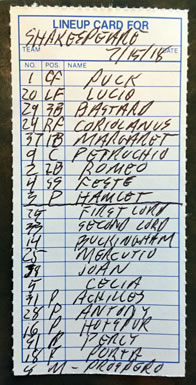 Sarah has had two good days, and she enjoyed Fanfest yesterday. We're going back this morning to get customized All-Star jerseys, and then we have this evening's games. That's the plan. Meantime, I'm recklessly spoiling her: dinners at our favorite downtown restaurants, much memorabilia shopping, and giving her total command (as soon as she says “let's go” I'll stop writing this; she's putting her shoes on, now). Given the potentially dire financial situation we might land in down the road, I pointed out to her yesterday that we are either stupid, oblivious, or imbued with a lot of faith. “Or all three at the same time,” she replied. We're taking these days one at a time, giving them our full focus, and not giving up on our passions and on her wish to attend a Major League All-Star Game. I'll return to frugality on Wednesday.
Sarah has had two good days, and she enjoyed Fanfest yesterday. We're going back this morning to get customized All-Star jerseys, and then we have this evening's games. That's the plan. Meantime, I'm recklessly spoiling her: dinners at our favorite downtown restaurants, much memorabilia shopping, and giving her total command (as soon as she says “let's go” I'll stop writing this; she's putting her shoes on, now). Given the potentially dire financial situation we might land in down the road, I pointed out to her yesterday that we are either stupid, oblivious, or imbued with a lot of faith. “Or all three at the same time,” she replied. We're taking these days one at a time, giving them our full focus, and not giving up on our passions and on her wish to attend a Major League All-Star Game. I'll return to frugality on Wednesday.
Heck, it might rain on Tuesday, too, so we'd miss out on seeing the game anyway. And whether that or a seizure intervenes, I'll book a hotel for the All-Star Game in Cleveland next July and deliver her big wish.
She just told me, “I'm ready when you are.”
Shakespeare's All-Star Lineup
To celebrate the Major League Baseball All-Star Game during this the year of the Shakespeare Canon Project, I'm resurrecting a commentary I posted a couple of years ago in which I drafted an all-star baseball team of characters from Shakespeare plays. Thanks to my scouting a character at Utah Shakespeare Festival last week, I've traded for Joan of Arc to be a key bench player. To read the full article, click here.
Henry VI, Part Three, Taffety Punk Theatre Company
Folger Theatre, Washington, D.C., July 16
What to wear. Though we're in the middle of Major League Baseball's All-Star Game festivities and staying at the Hampton Inn across the street from Nationals Park where the game itself will be played tomorrow night, I'm spending today at the Folger Shakespeare Library. Taffety Punk Theatre Company is staging William Shakespeare's Henry VI, Part Three, at the Folger Theatre. I have no choice but to go today. The company is putting the production together in one day for one night only—this day and tonight. No Home Run Derby for me tonight.

Taffety Punk Bootleg Shakespeare promo shot for Henry VI, Part Three, features Esther Williamson (left), who has played Henry VI in all three parts, and Tonya Beckman as Queen Margaret. Photo by Teresa Castracane, Taffety Punk Theatre Company. Below, the Folger Shakespeare Library sits about a block from the U.S. Capitol in Washington, D.C. Photo by Eric Minton.
I bought a polo shirt with an All-Star Game logo at FanFest this weekend, but wearing that seems more a badge of what I'm sacrificing than what I'm celebrating by interrupting my All-Star break for a Shakespeare Canon Project outing. So, I stick with the shirt I packed for today, a silver-gray polo shirt with the logo of a gold “C” sweeping around a silver knight's helmet: the Charlotte Knights, a Minor League team in Charlotte, North Carolina, that my parents were involved with. That shirt metaphorically combines baseball with Shakespeare's history chronicle and my personal history.
Even in the Shakespearean realm, it's an all-star day. I'll be seeing some of the Capital Region's best Shakespearean actors from a variety of companies, some meeting for the first time. The event is called Bootleg Shakespeare, which Taffety Punk first did on a dare 12 years ago. It's become one of the important dates on the annual D.C. theater calendar for actors invited to take part (working only for a share of money collected in buckets after the show) and for audiences who line up hours before doors open to snatch one of the free tickets to the 260-seat theater. I've seen four Bootleg Shakespeare productions, including the first two parts of Henry VI the past two years. They are as purely text-centric as Shakespeare staging gets, bordering on improv, yet they are such well-woven, thematically cohesive ensemble pieces that I've had trouble believing they are put together in one day. The show's director, Marcus Kyd, one of the founders of Taffety Punk and its artistic director, allows me to attend today's rehearsal.
A 30-minute walk takes me from our hotel in the Navy Yard commercial district through a tree-shaded neighborhood with brick sidewalks, manor-like apartments, and row homes behind tiny plots of flower-decorated yards. I reach the corner of Second Street and East Capitol Street. To the left, East Capitol runs one more block before dead-ending at the U.S. Capitol—glean what metaphorical meaning you want in that. Catty corner to me is the U.S. Supreme Court, another centerpiece of political contention right now. Beyond that, with the address of One Constitution Avenue, sits the Minuteman Memorial Building, headquarters of the Reserve Officers Association of the United States. I worked there four years as editor of the association's magazine, The Officer, and one of the singularities of that job was traversing between the Metro station and my office through various protests.
 To my right is the Folger Shakespeare Library, a block-long marble mausoleum, opened in 1932. Decorative steel grates cover tall windows perched atop bas reliefs of scenes from Shakespeare's plays: A Midsummer Night's Dream, Romeo and Juliet, The Merchant of Venice, Macbeth, Julius Caesar, King Lear, Richard III, Hamlet, and Henry IV, Part One. Inside is the great hall used for exhibits (the current display, “The Genius of the Book,” profiles the history of binding and decorating books). Behind this public space is the reading room, combining the look of a college library with an upper-crust social club. Below are the vaults containing a vast collection of Shakespeare-related documents and artifacts from medieval times through modern days, including 82 First Folios, the largest collection in the world (only 235 First Folios of 750 printed are known to still exist).
To my right is the Folger Shakespeare Library, a block-long marble mausoleum, opened in 1932. Decorative steel grates cover tall windows perched atop bas reliefs of scenes from Shakespeare's plays: A Midsummer Night's Dream, Romeo and Juliet, The Merchant of Venice, Macbeth, Julius Caesar, King Lear, Richard III, Hamlet, and Henry IV, Part One. Inside is the great hall used for exhibits (the current display, “The Genius of the Book,” profiles the history of binding and decorating books). Behind this public space is the reading room, combining the look of a college library with an upper-crust social club. Below are the vaults containing a vast collection of Shakespeare-related documents and artifacts from medieval times through modern days, including 82 First Folios, the largest collection in the world (only 235 First Folios of 750 printed are known to still exist).
At the far end of the building is the Folger's Elizabethan theater, fashioned after period sketches of theaters in Shakespeare's time. It's not quite a thrust stage but not totally proscenium, either, with two large columns on either side of the stage that charm tourists and alarm set designers. As I walk in at 9:20, Kyd is standing at the front of the stage holding 7-month-old Coraline, daughter of Donna Reinhold, the production's stage manager, who will care for baby and artists throughout the day. The 32 actors comprising tonight's cast are still converging, carrying suitcases, suits on hangers, and bags, hugging as old friends or meeting as new colleagues. The actors received their edited scripts two months ago, and most come in off-book (a prompter will be on hand during the performance).
Kyd addresses the cast, introducing the crew and me and announcing that, just a few minutes earlier, David Pesta had been cast to replace an actor with the flu. Kyd cedes to David Polk, general manager for the Folger Theatre, who goes over the house rules, theater layout, and the schedule for a Folger-provided dinner that evening. He also mentions that public tours do include the theater's balcony. After staging its first two Bootleg Shakespeares at a black box theater on the outskirts of town, Kyd, who has acted at the Folger, approached the theater's management about moving Bootleg here. At first the arrangement was merely for all-day access to the space. Over the years, the Folger has become more supportive, including providing front-of-house staff and ticketing (though the show is free, tickets are distributed).
The Folger Theatre stages its own three-play seasons, usually comprising two Shakespeare plays plus a title related to Shakespeare by era or theme. The Folger Consort, an ensemble playing medieval and Renaissance music with period instruments, also performs here, and the theater hosts poetry readings, lectures, and other programs. Overseeing all of this is Janet Griffin, Folger's director of public programs and artistic producer. She has worked at the Folger for 41 years and took her current position in 1982. I squeeze in a meeting at her office in a house across the street. She describes her mission as bringing to life all the Shakespearean resources available at the Folger, tying theatrical productions to exhibits or combining elements into single productions. This fall, for example, as part of the Folger Consort series, the Folger Theater will stage a production of William Davenant's adaptation of Shakespeare's Macbeth with Ian Merrill Peakes in the title role, his second time playing Macbeth at the Folger and his second time this year. We saw his Macbeth at the Chicago Shakespeare Theater for the Canon Project in May.
Kyd launches into rehearsal with the day's golden rules: “Try to solve your own problems as much as you can and help each other out." The day literally combines a first on-your-feet rehearsal with final tech. As Kyd works through blocking the large scenes, he's shouting to Chris Curtis upstairs at the light board. The production has to use the light grid already in place, so Curtis figures out what lights are available before working out mixtures for lighting cues.
Trust: It's not just a word here, it's palpable action, starting with the script, a complete trust in Shakespeare's text. Kyd trusts his actors to have mastered the scansion in their lines and formed their characters. He tweaks some of the actors' choices, but most of his work is in blocking scenes. With only half of the play rehearsed by 3:40, Assistant Director Linda Lombardi takes individual and pairs of actors into the lobby to work out smaller scenes while Kyd focuses on the more populated moments on the Folger Theatre stage. Fight Choreographer Lorraine Ressegger coaches the actors on how to seemingly twist a knife through the back, how to faint, how to grip a captive's arms, and how to carry out a dead body without hurting themselves or the body. A couple of tourists wearing name tags appear in the balcony and take a seat just as Richard (Kimberly Gilbert) and Clifford (Danny Cackley) begin a run-through of their fight. Richard stabs Clifford in the uppermost region of his thigh, Clifford responds with intense screaming, and the couple in the balcony get up and slink out before the fight is even finished.
I slip out to meet Michael Witmore, director of the Folger Shakespeare Library. We talk about Shakespeare's relevance in this age—and in this city—of intense political and ideological conflict, and he points out that Shakespeare depicts conflict as essential to human nature. How Shakespeare depicts that conflict is the key. “The easier way to say Shakespeare is relevant today is to say he appeals to our great longings and aspirations: the longing to be loved, the longing to be forgiven, the longing for advancement and victory, all things that Shakespeare wrote wonderfully about,” Witmore says. “But it might be that it's the conflicts that really make us human. We're living through a period of great conflict and great change. As they are presented to us in the media bubble they feel less and less human. The parties to the conflict are dehumanized, caricatured. Shakespeare has a powerful way of humanizing our conflicts.”
Back in the theater, Kyd is directing the play's final two battles. The choreography is simple: The actors run back and forth across the stage, waving their toy swords and yelling. My description might sound hokey, but even in rehearsal it's an effective depiction of chaotic melee. Despite the time crunch, Kyd collaborates with Tonya Beckman, playing Queen Margaret, on how to stage her final scene, the two digging deeply into Margaret's psychological state at this point in the play. As Gilbert playing Richard and Esther Williamson playing Henry VI (she's occupied this role in all three parts) rehearse Henry's murder, the two actresses trade ideas on positioning and gestures. Kyd choreographs the simple hand movements and positioning of their bodies on the stage, creating a dramatic tableau. Ressegger works out the details of Richard's knife thrust.
Kyd offers final instructions to the cast. Though the entire enterprise is approached as something of a lark, “We are not here to make fun of this play,” he says. He wants them to accept mistakes and move on. “The whole point is to make the story keep moving forward.” He thanks everybody for their professionalism and then offers one final director's note: “You guys are awesome! And the Folger is awesome!”
Having watched the final product come together in one day, I now am even more astonished with the quality of Bootleg Shakespeare productions. Evidence of the actors' short prep time is scant in this evening's show: a dozen line requests, Pesta carrying a script for some (but not all) of his scenes, and a chair mistakenly left on stage at the end of one scene. The verse-speaking skills are so refined that lines land with dramatic and comedic resonance. The characters—though most of the actors are in black and wearing red or white rose badges according to their political affiliation—are easily identifiable by defining performances and Shakespeare's cues. The first mass combat scene with yelling actors running back and forth waving their toy swords earns applause. The lighting is beyond functional; it is thematically arresting. The ensemble work is solid while key performances reveal what a masterpiece this criminally under-produced play really is: Dan Crane as a snarky Edward, Todd Scofield as a spoiled brat of a Clarence, Gilbert as the evil incarnate Richard, Williamson as a weak-willed but piously omniscient Henry, and Beckman providing the fire, fury, and fearsome passion that makes Margaret not just the best female role in the Shakespeare canon but among the greats of all drama. Coraline caps it off by appearing as the new-born future Edward V in the final scene, her mom, the stage manager, playing the royal nurse; you don't expect a real baby on the stage, and off-book, too.
Sarah—who arrived at the Folger this evening after spending another day at the All-Star FanFest—and I return to our hotel via the Metro. Trains heading in the opposite direction are stuffed with baseball fans leaving the Home Run Derby, where our hometown hero, Bryce Harper, won with a historic surging comeback. As we exit the train onto the still-crowded Navy Yard platform, I hear a man shout, “Charlotte Knights! Charlotte Knights! I see you Charlotte Knights!” I raise my index finger in acknowledgement, seek out the direction of his voice, and shake the man's hand as I pass. There's metaphor for you.
Wednesday, July 18—When You Wish upon the Stars
She has the lost, glazed-eye look—of complete contentment. Since March, Sarah's lost, glazed gaze meant a seizure was coming on or had just passed. This morning, though, she's emerging from a sensation at the opposite end of the psychological spectrum: last night's Major League Baseball All-Star Game.
Having laid out the uncertainty shrouding Sarah and me as we entered the All-Star Break this past weekend (above), I would be remiss if I did not report on the subsequent outcome. Sarah has enjoyed a string of five seizure-free days. Though rain threatened, the weather ultimately cooperated. Unimpeded by internal and external storms, Sarah was able to fully fulfill her Christmas wish of three years ago to attend baseball's All-Star Game, and enjoy it, too.

Sarah stands on the roof of our hotel across from Nationals Park the morning after the All-Star Game there. Photo by Eric Minton.
She made a point of taking in as much as she could. We did the FanFest together two days in a row, and she did a third day while I was at the Folger Theatre to cover Taffety Punk's Bootleg Shakespeare rehearsal for Henry VI, Part Three. We attended the Futures Game (featuring top prospects from every Major League team's Minor League farm system) on Sunday, followed by the silly but fun Legends and Celebrity Softball Game (Shaquille O'Neal has no future in baseball, and he was overshadowed in deejay duties by Jamie Fox, but he's a natural comedian). After Sarah went back to FanFest Monday morning, she joined me for Henry VI in the evening. She missed the Home Run Derby that night, but that was totally her choice: She had a fun replacement date-in-waiting for the game, but because she is such a big fan of Bootleg Shakespeare, her potential date got both our tickets to the Derby, and he took his baseball-loving wife—so, win-win-win-win.
Yesterday afternoon we attended the Red Carpet Show. I got Sarah a place right up against the fence under trees near the interview stage, a good view to see the fashion-statement-making players and their families pass by as they entered the stadium. I kept a close eye on her as the shifting sun moved our tree shade behind her, then I started keeping a close eye on my iPhone weather app as the predicted thunderstorms approached. Rain hit as the Red Carpet Show ended, and we got into the hotel just as the rain turned to deluge. It all ceased right at 4:30 when the stadium gates opened for the 8 p.m. All-Star Game. We walked across the street to enter the stadium five minutes later.
Perfect timing—and a perfect experience. It's not so much the game itself that matters but the All-Star festivities surrounding it: the players from different teams communing during batting practice, the media crush on the field where we spot Hall of Famers now working as broadcasters, the variety of team representations among the fans in the stands, the ceremonial introduction of the players as they line up along the first and third base lines. Washington, D.C., and the Nationals were superb hosts, showcasing why this is such a great city of dedicated public servants. A choir combining choirs from around the Capital Region sang the National Anthem while forming a flag with their red, white, and blue robes, those in blue holding stars above their heads. The number of singers was so large the choir required three conductors. Medal of Honor recipients were introduced on the field, after which the players broke ranks to mingle with them and shake hands. One Medal of Honor recipient threw the ceremonial first pitch to Nationals star Bryce Harper; in six years of watching Harp I've seldom seen him so pumped.
The game started and Sarah's wish had officially come to fruition, but we weren't out of the woods yet. Around the sixth inning, an unpredicted line of thunderstorms approached. We got a dribble (Sarah put on her rain jacket), but then it stopped, and we finished out the 10-inning, 8-6 slugfest in perfect weather. The entire time, from batting practice through pregame ceremonies and the game itself to the presentation of the Most Valuable Player award, Sarah quietly took it all in—which is her way. Often I wonder if she's bored attending ball games or Shakespeare plays or Sarah McLachlan concerts, but this time I compare that quiet, faraway expression with a similar expression of hers I've been seeing of late. Last night's contained contentment rather than concern. This morning I'm still seeing the steady look of quiet contentment she bore last night, an expression undisturbed except when she looks back at me and breaks into a smile.
Our All-Star break done, it's time to get back to the grind (not that mine ever ceased during these five days). Tonight I fly to Florida for a visit with the Palm Beach Shakespeare Festival to see its Shakespeare by the Sea production of Antony and Cleopatra with a follow-on visit to Texas Shakespeare Festival in Kilgore for King John over the weekend. Sarah is ready to re-engage in her work, psychologically rested and displaying some of that colonel confidence I've not seen for months. We have no delusions that her medical condition won't continue bedeviling her—she's gone for longer streaks than this current five-day string without episodes—so we will continue our day-by-day approach.
Which is exactly how we approached this break, taking it day by day, taking full advantage of the good days and, at last, taking in a great day. It's been a long time coming.
Antony and Cleopatra (or The Curse of Cleopatra),
Palm Beach Shakespeare Festival,
Carlin Park, Jupiter, Florida, July 19
At 5 p.m., the parking lot at Jupiter's Carlin Park has more puddles from a passing rainstorm than cars. It's dead season in South Florida. I cross the lot and walk up a beam to a boulevard of picnic pavilions under palm trees. A family occupies one pavilion, individuals study their cell phones in a couple other pavilions. A wall of sea grape trees provides a backdrop, and a path through these trees takes you to the beach, a strip of brown sand some 100 feet wide down to the Atlantic Ocean with markers for sea turtle nests. When Elizabeth Dashiell attended Jupiter High School around 1990, this community 20 miles north of Palm Beach was "a sleepy town,” she says. “Jupiter at the time, you fished, farmed, surfed, or all of the above” she remembers. Jupiter's beach had the best break and waves in the area, so it was popular among surfers, including Dashiell, who would drive the beach road almost daily just to check conditions.
On St. Patrick's Day 1990, 14-year-old Rachel Hurley left a party on the beach to meet her mother at Carlin Park. She took a shortcut through a grove of trees. Her body was found later that day; she had been raped and suffocated. Yet unsolved, her death remains one of Palm Beach County's most notorious murders. After the incident, people stopped coming to Carlin Park.
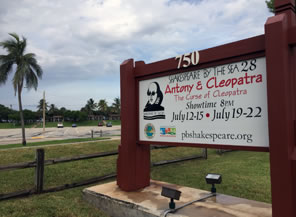
Palm Beach Shakespeare Festival stages its "Shakespeare by the Sea" productions in Jupiter's Carlin Park adjoining Jupiter Beach beyond the trees in the background. Below, Palm Beach County built an amphitheater stage for the festival, whose productions draw up to 2,000 picnicking patrons to its plays. Photos by Eric Minton.
William Shakespeare brought people back. Kermit Christman, an actor who had worked with England's Royal Shakespeare Company and in Shakespeare productions in Los Angeles before becoming a film and television scriptwriter and producer, had taken up residence in Jupiter. One day as he was walking across the scrubby terrain at Carlin Park, he noticed something in the landscape: a natural amphitheater. He broached the idea with county officials of a summer Shakespeare festival as a way to bring life back to the park. In the summer of 1991 he staged Twelfth Night on the grounds. Telling me this story over a lunch of salad and soup at TooJay's Gourmet Deli, Christman, still the company's executive producer, uses a refrain I've heard repeated by other Shakespeare festival founders across the continent: “And people came.” According to Palm Beach Shakespeare Festival's website, 10,000 people came that first weekend.
Dashiell was among them. On one of her beach drives she saw a sign advertising the Shakespeare production. Being an aspiring actress and a lover of Shakespeare since her mother had read the plays to her as a child, Dashiell took in the show. “I'm sitting in this grass field, and there is this set and stage that had been built right up from the ground. I see these performers who are truly bringing to life these words that I had seen through [high school] recitation competitions and that Mom had very dramatically read to me as a little girl before bedtime. To see it with a set and costumes and people in it, all I could think of was I want to do this one day.” That day came in 2003 when she finished college and returned home an established working actress. She auditioned for Romeo and Juliet—and bombed the audition "spectacularly," she says. "I stopped myself midway through. I said, 'You know what? I think I'm just going to stop here for now.' And the first words out of Kermit's mouth were, 'Good idea; something like a train wreck.'" Daniel Gordon, the festival's technical designer, knew of Dashiell's abilities and talked Christman into casting her as one of the servant brawlers. Dashiell would go on to become a member of the acting company, but it was her acumen with publicity that proved most valuable to the Palm Beach Shakespeare Festival. She owns her own business as a publicist with arts organizations among her clients, and she now has the title of producer for the festival.
With the festival's initial success, Christman encouraged the county to re-invest in both the park and the festival, from improving the grounds to constructing an amphitheater stage. Carlin Park features a handful of reunion-size picnic pavilions, a playground, a sand volleyball court, a small lake (or large pond) surrounded by grassy fields with houses and apartments beyond (local sound ordinances require plays to end at 10 p.m., though police don't make their presence known for another 15 minutes or so). At the center of it all is a towering theater stage. The best standard for grading a municipal park is the restrooms, and the ones here are clean and in working order.
Now in its 28th year, Palm Beach Shakespeare Festival draws an average of about 1,000 people for each performance of its eight-show run. What makes this notable is that while the area has a strong theater tradition—Jupiter native Burt Reynolds founded his dinner theater here in 1978—Shakespeare doesn't sell, says Scott Simmons, editor of the Florida Weekly. He has been covering the arts and entertainment scene in South Florida for his newspaper the past 10 years and for 17 years before that with the Palm Beach Post. The only Shakespeare that sells in South Florida, he says, is Kiss Me Kate at the Maltz Jupiter Theatre occupying Reynolds' former establishment. This is especially the case in the dead season of summer, when the Snowbirds have migrated back north and the bulk of tourism comprises people staying with their parents.
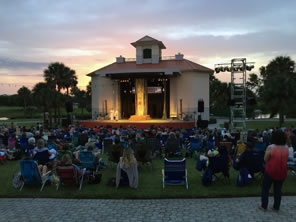 For Christman, the keys to Shakespeare's success in Palm Beach County are free admission, an outdoor setting where patrons can bring picnics (though the T.C. Melts food truck makes for a wonderful meal with its choices of gourmet grilled cheese sandwiches), and a conceptual style of presenting the plays. A world traveler with his background in film and television, Christman approaches each play with a treatment, a framework device that he dictates to the play's director, who then shapes Shakespeare's text to the concept. One production of lore inspired by the television series Lost set Twelfth Night on a desert island with segments of a crashed airplane as part the set. In my 2013 visit to Carlin Park, I saw Coriolanus set on "Kepler Object of Interest, KOI-172.02, that calls itself Rome," i.e. an extra-terrestrial planet with a giant monolith as the centerpiece, a la 2001: A Space Odyssey.
For Christman, the keys to Shakespeare's success in Palm Beach County are free admission, an outdoor setting where patrons can bring picnics (though the T.C. Melts food truck makes for a wonderful meal with its choices of gourmet grilled cheese sandwiches), and a conceptual style of presenting the plays. A world traveler with his background in film and television, Christman approaches each play with a treatment, a framework device that he dictates to the play's director, who then shapes Shakespeare's text to the concept. One production of lore inspired by the television series Lost set Twelfth Night on a desert island with segments of a crashed airplane as part the set. In my 2013 visit to Carlin Park, I saw Coriolanus set on "Kepler Object of Interest, KOI-172.02, that calls itself Rome," i.e. an extra-terrestrial planet with a giant monolith as the centerpiece, a la 2001: A Space Odyssey.
Christman gives Antony and Cleopatra the subtitle “The Curse of Cleopatra” and sets it in "Egypt, 1939, an archeological dig site near Alexandria." The production begins with archaeologists Dr. Anthony and Dr. Barber unearthing a gold chest with a curse inscribed on it. Dr. Anthony can't resist. He opens it, and Cleopatra (Kelly Lee Hussey) comes back to life to either get her revenge by killing the archaeologists (who become characters in the play, covering their work clothes in togas and Roman armor) or rework history by obtaining Antony's heart for eternity—I'm not quite certain.
Director Trent Stephens honed the text to focus strictly on the titular couple and explore the dynamics of Cleopatra's role as ruler and lover. The cast list is trimmed to 10: Cleopatra, Antony, Enobarbus, Octavius, Octavia, Lepidus (incorporating some of Octavius's generals), Eros (incorporating most of the messengers), and three actors, dressed in what looks like unraveled mummy ribbons, playing Cleopatra's court and other minor characters (soothsayer, soldiers, and messengers). These three—Sara Grant, Vickie Anderson, and Carlos Rivera Marin who is making his professional acting debut—also dance to Eastern Mediterranean electronica during scene changes, earning applause with each such interlude.
One of the most mesmerizing performances is that of a ball python playing the asp in Cleopatra's suicide. I've seen my fair share of live animals on stage—dogs, of course, a cat, donkeys, and a pig—but this is the first python I've seen, wrapping itself around Cleopatra's arm as she speaks her final farewell. She then joins her Antony behind a drape bearing the queen's cartouche, and the Soothsayer ambles on stage for one, final, hissing curse. The audience, lounging on blankets and lawn chairs, comes to its feet with a hearty ovation.
Carlin Park is alive this warm summer night.
King John, Texas Shakespeare Festival
Anne Dean Turk Fine Arts Center, Kilgore, Texas, July 21
This was the day of the year that made me most wary. Not because I would be seeing King John (I like this seldom-produced play, and I'm glad to see its production rate on the rise). Not because I would be in East Texas in the middle of summer (105 degrees Fahrenheit today). Getting here was my worry. I would have to fly from West Palm Beach, Florida, through Atlanta, Georgia, to Shreveport, Louisiana, and drive to Kilgore, Texas, in time to see the play tonight. The last time I scheduled flying on the same day as the play, a nine-hour cushion became a close call due to a broken aircraft in Detroit. This time, I was flying through Atlanta—cue Hitchcockian sound effects.
I booked a 6:45 a.m. flight out of Palm Beach International Airport. It would get me onto the same Shreveport flight as a 5:45 a.m. departure would while allowing an hour more sleep this morning after attending Antony and Cleopatra last night. That hour difference would prove pivotal. Atlanta Hartsfield Airport shut down due to storms right after my 6:45 a.m. flight left the gate. We sat for more than two hours on the ramp before we took off, then took a circuitous route over South Carolina and just south of Charlotte to get to Atlanta, the kind of trip the two gentlemen of Verona took to get to Milan by ship. My Shreveport flight was leaving as I was landing. Delta rebooked me on a flight that was supposed to leave at 2:08 p.m. and get in to Shreveport an hour later, but a late-arriving crew pushed back departure to 2:30, and a stuck door on the aircraft after we landed delayed “arrival” another five minutes.
I was on track to make curtain, but was running behind for a dinner date with Sarah Fallon and her husband, Charles. Fallon played the title character of Richard II at the American Shakespeare Center's Blackfriars Playhouse in Staunton, Virginia. She and Charles live near Arlington and made the two-hour drive into East Texas to meet with me and to see Tim Sailer, Fallon's Blackfriars colleague over several seasons, playing the title role of King John. I reached The Back Porch (a combination bar, restaurant, and music club) at 5:30, a half hour late but in plenty of time to reconnect with two dear friends I've made through Shakespeare. After our talk-constant dinner, we jaywalked our way to the Anne Dean Turk Fine Arts Center on the campus of Kilgore College.

Kilgore has three institutions it takes great pride in: oil, the Rangerettes, and Shakespeare. Photos by Eric Minton.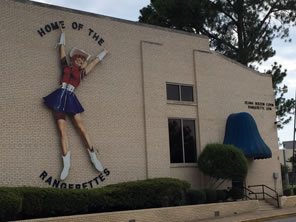

Kilgore takes great pride in three institutions: oil, which fueled 1,000 wells at one point in this small city (you can visit the East Texas Oil Museum adjacent to the Kilgore College campus and across the street from the Fine Arts Center); the Kilgore College Rangerettes, a high-kicking, cowgirl-styling precision dance team formed in 1940 that spawned similar units at college and pro football stadiums across the country (you can visit the Rangerette Museum on the campus and see the gymnasium that proclaims itself the “home of the Rangerettes”); and William Shakespeare.
That the Texas Shakespeare Festival is located here is due directly to the eruption of the Daisy Bradford No. 3 oil well in 1930 that led to discovery of the East Texas Oil Field, one of the world's largest. For the sesquicentennial celebration of Texas's annexation to the United States, Raymond Caldwell, chairman of Kilgore College's theater department and director of the fine arts division, was approached about staging a play based on the book The Last Boom: The Exciting Saga of the Discovery of the Greatest Oil Field in America. He commissioned a playwright, Gifford Wingate, and then decided to recruit graduate students in theater programs from around the state. He figured he needed more enticement for aspiring actors to spend their summer performing in Kilgore. Noting that the Shakespeare festivals in Houston and Dallas were outdoors, he decided to stage one indoors, so he added A Midsummer Night's Dream and Twelfth Night on either side of Wingate's The Daisy Bradford 3. All three productions played to capacity houses in the 200-seat auditorium, guaranteeing a second season. The Daisy Bradford 3 eventually dropped out of the repertoire, but the Shakespeare has continued through 30 more seasons. This year the festival is staging six shows, two of them Shakespeare.
Artistic Director Caldwell says productions still average 90 percent capacity (King John, however, has been a tough sell, settling in at around 60 percent), but community support goes beyond people in seats. While Kilgore College continues to provide the theater, offices, and shops for the company, dorm housing and dinners for the actors, and the salaries of Caldwell and Managing Director John Dodd, the bulk of the Festival's financial underpinning is provided by a foundation of local community leaders. The most singular entity of support is the Texas Shakespeare Festival Guild, an organization of about 1,000 supporters who raise money for various Festival needs, from equipment to intern stipends, and extend Texas hospitality to the company of actors and artists. Guild members host parties at their mansions, run boat trips on lakes, and invite individual actors to their homes for dinners.
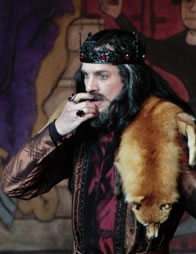
Tim Sailer as King John (with "Kevin" around his shoulder). Photo by John Dodd, Texas Shakespeare Festival.
Guild members also donate items for the shows. One donation from Kilgore women makes a notable appearance in King John: furs, especially the fox furs—well, actually it's the foxes themselves sans innards. These fox stoles are named, too, like pets. Then there's the hair. The festival's new wig master, Nicholas Jones, outfitted the characters with incredible coiffures, from Salisbury's braided goatee extending to his sternum to Blanche's Lady Godiva–length blond tresses. Phillip the Bastard has a rugged halo of reddish brown hair with braided strands down the temples framing his face. The braids up the Bastard's already high cool quotient, but the actor playing him, Conor Finnerty-Esmonde, tells me later that the braids are functional: In rehearsal when he headbutted Austria, his hair flew in his face, temporarily blinding him, so the braids were installed to keep the wilder strands under control. Sailer's jet black wig and beard (both of which are streaked with gray in the play's second half) flow down to his black fur collar, giving his King John the look of a black bear, ferocious in bearing if somewhat naïve and skittish.
Though his production is unabashedly set in early medieval times, Director James Dean Palmer was after a Sons of Anarchy aesthete, especially for the English (the French nobles are just as hairy, albeit with more flowing locks). Angelina M. Herin's costumes mix the look of crusader tunics with northern barbarian warrior coats and capes. One such cape worn by King John has six dangling fox pups. As for the title character, this is no thumb-sucking wimp of Disney depiction or “walking pustule” of James Goldman's The Lion in Winter. This John's commanding presence is in the verse structure Shakespeare gives him, and Sailer, tackling his first Shakespearean king and his first Shakespeare title role, achieves this through his verse-speaking skills, going deeper in register than I've heard him speak in Blackfriars productions. To be sure, Shakespeare also portrays John as impetuous (his way of overcoming his insecurities) and politically inexperienced, relying on his mother, the famous Queen Eleanor (Joan Korte), for guidance. John's distracted disintegration in the second half of the play is as much the effect of Eleanor's reported death as it is his own reported poisoning.
King John is an anomaly in the Shakespeare Canon. It doesn't fit in with the playwright's two great English history tetralogies covering the War of the Roses, and it is one of two plays written entirely in verse. Richard II is the other, and Shakespeare wrote that one shortly after staging King John. With this first rhetorically based history play, Shakespeare didn't quite marry form to plot development and character arc, as he would perfect in subsequent efforts. Nevertheless, King John has some marvelous speeches (Constance's grief is fodder for any audition), poignant combinations of drama with comedy (such as the English and French off-and-on fighting and name-calling over Angiers, though Palmer drops two of the three battles), and one of the canon's greatest characters in Phillip the Bastard. The rugged, ultrapatriotic warrior steps into soliloquies to deliver incisive and so-modern-sounding commentary on the politics and social conscience swirling about him.
I'm in East Texas. This is Trump country. Finnerty-Esmonde is not playing his Bastard with any Trump tropes, but after six months of seeing the president through so many of Shakespeare's petulant tyrants, I'm seeing the other side's Trump through the eyes of the patrons around me, many wearing Guild buttons on their lapels. I can't help wondering how many in this audience see their hero in this hero.
Tuesday, July 24—Border Song, Too
We step to the counter and hand our passports and customs form over to the Canada Border Services officer at Toronto Pearson International Airport. He glances at the information I've filled in.
“Where are you going to be in Canada for seven days?” he asks.
“Saskatoon and Newfoundland,” I reply.
“What's the purpose of your visit?”
“To see Shakespeare plays.”
He pauses, then squints at the section where I had to check the box for purpose of visit: I checked both "leisure" and "business." He looks more bothered than puzzled. “Are you here for leisure or business?” he asks.
“I'm business, she's leisure,” I answer, pointing at Sarah for the second half of my reply.
“What's your business?” he asks.
“To watch Shakespeare plays and write about them.”
“Just go on,” he says with I've-heard-them-all annoyance, stamps our passports, and curtly motions us through the aisle next to his booth and on to our connection for Saskatoon.
Titus A. puppet revenge, Shakespeare on the Saskatchewan
Saskatoon, Saskatchewan, July 25
Puppets in Saskatoon! I love the sound of that, like it might be a Gilbert and Sullivan children's show. But this is no kiddie matter. This is Shakespeare on the Saskatchewan's production of William Shakespeare's Titus Andronicus played with puppets. Recommended for ages 16 and up because of its “violence, sexual violence, and sexual content,” it comes with a warning to audiences that "this show may trigger deep emotional responses due to the subject matter of the script as well as the dynamic and vivid nature of puppetry.”
Certainly, you can do things with and to puppets anatomically that you could not do with human actors. You also can use puppets to take audiences to an emotional and psychological state you can't necessarily reach with human actors. Titus seems more vulnerable, Tamora seems not quite so evil, and Lavinia is all the more helpless when she appears on the table after her rape and mutilation without a human to give her life. This is the first time Shakespeare on the Saskatchewan has staged Titus Andronicus (renamed Titus A. puppet revenge), and both the play itself and the style of staging has proven to be a buzz-building phenomenon for the Festival, now in its 34th season.

A tour boat passes Shakespeare on the Saskatchewan in Saskatoon. Photo by Eric Minton. Below, Tamora (right, played by Kristi Friday), watches as her eldest son is executed (Carol Greyeyes playing the executioner) while among the other captured Goths in the company's production of Titus A. puppet revenge. Photo by Debra Marshall Photography, Shakespeare on the Saskatchewan.
The festival has long been a fabric of the community—literally. Every June, when the tents covering its 285-seat theater and ancillary structures rise along the banks of the Saskatchewan River in downtown Saskatoon, people would see that as the sure sign that “summer is here!” That has become Shakespeare on the Saskatchewan's marketing slogan. The company has just launched a $3 million capital improvement campaign to install permanent infrastructure on the site, which could then be rented out for other festivals and private events. The tents, however, and their seasonal significance will continue their iconic annual rising.
This physical improvement follows on an artistic evolution that started five years ago when Will Brooks took over as artistic director. The company had always staged its Shakespeare with an attitude of pushing boundaries of settings and thematic concepts, but it had fallen into a period of financial stagnation. In Brooks, the board of directors sought a leader who could marry artistic exploration with financial innovation, and the Festival has invested in diversifying its audience through such productions as 2016's J Caesar set in a futuristic all-female society and last year's bluegrass Twelfth Night. Three years ago Brooks added a third play to the repertory, a four-man promenade-style presentation of The Tempest, which ran opposite the all-female J Caesar.
This year he is staging Titus A. in an event tent with 87 seats and a dirt floor at the opposite end of the grounds from the main stage, where a nine-actor Hamlet is playing (The Merry Wives of Windsor, featuring the entire 13-member acting company, is this season's other main stage title). Brooks can't tell me how he came up with the idea of using puppets to present Titus. It was one of those "of course!" moments as he was contemplating a play he has always loved but had never been staged on the banks of the Saskatchewan. It was not an original idea, however. When he brought it up in conversation, he learned that puppet artists Crispi Lord and Kristi Friday had been thinking of staging the play ever since they saw Julie Taymor's film version of Titus in 2001. Friday is a founding member of Wide Open Children's Theatre where Lord is the head puppet wrangler, and Lord is a master caster with Stumped Productions, which co-produced Titus A.
Brooks and Lord became a directorial team. Brooks is credited as director, production designer, and adaptor. He cut the script to 90 minutes and trimmed speaking characters to nine puppets plus crowds while seeking a balance of visual presentation with the text's heavy rhetoric. Puppets with no mouths reciting lengthy passages of verse can get boring, so he made sure that no speech went more than four lines without some visual cue. Lord is credited as puppet designer and choreographer, the latter making her de facto director of some segments. Friday helped build the puppets and then took up puppeteer duties, joining five of the company's actors comprising the cast.
The puppets (45 in all, with multiple versions for Titus and his daughter, Lavinia) are roughhewn dolls, many with joints in the knees, hips, and neck, and most with arms manipulated by the puppeteers. They are costumed in Roman garb (Tamora's robes are gorgeous). The stage uses movable tables, blocks, and one golden tree. The background comprises two arched doors, through which the puppeteers enter and exit, and six arched windows above, which serve as a morgue. When a character dies, its puppet (or body parts) is placed there. Cellist Scott McKnight, sitting at the side of the stage, provides a constant soundtrack (including staccato knife attacks).
The puppeteers are integral to the staging. The play opens with the six puppeteers one by one entering with expressions—fear, confusion, confidence, arrogance, and one with an evil grin—that clue us in to the kinds of characters they play. They manipulate their characters with great empathy, and they become part of the action. The women puppeteers line the side of the stage before Sarah Bergbusch brings the ravished and mutilated Lavinia in and places her, draped in veils, on the table. Bergbusch first removes the veils, then struggles to bring her puppet to consciousness and understanding as the other distraught puppeteers watch in helplessness. The puppet Lavinia motions to a puppeteer, who steps up and carries Lavinia's severed tongue and hands to the morgue, placing them with the body of her slain husband, Bassianus. Another puppeteer then runs back stage and returns with Marcus, Titus's brother who, in Shakespeare's script, discovers Lavinia and comforts her. At this point, Lavinia's mouth opens (the only puppet with a mouth as well as eyes—all other puppets just have eyelids) and gobs of red ribbon pour out. Bergbusch has blood in her own mouth, a visual that returns in the final banquet as the actors all become victims of the carnage their puppets create.
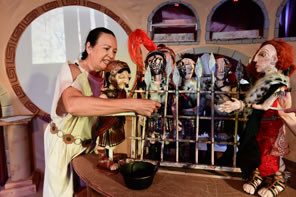 When the puppets attack each other with short swords (which the puppeteers sheath in their own belts) they rip off clothes to reveal massive wounds. We see Aaron buried alive as birds, depicted in shadow puppets, leave behind a fresh skeletal skull. After Tamora's sons, Demetrius and Chiron, are baked into pies for the climactic feast, their flayed bodies are carried in on a rack looking like trussed game hens and placed in the morgue. The "sexual content" are textually inspired interpolations. Saturninus relieves himself by the tree, humming as he does so, giving it a good shake, and then wiping his hand on Titus's shirt. Tamora gives Aaron a blow job during one of his speeches and then mounts him as they both come to climax.
When the puppets attack each other with short swords (which the puppeteers sheath in their own belts) they rip off clothes to reveal massive wounds. We see Aaron buried alive as birds, depicted in shadow puppets, leave behind a fresh skeletal skull. After Tamora's sons, Demetrius and Chiron, are baked into pies for the climactic feast, their flayed bodies are carried in on a rack looking like trussed game hens and placed in the morgue. The "sexual content" are textually inspired interpolations. Saturninus relieves himself by the tree, humming as he does so, giving it a good shake, and then wiping his hand on Titus's shirt. Tamora gives Aaron a blow job during one of his speeches and then mounts him as they both come to climax.
All of this would be mere porn and gratuitous violence if not for the humanity at the center of the play and this production, not just in the visuals of the post-assault Lavinia puppet shuddering as it tries to get up but also in the character of Tamora who has seen her eldest son ritually sacrificed by Titus and his sons at the beginning of the play. In Friday's portrayal of Tamora, after her sons have murdered Bassianus and she sends them off to rape and mutilate Lavinia, she laughs maniacally, which turns into tearful crying, which culminates in a scream of rage. "Ne'er let my heart no merry cheer indeed, 'till all the Andronici be made away," she yells and kicks the body of Bassianus into the pit.
Back in that opening scene when her eldest is sacrificed, Tamora had lamented over the Andronici's "cruel, irreligious piety." That's a phrase that generates a deep, emotional response in 2018, whether the congregation is puppets or people.
As You Like It, Shakespeare by the Sea
St. John's, Newfoundland, July 28
Shakespeare stands at the edge of the earth here—or, at least, his characters do. But this is not the edge of civilization. We're in and around St. John's, Newfoundland, the farthest reaches east of the North American continent in a time zone east of Eastern. Along with visiting a number of dramatic landscapes on which to stage William Shakespeare's plays, we take in a delightfully localized rendition of As You Like It, we kiss the cod (actually a salmon), and we're Screeched in as Newfoundlanders, all thanks to Shakespeare by the Sea.
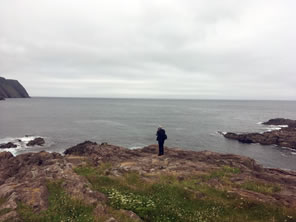
Standing on the Logy Bay rock formation in Newfoundland that served as Shakespeare by the Sea's first stage near the edge of the continent. Below, the cast takes a bow after its performance of William Shakespeare's As You Like It at the Bowring Park amphitheater. Photos by Sandra Mills, Shakespeare by the Sea.
This is the 26th play and theater on my one-year journey through Shakespeare's canon, and my third Shakespeare by the Sea. The like-named company in San Pedro, California, hosted me for The Winter's Tale last month, and Palm Beach Shakespeare Festival, where I saw Antony and Cleopatra last week, advertises its productions as “Shakespeare by the Sea” (another Shakespeare by the Sea is in Halifax, Nova Scotia). I targeted this community as one of my four corners of the continent (along with Miami, San Diego, and Fairbanks). Once here, we discover that Cape Spear Lighthouse National Historic Site, 10 miles southeast from downtown St. John's, is identified in the Parks Canada network as one of the “Four Corners of Canada in every cardinal direction.”
Of all the stops on this yearlong Shakespearean adventure, I anticipated Newfoundland as the most exotic. Fairbanks would have been except that I lived there as a kid, and while Saskatoon, Saskatchewan, is way up there, Newfoundland is way out there, an island dangling off the rest of the continent. What I didn't anticipate is that I'd be considered the exotic one, coming all the way from Washington, D.C., to see a local amateur theater company perform a Shakespeare play. This morning's tour, courtesy of Shakespeare by the Sea General Manager Sandra Mills, starts with me on the other side of the interview as a guest on Heather Barrett's local Canadian Broadcasting Corp.'s weekend morning show (click here for podcast). Though we talk about the Shakespeare Canon Project, the interview serves to promote tonight's performance, and my own 10 minutes of fame vanishes immediately when, upon finishing my interview, Barrett queues up a story about a little girl selling ice cream from a trailer hooked to her tricycle.
Mills takes Sarah and me on a driving tour of the city and the locations that have served as stages for Shakespeare by the Sea. We stop at Bannerman Park, a city park with baseball field, swimming pool, playground, and a green space where the current production of As You Like It premiered, the Arden foresters emerging from a grove of spruce trees. Next we drive up to Signal Hill National Historic Site rising high over St. John's almost fully enclosed harbor. The top half of the hill, where Guglielmo Marconi received the world's first transatlantic wireless signal in 1901, is shrouded in fog, so there's no point driving to the fortress (now invisible) at the peak. Instead we stop at the park's Military Tattoo Field where Prospero cast his spells from rock outcroppings bordering the grounds in a production of The Tempest. On the neighboring plateau is GEO-VISTA Park where ghosts haunted Richard III on an enclosed wooden observation deck overlooking the harbor. We descend into the densely packed downtown and walk around Harbourside Park where Cleopatra met her Antony near statues depicting the region's two famous canine breeds, the Newfoundland and the Labrador retriever.
For brunch, Mills introduces us to the Newfoundland delicacies of touton (bread fried in fatback salt pork and served with molasses or butter) and fresh fishcakes at The Guv'ner, an English-style pub and favorite Shakespeare by the Sea haunt. Later, she takes us up to Logy Bay, parking her car in a gravel lot and guiding us down an uneven grassy-rock path. We end up at a natural amphitheater facing a level area of sandstone and conglomerate amid a vista of rock cliffs jutting into the North Atlantic. “There are permanent exits stage left and right,” Mills says, referring to the cliffs plunging a few hundred feet to the ocean. Shakespeare by the Sea hasn't performed at Logy Bay since 2009, but this spot has special significance for the company. This was its first stage, where Richard “Dick” Buehler played Prospero in 1993. Buehler, who died in 2006, was a professor at Memorial University in St. John's. Three students in his directing class, who called themselves “Dick's Kids,” formed what would become Shakespeare by the Sea and cast their mentor as their first production's magician. All of Shakespeare by the Sea's stages must contend with ambient noise, from baseball games to bellowing ships, but Artistic Director Paul Rowe does not concern himself overmuch with that. When I sit down with him for a chat this afternoon, he points out that Shakespeare's company contended with ambient noise inside their theater. Here at Logy Bay, however, breaching whales in the background would upstage the actors.
Shakespeare by the Sea remains an amateur company with just two paid positions, those of Rowe and Mills (the GM position is new this year). The company's slogan for last year's 25th Anniversary Season, “From Home Port to Uncharted Waters,” proved prescient when a complete overhaul of the board came about over the winter. The board hired as artistic director Newfoundland native Rowe, an established actor and director in the community and with Shakespeare by the Sea. Rather than doing two Shakespeare plays per season, the company scaled back this year to one full-length play, As You Like It, along with the children's show, Shake it Up.
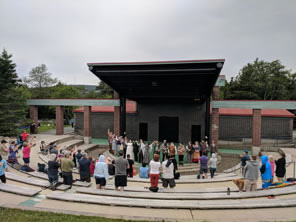 For this weekend, As You Like It has taken up residence at a small, concrete amphitheater tucked away in the woods of Bowring Park, a Central Park–inspired landscape in St. John's. In helming As You Like It, Rowe trimmed the play to two hours including intermission and sets it in mid-20th century Newfoundland, with the foresters singing lumberjack and local folk songs. What makes this As You Like It distinctly Newfoundlander, though, is the local dialects spoken by the members of the cast. Newfoundland English is a combination of West Country English, Irish, some Scots, and American, with variants among the island's rural coastal communities. The result is not only an authentic Original Pronunciation delivery of the text but a tasty stew of dialects among the cast members.
For this weekend, As You Like It has taken up residence at a small, concrete amphitheater tucked away in the woods of Bowring Park, a Central Park–inspired landscape in St. John's. In helming As You Like It, Rowe trimmed the play to two hours including intermission and sets it in mid-20th century Newfoundland, with the foresters singing lumberjack and local folk songs. What makes this As You Like It distinctly Newfoundlander, though, is the local dialects spoken by the members of the cast. Newfoundland English is a combination of West Country English, Irish, some Scots, and American, with variants among the island's rural coastal communities. The result is not only an authentic Original Pronunciation delivery of the text but a tasty stew of dialects among the cast members.
While Shakespeare by the Sea comprises amateur actors (many of whom have performed with the company for years), the performances generally hold up well. Two performances in particular attain singular status among the 19 stage productions of As You Like It I've seen. Melissa Ralph's Rosalind becomes a convincing Gannymede, not just with tucking her long hair under her cap and wearing mid-century men's clothes, but with her mannerisms and the lower register of her voice (except when her character gets excited and accidentally slips back into her Rosalind voice). This Gannymede can even be something of a jerk, and the behavioral as well as physical transition is so complete that she easily fools Orlando and her father.
Simon Alteen's Orlando is a revelation, a deeply romantic yet fully comic portrayal that polishes what many feel is Shakespeare's most underdeveloped romantic hero. The soulful third son of nobility whose mean upbringing handcuffs his natural intelligence, Alteen's Orlando acts upon his passions rather than thinking things through. “The spirit of my father grows strong in me,” he says as he chokes his bullying brother, which serves as a foundational line for Alteen's performance. In another sudden display of passion, he quickly falls in love with Rosalind, but is not equipped to express himself in words (yes, he writes love poems about her, but he never expects her to see them, and they are not well written). Alteen approaches Orlando's interactions with Gannymede pretending to be Rosalind as something of a lark, but the exercise nevertheless leads Orlando to treasure more devoutly his love for a woman represented in what he thinks is Rosalind's proxy.
We end our day at a raucous cast party in the downtown home of David Maher, chair of Shakespeare by the Sea's board of directors. There, Sarah and I are “Screeched in as Newfoundlanders.” This ceremony involves eating a chunk of Newfoundland's national food (bologna), kissing a cod (only the head of a salmon is available in the freezer, so that substitutes for the cod), learning to speak a few phrases in the local dialect (such as “Arn," which translates as “Are there any good fishing today?"), and downing a shot of Screech, a Newfoundland version of Jamaican rum. Sarah foregoes the last part of the ceremony because of her medical condition, but we are both proclaimed Newfoundlanders nonetheless.
I must say I certainly feel at home here.
Tuesday, July 31—Airway to Hell
Canada is a wonderful country; we always love going there and being there. Coming from there this time was a nightmare.
I've heard horror stories with airlines and have endured my share of delays, lost luggage, and bad service, but our experience with Air Canada, the first time we've used this airline, is our worst ever. Our flight—which we shouldn't have been on in the first place—from Montreal to Washington's Dulles Airportwas on a small regional jet that required us to gate check our carry-on bags. But our carry-on bags were not loaded on the plane. Upon arriving in Dulles, at least a dozen passengers found themselves without car and house keys, credit cards, laptops, iPads, strollers, baby gear, a “breathing machine,” and, in my case, my Shakespeare Canon Project computer and all of my notes and interviews from my visits to Shakespeare on the Saskatchewan in Saskatoon and Shakespeare by the Sea in Newfoundland.
And that was only the beginning of the nightmare. Now, 24 hours after we landed, the travails got worse and weirder.
This caps one week over which Air Canada has accumulated more bad experiences and inconveniences than I've had combined over 41 years of flying on more than a dozen airlines (including twice reaching premier levels). Air Canada was named “Best Airline in North America” at the 2018 Skytrax World Airline Awards, and when the pilot of our Toronto-to-Montreal flight said that, the guy next to me scoffed. He and I began comparing our experiences, and this was before the fiasco of the lost bags on our final flight. I can't come up with an adequate Shakespearean allusion to this situation (Errors, yes; Comedy, no) other than Gertrude's "One woe doth tread upon another's heel, so fast they follow," from Hamlet. The forward-thinking, universal-writing Shakespeare apparently couldn't fathom what Air Canada was (in)capable of accomplishing; nor could the airline's own employees.
Here's the complete, seven-day record of our Air Canada experience.
- Our first flight on Tuesday, July 24, from Dulles to Toronto arrived on time but couldn't get to the gate for 20 minutes because no ground crew was available to guide the plane in. The pilot said it was a “red alert,” meaning that lightning in the area had closed the flight line. This is a condition we're familiar with, as my wife was an Air Force flight line maintenance group commander, and she strictly enforced those leave-the-tarmac standards. But either that standard is not strictly enforced at Toronto Pearson Airport or there wasn't really a red alert, as we saw two other planes (including an Air Canada flight) park and another leave while we waited and watched ground crew working at other gates.
- That delay didn't cause us to miss our flight to Saskatoon because it, too, was delayed. We got into Saskatoon more than an hour after we were due in.
- On Friday, July 27, from Saskatoon we headed to St. John's via Toronto. We left Saskatoon on time, but, again, upon arriving in Toronto, we couldn't get into our gate. Twice our plane approached the gate, and twice it did a U-turn back out to the apron and waited. The reason, said the pilot: because of red alerts the day before, the airline was short-staffed this morning. Our departure for St. John's was delayed 70 minutes anyway, and again we got in to our final destination more than an hour late.
- Yesterday morning, we were to leave St. John's at 5 a.m., but the inbound flight was late getting in (we didn't hear a reason), so our departure was delayed an hour. Getting in to Toronto at 8:10 rather than 6:57 meant missing our 8:30 flight to Washington, so Air Canada rebooked us on a 4 p.m. flight to Montreal, and connecting from there to a Washington flight 90 minutes later. We had to spend the day at Toronto Airport and suffer the costs accrued doing that, from additional airport parking back home to lost income for Sarah, who was missing a day of work (I was sweating that she might have a seizure, as she did have one last Thursday). Air Canada did give us a meal voucher apiece. They each turned out to be worth $10, which didn't cover breakfast, let alone lunch.
- You can bet that we were not going to leave Toronto on schedule. Sure enough, we departed 15 minutes late; and, sure enough, we left Montreal 15 minutes late, too—without our gate-checked carry-on bags.
That's a 100 percent tardy arrival rate for us on this trip. Flight delays are common, but not that consistent and usually due to weather and equipment problems. Though weather issues were blamed, these Air Canada delays seem to be the results of poor personnel management, as is losing a plane-load of carry-on bags.
The bag agent at Dulles was told the bags were removed because of a weight imbalance on the aircraft, but none of us were buying what sounded like another baseless, technical-sounding excuse: not me (a veteran flyer who knows that carry-on bags are not the first removed for making weight), not Sarah (an Air Force veteran who knows the quantity of bags we saw should not have been an issue), and not the agent (ditto). Rather, evidence indicates the bags never even made it to the tarmac in Montreal. When tagging our bags there, the gate agent told us to place them on an elevator in the jetway. A sign at the elevator confirmed that instruction. Those who didn't hear or understand placed theirs at the end of the jetway; they got their bags upon arrival in Dulles. We who did as we were told were left out in the cold, a literal metaphor for a woman who said she didn't have car keys or credit cards and wandered off down the Dulles concourse in a daze.
The bag agent at Dulles (and lone Air Canada representative at that airport, as far as we could tell) was overwhelmed, contending with a dozen angry or confused passengers and another flight due in. He gave us the baggage claim center phone number rather than have us all wait an hour for him to finish up his other duties. I called the number but also was direct messaging with Air Canada via Twitter, through which I received instructions that I had to make a claim with the airport agent. This instruction was oblivious to the fact that Air Canada has no baggage office at Dulles, the ticket counter was closed until 4 a.m., and the baggage agent was then at the gate, which I couldn't get to without a boarding pass. I pointed out all of this in return reply and didn't receive any response. The airline's Twitter presence seems intended to merely look caring to a passenger's Twitter followers and not actually assist the passenger.
Meanwhile, my call to the baggage claim center proved an adventure, one continuing even now. The guy I talked to couldn't fathom that this was a carry-on bag that had gone missing, not checked luggage. He kept trying to get my full itinerary beginning in St. John's as if that would help find the bag. No: My office case is sitting in the jetway at Montreal. I know that, but everybody kept insisting I had to use the system which was not geared to handle such a stupid mistake. I understand the confusion: How can an airline lose gate-checked carry-on bags? They had to think I was the crazy one. I waited until the Dulles baggage agent finished working the next inbound flight, and he and I went over my records in my lost baggage claim file. He noticed that the wrong flight number had been entered. I had repeated it five times, reading from my boarding pass, because the man asked me five times for it. The agent and I then went over the entire record and discovered that our address had been entered incorrectly, too, so he amended that. He also saw in the system several other claims filed for that one flight—all these crazy people with their lost carry-on bags.
It gets weirder. No, really. This morning I checked the on-line baggage tracker system and saw that my bag was due to fly from Montreal to Dulles this afternoon; I also saw that our address was still incorrect, and that my email address was misspelled. I entered notice of correction. The flight made it into Dulles only two minutes late, but it took a couple more hours before the bag was reported to have landed (now described as a soft-sided suit bag, not an office carrying case). It's also still going to the wrong address. So I call.
Chris answers, takes my file number, and puts me on hold. A minute later, Chris, with a slight accent I didn't notice when he first answered, tells me that they do see the corrections that both the agent and I had made in the system though the actual file hadn't been corrected. The courier has not picked up the bag yet, so he again puts me on hold while he contacts the courier. Five minutes of bad music later, Chris gets back on the line, now with an accent I can hardly understand, and tells me they can't change the record at the airport or with the courier, but the courier will call me when they are about to deliver the bag. After asking him to repeat this, I address what flabbergasts me most. “It sounds to me that your accent has changed every time I'm put on hold; have I been talking to three different guys?”
“Unfortunately, yes,” this third person says. “We are baggage central.” Sounds like the Soviet method of management.
As I write this, my bag—a bag, at least—is promised to arrive tonight at one of two addresses. Fortunately, I moved one of my laptops to my purse to do some work on the flight, though I don't have the power cord with it. Fortunately, while my car and house keys are in the lost bag, Sarah packed her car and house keys. Fortunately, I make a habit of backing things up. Fortunately, while some handwritten notes are currently in limbo, I think I can salvage much of what I lost from my anal record-keeping habits. Regarding our one-day delay getting home, yes, Sarah loses a day of income, but fortunately I had previously rescheduled her medical test from yesterday to tomorrow—though I scheduled us to arrive home at 10 a.m. yesterday, I didn't want to risk a delay. That's how I measure luck when it comes to Air Canada: How much worse could it have been for us, as it was for others on our flight (no stroller, no “breathing machine”). But what was supposed to be three days of administrative recovery before my next trip is now down to one day that might yet require replacing a computer and other equipment, plus a new bag.
Most frustrating is how sorry is the easiest word for Air Canada to say, serving as the final word on any problem, whether it's a daylong delay, a lost carry-on bag, key information being recorded incorrectly on a claim, or that Chris's command of the English language deteriorates every time he gets back on the line at baggage central (only the guy who answered the phone identified himself; his alter egos never did). My son used to think that saying sorry gave him license to be rude and mean—he's since learned otherwise and matured—and now here is the same attitude embedded in a corporate culture.
The phone rings. It is the courier saying he's on his way. I ask him to where. He tells me. I give him the correct address instead. He thanks me.
 No, this is not a fatal plane crash, but it is a catastrophic failure in management. A dozen people lose their carry-on baggage?! Can you even imagine such a scenario? Air Canada's own baggage central couldn't imagine it. Other than what little the overwhelmed agent at Dulles tried to do for us, Air Canada did not take any position of advocacy for its customers by getting to the obvious source of the problem and guaranteeing an immediate fix. They said “sorry” and “we regret hearing this” and then would almost immediately rip that band-aid off our harried psyches. For all I am worried about the cost and trouble of recovering from my own loss, my memory is haunted by the guy without his “breathing machine” and the woman wandering down the corridor in a daze.
No, this is not a fatal plane crash, but it is a catastrophic failure in management. A dozen people lose their carry-on baggage?! Can you even imagine such a scenario? Air Canada's own baggage central couldn't imagine it. Other than what little the overwhelmed agent at Dulles tried to do for us, Air Canada did not take any position of advocacy for its customers by getting to the obvious source of the problem and guaranteeing an immediate fix. They said “sorry” and “we regret hearing this” and then would almost immediately rip that band-aid off our harried psyches. For all I am worried about the cost and trouble of recovering from my own loss, my memory is haunted by the guy without his “breathing machine” and the woman wandering down the corridor in a daze.
The doorbell rings. The bag is here. It is my office bag, and everything is in it. I, at least, can breathe easier.
All's Well That Ends Well, Ohio Shakespeare Festival
Stan Hywet Hall & Gardens, Akron, Ohio, August 3
The King is talking near the center of the stage, but what matters most is a minitableau to the right. Helena leans her head contentedly on the breast of Bertram, who has his arm around her shoulder holding her close. His mother, the Countess, stands opposite them, beaming at the couple. All has ended well in Ohio Shakespeare Festival's production of William Shakespeare's All's Well That Ends Well, but arriving at this moment requires faith from the characters in the play and faith in the characters by the actors playing them, who hope to awaken the audience's faith in them, their characters, and the play.
I'm here on faith—in the play, in these particular performers, and in the spiritual forces that seem to be propelling the Shakespeare Canon Project onward.
Historically one of Shakespeare's lesser presented plays, All's Well That Ends Well is riding a wave of production popularity this year (ranked 11th on the Shakespeare Plays Popularity Index). Many first-time readers consider the play, with its dense language, improbable plot, and unfathomable characters, to be unstageable. Not me. I was 20 when I first read through the entire canon, and All's Well immediately became one of my favorites; I couldn't wait to see it staged. Several years passed before I did, and the first few productions I saw didn't meet my high expectations. In more recent years, though, with the advent of more text-centric productions using Shakespeare's own staging practices, I've seen this female-dominated masterpiece reach its potential.
That I'm here today in Akron, Ohio, is specifically about this play presented by this company in this place, the Stan Hywet Hall and Gardens. Last year, Sarah and I saw Ohio Shakespeare Festival's As You Like It here, as perfect a presentation of that play as I've seen and number one on my annual Top Shakespeareances list for the year (for that list, click here). When I learned Ohio Shakespeare Festival would be doing All's Well this summer, I immediately pegged it for the Canon Project, though I could have saved myself some scheduling headaches by choosing any number of other All's Wells.
That was before Sarah's neurological condition intervened. Her 48-hour EEG was scheduled for this week, requiring her to be wired to a portable monitor. Its installation was set for Wednesday, and we understood that she would return to the clinic on Monday. I booked my trip to here and then on to Colorado for a one-night-only chance to see Edward III so that I would be back home (requiring some serious red-eye traveling) to get her to and from the doctor. On Wednesday, the technician informed us she would have to return today, not Monday. Uh-oh. Sarah said she'd take a cab, but I absolutely refused that option; already I was feeling the guilt of not being with her for the duration of the test. I told her I will cancel my trip, but then I saw the look in her eyes that I've been striving so hard to keep at bay: defeat. “I need to know before I start installing the wires,” the technician said with understandable curtness. “Go ahead,” I told him as I pulled out my iPhone; “We'll make it work,” and I started texting. I was typing my third text when the first one to a neighbor received an answer: “Yes, we can drive her.” The other two texts generated the same answer, and a promise to step in if the first ride fell though. I'm still grappling with my guilt for not being there myself, but at least I've defeated defeat, for the time being.
I landed in Cleveland this morning, drove to Akron, checked into my hotel, and immediately headed for Stan Hywet Hall, the palatial home built between 1912–1915 by F.A. Seiberling, co-founder of the Goodyear Tire & Rubber Company. Stan Hywet is the Old English term for stone quarry, and what are now lagoons below the formal gardens were once a marbles quarry. That's not Michelangelo-type marble but playground marbles then made of clay. Akron was the marbles capital of the world before Seiberling made it the rubber capital. The home's motto is “Not for us alone,” and F.A. and Gertrude Seiberling hosted concerts, dances, and plays for the community, including an annual Shakespeare ball that attracted thousands. One of the upstairs rooms was turned into a nursery and playroom (the Von Trapp children stayed there in 1942), and visiting grandchildren would use it to perform plays for the family.
The site's Shakespeare tradition continued after Seiberling's death in 1955 and the family turned the property over to a foundation to maintain for the community of Akron. In 1958, the foundation hired as its executive director Arthur Lithgow, an actor and director who had founded the Antioch Shakespeare Festival ("Shakespeare under the Stars") at Antioch College in Yellow Springs, Ohio. The Lithgow family, including teen-age son John, took up residence on the property, and Arthur founded a Shakespeare festival here a couple years later. The foundation fired him before he could stage his second season, so he moved the event to nearby Cuyahoga Falls, and the following year started the Great Lakes Shakespeare Festival (now Great Lakes Theater) in Lakewood, Ohio. Though Lithgow left Stan Hywet, Shakespeare remained with annual productions of varying degrees of artistic success over the years.
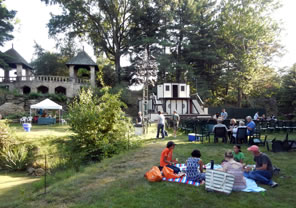
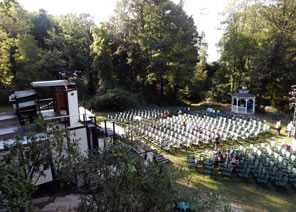
Top, patrons picnic before Ohio Shakespeare Festival's production of All's Well That Ends Well below the tea houses at Stan Hywet Hall and Gardens. Above, the view from the tea houses of the theater and lagoon. Photos by Eric Minton
The foundation hooked up with the Ohio Shakespeare Festival, newly founded by the married couple of Terry Burgler and Nancy Cates, in 2002. They staged their first production, The Taming of the Shrew, in the carriage house courtyard where previous plays had been performed. The next year, Burgler convinced the Foundation to clear out a portion of the lagoon at the back of the property and run electricity to the site so he could use a cliff face of rock shelves topped by the twin towers of the Seiberlings' stone tea houses as a backdrop for The Tempest. The next couple of years he shifted the stage around the lagoon for play-specific landscapes before choosing an alcove just to the right of the tea house cliff. That location offered an unexpected, nonthematic advantage: perfect acoustics. Despite playing outdoors without any sound system to an audience of 350-plus arrayed in an amphitheater configuration, the actors can be heard to the back row.
Being one of the most beautiful outdoor theater settings I've encountered is part of the quality of Shakespeare here. So is Burgler's original-practice approach to the plays, grounding the characters and action in the text and having the actors engage in direct-address and other fourth-wall-shattering behavior. Burgler and Cates also have put together a strong acting corps, which includes their daughter, Tess Burgler, now the festival's managing director. She was an exceptional Rosalind in last year's As You Like It and plays Helena in this year's All's Well (both directed by her father). “Tess had to prove herself way beyond everybody else in the company for every new level that she got to,” her father tells me over coffee and tea in Molly's Cafe, located in what were the horse stalls of the carriage house. “Early on in her career she did not get any role that she wasn't head and shoulders above everybody else. At this point, anybody who quibbles about casting her is nuts.”
Among Shakespeare's romantic comic heroines, Helena is perhaps the most challenging. The daughter of a famous, deceased doctor, she is crushing on Bertram, son of a French count, who departs for a residency at the court. She follows to use medical skills she learned from her father to cure the king, who bestows upon her Bertram as husband for reward. The unwilling Bertram abandons her instead and joins other French nobles going off to fight in a war in Florence. Helena catches up with Bertram there, where he has become a military hero and is hitting on a local girl, Diana. With Diana's help, Helena uses a bed trick to entrap Bertram and then, reporting herself dead, leads him to public humiliation and redemption. Tess Burgler sees Helena as a protofeminist, a smart and accomplished woman who uses a variety of skills and wherewithal to achieve her dreams: she gets the guy she wants. Tess, who got the guy she wanted in fellow company member Joe Pine, has no feminist issue with that motive. Nor is it just a husband Helena attains but a measure of power in the society structure of her time. Burgler plays Helena not so much as plotting out her course but reacting to developments she encounters, turning obstacles into advantages with keen, on-her-feet thinking.
But why Bertram, the biggest jerk among the canon's romantic heroes? Claudio, Demetrius, and even Petruchio at least have excuses. This was not lost on Trevor Buda, who explains to me in an after-show gathering at the company's favorite bar, the Noisy Oyster, his approach to playing Bertram. The challenge, he says, is to navigate his character's course fully conscious of making sure Bertram's reputation wasn't so sullied as to negate the romantic payoff at the end. In addition to a performance stressing Bertram's youth and naïveté, Buda shows Bertram having some feelings for Helena; he's simply fed up with all the adults telling him what he can't do (go to the wars) and what he must do (marry this girl).
Holly Humes has perhaps the biggest challenge of all playing the Countess of Rousillon, Bertram's mother. Humes had been with the company 10 years, playing mostly second-tier roles, then took a couple years off to earn a master's in communication at Kent State. First season back with the company, she's cast as the Countess, arguably Shakespeare's most complicated female character in a comedy. A woman of social grace, wisdom, and soul, the Countess plays across the entire dramatic spectrum, from comic to tragic. All the while she maintains a character arc of her own, including for a time disowning the son she dotes on, so upset is she with Bertram's behavior toward the honest, good-hearted Helena. In a sublime performance, Humes masters the rich language Shakespeare gives the Countess while also attentively listening and reacting to the other characters, whether a king, a lord, her son, her preferred daughter-in-law, or her late husband's fool, Lavache (Ernie González, incorporating extratextual interactions with audience members into a point-perfect performance).
Oh, yes, this is a hilarious play. Moreso than in any of his plays since Comedy of Errors, Shakespeare lines up one comic set piece after another in All's Well, from Helena hiding the true reason of her grief in the first scene (she's not mourning her just-deceased father as everybody thinks but pining after Bertram) to a baffled Bertram foundering in the net Helena has woven around him in the final scene. The comedy is language-based (Parolles the braggart and Helena riffing on the virtue of virginity), character-based (Bertram wooing Diana, Bertram unwittingly raising the temper of an impatient king), slapstick (the capture and interrogation of Parolles by his pranking fellows, who speak a gibberish Shakespeare provides in the text), and all these comic forms combined (any scene involving Lavache and the Countess).
This production not only proves that All's Well That Ends Well plays well, it reveals that, in the right hands and the right place, the play is Shakespeare at his comic best. I'm glad I'm here, though Sarah's mind is still on my mind.
Edward III, Colorado Shakespeare Festival
Mary Rippon Outdoor Theatre, Boulder, Colorado, August 5
Kevin Rich is about to attain one of the most obscure accomplishments of any actor of his day. In a couple of hours, he will take the stage to play the Earl of Derby in Edward III. Rich is an Equity actor and currently assistant professor of theater with a William Shakespeare focus at the University of Colorado in Boulder. That he is about to perform in this seldom-produced, apocryphal Shakespeare play isn't what makes him unique; it's the fact that this is his second time performing in this play. He played the titular Edward in a 2013 staged reading produced by the Shakespeare Project of Chicago. There's resumé fodder for you. For me, too, I suppose. With tonight's show, I will have seen two Edward III productions, both featuring Rich.
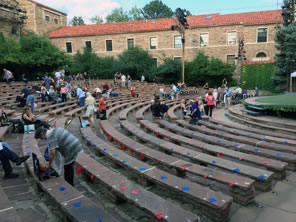
Members of the audience find their seats and nationality flags ahead of the performance of Edward III at Colorado Shakespeare Festival's Mary Rippon Outdoor Theatre. Photo by Eric Minton.
He's sitting across from me at a concrete picnic table in the Colorado Shakespeare Gardens, a shady green space surrounded by the university's orange-stone campus buildings with undulating red-tile roofs. Beds of flowers mentioned in Shakespeare's plays border the lawn. Beside us is Hellems Arts and Sciences Building, a two-wing structure that surrounds the Mary Rippon Outdoor Theatre, a Greek amphitheater-style stone venue built in 1939. The university began staging Shakespeare plays here in the summer of 1944, starting an annual tradition that officially evolved into the Colorado Shakespeare Festival in 1958. My friendship with Rich started when we met after that first Edward III in Chicago and continued as Sarah and I later visited him in Normal, Illinois, where he was serving as artistic director of the Illinois Shakespeare Festival, a position he left to come to the University of Colorado last year. I didn't know he was in the Edward III I'm seeing tonight—it's the only Edward III playing in North America that I know of this year—until he emailed me noting the play on my itinerary.
He, in fact, is serving as “actor manager” for Edward III. The Colorado Shakespeare Festival is staging the play for this one night only under original practices conditions: a troupe of 15 actors without a director or design team (they find their own costumes from the Festival's stores and perform on a bare stage) put on the play with just 20 hours of rehearsal using only cue scripts (their lines, plus a line or two before their parts). The production also abides by such Elizabethan staging principles as direct address to the audience, live music, a prompter for forgotten lines, and universal lighting (the two-hour play begins at 6:30 p.m.). Here's a clue to the staging conditions: under Edward III's “Artistic Team” in the Festival program, the lighting designer and sound designer are both listed as “not yet invented.”
Rich is wearing a t-shirt from the American Shakespeare Center with its slogan, “We do it with the lights on.” “I'm wearing this under my costume tonight,” he says. Rich has directed two productions for the American Shakespeare Center at its Blackfriars Playhouse in Stanton, Virginia: Oscar Wilde's The Importance of Being Earnest and Shakespeare's The Winter's Tale, the latter about to hit the road with the company's touring troupe. Rich has been immersed in Shakespeare's original staging practices championed there. Rich's Blackfriars experience plus having played in Edward III prompted Colorado Shakespeare Festival Producing Artistic Director Timothy Orr to consult him and then ask him to serve as the production's actor-manager. In the program, Rich is listed as director, but he prefers the actor-manager tag and says the role he actually saw for himself in the context of the production was as playwright. He cut the script with input from Dramaturg Hadley Kamminga-Peck—who also serves as prompter and, in one scene, wears cute little furry ears to represent a pony—and inserted specific stage directions for entrances and exits to spend less rehearsal time on blocking. Once in rehearsal, Rich greased the collaboration among the actors while offering assurances to those who were new to the process and utterly frightened by its prospects.
Working from only cue scripts led to some singular character discoveries. Emelie O'Hara had chosen her costume for Queen Philippa without realizing that the queen was pregnant (mentioned by another character but not among her lines). Michael Bouchard had no idea his Sir William Douglas was a Scot. And Benaiah Anderson as Prince Edward, the Black Prince, didn't understand how crows (as in the bird) could be a weapon of war; the Black Prince talks about the role of crows in the battle, but it is the French characters who provide the context of prophecy. These were a-ha! moments as the actors worked through the first half of the play on the first four-hour day of rehearsal and completed the second half of the play the next day. On day three they worked in the music, provided by David Willey on percussion and guitar. Day four was a complete run through (“more of a stumble through,” Rich says). For day five, they got on the stage and worked with costumes for the first time. On this sixth day, they play.
This is the fifth year the Festival has staged an original practices production. The plays not only sell out but do so within days of tickets going on sale. A couple of times the Festival expanded the offering to a second night, but while ticket sales remained strong, second-night performances didn't have the energy (i.e., sense of danger) that one-night-only productions yield, Orr tells me. He and I were talking at this same picnic table yesterday before I attended the Festival's Edwardian-era production of Shakespeare's Love's Labour's Lost. Orr joined the Festival as an actor in 2007, joined its staff as associate producing artistic director in 2011, and stepped up to producing artistic director in 2013. One year after assuming leadership, he inaugurated these original staging practices productions. His enthusiasm for them is obvious in his animated body language that escalates as our conversation turned to the subject. He loves the staging dynamics and metatheater nature of these productions and harbors a desire to see such attributes seep into the Festival's other productions.
Aside from their artistic intents, these one-off productions provide an economical means of expanding the season with a fifth title while providing an opportunity for the Festival to explore more rare works by or associated with Shakespeare. Orr inaugurated the idea with Shakespeare's Henry IV, Part Two, during the same season as a traditionally produced Henry IV, Part One. The next three years, the company mounted the three parts of Henry VI in succession. The company has worked through an evolution of lessons learned, from where to stage the production (it started in the indoor, 400-seat University Theatre before moving to the 1,000-seat Mary Rippon Outdoor Theatre) to cast size (the first production used 25 actors, which Orr likened to Lord of the Flies).
Edward III, written around 1593 and printed in 1596 without a playwright ascribed to it, portrays the king whose many grandchildren would ignite the War of the Roses that Shakespeare had already covered in the Henry VI tetralogy (ending with Richard III, part of this Festival season's repertory). Crediting Shakespeare for at least parts of the play goes back more than 300 years. Technologically driven stylistic studies the past couple of decades have provided coinciding evidence pointing to Shakespeare's hand in several scenes. Whether he was revising an earlier text or collaborating is uncertain, and the identity of the other author is less certain. Thomas Kyd is the favorite (and listed as cowriter in the Colorado Shakespeare Festival program) while Christopher Marlowe and Thomas Nashe are other leading candidates.
People attuned to Shakespeare's verse style (such as actors like Rich) can identify just by listening what scenes are likely from his pen (and generally confirmed in stylistic studies). Most notable is a series of scenes in which King Edward (Scott Coopwood) tries to seduce the Countess of Salisbury (Desiree Mee Jung), the wife of one of his chief officers. One scene centers on Edward enlisting his secretary, Lodwick (O'Hara), to write a sonnet to send the Countess. Edward then tramples all over Lodwick's efforts with his own soaring words of intense passion. Another notable element of the play, whether Shakespeare's or not, is King Edward refusing to rescue Prince Edward, whose army is facing certain annihilation at the hands of French forces and those led by the King of Bohemia. Edward wants his son to learn how to survive such circumstances, and if the prince doesn't, “We have more sons than one to comfort our declining age,” King Edward says. “O, cruel father!” cries one of the lords. But then—spoiler alert—Prince Edward comes running down the theater aisle carrying Bohemia's head in a blood-dripping sack.
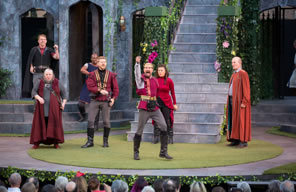
King Edward III (Scott Coopwood, center) triumphs after lifting the Scottish seige of the castle held by the Countess of Salisbury (Desiree Mee Jung, behind Edward). Other members of the English army are, from left, the Earl of Derby (Kevin Rich), Lord Audley (Leslie O'Carroll), Sir Robert of Artois (Betty Hart), Prince Edward (Benaiah Anderson), and the Earl of Warwick (Sam Sandoe), Photo by Jennifer Koskinen/Merritt Portrait Studio, Colorado Shakespeare Festival.
The play is a mostly static thing, full of bombastic speeches with all of the combat taking place offstage. Nevertheless, both the play and its performance succeed on this night. The audience participates by waving red (England) or blue (France) flags and heartily cheering whenever characters of those nations take the stage. A small contingent of green flags for Scotland wave in an isolated area in the front corner of the amphitheater during the play's early scenes. O'Hara's Lodwick briefly misplaces her book, but otherwise the production suffers no obvious gaffes. Several actors call for the prompter's help, but even in that, Marco Robinson in various roles provides some metatheater magic. Instead of shouting “Line” or “Prithee” or, as Leslie O'Carroll has the dying Lord Audley ask, “Line, please,” Robinson calls for his prompt with “what else would lady have me?”
All the performances are solid, but two actors deserve special noting. Coopwood as the title character carries a huge line burden, twice the size of the next largest. Season repertory context is what makes this remarkable: He's also playing the title character of Cyrano de Bergerac, as well as Boyet in Love's Labour's Lost. Jung, playing the Countess of Salisbury, plays the Princess of France in Love's Labour's Lost. Watching that play last night, I appreciated a talent buried under a misdirected portrayal of her character. On this night, that talent pours forth in Jung's performance as the Countess. Would that her Princess of France were more like this Countess of Salisbury.
For all the reasons the Colorado Shakespeare Festival is doing these original practices productions, purity in performance like Jung's makes the most lasting impression.
Thursday, August 9—Howling at the Moon
Sometimes I think of myself as the boy who cried wolf. Then again, back in March, I mistook a coyote for a poodle, and now I'm again hearing it howling from 32,000 feet above the terra.
For the eighth time this year I've departed Dulles International Airport outside Washington, D.C., (a short drive from our home), flying out for a sequence of theater visits. First stop is Round Top, Texas, (via Houston) for a weekend with Shakespeare at Winedale, seeing four titles there but focusing on Arden of Faversham for the Shakespeare Canon Project. Monday I am scheduled to fly from Houston to Chicago for First Folio's original musical production, Shrew'd. After a few days with First Folio, I'm to drive up to Spring Green, Wisconsin, and the venerable American Players Theatre for Measure for Measure. For the seventh time this year, I'm departing from Dulles with trepidation about leaving Sarah alone at home. Yeah, yeah, yeah, I wrote a journal entry like this along this very skyway back on March after I had spent a day with her in the emergency room. Then, I was worried about any lingering effects Sarah might encounter of what was diagnosed as a bout of vertigo. When I returned from that trip, the truth exploded on us as a string of more serious spells leading to the diagnosis that she was suffering from a seizure disorder that also was impacting her cognitive capabilities. We've been managing her condition—trying to find the right combination and dosage of medication and exploring changes to her diet and activities—while, with Sarah's insistence, the Canon Project continues to be my priority.
Last night, her insistence finally met my resistance.
A week ago, on my previous flight out of Dulles, Sarah was enduring her 48-hour EEG, during which she reported no obvious seizures. The machine is supposed to monitor seizure activity even if she doesn't actually experience it, but we've not received the results yet. Our neighbor, who drove her to the clinic to return the device on Friday, reported that she seemed her normal self. Then, she had a seizure Sunday while I was still in Colorado. When I got home Monday morning, she seemed fine as we ran errands together, but I noticed cognitive sluggishness to a degree I'd not seen before. She had another seizure Tuesday, and either it lasted more than the typical four hours or it was followed on by another: Twice she got up and came downstairs but in less than an hour had returned to bed. She got up yesterday morning feeling chipper, and then rapidly fell into a distressed state with the oncoming headache and discombobulation that announces the arrival of a seizure. She stayed in bed the entire day and into the night. I even had to help her take her medicines. Nevertheless, as she headed up to bed even with the initial onset, she told me I was to go on with my trip today as planned.
I didn't respond, but instead called her neurologist and talked to a patient rep. I told her of Sarah's current condition and told her we needed to get the results of the test and an appointment today or at least a phone consult. Stressing urgency, I mentioned I was leaving for a 12-day trip in the morning but could get back for an appointment Monday afternoon. “Can't she get here on her own?” the rep asked, and I thought I heard a feminist edge in her tone. “She has a seizure disorder, she's not allowed to drive,” I replied, hoping she heard a tone of incredulity in my voice. “Oh” was her completely neutral reply. She said she would pass my message on to the doctor. I never heard back.
So, I assessed the degree of urgency for this trip. Winedale's is my only opportunity to see Arden of Faversham, part of the Shakespeare apocrypha, but even I acknowledge that Shakespeare may not have had a hand in it, despite a couple of scenes that sound remarkably like him (and it's a great play). Shrew'd's run ends next Sunday, so this upcoming week is my only opportunity to see it. Another theater closer to home is running The Taming of the Shrew through the following week, after which that play drops off my matrix. American Players Theatre has the last remaining Measure for Measure on my matrix, but it runs through September, and I can squeeze a quick trip in amid my other theater visits that month. With these strong arguments for canceling the trip (except for a thousand dollars' worth of unrefundable reservations and ticket purchases), I studied the contrary position, posited by a friend I had talked with earlier this week when I was mentioning my sense of guilt over leaving Sarah alone so much. “What difference does it make if you're not here?” she asked. It was an observation grounded in a lifestyle we both share as military spouses. Long absences, usually on short notice, by our military husbands and wives were common, and the standard for them getting out of a deployment was high. If I had Sarah's condition while she was in the Air Force, her duty would have called her to leave me alone and without guilt, I'm sure.
It's highly probable that Sarah will not get an appointment with her neurologist this week. We could chalk it up to impersonal medical bureaucracy, but this neurologist has a great reputation in both skills and treatment, and we've been in his office for appointments twice before 7 a.m., and once after 6 p.m. So, I have to trust that he doesn't see a need for urgency. That requires a lot of faith on my part, but Sarah had a similar series of seizure-filled days when we were in San Diego on my Old Globe visit in June. She went on to enjoy a string of several days without incident afterward. That's the nature of this disorder: It will stay at bay for many days and then attack hard and suddenly. My decision, then, is a compromise. I'm heading for Texas to visit with the Winedale program and check Arden of Faversham off my list. Meantime, I or Sarah, if she is able, will continue to work for an appointment with the neurologist for early next week. If I have to, I'll work out a flight home and then either head to Chicago a day late or simply postpone those plays to a later date (and another place, in the case of Shrew).

My lodging in Round Top, Texas. Called The Front Porch, it is a shack (with a 1920s stove on which I cook my own breakfasts) isolated in the middle of Texas cattle country. Photo by Eric Minton.
A later date. I have a nagging feeling we could be running out of later dates, not just in finishing up the Shakespeare Canon Project but in our overall lifestyle, too. Assessing “urgency” requires context. My concern for Sarah and my impatience over her continuing struggles goad me into making what seem like obvious decisions (stay home, care for her, light a fire under the doctor's ass) but may actually be rash in the longer view. What financial flexibility might we lose or psychological issues incur down the line if I don't complete the Canon Project?
I've landed in Houston. Before driving to Round Top, I text Sarah to call me if she is able; she does. She has had a good day (sometimes I wonder if she's allergic to me). She did get in touch with the neurologist's office, and he wants us to make an appointment for five to six weeks hence to give him and his team time to study the EEG test. He sees no need to see her until then. If any trained neurologists reading this wants to take issue with that reply, I welcome your input. I'll take it as his assessment of urgency for Sarah's situation.
So, I made the right call for today. Yet I'm still hearing the call of coyotes on our horizon. I'm being allegorical, of course, though the accompanying photo of my lodging here in Round Top might make you think I'm hearing real coyotes.
Arden of Faversham, Shakespeare at Winedale
Round Top, Texas, August 10
There are no curtain calls at Winedale. The actors leave the stage to honest, often-prolonged applause, sometimes accompanied by hoots and hollas, but they don't return to take a bow. The clapping ends and a buzz replaces it as the patrons leave the theater and encounter the actors outside, some holding trays of cheese and crackers, cookies and brownies. The actors are there to mingle with the audience and talk about the play and their experience in it. This tradition dates to the inaugural 1971 season of Shakespeare at Winedale.
My apology: I'm calling them actors. The official term is students.

Professor James Loehlin, director of Shakespeare at Winedale. Photo by Eric Minton.
Shakespeare at Winedale is a University of Texas (UT) English Department program for students to study William Shakespeare's works through performance. Most of these students are not in acting tracks or planning to become actors. The program's acting acumen covers the spectrum, from monotone performances to over-the-top mugging and a few students showing real stagecraft. But the language? Top-class deliveries all along the line. Under its founder, James “Doc” Ayres, and then for the past 18 years under the direction of UT Regents Professor of English James Loehlin, these students learn not just what Shakespeare wrote but why: to be performed by a company of actors in the staging conditions of his time. Think of it as a college lab in which students dissect the plays to understand how their anatomy functions in their natural environment. To get into the Winedale program, students apply with an essay and then Loehlin interviews the candidates. There are no auditions. Upon selecting the students, Loehlin assigns them their roles in the plays, trying to give them equal line loads across the reportory, though he has an uncanny casting ability fitting student to character.
The students reside in a dormitory on the Winedale Historical Complex, a 225-acre collection of 19th century homes and structures about five miles outside Round Top (population, 90), including a barn that serves as a 200-seat theater. The students undergo physical conditioning and textual studies and make their own costumes. They collaboratively stage a repertory of plays (this summer it's Love's Labour's Lost, Julius Caesar, All's Well That Ends Well, and Arden of Faversham) with guidance from Loehlin and this year's assistant director, Bronwyn Barnwell. She was a student in the program in 2013 and 2014 and this fall will attend the Shakespeare Institute in Stratford-upon-Avon, England. Concluding the performances with no curtain call is in keeping with the spirit of the program, merging historical staging standards with the production's primary purpose as an educational enterprise rather than a show. The social mingling afterward is kind of an impromptu thesis interview.
It is during these gatherings after Arden of Faversham that Natasha Sabour, who plays Alice Arden, hears a common comment about that particular play: “That's not what I was expecting.” We are talking at a picnic table this afternoon near the barn, sitting under the immense branching canopy of a pecan tree sheltering us from the intense central Texas sun and huge out-of-nowhere raindrops. She just graduated from UT with a double major in history and radio, TV, and film and is planning to start graduate studies in film and screenwriting at Loyola Marymount in Los Angeles this fall. Her face wears a puzzled expression pondering the audience reaction. “I'm not sure what they are expecting,” she says, especially as the majority of the audience has never seen the play. This is the first time it's been produced in Winedale's 48-year history, and that's more frequency than at the majority of theaters in this or any land. Perhaps, Sabour posits, people don't expect a true crime drama to be so funny.
I offer my theory. Arden of Faversham had no author ascribed to it when initially recorded and printed in 1592 and reprinted in 1599. Since the 18th century, some scholars have attributed portions of the play to Shakespeare with a still-unidentified collaborator. Because Arden of Faversham was not included in the First Folio, audiences might expect little if any Shakespearean quality in a play that is not in his box set of greatest hits. If Timon of Athens and Henry VIII, known collaborations, are B-sides at best, how good could Arden of Faversham be?
What audiences see, though, is a great play, and I don't use the term great lightly.
The play, based on a true story, is a thrilling yarn. Alice Arden and her lover, Mosby, conspire to kill her husband, Arden, a wealthy merchant and landowner. They are joined in the conspiracy by several other enemies of Arden, but the murder is forestalled through the bumbling efforts of the ruffians hired to do the job. It's not so much a whodunnit but a how-do-they-finally-get-it-done mystery theater with a galaxy of richly rendered characters. Its language is easily accessible to a 21st century audience while at times ascending to the Shakespearean stratosphere. It is a tragedy, true, but with comic situations, including a painting that will supposedly poison a person who merely looks at it, and comic characters, especially the two bragging ruffians, Black Will and Shakebag. At the heart of the play is Alice Arden, so supplely two-faced she could be the prototype for Alexis Carrington Colby. “Oh, how cunningly she can dissemble,” says Mosby, who is nothing but a steward who envisions himself a landed gentleman. Even if Shakespeare did not have a hand in it, Arden of Faversham should become part of the standard dramatic repertory.

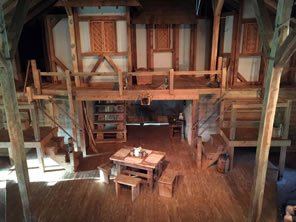
Top, the 19th century barn on the Winedale Historical Complex that serves as the theater for the University of Texas English Department's Shakespeare in performance program. Above, the stage is set with a table and other props for Arden of Faversham; the superstructure of steps and the facade are permanent fixtures. Photos by Eric Minton.
But Shakespeare did have a hand in it. I've seen the play before, and while I loved it and heard Shakespeare in it, I remained skeptical. I'm fully sold now after talking with Loehlin, Sabour, Barnwell, and David Higbee Williams, who plays Black Will. He started coming to Winedale as a child with his parents, participated for 10 years in Winedale's Camp Shakespeare for youth, and then began attending the UT program as a student. Loehlin and Williams both point to similarities of language between Arden of Faversham and Henry VI, Part Two, particularly that used in scenes between Alice and Mosby in the former and Margaret and Suffolk in the latter, some of the most beautiful love lines ever written. Williams also notes how many Shakespeare character prototypes appear in Arden of Faversham, most notably his own, Black Will, whose soldierly braggadocio and innate cowardice cloaked in comic linguistic gymnastics is a forerunner to Falstaff.
Watching Williams as Black Will this night, with his full beard and unkempt soldiers gear, I do see Falstaff—and with his obvious command of the language and great comic presence, I would love to see Williams play Falstaff. Nor is he alone among the stellar performances of this production. Sabour nails the essence of Alice as a character. She's the villain in a play that espouses chauvinistic morality, but she's yet a protofeminist hero in her intelligence, her demand for respectful treatment, and her desire for choice of a better life—plus she's a rom-com ingenue to boot. In other words, she's a thoroughly Shakespearean female. Arden is a mean guy, to be sure: there's a reason so many people want to kill him. Yet, Michael Knapp engenders empathy in his character (the conspirators are just as greedy as he is), and he truly loves his wife; he simply does not have a clue as to how to let empathy pierce through his entrepreneurial soul. For the romantic soul, you have to go with Asa Johnson's Mosby, though he also comes off as a snake in the grass (I'm in the land of copperheads, you know). Sultan Abboushi pulls off a comic tour de force as Michael, the stupid servant. Joining in the climactic moment of the murder(s) itself are Ly Poe as Black Will's more vicious companion, Shakebag, and Elizabeth Roach as Mosby's sister, Susan. These actors form a tight ensemble to pull off a scene of mayhem that stands as a tragicomical masterpiece in which Arden simply won't die.
Oh, wait: these are not actors. These are students, and this is their learning laboratory. Yet here I just enjoyed one of the great theatrical experiences of my life, certainly a highlight of this year's journey through the Shakespeare canon, while learning just why and how Arden of Faversham belongs in that canon. That's not what I was expecting.
Saturday, August 11—You're Welcome
A mist hovers over the field (mystical, really) down the slope from the tin-sided shack that is my lodging this weekend in central Texas. This place is at the end of a beaten path, which turns off from a dirt track, which turns off from a gravel road, which turns off from a partially paved road, which turns off from the four-lane US-290 Highway a dozen or more miles drive from here.
The name of this shack is The Front Porch, and Carolyn Montgomery, who lives beyond a stand of nearby trees, rents it as a bed and breakfast, though the images that phrase evokes don't match this experience. Indoors, it's your typical cabin, with a spacious living room, a full kitchen, a bedroom, and a bathroom with a claw-foot tub. The kitchen has a 1920s stove on which I fix my own breakfast, lighting the gas burners with matches supplied. Montgomery has stocked the refrigerator with fresh eggs from a neighbor's farm, Jimmy Dean sausage, fresh Texas-size peaches, butter from a local dairy, and homemade plum jelly. Bugs on the premises are of a size and variety that makes me think of 1950s horror films, and I shower in the morning in water that smells like rotten eggs.

Carolyn Montgomery in front of The Front Porch. Below, Maxine Lain with her Ten Commandments. Bottom, Shakespeare has a home in Round Top, Texas. Photos by Eric Minton.
It's well water bearing the scents of the sulfur and lignite in this earth, and Montgomery tells me it used to smell worse before she added filtering to the well a few years ago. We are chatting this morning on The Front Porch's front porch, enjoying the one hour of tolerable temperatures on this hot August day. Montgomery is 88 years old, and to call her “spry” is to belittle her energy and physical wherewithal. She grew up poor in Arizona, graduated from Arizona State, and embarked on a career as a medical technician in a Houston hospital. She always wanted a house in the country, discovered this property near Burton some 90 miles west of Houston, and purchased the land in 1972. She took a two-week home-building course and then set to constructing her spacious two-story home by herself (she had help erecting the center frame, she says). Except for two bedrooms and a bathroom tucked behind the wall at the back, the house is one large open room under a pitched roof. The kitchen, dining, and living areas surround a central fireplace, and a loft hangs over one third of the space above. Montgomery lives alone. Always has.
As she shows me her home, I notice up in the loft a ping-pong table and a pool table. She says a shoulder injury has left her incapable of playing table tennis anymore, but she still plays pool and teaches billiards to residents at a retirement center. She says that since she retired from her hospital job in 1996, she's been busier than ever with her clubs, social networks, and volunteering. Not until she moved here permanently in 2005 did she discover Shakespeare at Winedale, the University of Texas (UT) Department of English program for students studying Shakespeare in Performance. She became an avid supporter. “I've always loved English and words and word games; I do a crossword puzzle every day—not hard ones.” Before she goes to a Winedale production, she looks up the play's famous lines and checks them off as she hears them during performances. I learn over the course of this weekend that Winedale parents, patrons, and alumni are regular residents at The Front Porch.
Montgomery's wifi doesn't reach The Front Porch, so I make the 20-minute drive into Round Top to Espressions Coffee and Art. There I can tap into the town's free public wifi (it requires identifying my gender before I can sign on). Espression's owner, Carolyn McNellie, yesterday noted my Shakespeare at Winedale hat, and we immediately engaged in Shakespeare talk. Like so many other business operators here, she is a big supporter of the program. One evening when I order a candied jalapeño and pepperoni pizza at the Stone Cellar & Round Top Dance Hall, the 20-something woman behind the counter asks me what play I'd just seen. “Julius Caesar,” I reply, surprised because I am wearing nothing bearing the Shakespeare at Winedale logo. “My favorite play,” the woman says. I know I don't look like I'm from around here, but perhaps to the locals, Shakespeare pilgrims wear a certain obviousness about them.
Right in the heart of the community is Henkel Square Market, a collection of old pioneer prairie structures housing boutiques, offices, a pie shop, a tiny white clapboard chapel, and Henkel Hall, a large event space. Round Top is an artsy community, one that puts on a large annual antiques fair and hosts the Round Top Festival Institute featuring classical music. Shakespeare at Winedale's director, James Loehlin, meets me at Espressions and guides me to the house of Maxine Lain down various gravel roads and dirt tracks to a gorgeous home. On the way we pass the recently completed house of Rick Perry, former Texas governor and current U.S. Secretary of Energy. “He's very approachable,” Lain says of her new neighbor: “And I'm a Democrat and I can say that.” I notice she makes no effort to determine my political leanings before making this declaration.
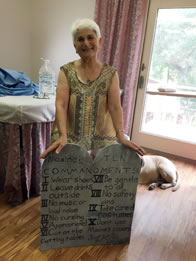 We are sitting in a loft room surrounded by sewing machines. A miniature dachshund named Penny and a black mouth cur named Amber lie contentedly at my feet. Tudor the cat stalks my lap already occupied by my notepad and pen. Lain, 78, was a lieutenant in the U.S. Marine Corps when she met her husband, Bob, also a Marine, in 1962. They married the next year. When she got pregnant with their first son, in those days she had to leave the service, and with her last Marine Corps paycheck she bought a used sewing machine and taught herself to sew. She was pregnant with their second son when her husband went to Vietnam and lost both legs in combat in January 1967. He became a professor, she pursued various sewing ventures, and in 2000 they bought this property. She designed the house herself.
We are sitting in a loft room surrounded by sewing machines. A miniature dachshund named Penny and a black mouth cur named Amber lie contentedly at my feet. Tudor the cat stalks my lap already occupied by my notepad and pen. Lain, 78, was a lieutenant in the U.S. Marine Corps when she met her husband, Bob, also a Marine, in 1962. They married the next year. When she got pregnant with their first son, in those days she had to leave the service, and with her last Marine Corps paycheck she bought a used sewing machine and taught herself to sew. She was pregnant with their second son when her husband went to Vietnam and lost both legs in combat in January 1967. He became a professor, she pursued various sewing ventures, and in 2000 they bought this property. She designed the house herself.
After she and her husband moved here, one of their new neighbors, noting her sewing skills, told her that Shakespeare at Winedale needed help in its sewing department. The students are required to make their own costumes, but most don't know how to sew. “I got a C in Shakespeare in college,” Lain says. “I had a terrible teacher.” Nevertheless, she called on Loehlin and became the program's costume supervisor and an instant legend for the tough love she used to bring order to the chaotic conditions of the sewing room. Students in the 2016 season built for her a facsimile of stone tablets bearing “Maxine's Ten Commandments,” including VI “Cut at the cutting tables,” VIII “No safety pins,” and X “Don't use Maxine's scissors.”
I next head to Winedale itself, about five miles outside of Round Top, to meet the man everyone just calls “Doc.” He is Jim Ayres, the UT professor who founded Shakespeare at Winedale in 1970. He also was a pioneer in the scholarship of studying William Shakespeare's texts through the perspective of the playwright composing plays to be staged on a bare platform by a company of actors before an audience representing all strata of society. The best means of fully understanding the text in that way, Doc figured, was to perform the plays in the manner Shakespeare's company did. When he started teaching such methodology in 1964, he met resistance from his English Department colleagues who couldn't fathom classrooms without chairs and desks.
In October 1970 he was attending a retirement party at UT's newly opened Winedale complex. In the reception line was famous Texas philanthropist Ima Hogg, who asked everyone as she shook his or her hand, “What is your name and what do you do?” “I told her I taught Shakespeare,” Doc says, “And she said, ‘Well, I want you to go in that barn over there and take a look at it.'” He did, and though it was an empty, open structure, he immediately envisioned a public theater for his students. The next month he brought his class to perform Much Ado About Nothing. Now the barn has a three-level stage with a Tudor façade built into the structure, but as Doc and I sit on two of the 200 tightly arrayed folding chairs inside the barn, I wonder how he could have seen a theater here. I conclude he had a vision on the order of those Joan of Arc experienced.
This barn does have something mystical about it. Bronwyn Barnwell was a student here in 2013 and 2014 and is this summer season's assistant director. She was born in Houston, grew up in Santa Fe, New Mexico, attended Bucknell University in Pennsylvania, and lived a couple of years in New York City. “The only place I've ever wanted to come back to was Winedale,” she says, and lists three reasons why. One, Shakespeare: “Saying those words every day.” Two, “This barn: It's the most magical and special place.” Three, Loehlin: “He is just an incredible leader of this place and truly the kindest man ever.”
Barnwell is not alone in her affection for the Winedale experience, given the number of program alumni attending the shows this weekend. One of them is Bob Jones, a Winedale student in 2004–2005 (his Hamlet is legendary here), an assistant director in 2007–2008 before embarking on an acting career, and returning as assistant director in 2013. He's working on his doctorate in Shakespeare at UT and assists with the spring class at Winedale. The 37-year-old continues both his studies and work as he deals with a combination of renal failure and an infection that led to the amputation of one leg while he awaits a kidney transplant. His arrival today prompts an outpouring of affection from staff and other alumni.
When I finally see him alone, I greet him, but Winedale is not the initial subject of our conversation. Jones holds a special place in my own personal Shakespeareances as “Somerset on a stick.”In Henry VI, Part Two, at the American Shakespeare Center's Blackfriars Playhouse, in Staunton, Virginia, Jones and Benjamin Curns, who was playing York's son, Richard (two plays later the title character of Richard III), worked out a stage fight in which Curns stabbed Jones in the belly with his sword, lifting him high in the air and flipping him to the ground. So thrilling was the moment, applause and even high-fives erupted among audiences. It was Jones' idea to take advantage of their size differential, Curns with the physic of a professional wrestler, Jones almost elfin in stature and grace.
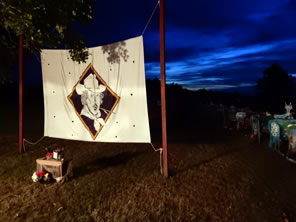 He credits his Winedale experience for getting him the American Shakespeare Center gig, and he can compare working in both the barn at Winedale and the Blackfriars, a re-creation of Shakespeare's indoor theater that so many actors and visitors laud as one of the best play spaces in the world. Jones settles into a long, thoughtful pause, gives a litany of restrictive staging conditions in the barn, and then moves to the Winedale experience itself before finding a baseball allegory. The Blackfriars is like Camden Yards, he says, Baltimore's beautiful, retro ballpark; Winedale's barn is Boston's Fenway Park, a ballpark largely unchanged since it was opened in 1912. “It feels used, it feels warm, and there's a tradition there, and you are now part of that,” he says. “And at the same time, anything goes. It can be very historical and very innovative.”
He credits his Winedale experience for getting him the American Shakespeare Center gig, and he can compare working in both the barn at Winedale and the Blackfriars, a re-creation of Shakespeare's indoor theater that so many actors and visitors laud as one of the best play spaces in the world. Jones settles into a long, thoughtful pause, gives a litany of restrictive staging conditions in the barn, and then moves to the Winedale experience itself before finding a baseball allegory. The Blackfriars is like Camden Yards, he says, Baltimore's beautiful, retro ballpark; Winedale's barn is Boston's Fenway Park, a ballpark largely unchanged since it was opened in 1912. “It feels used, it feels warm, and there's a tradition there, and you are now part of that,” he says. “And at the same time, anything goes. It can be very historical and very innovative.”
Shakespeare at Winedale's reputation in Shakespeare circles is such that I put it on my desired list when I launched the Shakespeare Canon Project, and Arden of Faversham secured its place on my itinerary. I didn't know what to expect, but my experience here exceeds anything I could have imagined, including the productions that these students (only a couple of whom are planning to pursue acting careers) collaboratively stage. This day's performances of Love's Labour's Lost in the afternoon tops, and All's Well That Ends Well this evening matches, professional productions I've seen this year.
Maybe it's the combination of Texas spirit, Round Top generosity, the karma of the barn, and Shakespeare performed in its purest form, but Winedale is a site every lover of Shakespeare should make a pilgrimage to. And return again.
Tuesday, August 14—A True Tragicomedy
I'm in Chicago. I'm in the land of baseball Cubs fans. And Cub fans, like David Rice, executive director of First Folio Theatre, are still sporting glazed-eyes smiles two days after a miracle moment at Wrigley Field.
It's a universal joy for any baseball fan. As a kid playing baseball or softball or Wiffle ball, even, playing a game or just hitting balls to friends, I, like so many of my peers, would pretend I was at bat with the bases loaded and my team down three runs with two outs in the bottom of the ninth. We'd set this scenario out loud: “He swings, and it's a looooong fly ball!!! And it's a grand slam! HHHHAAAAAAAAHHH.” That prolonged exhalation was our sound effect for the crowd going crazy. That the ball we hit traveled no more than 20 feet didn't diminish the dream scene in our heads.
David Bote stepped to the plate in such a scenario on Sunday. The Cubs had been held scoreless for eight innings and were down 3-0 in the bottom of the ninth with two outs. Bote had two strikes on him when he swung and launched “a looooong fly ball!” that actually flew long enough to clear the center field fence for the ultimate of grand slams, a walk-off in which he, the fourth runner to touch home plate, was the winning run. He didn't need to make a faux-fans sound either: Wrigley Field went berserk, including Bote's teammates as they leaped their way screaming onto the field to greet him at home plate. What made it all the more special was that Bote is a journeyman minor leaguer who almost quit baseball two years ago. He's with the Major League club now filling in for the injured Kris Bryant, the Cubs' best player. Though this two-out, two-strike, three-runs-down grand slam scenario has been accomplished millions of times in the minds of children of all ages, in reality it has happened only a dozen times in Major League Baseball over the past several decades. With the Cubs clinging to a precarious lead in the National League Central Division, this improbable come-from-behind victory set off a celebration that some around here likened to the Cubs finally winning the World Series three years ago.
After I landed in Chicago yesterday (my trip continues—Sarah is doing much better and making headway with her neurologist), I saw a replay of the home run: the Chicago players erupting from the dugout in whoops of ecstasy, the fans going ape excrement, Bote flapping his arms as he hopped his way to home plate in pure euphoria. Watching this, one can't help feeling a tug at the heart of what such ultimate joy can be, even if you're not a baseball fan. But I belong to a certain subset of baseball fans feeling not a tug of the heart but a heart breaking. Bote hit his rare grand slam against the Nationals, and it effectively gutted Washington's hope of making the playoffs. Oh, yes, we still have a mathematical chance to win the Eastern Division, and once in the playoffs anything is possible. But I know this sport well enough to know those moments that define a season, and this was a definer for both the Cubs and, more importantly for me, my Nationals.
This is so Shakespearean in its completeness of portraying the human spirit in juxtaposition of extremes. Amid all the elation in Wrigley Field on Sunday, nine men dejectedly strolled off the diamond. Meanwhile, jaws dropped among Nationals fans watching on TV, listening to the radio, or, as I was doing, following the digital “Gameday” tracker on my iPhone. The diagram on my phone's screen showed two outs, two strikes, and all bases filled, then it suddenly switched to a 4-3 final score. I stared in disbelief. Only when I saw the replay the next night did the depths of my despair hit home, as it were.
In the couple of days since I experienced that emotional-intellectual abyss, I've accepted that what I originally thought would be this Canon Project's subplot, seeing the Nationals in the World Series, has been irrevocably replaced by a new subplot, that of Sarah's neurological disorder—which, ironically, first manifested on this baseball season's Opening Day. I'll still keep my October schedule as clear as I can in case the Nationals yet make the playoffs, but, really, I know that there will be no postseason baseball for us this year.
Meantime, I'm having to politely put up with that Cub fan smirk—I'm sorry, I meant to say glazed-eye smile.
Thursday, August 16—When it Rains
I factored in geographical reality. I factored in airline delays. I factored in my stamina. I factored in the probability that a play might not be produced in 2018. I even factored in the possibility of some family crisis, so I was able to adjust when Sarah's neurological condition erupted. Of all the contentions lying in the way of my seeing 42 Shakespeare plays at 42 different theaters in one year, the one thing I never considered was weather.
Doh! Shakespeare is an outdoor sport. Still, rain didn't become an issue until this week. And then Mother Nature poured it on.

The Mayslake Peabody Estate in Oak Brook, Illinois, where I have not yet seen First Folio's production of Shrew'd. Photo by Eric Minton.
First Folio Theatre's musical Shrew'd, my selection for The Taming of the Shrew, was rained out Wednesday evening. When I can I schedule at least two performances of each Canon Project production on each visit, a standard I hitherto established for quality-control considerations, not weather. So, I already had tickets to see Shrew'd this upcoming Sunday, too. That's the last performance of its run, so if it gets cancelled—and rain is in the forecast for the weekend—I'll be scrambling. I return home on Monday, and with a visit to New York City coming up later in the week to see the National Asian American Theatre Company's two-part conflation of Henry VI, I would have to hit the road Tuesday for the Hudson Valley Shakespeare Festival in Cold Spring, New York. Their Taming of the Shrew, in the final week of its run, is my last opportunity to see the play in 2018.
Today, driving up to Spring Green, Wisconsin, for the American Players Theatre's production of Shakespeare's Measure for Measure, I run into a heavy rainstorm. As I walk into my visit with Artistic Director Brenda DeVita, talk of potential cancellation of that evening's show circulates the building. “We play in the rain,” DeVita tells me, but they cancel when conditions get too dangerous for the actors. That puts me in another quandary: when I left home a week ago, the Midwest portion of this trip was so up in the air because of Sarah's situation I didn't pack my outdoor theater gear. I purchase a flimsy rain poncho at the theater's gift shop and put it on before I take my seat during a lull in the storm. The rain resumes a few scenes into the play, and a drizzle continues through the rest of the show. The cast completes the play, and I stay dry. This is a preview performance. The production officially opens Saturday, and, adhering to theater critic protocol, that performance will be my official viewing for reviewing the production and for the Canon Project profile. If that one gets rained out, I will use this night's performance to check off Measure for Measure on the Canon Project itinerary.
Weathering a storm of a different nature, however, is dominating my thoughts tonight. On my drive into Wisconsin, I talk with Sarah on the phone. She had another seizure Sunday, but has not had any since, and on Tuesday she heard from her neurologist who altered the dosage of her medication and made an appointment for late October. Yes, that's two months from now, but I trust his lack of urgency, and I'm seeing divination in the math as the appointment comes just ahead of my last trip for the Canon Project. With what I experience in our conversation today, I've come up with a plan for that 60-day interval. A full 30 minutes of our talk is spent on trying to help Sarah find an article edit she did and then lost on my main office computer. As I play phone technical support, I realize that she simply had forgotten how to download an attachment from an email: whatever editing she had done was lost, and only after I get home will I be able to trace the rabbit hole she sent the file down. Sarah is not stupid or technology impaired. She has been doing this basic computer task since the dawn of the Internet age, and, being an Air Force colonel and a Defense Department researcher and analyst since her retirement, she is intimately familiar with computer systems. She either had a memory breakdown or a brain cramp in the way of seizure activity. Sarah this week has been doing research on intellectual seizures (which may be adult epilepsy), and she's discovered the extent of cognitive disability it can cause. This finding was a key moment for her in that she realized and, more importantly, accepted what I had been seeing all this time. And the condition seems to be worsening.
So, this 60-day period until her next neurology appointment during which I'll complete my Canon Project travels will be a good opportunity for her to focus on learning how to live and work with her condition as the doctor works through medication dosages. This will mean her taking a sabbatical from work and using the Shakespeare Canon Project as her therapy clinic and laboratory. She'll become my assistant (earning the same salary as me and my copy editor—$0.00) and accompany me on all my forthcoming trips. Together we can monitor and chart seizures and cognitive skills vis a vis her diet and activity as well as her medication. We'll also work out strategies of accommodation with the goal of making her fully employable again. When next we see her neurologist, we'll be armed with what we know and can do, and we'll know what we don't know and can't accomplish on our own, requiring professional attention and therapy. My hope is that she can go back to work as I dive into writing the Canon Project book.
My faith is the more determinant element, however. This is a financially risky strategy. Though she is receiving her Air Force retirement pay and I have resumed taking on freelance writing assignments, we are losing two-thirds of our income while facing mounting Canon Project travel expenses and medical bills and paying off major home repairs we made last winter. Still, I'm maintaining my strong faith in this project, in the omens that sealed my decision to do it, and in the affection and support both of us have received on this year's journey.
I've settled on this strategy by the time I reach American Players Theatre, and sitting today in the office of Sara Young, the company's director of communications, I see this pinned to a bulletin board above her desk: “People who wonder whether the glass is half empty or half full miss the point. The glass is refillable.”
Friday, August 17—Somewhere Nowhere
The GPS on my iPhone is stretched to its limits. I've been driving on two-lane highways for 40 minutes since I left the western edge of Madison, Wisconsin, passing storybook farms and stands of trees. I have yet to reach Spring Green (population, 1,628), the mailing address for American Players Theatre, when my GPS and a highway sign direct me onto a county road. I continue through dense woods until I reach Golf Course Road. Architect Frank Lloyd Wright built his home, Taliesin, a mile or so farther along the county road from this point, but other than the House on the Rock Golf Course, no tourist-centric community evolved around Taliesin. I'm in the middle of Wisconsin nowhere where trees outnumber humans perhaps a thousand to one. I turn onto Golf Course Road and drive past the course to a dirt parking lot. I've arrived.

The entrance to the parking lot of American Players Theatre outside Spring Green, Wisconsin, is on the end of the first stage of your trip. You still have to walk a path to the theater (below). Photos by Eric Minton.
I still have some walking to do. My ultimate destination is a 425-step hike up a dirt path past picnic tables grouped like subdivisions on the wooded heights overlooking the parking lot. Into the woods I climb, coming upon a prairie meadow at the top of which is the aptly named Hill Theatre. If you've never been here, you might be imagining a cozy little outdoor stage, perhaps inside a stockade or a tent, surrounded by benches or merely lawn. You'd have the outdoor aspect correct.
This 1,089-seat venue blends Greek theater geometry, rustic barn-board aesthetics, and modern seats and amenities in a Northwoods setting. During this night's production of William Shakespeare's As You Like It, the back walls of the set open for the play's second half, and Orlando walks toward the stage attaching his poetry to the trees that naturally inhabit the landscape. Behind the scenes hums stagecraft. The 110-acre property has a full array of modern dressing rooms, rehearsal halls, a two-story business office, and costume, set, scene, and prop shops and storage.
 I dare say, however, that many people reading this have been here. American Players Theatre is one of the venerable Shakespearean-centric venues of North America, a rival in reputation and quality to the big guys of New York and Chicago and the Bard folk of Stratford and Ashland. Which begs the question: Why is it here? Just a week ago I was visiting Shakespeare at Winedale in the middle of Texas nowhere, but that locale fits that program's monastic intents, giving students an isolated place to study Shakespeare; their performing four plays to audiences in a 200-seat barn over four weeks is gravy. American Players Theatre's meat and potatoes is selling 1,089 seats—and 201 seats in its indoor theater—for nine plays over the course of a six-month season. “Approximately 110,000 patrons walk the paths to our theaters every year,” says a company press release.
I dare say, however, that many people reading this have been here. American Players Theatre is one of the venerable Shakespearean-centric venues of North America, a rival in reputation and quality to the big guys of New York and Chicago and the Bard folk of Stratford and Ashland. Which begs the question: Why is it here? Just a week ago I was visiting Shakespeare at Winedale in the middle of Texas nowhere, but that locale fits that program's monastic intents, giving students an isolated place to study Shakespeare; their performing four plays to audiences in a 200-seat barn over four weeks is gravy. American Players Theatre's meat and potatoes is selling 1,089 seats—and 201 seats in its indoor theater—for nine plays over the course of a six-month season. “Approximately 110,000 patrons walk the paths to our theaters every year,” says a company press release.
“The geography of this place is the genius of this place,” says Brenda DeVita, the company's artistic director. “You're self-selecting when you come to work here, you're self-selecting when you come to see the plays here. So there tends to be an energy and a commitment inside the humans who venture here.” Randall Duk Kim, the company's first artistic director, along with Anne Occhiogrosso and Charles Bright founded American Players Theatre on this site in 1980. "Mad genius," DeVita calls their choice. “In retrospect it was so brilliant because it is a place that can feel isolating, but what it ends up being is a place that creates natural community.” She is talking primarily of the theater artists, but it's an accurate assessment of the audience, too. Cheerful greetings crisscross the parking lot as people arrive for this evening's performances. The picnic areas fill up with multi- or extended-family banquets. As DeVita notes, coming here requires strategic planning, even if you are not bringing your own preshow food and drink. Rain clouds still hang over us today; tonight it might rain, it might not, we might be sweltering, we might need sweatering. Regulars prepare for all possibilities. DeVita likens American Players Theatre patrons to Green Bay Packer fans, with the same bear-it-all stamina and an intensity of devotion to the players.
A core company of a dozen actors anchor an ensemble of 38–45 artists and a total seasonal company of about 200 people. Many follow the example of Jim DeVita, who was building a successful theater career when he first played here 25 years ago. After that season, he told his wife, Brenda, who was then an actor, that here is where he wanted to stay, and he has. She stayed with him, taking a job as company manager in 1995, became casting director (utilizing the network of actor friends she and Jim had already developed), and was promoted to associate artistic director in 2004. David Frank, who had been artistic director since 1991, was her mentor, and when he retired in 2014, she was named to replace him. “No one in theater is going to get rich,” Brenda DeVita says. “Many think they might get famous if they're in the theater. But you're not getting rich or famous here. You are working on plays, and you are honing your craft, and you are telling stories, and there's very little to distract you from those things.”
My Shakespeare Canon purpose for visiting American Players Theatre is Measure for Measure, and while I saw a preview performance last night in the rain (nobody left), tomorrow's opening night will be its official entry for this project. Today, I meet with the three centerpiece actors of the production: Melisa Pereyra (in her sixth season here) playing Isabel, Marcus Truschinski (15 seasons here) playing Angelo, and James Ridge (21 seasons) playing the Duke. The general topic of our conversation is the play's acute relevance to America in 2018, but much of the discussion is grounded in the function of the play's text as it guides their characters. All three repeatedly emphasize the role of voice and text work at the theater.
After my interview with the actors, Sean Sobecki and Amy Mueller take me on a tour of the premises. We start with the infrastructure upgrades of an $8 million renovation project two years ago, such as the new trap room below the stage and a neighboring building housing new dressing rooms and green room. We stroll through the various craft shops similar to those I've seen in countless theaters and pause longest in “The Vox Box,” the room where the voice training takes place, because I've already heard so much about its function at this theater. It looks more like a doctor's office with anatomical diagrams not just of the vocal system but the whole body. I get the need for diagrams of the abdominal muscles, where register is found and projection begins, but what the skeleton diagram has to do with voice work I can't imagine. On the door is taped a slogan, “Pens are mightier than swords, but nothing conquers vocal cords,” and in the hallway are four benches of various styles, obviously former stage props. I visualize six or so actors patiently sitting here, waiting for their session or maybe a quick consult with Director of Voice and Text Sara Becker or her colleagues in the company (Susan Sweeney, Eva Breneman, Jan Gist, Adrianne Moore, and Rosie Ward). American Players Theatre actors not only deliver Shakespeare's text with accessible clarity, they accomplish the lost art of projection. Productions here don't use microphones, and in both plays I attend up on the hill, the action stretches to the outer boundaries of the theater, from the top of the aisles to the wings on either side of the audience. True, the founders selected this specific site for the theater because of its natural acoustic qualities, but the crystal-clear line readings from all directions are perfected craftsmanship.
This is not my first time here. In 1994, we drove up from our home in Dayton, Ohio, where Sarah was stationed at Wright-Patterson Air Force Base at the time, to see, in order, Hamlet and Twelfth Night. With us were my two sons, Jonathan, 7, and Ian, 5, getting their first-ever experience with live Shakespeare. Yep, we started them with Hamlet. Ian went on to do a memorable performance of the play a week or so later in a playground's monkey bars near our home, reciting lines (or a close proximity of the lines) to himself and to the astonishment of other kids' mothers. As for Jonathan, his experience here convinced him that he wanted to become an actor. When he landed his first Shakespearean role in New York six years ago playing the Officer in The Comedy of Errors for Hudson Warehouse at the Soldiers and Sailors Memorial in Riverside Park, the factor that excited him most was that it was outdoors. It was the way he first experienced Shakespeare.
Rather than whining about the drive into nowhere Wisconsin, these two kids had life-changing Shakespeareances in this theater on the hill. That's self-selecting.
Measure for Measure, American Players Theatre
Hill Theatre, Spring Green, Wisconsin, August 18
Three core company members of American Players Theatre in Spring Green, Wisconsin, sit at a conference table in the theater's offices to talk about the contemporary dramedy they are about to open this weekend. Melisa Pereyra plays Isabella, a novice nun who pleads for her brother's life to the despotic ruler who has sentenced him to death for having premarital sex. Marcus Truschinski plays that despotic ruler, Angelo, wearing an ultramoral veneer as he demands that Isabella have sex with him in exchange for her brother's life (even when she relents—or so he thinks—Angelo has her brother killed—or so he thinks). James Ridge plays the Duke who supposedly leaves on a sabbatical and names Angelo to rule in his place but actually stays in the city, disguised as a monk, to observe Angelo's governance.
This contemporary dramedy is William Shakespeare's Measure for Measure written around 1604.
"I read this play this winter—it had been a long time since I'd seen it," Ridge says, "so being reintroduced to it was like, holy cow, are you kidding me? Without putting anything on this play, it speaks directly into 2018. That's miraculous!" Truschinski picks up Ridge's train of thought. "I'd never seen it before," he says. "That's why it felt like working on a new play. It's like, wow! we have this amazing language, and we're working on a new, contemporary play.” Which is how Risa Brainin directs this production, in modern dress on a simple stage with performances that highlight the play's original language. No single portrayals directly resemble any particular 2018 newsmakers, but reactions in the audience on opening night illustrate how Shakespeare doesn't need any visual cues to make the connections:
- As he prepares to depart in the opening scene, the Duke says, “I love the people, but do not like to stage me to their eyes: Though it do well, I do not relish well their loud applause and Aves vehement; nor do I think the man of safe discretion that does affect it.” The theater audience applauds.
- After Angelo has made his sexual demand of Isabella, she threatens to expose him. “Who will believe thee, Isabel?” he replies. “My unsoil'd name, the austereness of my life, my vouch against you, and my place i' the state, will so your accusation overweigh, that you shall stifle in your own report and smell of calumny.” As Truschinski speaks this in a matter-of-fact tone, a disturbed murmur ripples through the audience.
- The disguised Duke says upon discovering Angelo's true dimensions, “O, what may man within him hide, though angel on the outward side!” Another murmur spreads through the audience.
- Angelo, pondering his precarious state, says, “When once our grace we have forgot, nothing goes right,” eliciting a chuckle from the audience.
- In the climactic scene of the Duke's homecoming when Isabella publicly accuses Angelo of being a murderer, an adulterous thief, and a virgin-violator, the Duke replies that her accusation is "ten times strange." "Nay, it is ten times true,” she replies, “for truth is truth to th'end of reck'ning." This doesn't induce any particular response in the audience because this performance comes the night before Rudy Giuliani, serving as President Trump's lawyer, proclaims during a live broadcast that “truth isn't truth.”
Measure for Measure has been one of my favorite Shakespeare plays from the moment I read it and saw a 1978 Royal Shakespeare Company production starring Michael Pennington as a genial Duke and Jonathan Pryce as an uptight evil Angelo. I've seen 13 more productions since. Taken together, they track four decades of sociopolitical change: the Duke and Angelo mirroring the moral biases of the Margaret Thatcher government, the Duke as a dangerous despot equal to Angelo, the Duke as a bumbling man-child straight out of a Judd Apatow movie, the Duke and his government spying on and intruding in private lives, the Duke as a puppeteer and ultimate abuser of Isabella. Yet, the play has never seemed to gain traction with the general public. Many audiences and critics find some of the plot points outdated, such as a man being executed for having consensual sex with a woman he is about to marry, and Isabella and Marianna, Angelo's former betrothed, entrapping Angelo with a bed trick under the Duke's instruction—while he's disguised as a monk, no less. The complaint I've heard so often in talkbacks and discussions—and usually from women—is that a modern Isabella would never choose her virginity over her brother's life.
That last no longer seems such an anachronism. These days, Angelo's assault carries the full burden of guilt, which means that we as a society might be catching up with Shakespeare's understanding of a woman's right to own her body. For Isabella, virginity is a religious ethic and thus a personal choice. Pereyra, a native of Buenos Aires, Argentina, who grew up in a Mormon household, gets that. "You really need to look at the way that religion affects a person's psychology," she says. “In my Latino community, that is a huge thing, religion, and you don't give away your virginity. That is put into the psyche of little girls all around the world.” Isabella herself tells Claudio that she would give up her life to save his, but she will not live in eternal damnation.
Brainin directed Measure for Measure in 2007 for the Idaho Shakespeare Festival. During that production's run, Idaho's U.S. Senator Larry Craig, a vociferous opponent of gay rights, was arrested on charges of lewd conduct in a men's restroom at the Minneapolis–St. Paul International Airport. The hypocrisy Shakespeare depicts in the play hewed to the headlines of that day. As Brainin was prepping this American Players Theatre production, Measure for Measure again landed with uncanny relevance as men with "unsoil'd name" leading "austere" lives, such as Bill Cosby, Minnesota's U.S. Senator Al Franken, and Matt Lauer, were coming to a reckoning in the #MeToo movement.
For Brainin, though, the play's timeless lesson is one of good-versus-bad governance. "This is a play that's all about what makes a great leader," she says. This morning, in the same conference room where I met with her actors yesterday, Brainin has carved out an hour of her opening day schedule to talk about a work she obviously admires. The play opens with one example of bad leadership, a Duke who shuns contact with his people and fails to fully understand the ramifications of his laws. His is head-in-the-sand governance, Brainin says. He's followed by an example of bad leadership at the other extreme, a strict moralist who abuses his power. Brainin sees America caught up in a combination of these governing extremes.
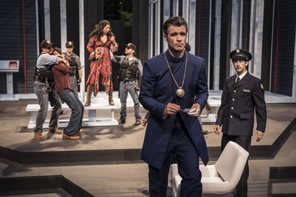
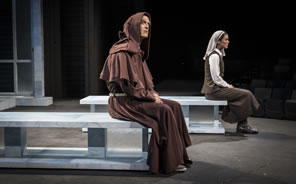
Top, agents arrest Claudio (Roberto Tolentino) and Juliet (Cher Desiree Álvarez) at the command of Angelo (Marcus Truschinski, front) as the Provost (Alejandro Cordoba, right) looks on in the American Players Theatre's production of William Shakespeare's Measure for Measure. Above, the Duke (James Ridge) and Isabella (Melisa Pereyra) contemplate their course. Photos by Liz Lauren, American Players Theatre.
While she doesn't peg individual characters to current newsmakers, she does interpolate action into the text as visual echoes of current headlines. With Pereyra already slated to play Isabella, Brainin decided to cast Latinos as Isabella's brother, Claudio (Roberto Tolentino), and his pregnant fiancée, Juliet (Cher Desiree Álvarez). Claudio's arrest is presented on stage, as baton-wielding security forces wearing casual shirts, jeans, and bulletproof vests —the visual connection with ICE is unmistakable—aggressively pull the couple apart. Claudio is put on display before being taken to jail; Juliet and her about-to-be-born infant are to be "disposed…to some fitter place, and that with speed."
Despite such headline–mirror images surrounding Angelo's governance, Brainin says this play is the Duke's story, learning the qualities of leadership through his exposure to tyranny and arbitrary bureaucracy and to redemption and forgiveness. It's his arc that takes us to one of the most enigmatic endings in the Shakespeare canon—one that has bedeviled many a director. The Duke, out of nowhere, proposes to Isabella, but she never answers, nor does the text give any hint of her reaction. I've seen 14 staged endings of this play, every one different. Among them: Isabella demurely accepting the proposal, Isabella accepting his hand fearing the consequences if she doesn't, Isabella running back to the convent, Isabella angrily stomping off, Isabella giving the Duke a WTF look.
Brainin turns the Duke's proposal into a contextually wider frame of reference. The Duke positions behind him his leadership team—Escalus his advisor (in this production played by Gavin Lawrence, who is black), Varria his administrative assistant (a role expanded from a single-scene character and played by Carolyn Hoerdemann), and the Provost (Alejandro Cordoba)—before addressing Isabella. "Dear Isabel, I have a motion much imports your good; whereto if you'll a willing ear incline, what's mine is yours, and what is yours is mine,” he says, gesturing to his already-diverse team as the definition of what is hers. More than a marriage proposal, it's an invitation to become part of his rule. After the rest leave, Ridge's Duke patiently waits while Isabella thinks it over. Pereyra stands up and extends her hand. Ridge nods and shakes her hand. They walk out in close conference.
I'm not sure if they are going to get married, but they are going to be a governing team. For a play that is by all categorical definitions a comedy, Brainin's Measure for Measure has the happiest of endings, and most hopeful, too.
Shrew'd, First Folio Theatre
Mayslake Peabody Estate, Oak Brook, Illinois, August 19
It was a juxtaposition I did not see coming when I worked out my schedule: William Shakespeare's Measure for Measure and The Taming of the Shrew back-to-back. The former could have been written for 2018, the latter many believe is totally unsuitable for 2018. Or for 1897, for that matter, when George Bernard Shaw described it as "altogether disgusting to modern sentiments." Or even for 1611, some 20 years after Shakespeare wrote Shrew, when John Fletcher wrote The Tamer Tamed, a sequel to the original—and Fletcher was then collaborating with Shakespeare on a trio of plays. Maybe even Shakespeare believed his Taming of the Shrew was no longer appropriate: he wrote Measure for Measure around 1604.
I happen to be one of many others who appreciate The Taming of the Shrew as a true love story with a keen message for couples today. My Shakespeareances.com commentary on that opinion is at “On Taming Shrews—Who Is the Misogynist Monster: Petruchio, Shakespeare, or You?” Yes, Petruchio has a paint-brush-sized streak of cruelty in him, but Katherina is a spoiled brat who is equally cruel to people she dislikes. If you fall back on feminist underpinnings for her behavior then you should also hypothesize on sociopscyhological factors that shaped Petruchio's misogyny. The fact is, Shakespeare neither gives us a backstory nor does he care. Both Petruchio and Katherina are flawed individuals for whatever reason at the start of the play. Yet, with Katherina, Shakespeare draws one of his most intelligent characters of the canon, and he gives Petruchio a humble self-awareness and unwavering honesty we seldom see in his male characters (a prototype for King Lear's Kent). Petruchio adores Katherina's spirit, Katherina gains from Petruchio lessons of grace and trust. At the end, both ride off together—significantly wealthier through mutual effort—into a marriage of mutual respect and love. That is the foundational message of Katherina's controversial final speech (though the ultimate point of that speech is a sexual pun).
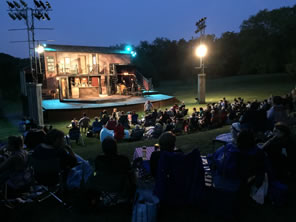
An audience of picnickers wait for First Folio Theatre's production of Shrew'd to begin on the lawn of the Mayslake Peabody Estate in Oak Brook, Illinois. Photo by Eric Minton. Below, Petruchio (Christopher W. Jones, right) courts Kate (Sasha Kostyrko). Photo by Tom McGrath, First Folio Theatre.
David Rice and his wife Alison C. Vesely were among those who had trepidations about staging The Taming of the Shrew today in its original form. The couple cofounded First Folio Theatre in 1996 on the Mayslake Peabody Estate in Oak Brook, a suburb west of Chicago, Illinois. The outdoor theater is set into a natural amphitheater–shaped lawn near the estate's Portiuncula Chapel, a replica of the chapel in Assisi, Italy, where the Franciscan movement began. Coal magnate Francis Stuyvesant Peabody built Mayslake Hall in 1919 and died shortly after moving in. The family sold the estate to a Franciscan order, which ran it as a retreat until selling it to the Forest Preserve District of DuPage County in 1993. With restoration of the mansion in 2004, First Folio expanded to an indoor winter season while still staging Shakespeare outdoors every summer. The company has produced The Taming of the Shrew twice before. Vesely directed a traditional version in 1999, and she and Rice codirected an Old West–set production in 2005. “They were successful both times, and we were very happy with the quality of the productions,” says Rice, the company's executive director. “But the misogyny and the abuse is troublesome and does not play well in 21st century America.”
Staging Shakespeare's Cymbeline as “A Folk Musical” in 2013 gave them a key to revisiting Shrew in 21st century America. The couple had wanted to do Cymbeline, but “it's confusing and it's disjointed at time," Rice tells me as we talk in a conference room in Mayslake Hall. "So, we decided to fix Shakespeare.” The couple set the play in Civil War West Virginia and gave it a bluegrass score. A year after that success, Vesely broached the idea of doing something similar with The Taming of the Shrew, another play they thought needed fixing, "not necessarily as much structural problems as sociological problems," Rice says. “The question was, could we reshape it using music into a play that sends a different message and yet retain Shakespeare's dialogue? My goal was to retain as much of Shakespeare's dialogue as possible, and where we removed the dialogue to replace it with music that gave us different insights into the characters than Shakespeare had.”
In fact, these characters, though speaking the original verse, become totally different characters than Shakespeare's via the lyrics of Rice and Lydia Hiller set to music by local composer Christopher Kriz. Shrew'd is set in a 1930s Chicago jazz club run by Baptista (George Keating), a widower and single father struggling to raise his daughters, Kate (Sierra Schnack) and her younger sister Bianca (Emma Rosenthal). Kate is not a man-beating hellion here: she simply isn't interested in marriage and wants to some day own her own nightclub. Baptista decrees, inexplicably, that a husband must be found for the elder before the suitors have access to the younger. So when Petruchio (Christopher W. Jones) comes from Kentucky “to wive it wealthily” in Chicago, his buddy Hortensio (Steven Strafford) turns him on to Kate. Petruchio, however, finds that all his smooth come-ons don't work with Kate. Rather, Petruchio learns how to court Kate with respect and authentically assist her in realizing her dreams. Notably, they do not get married in this production, but they may some day. The play's infamous last speech is started by Kate, then picked up by Petruchio and shared by Baptista.
Bianca and Lucentio (Tony Carter) do get married as in the original. Not only is the play's subplot intact here, it becomes the musical's focus and the production's true strength, including fulfilling the potential of Hortensio as a comic character. Lucentio and his best friend and wingwoman, Tranio (Sasha Kostyrko), do a marvelously tricky dance to the nifty song “Partners” (choreography by Ericka Mac), and the disguised Lucentio gives Bianca lessons in dance. Though Tranio worries that she will lose her best friend when he marries Bianca, they end up reprising “Partners” as a dance trio. It's a fangless Shrew, but you get some great dance numbers and an overall love ode to Chicago. You also get the original play's theme of trust and partnership front and center.
I was supposed to see Shrew'd four days ago—before moving on to American Players Theatre and Measure for Measure—but after the performance was cancelled due to rain, Schnack and Jones joined me in the mansion's breakfast nook to talk about Shrew and Shrew'd and their characters, Kate and Petruchio. I ask them if Shakespeare's text could be played straight today and accepted as a mirror to society rather than as justification for extreme misogyny. Schnack, who is white and raised in Quincy, Illinois, says she could get behind a production in which the audience is "totally rooting" for Petruchio until the last speech when the audience suddenly realizes, “Oh, God, I was rooting for that?” "I do think, with good direction, you could have a traditional Taming of the Shrew without commenting on anything and have the audience leave with a powerful message that is not pro taming of the shrew,” she says.
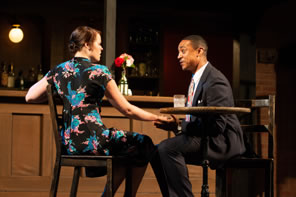 Jones, who is black and from Baltimore, Maryland, isn't so sure. “I would love to believe in the goodness of people, but people are showing their true, ugly colors right now, all over the country, everywhere. They're enabled, and they're emboldened to just express outward hate. Someone watching Shakespeare's plays is going to have a different sensibility than perhaps a neo-Nazi in the middle of nowhere America, who probably would root for Petruchio,” he says, and Schnack immediately agrees with this comment. But it's followed by an uncomfortable pause, a space to realize that these days, neo-Nazis are in everywhere America. Just as Coriolanus became a manifesto for both the fascists and communists in the 1930s, we're in an age when Shakespeare's plays like Shrew and The Merchant of Venice could be co-opted for Alt Right dogmatic purposes as much as for far left ideology. In such an environment, Shrew'd makes for a safe semi-Shakespearean diversion.
Jones, who is black and from Baltimore, Maryland, isn't so sure. “I would love to believe in the goodness of people, but people are showing their true, ugly colors right now, all over the country, everywhere. They're enabled, and they're emboldened to just express outward hate. Someone watching Shakespeare's plays is going to have a different sensibility than perhaps a neo-Nazi in the middle of nowhere America, who probably would root for Petruchio,” he says, and Schnack immediately agrees with this comment. But it's followed by an uncomfortable pause, a space to realize that these days, neo-Nazis are in everywhere America. Just as Coriolanus became a manifesto for both the fascists and communists in the 1930s, we're in an age when Shakespeare's plays like Shrew and The Merchant of Venice could be co-opted for Alt Right dogmatic purposes as much as for far left ideology. In such an environment, Shrew'd makes for a safe semi-Shakespearean diversion.
This production pursues a personal outcome as much as a social one. The play's original moral of trust, and the musical's enhancement of that theme, is a core value for Rice. “My wife was a very, very strong-willed, strong, independent woman,” he says. “We had 35 years of a great marriage. One of the secrets was that we were partners in everything we did. We were partners in this theater, we were partners in our marriage. People used to laugh that we lived in each other's back pocket. That was the story we were writing, about two really strong-willed people who realized that it could be really fun to be a partner with somebody as strong as you rather than be dominated by or dominating them.”
Vesely died of ovarian cancer in November 2016 (click here for Shakespeareances.com's In Memoriam). Rice continued writing Shrew'd, enlisting Hiller, an actress and songwriter, to incorporate a female perspective in the script and lyrics. He also specifically wanted a female director (Johanna McKenzie Miller). Nevertheless, Vesely remained his guiding spirit to the project's fruition, as well as First Folio's continuation. “Her spirit is sitting on my shoulder, sometimes nudging me and sometimes whacking me about the head and shoulders telling me don't do that or yes do that,” he says. After a brief pause, he says, “Yeah” and moves on. Partners, still.
Henry VI (Part Two),
National Asian American Theatre Company
Mezzanine Theatre, New York, New York, August 25
Sarah loves corn dogs. She likes waffles, too. Blessings awaited her as we walked from our DoubleTree Hotel on Manhattan's West 36th Street to the A.R.T/NY Theatres (the Alliance of Resident Theatres/New York) complex at West 53rd Street just before noon this morning.
We cut through the Hell's Kitchen Flea Market to get from 9th Avenue to 10th, at which point I tell Sarah to choose a restaurant for lunch or brunch on our way. This is asking a lot because she's had trouble making decisions since her neurological issues took hold in March. Today, she is having a "good day," and when we pause in front of the Dianne & Elisabeth Wine Bar + Kitchen, Sarah decrees we'll eat brunch here. Only after we're seated do we see what's on the menu: Breakfast Sausage Corn Dogs “in waffle batter with maple syrup and a sweet apples salad with bee pollen.” She is happy. And because she is eating, I'm happy.
When I got home from Chicago this past Monday, Sarah was down to 113 pounds. She's 5-foot-2 1/2. For perspective, she weighed 142 pounds in the spring of 2017 when we started getting her into “fighting fit shape” for a prolonged lost-weekend seaside getaway to celebrate her 60th birthday last November. My goal for her was 130 pounds, hers was 125. She got down to 132. Now, she looks like a skeleton, eating nothing more than one or two Kind snack bars a day and occasionally one of the small tubs of soup I prepared for her (the freezer was still stocked when I got home after my 12-day trip). Her medications might be contributing to loss of appetite, but she's also afraid of consequences. Her seizures bring on headaches and dizziness, and with those nausea. A trash can sits by her side of the bed, and we carry bags in the car at all times (when she had what we now know was her first seizure, I sacrificed my Blackfriars Playhouse stocking cap while taking her to the emergency room). I worry that her not eating is contributing to her condition—at least it's hampering her overall well-being. My goal now is to get her up to 125. I've been making sure she eats at least two meals a day covering a variety of foods. Each of our first two days in New York I grabbed a bagel, pastry, and apple from the hotel breakfast bar to take up to her in the room (she sleeps in long after I get up). This morning I watch her devour waffle-coated sausage corn dogs as I dig into a steak bavette and eggs with hash browns (bavette is a $27 word for flank).
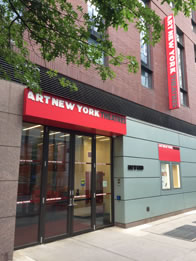 Sated, we continue our walk to the A.R.T./NY Theatres complex. Ahead of us is six hours of William Shakespeare's Henry VI in a two-part staging by the National Asian American Theatre Company (NAATCO).
Sated, we continue our walk to the A.R.T./NY Theatres complex. Ahead of us is six hours of William Shakespeare's Henry VI in a two-part staging by the National Asian American Theatre Company (NAATCO).
This conflation of Shakespeare's Henry VI trilogy is the best I could do to see Henry VI, Part Two, this year. That's not a slam on the theater company, for this all-Asian cast rocks it. Rather, the predominant attitude among theater companies is to combine Shakespeare's three individual plays into one or two productions, as NAATCO has done, calling its two parts "Foreign Wars" and "Civil Strife." In fact, I get 112 minutes' worth of Part Two (out of the total two-part performance time of six hours), which is longer than a couple other versions of Shakespeare plays I've seen this year.
To conflate or not to conflate—to say that question is a heated debate in Shakespeare circles is an overstatement because the Henry VI plays are so underproduced in the first place. Shakespeare plays containing Roman numerals tend to be box office duds. The Henry VI cycle has gained some traction in recent years due to its influence on George R.R. Martin's Game of Thrones. Still, many theaters don't want to commit three performance slots on their schedule to one story, but they are willing to do two in repertory, “which is a really dumb thing to do,” Jeff Watkins, artistic director of the Atlanta Shakespeare Company at the New American Shakespeare Tavern in Atlanta, Georgia, old me in a 2011 interview. “You could have sold three tickets and you chose to sell two. No wonder you're going broke.” Those companies that stage all three Henry VI plays individually, such as his has, tend to do a dozen or more plays per season, and many of those theaters spread the cycle over three years (which is how I've been able to see Part One at Utah Shakespeare Festival and Part Three by D.C.'s Taffety Punk at the Folger this year).
Watkins also contends that “there was no fat" in the plays, which surprised even him. "Those plays were already refined, and they were already refined for a small acting company,” he says. Setting aside the dogmatic purists who believe Shakespeare's works shouldn't be altered in any way, the people I've talked to who have performed in, directed, or seen these three plays staged individually agree that they are best left intact as individual plays. Having seen them performed individually as well as in conflations, I hold this opinion, too, even if Part One is like launching a dish of spaghetti at the wall and watching the mess take shape. Part Two, on the other hand, is among the classics of the canon. It includes remarkable love poetry between Margaret and Suffolk; a grieving Margaret cuddling the severed head of her lover in the presence of her husband, King Henry, and the court; and the Jack Cade rebellion, which has one of the most famous lines in all of Shakespeare: “The first thing we do, let's kill all the lawyers.”
Mia Katigbak, NAATCO's cofounder and artistic producing director (she plays Humphrey, Duke of Gloucester), is of the camp that believes the series should be conflated. Though she loves the gem moments and characters in the plays, she says the palette of names and weaving storylines are too confusing for a modern audience to grasp (Shakespeare's audience knew these names and stories in the same way modern audiences know the characters and history in Hamilton).
NAATCO was begun in 1989 with a mission of providing opportunities for Asian theater artists otherwise blocked by institutional racism, a prejudice especially prevalent in casting for classical works. “Asian” covers the entire continent, not just the Pacific Rim—Mahira Kakkar playing Margaret is Indian. Because Katigbak wants to program pieces devoid of Asian stereotypes, NAATCO Associate Producer Peter Kim put her in touch with his friend, Stephen Brown-Fried, who suggested NAATCO stage Clifford Odets's Awake and Sing!, a 1935 play about Bronx Jews. In our meeting at Cafe Bene near his home in Queens, Brown-Fried, who is not Asian, describes how he had to convince Katigbak that he was, in fact, Jewish and could legitimately stage the play with an all-Asian cast. The award-winning production went on to a revival at the Public Theater, so Katigbak asked Brown-Fried what else he would like to do. He suggested Henry VI, and she pounced on the idea.
Brown-Fried spent a couple of years whittling Shakespeare's three-play text into the two parts, "Foreign Wars" coming in at 3:10, "Civil Strife" at slightly under three hours. He narrowed his focus on the character arcs of York and Margaret as well as the titular King Henry and, to a lesser extent, Humphrey. While he may not have had much fat to trim, he leaves us with the choicest pieces. All of Shakespeare's Part One he condensed into the first half of “Foreign Wars.” After intermission, Shakespeare's Part Two begins with Margaret's arrival in England. Entire scenes are cut (Simpcox and his wife, for example), redundancies excised (such as Eleanor's séance, which is described later anyway), and speeches trimmed. Nevertheless, we get a well-paced, fully developed story line through the play's most important moments: Humphrey with Eleanor; Margaret with Suffolk; the court scenes establishing who should be regent of France and, later, of Ireland; Eleanor arrested and the portion of the subsequent hawking scene at St. Albans where Humphrey learns of his wife's conspiracy; York's winning over Warwick with his lineal argument for wearing the crown; the conspiracy against and murder of Humphrey; and King Henry's banishment of Suffolk. “Foreign Wars” ends with Margaret and Suffolk parting: “This way fall I to death,” he says; “This way for me,” she says, and they exit at opposite ends of the stage as the lights go down.
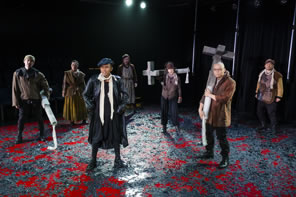
Jack Cade (Ron Domingo, in black leather coat) leads his rebellion in the National Asian American Theatre Company's production of Henry VI. Photo by William P. Steele, NAATCO.
We have to wait for “Civil Strife” this evening to pick up the rest of Shakespeare's Part II. Meantime, we have dinner at Ristorante Il Melograno a couple blocks from the theater, where Sarah downs baked cannelloni plus a chocolate soufflé with Nutella center for dessert. Back in the theater, York gives us a recap by repeating his soliloquy about taking on the Irish rebellion—"'Twas men I lack'd, and you will give them me”—and instigating Jack Cade's rebellion. We get a satisfying telescope of the rebellion scenes, a pregnant Margaret learning of Suffolk's death, a more-pregnant Margaret cuddling Suffolk's head like a baby, York's return and move into open rebellion, the first appearance of his sons (including the future Richard III), and the first battle of the War of the Roses with Henry and Margaret fleeing. This is a lot, but we are yet only a quarter of the way through “Civil Strife,” which continues to the end of Shakespeare's Henry VI, Part Three.
The Mezzanine Theater is a black box space configured into a 97-seat arena theater. Set Designer Kimie Nishikawa covers each end of the red floor with black confetti that, over the course of the show, gets scattered across the stage and into the seats and even out into the lobby. Two portable stairs serve as structures, such as city walls and the throne. Nicole Slaven's costuming is medievalish modern. Brown-Fried had to abide by one rule: no Asian tropes. However, he insisted (with Katigbak's blessing) on no swashbuckling swordplay, so the fights take on some aspects of martial arts. Otherwise, in style and performance, the company's genetic makeup is of no matter.
What matters is the talent, starting with Jon Norman Schneider as King Henry VI. Henry is often too weak a character to make an impression, and Schneider is new to Shakespeare, but he has mastered the verse, and his Henry, while obvious in his naïveté in the early scenes, stands stalwart on his moral core. He vocally decimates Margaret and Suffolk (Paul Juhn) after Humphrey's death. Rajesh Bose is a force as York, even as he warily observes the others in court and quietly plots his way to the crown. Kakkar is a wonderous Margaret, a character equal to Cleopatra at the top of the pantheon of Shakespearean women, ranging from her sexual desires to her participating in court intrigue and proving a fierce battlefield commander. It bears mentioning here—though it's is a scene from Part Three —that Kakkar and Bose play out the most riveting and gut-wrenching bloody napkin confrontation I've ever seen.
So, maybe we didn't get the whole of Shakespeare's Henry VI, Part Two. We come away sated.
Friday, August 31—College Days, Current Daze
Joan Sontag and I became friends while both of us were attending the University of Missouri-Columbia and living in the same dormitory complex. One Sunday evening when the cafeteria was closed and the only food available to us was at a small snack counter downstairs, I happened to run into Joan. She started complaining about some recent romantic crash, wondered if she'd ever find true love, then asked, “Will you marry me? No.”
“At least give me a chance to answer,” I said.
I would have said no, too. It was just our way to never get into a romantic or even a casual sexual relationship. We took a spring break trip to Florida together. We often went dancing at clubs. After we graduated she moved into my apartment. She was hot (and still is), and evidence aside from my mirror indicated I was a turn-on, too, but the entire time and in every instance, we remained platonic friends. In fact, when she was living with me she was engaged to a U.S. Marine.
Joan is also a journalist. When she was a reporter with the Associated Press, I used to appreciate her work from afar when it would come across the wires while I was working as a newspaper editor. Now divorced, she calls Los Angeles home, and I stayed with her in March when I covered the Independent Shakespeare Company opening its new studio theater with All's Well That Ends Well. In June, Joan joined Sarah and me at Shakespeare by the Sea's The Winter's Tale. She enjoyed it so much she went back by herself to see the company's production of The Merry Wives of Windsor. She laughed as she described to us how “the two wives kept getting that guy to come over…”
"That guy?” Joan is one of the most intelligent people I know, but her Shakespeare knowledge is only as deep as a single course she took at Missouri, a class everybody took not because it was required but because the professor was so good it was considered a must-take class (neither of us can remember the professor's name, unfortunately). So forgive her calling Sir John Falstaff "that guy." She remembers studying Titus Andronicus in that class, so she joined us for the Independent Shakespeare Company's production of that play at Griffith Park last night. She and Sarah strolled the grounds of the Old Zoo while I interviewed the company's cofounders (Independent Shakespeare is my Canon Project entry for A Midsummer Night's Dream). Now she intends to join us when we see Dream there on Sunday.
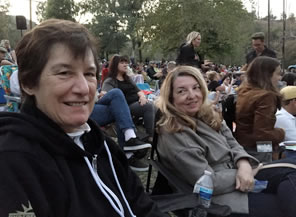
Joan Sontag, right, with Sarah before the show at Griffith Park in Los Angeles. Photo by Eric Minton.
Sarah and I are staying with Joan for our current trip to Los Angeles. I'm so grateful. Do I give her wine or flowers as a thank-you gift? I settle on toilet paper, not only replenishing what we use but she'll think of us every time she pulls on a roll. Her hospitality is saving us considerable money, and, perhaps more importantly, it's given Sarah a safe place to land—and me, too.
Sarah has had a bad week. Over the course of our four days in New York for the National Asian American Theatre Company's production of Henry VI last week, Sarah was doing relatively well and in great spirits. She had even regained her enthusiasm for getting back to work after two months' absence. Sunday night when we got back home we capped the weekend with a dinner date at our favorite restaurant. Monday, however, when I was supposed to drive her to her office, she didn't get up until midmorning and almost immediately went down with a headache. It knocked her out until late in the afternoon. She was chipper when she got up on Tuesday, had an egg, bacon, and tomato breakfast, but then went down again, this time for more than eight hours. With an early flight to Los Angeles the next morning, I ended up packing by myself (she might be allergic to me, but she also seems allergic to packing—I've had to pack for her the last three trips). I also booked an appointment with her primary care doctor for next week: time to look at getting Sarah into therapy. When I told her what I'd done, she agreed. She was fine on Wednesday's cross-country flight but was a bit sluggish yesterday before we picked up Joan in downtown L.A. and headed for Griffith Park and Titus Andronicus.
Today, things have really gone awry. I had scheduled a visit to the Huntington Library, an important institution in Shakespearean studies, and a meeting with Stephen Tabor, the library's curator of rare books. The Huntington is located in San Marino, an hour's drive from Joan's place. As we're readying to leave, Sarah is not looking well. She insists she is just tired. “You can't be a liability to my work, remember,” I remind her, which sounds mean but is part of our agreement re: keeping her safe while I carry out my responsibilities to the Shakespeare Canon Project per her insistence. She assures me that napping in the car is all she needs, but her eyes are telling me a seizure is at hand. Nevertheless, I consider that perhaps she is trying to work through her “slight headaches” and withstand her seizures. If that is her intention, I will support that, even if it proves a liability to my work.
Sarah sleeps (or at least has her eyes closed) all the way to San Marino. I pull into the Huntington's parking lot and find a space under shade. Just as I turn off the engine, Sarah opens her door and throws up. I wait until she's finished (some five minutes), then regard her objectively. “It's clear liquid,” she says, hopefully, but that just tells me she's not eating again. I text my regrets to Tabor and then text Joan that we are heading back to her home and would not be meeting her for lunch. As I set my iPhone GPS for Joan's address, Sarah sighs, leans back, and closes her eyes. She is disappointed, but I know she is in the early stages of a seizure, if not already an hour into it. With no alternative plan in place, I have no choice but to get her back to bed.
Sarah sleeps as I make the hourlong return trip, frustrated, worried, angry—at Sarah, at God, at myself: I know I should always heed my instincts, and I didn't this time. I'm accepting our new normal, but fully adjusting hasn't been easy, especially since I'm the only one who really seems to be adjusting. Sarah continues to act as if everything is normal. That is probably her coping mechanism, or she's not fully aware of how much her cognitive capabilities have faltered. Now she has become "a liability": I have no means of making up the Huntington visit for the Canon Project.
After we get back to Joan's place, Sarah stays in bed all day. I go alone tonight to Griffith Park to continue my visit with the folks at Independent Shakespeare Company. Sarah is still in bed when I get back. I check Joan's refrigerator and see that the food I had left for Sarah has not been touched. I get stern with her, expressing my helplessness while understanding her helplessness, but I insist that if nothing else she needs to eat. Otherwise, she's behaving more and more like her mother, who had Alzheimer's. I am certain Sarah is not suffering from dementia, but I point out that her current condition is affecting her behavior and independence the same way dementia would. It hurts to say this as it's always been one of her biggest fears, to follow in her mother's footsteps; but I hope it helps her better understand her situation. Who knows? I no longer have a clue of what to do for her.
One thing I do know: Tomorrow I have a full day of meetings and interviews scheduled with Long Beach Shakespeare Company, starting with brunch on a boat and culminating with seeing the company's production of Troilus and Cressida. I'm going solo. I also know I have a best friend in Joan, and she will either hang out with Sarah if my wife gets up or look after her if she doesn't. When it comes to these two women, I've been blessed.
Troilus and Cressida, Long Beach Shakespeare Company
Richard Goad Theatre, Long Beach, California, September 2
I'm brushing up on Homer's Odyssey this morning via Wikipedia. Not to cram for today's matinee of William Shakespeare's Troilus and Cressida at Long Beach Shakespeare Company: Shakespeare's play is based on a medieval retelling of events in Homer's Iliad. My interest in the Odyssey is for after today's show when I have to journey up to Griffith Park in Hollywood for a 7 p.m. performance of Shakespeare's A Midsummer Night's Dream. I'm worried my trip through Los Angeles traffic might compare in length and travails to the 10-year journey home that Odysseus (Ulysess in Troilus and Cressida) had to endure, encountering Lotus-Eaters, Cyclops, Scylla, Charybdis, and a captivating nymph on the way.
I'm also patiently waiting on my Penelope. After her daylong seizures Friday, Sarah got out and about yesterday with our hostess, Joan, while I spent the day immersing myself in the culture and community of Long Beach Shakespeare. When I got back to Joan's home late last night, a sleepy Sarah recounted her day, including watching "the show about ants" on TV. I learn from Joan this morning that they watched Them!, the 1954 horror flick about giant ants. One of my all-time favorite films, and I missed it! Oh, the sacrifices wrought by the Shakespeare Canon Project, I ponder as Joan repeats line after line from great scene after great scene (it's one of her all-time faves, too). After seeing Shakespeare's Titus Andronicus at Griffith Park with us last Thursday, Joan wants to join us for Dream tonight. My plan was for Sarah and me to explore Long Beach's downtown this morning, attend Troilus and Cressida this afternoon, and then meet Joan at Griffith Park this evening. Sarah hasn't gotten up, however, and as noon approaches, Joan and I work out alternative plans—including, if I have time, taking a short detour to pick her up. One last check on Sarah, and I head off for Long Beach alone.
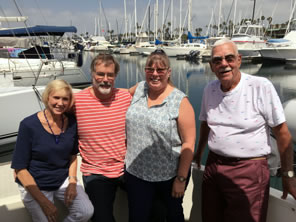
Brunch on a boat with Long Beachers: from left, Carolyn Rydell, Tim Leach, Dana Leach, and Ted Kuhn. Below, Troilus and Cressida's character matrix is explained with cast headshots on the Long Beach Shakespeare Company's theater lobby chalkboard. Photos by Eric Minton.
Though I miss out on exploring more of the city's geography this morning, I got a full taste of the community's personality yesterday thanks to Dana Leach, Long Beach Shakespeare Company's producer and theater manager. Our expedition started on a boat. Ominous, I know, but the Margaritaville remained in its berth as it is not yet seaworthy. Carolyn Rydell and Ted Kuhn, Leach's mother and stepfather, recently purchased the 36-foot Carver cruiser and are still restoring it. In fact, with no power in the kitchen this morning, Rydell had to return home to finish fixing her Portuguese Eggs for our brunch. As we dig into the delicious casserole of cheese, sausage, and a hint of lemon flavor, we talk Long Beach, theater, and Shakespeare.
Rydell was born in Long Beach and never lived anywhere else; but what a zest for adventure she has, starting with her attempt to join the circus when she was a child and building a raft to float down the Los Angeles River to the sea. She has always had a love for theater and currently serves on the Long Beach Shakespeare board. Leach and her husband, Tim, are also lifelong Long Beach residents. Dana worked in theater and video production before she became a teacher. Tim is a Hollywood makeup, prosthetics, and props artist. His first film credit was 1988's Fright Night Part 2, and his work since has included Captain America, Alien: Resurrection, TRON: Legacy, and The Santa Clause 2. One of the 6-foot toy soldiers from that last movie stands in a corner of their dining room, left over from a party at the theater. Tim's primary employer, Amalgamated Dynamics, allows him time and resources to fulfill his volunteer duties as Long Beach Shakespeare Company's head of production design.
Dana next takes me to the Historical Society of Long Beach, a few doors down from Long Beach Shakespeare's home, the Richard Goad Theatre in an Atlantic Avenue neighborhood of local restaurants and boutiques. John Royce, the Society's membership coordinator, gives me a brief history lesson with models and photos illustrating Long Beach's evolution from a seaside resort to a port and Navy town to an industrial center with a bad reputation. His personal testimony carries greater weight as he describes how he and some friends were driving into Long Beach and, looking around, he wondered, “This is the place we were supposed to avoid?” It became the place where he wanted to live, thanks to a culturally vibrant community. I hear this sentiment echoed by others, including Joan, who loved going to Long Beach when she and her ex-husband had a boat docked here. Royce has laid out on a table several programs, newspaper clippings, playbills, and photographs illustrating Long Beach's rich theater history. What's missing is Shakespeare.
Helen Borgers sought to fill that void. She grew up in Long Beach and shared her two great loves with the city: jazz by hosting a radio broadcast on a public radio station and Shakespeare by founding in 1997 a touring troup called Bard in the Yard. When the company got a permanent home for its productions, Borgers changed the name to the Long Beach Shakespeare Company. Borgers also taught Shakespeare acting workshops, two of which have special significance in today's story. One was for a Cub Scout den that included the Leaches' son; the other was for Cabrillo High School where Brandon “Brando” Cutts was then a 15-year-old student. The Leaches became supporters and close friends of Borgers, and when the company hit a financial crisis, Dana offered a summer's worth of work to help get the theater back on track. That initial three-month commitment continues for both Dana and Tim. After his introduction to Borgers and Shakespeare, Cutts began performing for the company and eventually became Borgers' “first mate” in the company's artistic direction. When Borgers died at age 60 last November after a short illness (click here for Shakespeareances.com's In Memoriam), Cutts, now 33, took over the artistic reins.
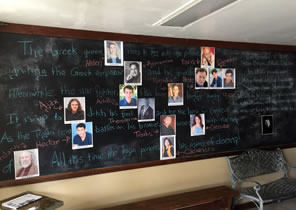 Borgers already had programmed the 2018 season with a theme of “Seldom Seen Shakespeare,” and Cutts determined to carry it out. Troilus and Cressida is as “seldom seen” a Shakespeare play as any in the traditional canon. The cast that Cutts has gathered, though, finds the play relevant (Chadwick Bradbury playing Agamemnon sees President Trump in his character), incisive (Long Beach Shakespeare veteran Leonardo Lerma calls his character, Thersites, the ultimate “other”), timely (many comment on the rampant machismo that leaves both Troy and the Greek camp in tragic disarray) and relatable—especially for Aaron Joseph playing Troilus in his first-ever stage play. Joseph tells me that while he has been trying to build an acting career for the screen, friends and teachers suggested he do some Shakespeare for the skills-building experience. He picked a doozy for a debut, but he relates how his personal life is currently mirroring that of his character, the Trojan prince who has a longstanding crush on Cressida. He finally enjoys its consummation only to have her immediately sent off to the Greeks in a prisoner exchange where he witnesses her faithlessness. The actor talking about his own romantic trials looks as baffled as Troilus the character sounds in verse. Joseph may be new to Shakespeare, but he delivers that verse with soul-stirring truth and adroit skill.
Borgers already had programmed the 2018 season with a theme of “Seldom Seen Shakespeare,” and Cutts determined to carry it out. Troilus and Cressida is as “seldom seen” a Shakespeare play as any in the traditional canon. The cast that Cutts has gathered, though, finds the play relevant (Chadwick Bradbury playing Agamemnon sees President Trump in his character), incisive (Long Beach Shakespeare veteran Leonardo Lerma calls his character, Thersites, the ultimate “other”), timely (many comment on the rampant machismo that leaves both Troy and the Greek camp in tragic disarray) and relatable—especially for Aaron Joseph playing Troilus in his first-ever stage play. Joseph tells me that while he has been trying to build an acting career for the screen, friends and teachers suggested he do some Shakespeare for the skills-building experience. He picked a doozy for a debut, but he relates how his personal life is currently mirroring that of his character, the Trojan prince who has a longstanding crush on Cressida. He finally enjoys its consummation only to have her immediately sent off to the Greeks in a prisoner exchange where he witnesses her faithlessness. The actor talking about his own romantic trials looks as baffled as Troilus the character sounds in verse. Joseph may be new to Shakespeare, but he delivers that verse with soul-stirring truth and adroit skill.
He's paired with Amanda Swearingen, who took over the role of Cressida when the original actress had to drop out days before opening night. Swearingen perfectly grasps Cressida's mental state in her courtship with Troilus, portraying the woman's intelligence and cautionary nature at war with her glisten-eyed desire for this man. She knows she's at the most important crossroads of her life in this war-besieged city, and Swearingen's psychological pas de deux with Joseph's Troilus as she approaches this crossroads is on point. These two actors' emit mesmerizing chemistry.
Cutts, who plays a casually hilarious Ulysses in addition to helming the production, sets the action in traditional Trojan War costumes (designed by Dana Leach), with the Greeks in blue skirts, the Trojans in brown. His only anachronism comes in the single scene that features Helen played by Ryanna Dunn, who doubles as the Trojan warrior Aeneas, a role, she tells me, she prefers to playing “the face that launched a thousand ships.” In that scene, Helen and Paris (Courtney Sims) are toking on a hookah. It may be an anachronism, but the looped lovers fit the tone of Shakespeare's verse. Cutts balances well this “problem play's” comic elements with the tragic love story at its center. He trims much of the long speeches, and though the presentation's pace still draws out some of the debate-heavy scenes, Cutts's excisions bring the production in at just over two hours, including intermission.
I leave the theater minutes after 4 p.m. With three hours to get to Griffith Park and my iPhone GPS telling me the current travel time is estimated at 40 minutes, I call Joan and tell her I can pick her up. “We're ready to go,” Joan says. That's all she says, but the emphasis she put on the pronoun makes the point: Sarah is ready to go, too. That's a Siren's song I'll always heed.
A Midsummer Night's Dream,
Independent Shakespeare Company
Griffith Park, Los Angeles, California, September 2
David Melville is on his hands and knees. He's inspecting the cables running across the ground from the stage to the light and sound boards halfway up the hill. This is not a good sign.

Two hours before "curtain" of Independent Shakespeare Company's productions at Griffith Park in Los Angeles, people stake out their spots and spread their picnics on the hillside sloping down to the stage. Photo by Eric Minton.
Tonight is the final night of Independent Shakespeare Company's two-month Free Shakespeare Festival in Los Angeles's Griffith Park. William Shakespeare's Titus Andronicus finished its run last night, and A Midsummer Night's Dream closes out the season tonight. The hill sloping down to the stage already is covered with blankets, lawn chairs, and picnicking people a couple hours before showtime. On the perimeter are the rocky enclosures that housed bears when the Los Angeles Zoo occupied this site from 1912 to 1965. One of the preshow announcements reminds people that climbing on those rocks is illegal. So is consuming alcohol in the park. People also are advised to watch out for wildlife, including deer, P-22 (a mountain lion that roams the 4,310-acre park), and fairies. Before a performance of A Midsummer Night's Dream a couple nights ago I saw a fairy in the audience, a 20-something guy with wings strapped to his back and a big leaf on his head. He was not a member of the cast or crew; he was there to watch the play.
Melville is checking connections on the stage. He is the managing director of Independent Shakespeare Company, which he co-founded in 1998 with his wife, Artistic Director Melissa Chalsma. The couple met during the 1995 Broadway run of Ralph Fiennes's Hamlet featuring Francesca Annis as Gertrude. Melville played Reynaldo, Chalsma understudied Ophelia. While the two leads were beginning their infamous romantic relationship, Chalsma and Melville were flirting backstage. This is the 15th anniversary year for the company's summer festival that started in Barnsdall Park and, outgrowing the capacity there, moved to Griffith Park's Old Zoo in 2010.
Chalsma directed the festival's Titus and Midsummer this year, and Melville is playing Bottom and Titus, the latter as a last-minute fill-in. Before seeing Titus last Thursday, I asked him if he found any common thread between the two characters. "There's some histrionic moments where they both sound rather similar," he says. Playing Titus, he says, "there are some moments I catch myself sounding like Bottom. It's interesting that Bottom is an amateur who would like to be a tragedian, and I'm an actor playing a tragic role interpreting [Bottom's] interpretation of a tragic actor." He turns in the most singular Bottom and one of the funniest I've seen in 33 Dreams, bearing himself with hip suaveness, the cool dude with real acting experience, though obviously not much training. Melville delivers Shakespeare's lines as non sequiturs and adds some character-driven ad libs, such as referring to "Snug the painter, joiner, whatever it is you do." On Friday as an airplane droned overhead during his initial encounter with Titania, Bottom says, "if I had wit enough to get out of this wood, I have enough to serve mine own turn," and Melville waved up at the plane and shouted, "Hey, down here!"
Now less than an hour from curtain, Melville is a managing director trying to rescue the show. The tapestry of blankets has extended well up the hill, and every patch of bare grass is filled in with more people arriving. Using a technique I learned as an undergraduate at the University of Missouri Journalism School, I estimate attendance tonight at about 3,000 people.
Xavi Moreno loves this crowd. In his eighth season with Independent Shakespeare Company, he's playing Lysander. The 34-year-old Los Angeles native made his theatrical debut as Baby Jesus when he was 2 months old. He says theater saved his life growing up in Boyle Heights during the "decade of death" when that East L.A. neighborhood saw an epidemic of gang violence. Shakespeare was just an English class he never liked—back then he called it "smart English" that he always feared—until he saw an Independent Shakespeare production of The Tempest at Barnsdall Park. The next year, he came to Griffith Park to catch the company's performances. The following year he was with the company. "I'm a true believer in what David and Melissa have gifted the city," he says.
He likes to arrive early and roam through the crowd talking with people and checking out their spreads (predominant foods, he notes, are sushi, rotisserie chicken, ceviche, and cheese plates). During The Taming of the Shrew four years ago when he was playing Biondello and waiting for his entrance through the audience, he encountered a high school kid hanging off to the side. Moreno greeted him. The boy got nervous: he didn't have a ticket. "You don't need a ticket," Moreno told him. "This is for you." "This is for me?" the boy asked incredulously before finding a place to sit. A couple nights later, Moreno encountered the boy again; he had brought his girlfriend and they were enjoying a picnic of chips and soda. Moreno returning the boy's greeting assured the nervous girlfriend that they didn't need a ticket. This was for them.
The light board, which is supposed to be on the table on the hill, is now sitting on the stage. Melville is stooped over it while one of the technicians looks on. My consolation is that I saw the play Friday night, so it's in the Canon Project book. But wife Sarah and best friend Joan are here tonight. I so want them to see this production. I'm sitting by the stage with Julia Aks, who plays Helena, and I point out Sarah sitting in a lawn chair about halfway up the hill. Aks and I wave, Sarah waves back.
Friday night, when Aks spoke Helena's line, "We cannot fight for love, as men may do; We should be woo'd and were not made to woo," she got a shout of approval from clusters of young women in the crowd. The response so surprised me, and Aks' thoroughly modern Helena played with field-and-track-star athleticism was so startling comic, I arranged to interview her tonight. She says she, too, was surprised by the shout-outs to her "woo" line, and we talk further about the role of Helena in the year of #MeToo and #timesup. Especially troublesome is her spaniel speech when she tells Demetrius, the man she has a crush on (but who has a crush on Hermia):
I am your spaniel; and, Demetrius,
The more you beat me, I will fawn on you:
Use me but as your spaniel, spurn me, strike me,
Neglect me, lose me; only give me leave,
Unworthy as I am, to follow you.
She tells me that at one performance, a vocal group of high school girls was rooting for Helena until that speech. Then they turned on her.
Melville comes over to fetch members of the cast, who follow him down the hill and beyond the stage. We're past show time. The crowd patiently waits. Outdoor Shakespeare is uniquely popular around North America. Of 34 plays I've attended so far this year for the Shakespeare Canon Project, this is my 18th outdoor show. This despite the venues being fraught with uncertainty; there's a reason that Shakespeare, who wrote his plays for outdoor performances, included weather references in almost all of them. Nevertheless, outdoor performances just as often result in memorable magical moments. Before Friday's show, I talked with Evan Lewis Smith, who plays Oberon and Theseus, and Kelvin Morales, who plays Puck and Philostrate. We discussed the Griffith Park vibe, such as having a real moon to point to or hearing coyotes howling in the distance on cue. We also list elements the actors must contend with, man-made (airplanes flying overhead) and natural. Smith recalled that one night a bee flew into Melville's mouth after Bottom played Pyramus's death scene. The moment turned into comic gold as Melville's Bottom's dead Pyramus jumped to life yet again, Smith said.
Tonight's contending element is the City of Los Angeles. The power grid is experiencing intermittent shortages affecting Griffith Park. Melville determines that if he can reduce the amount of electricity being used in the production, he can salvage the show. Everything "nonessential" is turned off or unplugged: backstage, dressing rooms, concession stands, and ancillary lighting. Stage lights are limited to the front rig, just enough to light the stage (no lighting effects this night). Otherwise, the jam-packed hillside is now nearly pitch black.
The show starts about an hour late. The crowd roars. The actors take advantage of the disadvantages. For their first Athenian woods scene, as Lysander and Hermia (Katie Powers-Faulk) enter through the audience, Moreno has strapped a miner's light to his head. Once on stage, Moreno keeps his headlamp on as his Lysander speaks his intensive passages of love to Hermia. She is blinded more by the light than his love and finally says, "Would you turn that thing off please." After Oberon sends Puck with the magical flower to seek out Demetrius, Morales re-enters down the center of the hill where there's no aisle. In Friday night's performance, he complained that all us humans look the same to him. Tonight he complains that he can't find the Athenian. "I found a flashlight, though," he says triumphantly, and then shines it on individuals as he works his way through the crowd "looking for an Athenian. I'm looking for an Athenian."
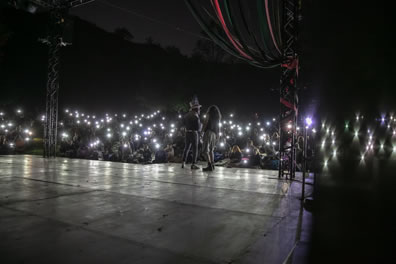 People in the audience use their cell phones and flashlights to illuminate Oberon (Evan Lewis Smith in top hat) and Puck (Kelvin Morales) during a power outage in the final performance of Independent Shakespeare Company's production of William Shakespeare's A Midsummer Night's Dream in Griffith Park. Photo by Grettel Cortes.
People in the audience use their cell phones and flashlights to illuminate Oberon (Evan Lewis Smith in top hat) and Puck (Kelvin Morales) during a power outage in the final performance of Independent Shakespeare Company's production of William Shakespeare's A Midsummer Night's Dream in Griffith Park. Photo by Grettel Cortes.Despite these circumstances, I'm still concentrating on the audience's relationship with Helena. The moment I've been most keenly watching for comes as Helena chases Demetrius (Jose Acain) onto the stage for the scene containing the spaniel speech. The stage lights begin flickering. Aks starts her spaniel lines. She gets only a couple of words in when the stage lights go totally off. All is dark. Aks continues her speech, despite the crowd's "oh-no" murmurings. Then, audience members begin shining flashlights and cell phones toward the stage. Aks pauses in her speech and shouts, "Light me up, Los Angeles!" and the hillside becomes a galaxy, illuminating the stage enough for Helena and Demetrius to finish their dialogue, he running away, she chasing after him into darkness beyond the pinprick lights. In this Milky Way glow, the scene continues as Oberon and Puck introduce the magic flower. "I know a bank where the wild thyme blows…"
In less than five minutes the stage lights come back on. They flicker again later in the show—and patrons ready their lights and phones—but the play makes it to the end uninterrupted. For their Bergomask dance at the conclusion of Pyramus and Thisbe, the Rude Mechanicals sing "Stand by Me." Tonight, the song particularly resonates: "When the night has come, and the land is dark, and the moon is the only light we see, no I won't be afraid, no I won't be afraid, just as long as you stand, stand by me."
After the show, I greet Smith. Wearing Oberon's shimmering silver, lace-trimmed shirt and top hat with glittering cattails sticking up from the brim, he resembles a New Orleans Mardi Gras krewe king. He replies to my "hey" with a shake of his head and eyes wide with awe. "That was the most magical moment of theater I have ever experienced," says the veteran actor in his fourth season with Independent Shakespeare Company. After a brief talk with Smith, I move on to Aks. "Boy, you picked the right night to come," she says when she sees me.
This entire year has been filled with serendipity, charming the Canon Project with a mystical dimension, even when taking into account Sarah's neurological condition and seizures. Yeah, for sure: we picked the right night to come.
Monday, September 3—Up in the Canyon
Earnestly, I seek an answer to the great question of my current existence: Is Los Angeles a Shakespeare town? 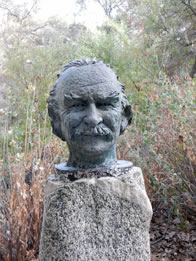 I know: How to define “a Shakespeare town.”
I know: How to define “a Shakespeare town.”
On my journeys across the continent this year, I've tangibly encountered and palpably felt grassroots Shakespearean appreciation in many communities, from cities (Chicago, New York) to towns (Staunton, Virginia; Shelton, Connecticut; Kilgore, Texas). On my first Shakespeare Canon Project foray into Southern California in June, I heard a common refrain among people in and out of theater: San Diego is a Shakespeare town, Los Angeles is not. Even as I visited Shakespeare companies in Los Angeles and engaged with enthusiastic fans at their productions, most actors and patrons conceded the city to be more film-centric than theatrical, and its theatrical bent more modern than classical. Interviews with other Shakespearean entities in Los Angeles fell through, leaving me the impression that Shakespeare's place here is, indeed, cinematic in scope, that scope expanding or narrowing depending on the star power driving it at the time (it was at its widest aperture earlier this summer with Tom Hanks playing Falstaff in a conflated production of Henry IV produced by the Shakespeare Center of Los Angeles). Still, I felt I had not adequately gauged the whole scope of the community's relationship with Shakespeare.
On this return trip to Los Angeles, I endeavored to further explore Shakespeare's place in Los Angeles culture. I scheduled a visit to the Huntington Library, a center of Shakespearean scholarship; unfortunately, as reported in a previous post, I had to cancel that visit. I asked the founders of Independent Shakespeare Company, Melissa Chalsma and David Melville, if Los Angeles is a Shakespeare town. They said it is, pointing to their company's 15-year longevity playing Shakespeare in the park to between 1,000 and 3,000 people per night and the many other quality theaters in the city presenting Shakespeare. Then came last night's “Light me up, Los Angeles!” moment in Griffith Park when a power outage left the company's A Midsummer Night's Dream temporarily in the dark. This morning, Chalsma sends me the photograph showing the audience lighting the stage with flashlights and cell phones. In her email she writes, “I'm telling you, Los Angeles audiences are the best! We are a Shakespeare City, without a doubt.”
For more surety, today I venture for the first time into the mystical lands that in some ways shaped my coming of age: “the Canyon.” Topanga Canyon in the Santa Monica Mountains north of Malibu and Los Angeles was the cultural enclave for many musicians in the late 1960s. That heritage goes back in part to Will Geer, who made his Broadway debut in 1928 as Pistol in The Merry Wives of Windsor and became a stage, radio, and film star through the 1940s. In the early 1950s, the studios blacklisted Geer after he was called before the U.S. House Un-American Activities Committee for his association with the Communist Party. With his wife, actress Herta Ware, Geer moved to Topanga in 1951 and created his Theatricum Botanicum, combining his loves of gardening and theater and creating a venue where other blacklisted actors and musicians could play, turning it into an artists' commune where Woodie Guthrie lived for a time.
Geer eventually found work on the more politically forgiving New York stages and was a regular at the American Shakespeare Festival in Stratford, Connecticut. He was a star again in 1973, playing the patriarchal grandpa on the TV series, The Waltons. That year, he gathered his family in Topanga and turned Will Geer's Theatricum Botanicum into an Equity theater. They started staging plays there again, including A Midsummer Night's Dream, which the theater has produced almost every summer since. This year's repertoire includes Arthur Miller's The Crucible, Enid Bagnold's The Chalk Garden, William Dubois's Haiti, and Shakespeare's Coriolanus as well as A Midsummer Night's Dream. We are seeing Dream this evening—not the first time I've attended two different productions of this play on consecutive nights.
I drive wife Sarah and friend Joan past the traffic jams feeding Malibu Beach on this last day of summer and ascend into the Canyon. We brunch at the Inn of the Seventh Ray, which serves exotically healthy cuisine in a meandering dining room amid trees, a babbling brook, and canyon rock. We then drive a bit farther through the town of Topanga, noting vestiges of its hippy heritage, and reach Theatricum Botanicum. The tree-covered grounds with wooden service buildings, home-made signs, a clearing filled with tables, and a festooned bridge reminds me of church retreat camps in my childhood. The theater itself is built into a crease in the canyon folds, a steep, 299-seat amphitheater cascading down toward a large wooden stage with a wood-board building to one side that looks like it was moved here from an Old West movie lot. Behind the stage, a forested hill rises to the sky, with stairways and paths winding into the woods from which fairies emerge. To the left, the setting sun engoldens a neighboring ridge, and to the right a dry creek bed and partial path disappear into thick vegetation. It's a perfectly natural setting for Dream.
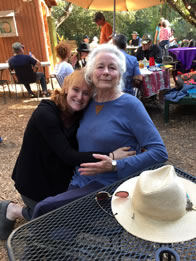
Willow Geer, left, and Ellen Geer sit in the outdoor dining area of Will Geer's Theatricum Botanicum in Topanga, California. Above, a bust of Will Geer stands in the founder's Shakespearean garden. Photos by Eric Minton.
I'm here a couple hours before the play and greeted by the two women I've arranged to meet, California sunshine beaming from their expressive faces. The elder lady with a wide-brimmed straw hat perched on her silver hair is Ellen Geer, the daughter of Will and Herta. She is Theatricum Botanicum's artistic director. Her red-haired companion is her daughter, Willow Geer, who directed this year's production of A Midsummer Night's Dream after playing Helena in the play here for 13 years. “I finally got too old,” she says. “I'm like, I can still do it, but no; time to pass it on.” Both women along with other family members carry on Will Geer's mission, directing shows, acting on the stage, managing the education programs, tending the Will Geer Memorial Shakespeare Garden, and making pottery mugs for the concession stand. Willow's Aunt Melora Marshall is playing Titania tonight, a role Ellen played here in that inaugural 1973 production.
Even before I start my interview with them, Ellen throws down the gantlet. “Forty-five years: We're the oldest living theater in L.A.,” she says. Theatricum Botanicum started its existence with Shakespeare for a couple of key reasons, she says: No royalties to pay, and “that's the way you develop actors, through Shakespeare.”
So, is Los Angeles a Shakespeare city? “It is,” Ellen says. “I think there's a huge amount of people who love it,” and Willow echoes her: “Huge.” “We're still in existence,” Ellen continues. “We've been here for 45 years. We do one to two, sometimes three, sometimes four Shakespeare a year.”“And everybody comes back,” Willow takes over. “You just get so addicted to the words. It's so exciting to hear the lines that you start to know, like listening to your favorite pop song, and you hear that line and it's so good.”
Pop songs. Good point, especially as we're in Los Angeles, a pop music recording mecca. Specifically, we're in the Canyon, where so much iconic music of the late '60s and some of my own favorite lines were conceived, including "Doo doo doo doo do, do, do, doo doo doo do (repeat 15 times)"
Ellen suddenly shifts direction, away from Shakespeare's words and Geer's theater and toward the metropolis down below the canyon. “On our school days, we used to only have white kids out here,” she says. “It's now totally tan and brown and black. It's extraordinary. It's so mixed, and it's wonderful.” This is the same thing I heard from Angelino native Xavi Moreno of Independent Shakespeare Company last night at Griffith Park. "This festival is Los Angeles," he pronounced to the crowd after the play. "It's you, it's us, it's about every race and color, it's multilingual and multigenerational, a true reflection of our City of Angels," and the thousands on the hillside cheered.
My conversation with the Geers inevitably moves toward the fact that Los Angeles is the film capital of the world. We navigate to this point by Ellen describing how some theater directors see themselves as “auteurs” who stamp their own egos on Shakespeare's plays without regard for the language or inherent brilliance of the text. I point out that auteurs have become the true stars in cinema over the past 50 years. “But those are the movies that are not blockbusters,” Willow counters. “For blockbusters, the directors are not like that. They're a lot more like Shakespeare is, for everybody.”
I think back to the last few evenings at Griffith Park where 2,000 to 3,000 people filled a hill to see Shakespeare. Tonight, the winding California Highway 27 will be lined with parked cars for a mile above and below the Theatricum Botanicum entrance. This is not an easy place to get to, but more than 300 people will squeeze into the amphitheater to see Shakespeare. Back in June, Point Fermin Park in San Pedro was packed with people there specifically to see a Shakespeare by the Sea production of The Winter's Tale. Joan enjoyed it so much, she went back on her own to see The Merry Wives of Windsor, and again the park was packed, she said.
If not a blockbuster, Shakespeare in L.A. is at least a block party where everyone is welcome.
Julius Caesar, Stratford Festival
Festival Theatre, Stratford, Ontario, September 12
When I first plotted my itinerary for the Shakespeare Canon Project, I had a priority list for certain theaters, companies, and communities, but I set a priority standard on only one play: Julius Caesar. I wanted to see that one in Canada.
William Shakespeare's Julius Caesar has become inextricably entwined with Donald Trump since The Public's Shakespeare in the Park production in New York last year portrayed Caesar as the red-tie-clad president. Many other productions followed suit in attitude and setting if not in direct characterization, tying Shakespeare's portrayal of the politics surrounding the Roman Republic's demise to political conditions in the United States. I wanted to get beyond Trump with this play, and the best means to do that, I thought, was to get beyond the United States. So, north of the border we headed to visit a theater company and community that also was on my must list: Stratford Festival in Stratford, Ontario.
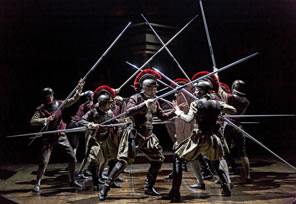
The Roman armies Renaissance-like clash at Philippi in the Elizabethan-set production of Shakespeare's Julius Caesar at Stratford Festival in Stratford, Ontario. Below, Seana McKenna as Caesar's Ghost. Bottom, Jonathan Goad (left) as Brutus and Irene Poole as Cassius. Photos by David Hou, Stratford Festival.
There I encountered, as expected, stellar acting and high production values plus, in this particular instance, an Elizabethan setting for Julius Caesar. Director Scott Wentworth wanted to use the Renaissance view of the classical world, so his designer, Christina Poddubiuk, combines Elizabethan doublets and ruff collars with togas and Roman helmets. For his staging of the battle at Philippi, Fight Director John Stead has the two armies collide in slow, choreographed movements with pikes pointed up or down in various angles, a tableaux that could have come from Froissart's Chronicles. And yet…
Wentworth says he doesn't need anybody wearing a red tie on stage to press the play's relevance to 2018. We are talking in a company conference room and lounge at the Festival Theatre after the conclusion of today's matinee performance. Shakespeare, he notes, went to great lengths to set the most famous story from ancient Rome in his own time, including frequent references to the clothes and class-conscience attitudes of Tudor society. Caesar's murder “was hotly debated in Europe at the time," Wentworth says: "Was Brutus an assassin? Was he a hero? Was Caesar a despot or was he the savior? Everybody answered that question, from Dante on down, until we got to Shakespeare, and he just kept asking the questions over and over and over again.”
Where Wentworth gets politically cheeky is before the play even starts. When the play is expected to begin, “O Canada” plays instead. The audience rises as one and sings heartily. The national anthem is a tradition only on the Festival's opening night, but Wentworth loves national anthems. "It's a great way to start a play because, other than ‘Happy Birthday,' it's usually the only song that people are willing to sing in public in a group; and they stand up.” Settling back into their seats, the audience hears a recorded acknowledgement to the indigenous people who once occupied this land. Stratford Festival instituted the indigenous peoples acknowledgement this year, but directors were given the choice on whether to play it. Wentworth checked in with a buddy, an actor in the company who is indigenous, who suggested that the acknowledgment be slipped in after “O Canada.” Finally, the Roman holiday makers come on stage wearing Elizabethan caps and aprons, led by the cobbler dressed as a jester with a red nose and using a wooden sword to spank a guy with “Gaul” scribbled on his dress.
“So," Wentworth says, "we sing this patriotic song, then we thank the people that we took the land from, and then we see a group of people who are celebrating a hero of the civil war for his conquest of Gaul, an imperial power conquering a series of tribal peoples. I just wanted to shake people up a little bit and have them realize, kind of in their bodies, that this is a play that will speak to them. Because, the history with Julius Caesar is that this is an intellectual play, it's a terse play, there's a formality to it, maybe even a coldness. I wanted to get that out of the way right off the bat, and say, no, this is about things we're still talking about.” Things like Trump.
Oh, Canada. There may be a border, but the headlines here are just as focused on Trump (Canada's stalled negotiations with the United States over the North America Free Trade Agreement) or Trump-like governance (Ontario's conservative premier bullying Toronto into reorganizing its city council). “There's nothing more emotional and fiery than people talking about politics,” Wentworth says. “So I wanted to find the emotionality in how do you define yourself as a Canadian, how do you define yourself as an American or as a Roman without saying this is about this moment here.” Orson Welles's 1937 Mercury Theatre production launched a tradition of putting the play "in the world we live in, choosing a right wing figure and saying he's Caesar and then having the liberals kill him,” Wentworth says. “But I really felt that is a very narrow glimpse at a very complicated play. If we're talking in modern terms and American terms, the thing about Julius Caesar is, he's Trump and he's Obama. He's both of them. I didn't want anything we did to close that particular door.”
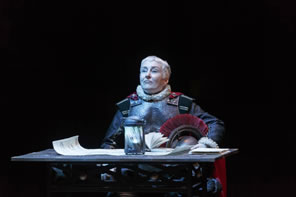 Nevertheless, the Caesar in this play, in line delivery and facial expressions, seems modeled on Trump. The irony is that a woman is playing the part, Seana McKenna in her 27th season with the Festival. McKenna is battling illness this week and isn't able to sit for an interview, so I can't ask her about the underpinnings of her portrayal, but Wentworth agrees that many aspects of it are Trumpish. Her Caesar bristles at the slightest notion of an insult, even when none is intended. Her Caesar is vindictive, purposely avoiding Cassius when the nobles fetch Caesar to the Senate. Her Caesar fixates on his own qualities, such as his constancy. Even in death her Caesar doesn't let up: Caesar's ghost turns the line “Ay, at Philippi” into a roar worthy of Jacob Marley and presides over Brutus's suicide with pursed-lips satisfaction.
Nevertheless, the Caesar in this play, in line delivery and facial expressions, seems modeled on Trump. The irony is that a woman is playing the part, Seana McKenna in her 27th season with the Festival. McKenna is battling illness this week and isn't able to sit for an interview, so I can't ask her about the underpinnings of her portrayal, but Wentworth agrees that many aspects of it are Trumpish. Her Caesar bristles at the slightest notion of an insult, even when none is intended. Her Caesar is vindictive, purposely avoiding Cassius when the nobles fetch Caesar to the Senate. Her Caesar fixates on his own qualities, such as his constancy. Even in death her Caesar doesn't let up: Caesar's ghost turns the line “Ay, at Philippi” into a roar worthy of Jacob Marley and presides over Brutus's suicide with pursed-lips satisfaction.
McKenna heads a cast that includes Irene Poole as Cassius, Michelle Giroux as Antony, and Sophia Walker as Octavius, along with Jonathan Goad as Brutus. Artistic Director Antoni Cimolino is striving for more gender parity casting in the Festival's productions, something Wentworth embraces, especially for this play. Julius Caesar portrays “the fetishization of a masculine system of values,” he says, that even the two wives in the play, Portia and Calpurnia, buy into. Wentworth says he jumped at the opportunity to bring women's perspectives to an Elizabethan staging of such a world. The plebeians are portrayed as a gender- and status-diverse crowed, and the mob that tears Cinna apart comprises only women—Wentworth citing the violent mobs of women during the French Revolution as his inspiration. The named characters, though, are not regendered; Poole, Giroux, Walker, and other women playing conspirators and soldiers are playing them as men.
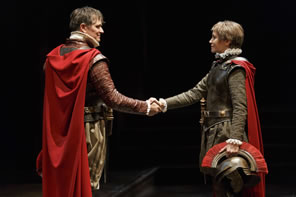 “The relationship between Brutus and Cassius, I don't think it needs any regendering,” Poole said when I interviewed her yesterday. “When I first read it, I thought a strong case could be made for playing Cassius as a woman. But I don't think it's necessary to add anything to that relationship because it's already so rich and complex and complicated that I wouldn't feel any need, as a woman, to play Cassius any differently than I'm currently playing him.” For Poole, that doesn't mean trying to act like a man. In her bearing and line readings, she's playing more to Cassius as a soldier rather than using any machismo stereotypes. Cassius's personality and intentions, meanwhile, Shakespeare gives Poole via the text. “Clarity of thought. Clarity of intention. Clarity of the stakes involved,” she says of her character. “And a rejection of this notion of greed and ambition for himself. Nowhere does he say, let's take the throne for ourselves, let's do this so we have more power. He never, ever says that.”
“The relationship between Brutus and Cassius, I don't think it needs any regendering,” Poole said when I interviewed her yesterday. “When I first read it, I thought a strong case could be made for playing Cassius as a woman. But I don't think it's necessary to add anything to that relationship because it's already so rich and complex and complicated that I wouldn't feel any need, as a woman, to play Cassius any differently than I'm currently playing him.” For Poole, that doesn't mean trying to act like a man. In her bearing and line readings, she's playing more to Cassius as a soldier rather than using any machismo stereotypes. Cassius's personality and intentions, meanwhile, Shakespeare gives Poole via the text. “Clarity of thought. Clarity of intention. Clarity of the stakes involved,” she says of her character. “And a rejection of this notion of greed and ambition for himself. Nowhere does he say, let's take the throne for ourselves, let's do this so we have more power. He never, ever says that.”
Given her textual portrayal of Cassius, the woman behind that portrayal is bugged by Brutus constantly crossing Cassius during the conspiracy and its aftermath. “Cassius knows what has to happen. He knows the right moves to make," she says. "I think it's very frustrating when that advice isn't taken seriously.” Cassius doesn't have the ultimate power to make the decisions and can only appeal to the person in power, she says, “not unlike the women in Julius Caesar who are trying to convince these men that they are making the wrong decisions but aren't listened to.”
Friday, September 14—Long Train Going
How did they get that steam locomotive into the house? I'm half listening to Micaela Fitzsimmons recount the railroad history of Stratford, Ontario, as I stare at the black, iron train engine protruding through the wall.

Theater craftspeople built this locomotive for the Stratford Perth Museum. At right, the museum's Micaela Fitzsimmons sits in one of the seats of the 1953 inaugural season of Stratford's Shakespeare Festival. Photos by Eric Minton.
Fitzsimmons is the curator and manager of collections and exhibits at the Stratford Perth Museum occupying an 1870 Victorian buff brick home on the outskirts of town. An exhibit hall extends from the back of the house, a portion of which is dedicated to Stratford's history as the hub of locomotive repair between Montreal and Manitoba for almost 100 years. The locomotive is coming through the front wall of the exhibit. With old photos and memorabilia, Fitzsimmons shows me the extent of the railroad repair shops that dominated Stratford from 1870 into the 1950s and spawned such cultural entities as choirs and bands. She then turns her attention to locomotive No. 6218 arriving through the wall—but she's talking about Off the Wall. That's a Stratford Artists Alliance program that provides instruction in theater technical arts, such as set, prop, and costume building. Artisans with Stratford Festival are among Off the Wall's teachers, and this year those teachers wanted the class project to be something more permanent than a theater prop.
And there it is, that train engine, installed just last week. At 7/8th scale, it is made of plywood, sonotube, and conduit and not an ounce of iron. The only thing that's real is the lantern.
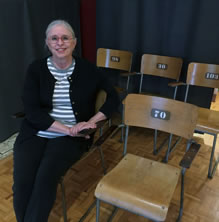 Festival artisans helping the local history museum pay homage to Stratford's railroad heritage is a relationship come full circle. Stratford's railroad shops provided everything from machinists to musicians to help get Stratford Shakespeare Festival off the ground in 1953. With the railroads switching to diesel, all of the shops here would be closed within 10 years of the Festival's start; by then, Shakespeare had become the town's economic engine. You'd think a Stratford on the banks of an Avon River in Canada would be a Shakespeare town, and it started out that way; but not until the 1950s did the city reclaim its namesake's favorite son for its own favorite son—at least up to this decade when Justin Bieber rose from busking in front of the Festival's Avon Theatre to pop superstardom. The Stratford Perth Museum has an exhibit devoted to Bieber around the corner from the railroad exhibit. An exhibit about the Festival occupies three rooms at the front of the museum.
Festival artisans helping the local history museum pay homage to Stratford's railroad heritage is a relationship come full circle. Stratford's railroad shops provided everything from machinists to musicians to help get Stratford Shakespeare Festival off the ground in 1953. With the railroads switching to diesel, all of the shops here would be closed within 10 years of the Festival's start; by then, Shakespeare had become the town's economic engine. You'd think a Stratford on the banks of an Avon River in Canada would be a Shakespeare town, and it started out that way; but not until the 1950s did the city reclaim its namesake's favorite son for its own favorite son—at least up to this decade when Justin Bieber rose from busking in front of the Festival's Avon Theatre to pop superstardom. The Stratford Perth Museum has an exhibit devoted to Bieber around the corner from the railroad exhibit. An exhibit about the Festival occupies three rooms at the front of the museum.
Festival and town seem so integrated today, it's easy to believe that they grew up together. John Corry Wilson Daly, the Canada Company agent who founded the community, named the town Stratford and the river Avon. The first permanent building erected in 1832 was the Shakespeare Hotel, its spot marked by a boulder in the city's center. By midcentury, the nearby towns of Shakespeare and Gads Hill were established, and Stratford had divided itself into five wards—Avon, Falstaff, Shakespeare, Romeo, and Hamlet—which also became the names of their public schools (imagine going to Falstaff school). The town celebrated the tricentennial of Shakespeare's birth in 1864, an event that made news reports as far away as Boston. The performance arts continued to flourish in Stratford, especially music and musicals, but by the dawn of the 20th century, Shakespeare had taken a backseat to the railroad as the town's raison d'être.
Yet, bucking the railroad ensured Stratford's Shakespearean future. Beginning in 1885, the town began purchasing land along the Avon River to create public parks. In 1903, the Canada Pacific Railway, a rival to the established Grand Trunk Railroad, proposed building a line through town along the river, a proposal promising economic riches but a loss of the riverfront as a public space. The town resisted, establishing the Parks Board in 1904. Its leader, Thomas Orr, set about preserving more land along the river. After a 10-year political battle, the town voted against the new railroad line, and the parks expanded, culminating in Orr's Shakespeare Garden in 1936. The town's foresight proved fruitful. As the era of steam was nearing its terminus, the city was giving birth to a Shakespeare festival specifically because of the park space available for a large, tented theater.
That open space is part of what enticed Tyrone Guthrie. At the time the world's leading director of Shakespeare plays, Guthrie agreed to become the Festival's first artistic director on two conditions: He would have full artistic control, and the festival should aim to become Canada's premier classical theater in scale (large, enclosed theater) and quality. Achieving such a status from the get-go was a formidable task, both financially and psychologically. Despite its name, Stratford was seen by larger cities as a podunk town in the middle of nowhere. Did this rural backwater really think it could become the center of Canada's theater universe, landing the likes of Guthrie to direct, Tanya Moiseiwitsch to design, Alec Guinness to play Richard III, and Irene Worth to play Helena in All's Well That Ends Well?
Stratford accomplished all that thanks to a name second only to Shakespeare in stature in the town's history, Tom Patterson. A Stratford native and journalist, Patterson wasn't much of a Shakespeare lover, but he advanced the idea that his hometown could reap economic benefits from its namesake's famous playwright. After getting a nominal sum from the city council to pursue his idea, Patterson used dogged determination and a string of fortuitous connections to hook up with Guthrie and then meet with Guinness and convince him to sign on. Patterson then generated support among initially skeptical townspeople. Once he got the momentum going, the town kept it rolling, even when finances fell short. Donations came in the form of children turning over their earnings from lemonade stands and the owner of a small construction company keeping his men building the theater's infrastructure even after payments to his firm dried up.

A bust of Shakespeare overlooks his garden in Stratford, Ontario. Photo by Eric Minton.
Eighteen months after Patterson first broached his idea to the city government, Stratford's Shakespeare Festival opened on July 13, 1953, with a Richard III that garnered international acclaim for both Guinness and the Festival. The next night, All's Well That End's Well opened. Three days later, Guthrie and company began planning the 1954 season. The town was overwhelmed with the influx of visitors. Homes became temporary hotels, church basements became restaurants. Stratford has no such problem today. The 32,000-peopled town serves some 500,000 annual visitors to the Festival with a full spectrum of lodging, restaurants, and boutique shops. Yet, downtown retains its quaint early 20th century look, the neighborhoods retain the town's rural community quality, and those lovely parks still line the river.
The Festival, now operating four theaters (the Tom Patterson Theatre is being rebuilt and scheduled to open with the 2020 season), has weathered artistic and economic ups and downs over the years, including the post-9/11 border controls and the 2008 recession. However, the company ended 2012 with a $3.4 million deficit and declining attendance. In 2013, the Festival hired new leadership: Anita Gaffney as executive director and Antoni Cimolino as artistic director. Gaffney streamlined operations. Cimolino honed the focus of the artistic program, formatting play selections (12 in all) to fit into a single overarching theme. They initiated the Forum, a season-long series of audience programs paralleling the productions, making the Festival a more all-encompassing destination. These measures have led to rising attendance, five consecutive seasons of fiscal surplus, and a record level of donations, $14.3 million, in 2017.
Along with their obvious leadership skills, the two directors have something else in common: longevity. Cimolino came up through the acting and directing ranks; longtime patrons remember him playing Romeo in 1992. Gaffney, who joined the company as a publicity assistant in 1991, rose through the management ranks. Both have long experience with the audience and the community, as well as experience watching the leadership that came before them. “Anyone doing these jobs, they are doing it 24-7, and you've got to love it and be evangelical about it all the time,” says Gaffney. Her roots in the company go back much further than her first day on the job 27 years ago. Her father was Oliver Gaffney, the local builder who kept construction going on the theater without pay in 1953.
Before starting my journey home today, I spend the last half hour of my weeklong visit to Stratford in Anita Gaffney's office, a final immersion in this town's DNA. Her father's initial sacrifice, she says, “was a big signal to people in the community that this was something they should all get behind. And he has been much praised for that. The Festival has always been something revered in my family. I certainly never thought I was going to work here when I was growing up because I wasn't an actor or artist, but I feel really privileged to be a part of it now. It's part of why I treat everything like it's so incredibly important because it's been bred in me that you do everything you can to help this place be successful.”
It's an ethos characterized by Guthrie after that inaugural season when he said, “Up in little Stratford, they did not know it could not be done. So they did it.”
The Two Gentlemen of Verona,
Tennessee Shakespeare Company
Various Locations, Memphis, Tennessee, September 22
“There's nothing else you can do,” says Leanna Keyes, the stage manager for Tennessee Shakespeare Company's Free Shakespeare Shout-Out tour. She spent most of the troupe's performance of William Shakespeare's The Two Gentlemen of Verona sitting at her post in a corner of the covered patio at Memphis' Wiseacre Brewery. She is standing now, back to the stage, watching a train rumble past on tracks about 50 yards away. She could be counting the cars as a measure of hope: surely, the train's end is near. But, no. She sighs in exasperation. Most of the other 50 or so people on the patio, however, are laughing and clapping.

Tennessee Shakespeare Company's van is unloaded for a Shout-Out production of William Shakespeare's The Two Gentlemen of Verona at Beale Street Landing in Memphis, Tennessee. Photo by Eric Minton.
At the play's climactic moment—right when Valentine and Sylvia have reconciled and the disguised Julia is about to reveal herself to Proteus—the two-engine freight train arrives. Carmen-maria Mandley, tour manager and a cast member, jumps out from behind the makeshift stage's curtain backdrop and shouts, “TRAIN!” whereupon the cast on stage line up and, with a “five-six-seven-eight,” start tap dancing. The train keeps coming. Marquis Archuleta, who plays Thurio and is the troupe's choreographer, does an Irish jig across the stage. The train keeps coming. The cast invites audience members to join them and form their own locomotive snaking through the seating area. The train keeps coming. The cast resumes tap dancing. The train keeps coming. About five minutes have passed, and Mandley calls a halt to the troupe. “We're going to talk really loud,” she tells the audience, and the play resumes. The train keeps coming. Finally, some dozen shouted lines later, the train's last car passes.
I hate to say this is the highlight of this day, but it is one of two—well, one of three as the other highlight this afternoon repeats in tonight's show. The train dance break certainly is a singular moment in my life's worth of Shakespeareances, and it comes up in later conversations with a couple of special people who attended this afternoon's show. Immediately after the play, I walk up to my brother, John, and his first word to me is "Train!" He repeats that three times tonight when he and I and our wives, his Judy and my Sarah, all get together for dinner. It's in admiration, however. Not only did he appreciate the company's wherewithal in the moment, he and Judy, who live in Memphis, also enjoyed the show, and that's the real news here. They have never liked Shakespeare. In fact, John has a t-shirt emblazoned with the phrase “God I hate Shakespeare,” a souvenir from a touring production of the hit musical Something Rotten that he and Judy attended this year as part of their theater subscription. The phrase is the title of a song laudatory of Shakespeare, by the way, but most people don't know that. John says that when he wears it, passersby will say “Amen” to him.
John and Judy and those who follow the gospel of John's t-shirt are exactly who Tennessee Shakespeare Company is trying to reach with its Shout-Out series. The goal is to win Shakespeare fans one passerby at a time.
Dan McLeary, born and raised in Memphis, had a good gig as part of Shakespeare and Company in Lennox, Massachusetts, where he became an artist manager in 1993. He worried, however, that Shakespeare wasn't reaching the people who need him most, like those in McLeary's impoverished, violence-riddled hometown. He founded the Tennessee Shakespeare Company in 2008, and his newlywed wife, Stephanie Shine, left her position as artistic director of Seattle Shakespeare Company to serve as Tennessee Shakespeare's general manager and education director, among other duties. The company's website lists three "beliefs":
- William Shakespeare and his stories are for everyone, regardless of ethnicity, race, educational background, geography, gender or gender preferences, or economic ability.
- The plays of William Shakespeare should be central to every child's formal education.
- Memphis and Tennessee deserve a world-class, professional Shakespeare company.
Belief number three: After 10 transient years, Tennessee Shakespeare last year purchased Memphis Ballet's former property in Cordova, an eastern suburb, to be its headquarters and home theater. Belief number two: Shortly after founding the company, McLeary began coordinating with schools to combine the company's touring productions with classroom lessons. Most important in this effort is The Romeo and Juliet Project, a program created by Shine that uses Shakespeare's play as a starting point for teaching high school freshmen lessons in life choices, violence resolution, and peer pressure. Belief number one: McLeary knew that to make Shakespeare for everyone he would need to take Shakespeare to everyone, so he launched the Shout-Out tour last year.
This year's Two Gentlemen of Verona tour has scheduled 11 performances at 10 locations around Memphis. Shine directed the company of nine actors and one dog in her 75-minute adaptation of the play. She cut out matter superfluous to the plot (Launce's inventory of the milkmaid is gone) and streamlined the rest (the opening scene of Valentine and Proteus parting is down to a dozen lines). Her goal, she tells me, is to keep the staging simple and the story moving.
Last night I caught the show at Beale Street Landing overlooking the Mississippi River (and with it an entirely new challenge in ambient noise: riverboat whistle). Today, I'm traveling with the company for its two shows. I meet Archuleta, van driver, at the company's new headquarters and help load the Elizabethan costumes designed by Janice Benning Lacek. When we arrive at Wiseacre, Mandley and Keyes are figuring out where to line out the play space and arrange the seating on the patio, which has a stage. They decide to put the play space opposite the stage; the stage then becomes a second tier of seating. The company creates a square, thrust theater with chairs, benches, and picnic tables on three sides and the small curtain backdrop on the other. That backdrop and a ladder wrapped in a curtain serving as Sylvia's window comprise the set. The actors change into costume in the brewery restrooms and do a fight call. The titular characters (Shaleen Cholera as Valentine and Nicolas Dureaux Picou as Proteus) walk through their wrestling match at various speeds, and slapstick stunts involving Speed (Mandley) are tested in the space. The patio's benches are designed like wheelbarrows, their handles sticking into the aisles, requiring adjustments to their positions and the actors' movements.
There's a cast change today. In one of last weekend's shows, also near railroad tracks, the company discovered that Dudley, the wolfhound mix playing Crab, was so frightened of trains he froze. This afternoon, his understudy fills in, Saban, an energetic beagle. Just as Launce (Zach Williams) calls him a “cruel-hearted cur,” Saban crawls into the lap of a man in the audience (I learn later the man is Saban's owner). Mandley has announced the play to the patrons watching college football on televisions in the bar. By the time the play starts, almost all the seating in the patio is occupied. Some family and friends of the cast (and of the visiting journalist) are in attendance as are a few regular patrons of the company, but the show also has drawn people out from the bar.
The play's serious moments are played with suitable gravitas. Cholera delivers Valentine's moving soliloquy after his banishment to pin-drop silence. Otherwise, the production amps the comedy to a farcical degree. The problematic final scene is punctuated with the entire cast shouting an incredulous "What!?" when Valentine "gives" his girlfriend Sylvia (Merit Koch) to Proteus, who had just tried to assault her; and "What?!" again when Julia keeps Proteus. The outlaws comprise Tyler Vernon as a Mexican bandit with cigar clinched in teeth and Williams as a James Dean rebel in leather hat and biker jacket. When Valentine agrees to be their captain, he next appears as a prototype train robber in a cowboy hat, black mask, and black vest. Joining them for their last scene is Mandley as a pirate, with an eye-patch and crooked finger for a hook. As the rest of the ensemble say “awwww” for the love reunions of the final scene, we hear one “arrgggh” in the ensemble. The cast constantly works the crowd with direct address, especially Michael Khanlarian. As the Duke of Milan, he woos a woman in the front row while describing a woman he says he intends to marry. As the Host, he finds an empty place at a picnic table behind the front rows of seats to watch Proteus, Thurio, and company sing “Who Is Sylvia?” and falls asleep per the text. As Khanlarian's Host nods off, his head lands on the shoulder of the woman next to him. She takes a selfie, beer bottle in hand.
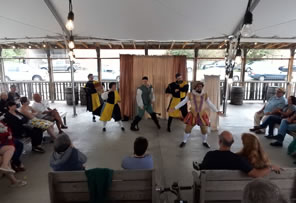
Cast members of Tennessee Shakespeare's Shout-Out Two Gentlemen of Verona company perform "Who is Sylvia?" at Wiseacre Brewery. From left are Zach Williams, Carmen-maria Mandley, Nicolas Dureaux Picou (as Proteus), Tyler Vernon, and Marquis Archuleta (as Thurio). Photo by Eric Minton.
This happens just ahead of “Who Is Sylvia?” the highlight that tops "Train!" Shine charged Archuleta with one guiding imagery for the song: make it a shout-out to Memphis native Justin Timberlake. Archuleta's melody samples strains of various NSYNC, Backstreet Boys, and Mr. Big hits, and he leads the ensemble in a dance that borrows moves from popular boy band videos, most notably “Bye, Bye, Bye” (a line Archuleta's Thurio actually inserts into his text later). I was wowed last night when I first saw this interlude, which prompted a little girl to dance along; it is even better today, and I can't wait to see it again tonight.
I start noting the crowd. As the play moves into the climactic scenes, one guy gets up from his bench seat and climbs onto the picnic table with beer in hand to get a better view of the rest of the play. The guy next to me has been exuding an attitude of bare tolerance for much of the play, but in the final scene when Proteus argues “In love who respects friend?” "All men but Proteus," Koch's Sylvia replies, delivering the line in our direction. “True enough,” the guy next to me says out loud, and I realize how attentive he has become. He even shouts “Huzzah” at play's end.
Let's count at least four passersby, including John and Judy, won over by this Shout-Out Shakespeare. The enthusiastic applause indicates the entire crowd enjoyed spending 75 minutes—well, 80 minutes—of their afternoon with this Shakespeare show. After we strike the set and load up the van, Archuleta and I join Cholera and his girlfriend for a quick lunch. This is my second encounter with Cholera on the Shakespeare Canon Project: He played Antipholus of Ephesus in Kentucky Shakespeare's The Comedy of Errors. We then head over to Memphis's famous midtown district of Overton Square, where we set up a theater on an amphitheater stage in Chimes Square. Another 50 people attend this evening show, many between the ages of children and young adult. Dudley is back as Crab, Julia (Symone Williams) is truly worried about the wind scattering Proteus's torn-up love letter, Khanlarian's Duke and Archuleta's Thurio, both in character, hallo a barcycle passing by as if the partiers are old friends, and “Who is Sylvia?” kills again.
We strike the set again, I say goodbye to the ensemble, and ride with Archuleta back to the theater, a great opportunity for me to have him break down the anatomy of “Who is Sylvia?” for me. From the theater I make the short drive to meet up with my brother, sister-in-law, and wife for a late dinner. "Train!" John says by way of greeting.
Saturday, September 29—The Never-Ending Story
Dean was a sickly boy growing up in North Wilkesboro, North Carolina, during the Great Depression. Infections left him with poor vision and weak lungs, and a bout with tuberculosis landed him in a sanatorium when he was in his early teens.
Patsy was from a broken home with an alcoholic father who, alone, was trying to raise her and her older brother. When times got particularly tough, he would leave Patsy with his sister, Kate, in North Wilkesboro. On one such occasion, Patsy's Aunt Kate told her brother, don't come back, and took over guardianship of the girl.
Dean was smart and determined. He used his stay in the sanatorium to get ahead in school as he pursued his dream to become a doctor, a pilot, and a minister: He saw himself treating people on weekdays, flying his airplane on Saturdays, and preaching on Sundays. Patsy was an accomplished musician, in the school's marching band and playing piano at church. And she was beautiful, physically and deep in her soul.
The first time Dean saw Patsy, he determined he would marry that girl. Patsy heard of this from a friend and thought, no way, he is too arrogant. Dean eventually won Patsy over (gifts to Aunt Kate helped smooth the way). He was still in college (Wake Forest University) but already a preacher (Moravian Falls Baptist Church) when they got married in 1950. In 1952, they had their first son, Dean Jr., in Louisville, Kentucky, where Dean was attending Southern Baptist Theological Seminary. In 1955, they had their second son, John, in Elizabethtown, North Carolina, where Dean was the pastor of the Baptist Church. In 1958, they had their third son, me, a couple weeks before leaving Elizabethtown for Dad's next pulpit in Mars Hill, North Carolina.
Dad joined the Air Force Reserve that year and went on active duty as an Air Force chaplain in 1961. His assignments meant Mom and Dad set up homes every 2 1/2 years: Stead Air Force Base in Reno, Nevada; Ankara, Turkey; Davis-Monthan Air Force Base in Tucson, Arizona; Eielson Air Force Base near Fairbanks, Alaska; Wurtsmith Air Force Base in Oscoda, Michigan; and McGuire Air Force Base in central New Jersey. I went to college while Mom and Dad had two more stops in his Air Force career, RAF Lakenheath in England and Keesler Air Force Base in Biloxi, Mississippi.
 He had become a preacher and a sky pilot (Dad's poor eyesight didn't allow him to be a real pilot, but he was around and flew in aircraft all his life). Doctor was Dad's next calling. After retiring from the Air Force, he went to Bowman-Grey School of Medicine at Wake Forest to become a physician's assistant. He worked for psychiatric practices in Winston-Salem and in Charlotte, North Carolina.
Through both of Dad's careers, Mom maintained the cleanest and most organized home known to mankind. She also did a bit of entrepreneurship as an Avon Lady during her time as an Air Force chaplain's spouse (a title indicating double duty in the military environment), working in the Belk's department store china section while Dad was in medical school, and selling Premier Jewelry after they moved to their final home in Charlotte.
He had become a preacher and a sky pilot (Dad's poor eyesight didn't allow him to be a real pilot, but he was around and flew in aircraft all his life). Doctor was Dad's next calling. After retiring from the Air Force, he went to Bowman-Grey School of Medicine at Wake Forest to become a physician's assistant. He worked for psychiatric practices in Winston-Salem and in Charlotte, North Carolina.
Through both of Dad's careers, Mom maintained the cleanest and most organized home known to mankind. She also did a bit of entrepreneurship as an Avon Lady during her time as an Air Force chaplain's spouse (a title indicating double duty in the military environment), working in the Belk's department store china section while Dad was in medical school, and selling Premier Jewelry after they moved to their final home in Charlotte.
Mom collected things. OK, she was obsessive compulsive. First it was bells then decorative eggs and plates—hundreds of commemorative plates. While they were living in England, Mom took up brass rubbing, creating framed art from the ceremonial brasses on the tombs of medieval knights, bishops, noblemen, and ladies, including one Shakespeare character, Eleanor, wife of Gloucester, in Richard II (Shakespeare himself references these memorials in Henry V: "A many of our bodies shall no doubt find native graves, upon the which, I trust, shall witness live in brass of this day's work."). Mom rubbed almost 400 brasses. Then she got into baseball (autographs) and teddy bears. She would end up with more than 3,000 plush critters (I'm not exaggerating—we had to find homes for most of them when she died). One of her first and favorite teddy bears was Baron, a grizzly in a sitting position with paws that could give you a hug. Before they moved into a retirement center and needed to “downsize” (getting down to just 20 times the stuff most people have in their homes), Mom gave Baron to me as a birthday gift.
As Mom entered end state in her eight-year experience with cancer—she refused to say she was "battling" cancer—Sarah flew from Utah (her Air Force station at the time) while I flew down from a journalism assignment in Washington, D.C. Sarah took Baron with her. When she arrived in Charlotte, Sarah carried the teddy bear into the bedroom. Mom looked up from her pain, brightened as she said “Baron!!” and reached out to take the bear and hug it tight (Sarah got a hug, too, but everybody in the room, including Baron, knew the priority in the moment). Mom died in December 2007.
Dad had a severe stroke in February 2010. He survived and dedicated himself to rehabilitation, but he never regained full motor capability in his right side or his speech. He lived another six years until his body, trained to manage so many work-arounds, finally broke down. He died in March 2016.
Today is the final chapter of their lives, a weekend that was blocked out on my calendar even before I conceived of doing the Shakespeare Canon Project this year. We're carrying out Patsy's and Dean's final wish.
I'm driving to a place that was particularly significant in their love life. The love of my life, Sarah, is in the seat beside me, and buckled into the backseat is Baron. Behind me are two Minton China urns and the ashes that I've been guardian of for the past 30 months. Spider, the plush animal that had for so long sat on Dad's computer desk and has been my constant companion on the Canon Project, is with the urns. At our destination is Dean Jr. (Deano, a caricaturist in Destin, Florida, whose work can be found on Shakespeareances.com, including the logo) with his wife, Mary, and John with his wife, Judy. He works for Federal Express in Memphis, she is a nurse (Sarah and I spent last weekend with them on my visit to Tennessee Shakespeare Company). I hand the urns to my brothers. The urns are identical, so we don't know which is Mom's and which is Dad's, but it doesn't matter. After John leads us in a short moment of remembrance, he and Deano shake the ashes out into the wind. Dean and Patsy return to the elements of the earth as a single entity. It's a peaceful moment, inspiring, and calming, too.
Part of their wish was that all three sons would be part of the moment. Well, duh! We didn't need any such prompting. We've always jumped at any opportunity to gather as a family. I'm proud to say we are special because Mom and Dad were special. Despite all the moves, they provided us a comfortable, loving home where we were taught how to be polite and caring. Everywhere we lived became a base for exploring the region and its culture. Thanks to Dad's assignment in Turkey, I visited the Holy Land, the Seven Churches of Asia Minor, and all of the European countries on the Mediterranean before I was in the third grade. I've written in a previous entry how Dad carried the mission of Martin Luther King Jr. to his Baptist church in Elizabethtown. He began advocating for gay rights in the military back in 1967, and gave spiritual support to a transgender Air Force pilot in the mid-1970s.
Watching Mom and Dad interact with the world, we three sons learned to be respectful, tolerant, and courageous, and how to give of ourselves, not just money, to assisting people in need and community causes. Watching Mom and Dad work in and outside the home, we understood what effort and achievement truly mean. Watching Mom deal with cancer and Dad deal with his stroke, we saw resilience and grace in one spirit. In the way they treated us, we felt love and the privilege of trust.
I learned how to cook directly from my Dad. I learned how to organize and design directly from Mom. Through both I fell in love with baseball. Music was a mainstay in our household. Mom and Dad loved opera and ballet. They dug popular music, too. I took Mom with me when I covered a Bruce Springsteen concert. They attended the theater. Through our parents, we learned to appreciate culture. I didn't come to Shakespeare through them. I discovered Shakespeare of my own volition, unaware until I did so that they were fans, too. While I was in college and visiting them stationed in England, they took me to Stratford-upon-Avon and live theater in London, Cambridge, Norwich, and Bury St. Edmunds. From my parents I learned Shakespeareances.
The six of us (plus two plush animals) spend the rest of this day together. We walk around the hallowed family grounds for awhile and then hang out at the hotel before going to dinner together. There we are joined by John's middle son, Dan, and his girlfriend, Suzanne. They drove the two hours to join us tonight (Dan assisted me when I as executor was settling Dad's estate). John has three children. I have two. Deano has a stepson. During the course of my travels this year I will have spent time with each of the third-generation descendants of Patsy and Dean. From Mom and Dad we learned the blessings of family, which has been passed on to their grandchildren.
Did I say final chapter? Patsy's and Dean's lives have many more interesting, exciting, and heartwarming chapters to come.
For a full tribute to my parents in the moment of my father's death, click here.
Love's Labour's Lost, Oregon Shakespeare Festival
Allen Elizabethan Theatre, Ashland, Oregon, October 2
A lone skyscraper, the Ashland Springs Hotel—and it's only nine stories tall—sits in the middle of this cityscape. The dominant feature of this town’s skyline is the high hills paralleling both sides of downtown. The hills on the other side of town from the parking deck adjacent to the Oregon Shakespeare Festival complex, where we've parked our rental car, are folds of green varying from lush to sage. Behind us is a forested ridge just turning fall, brush strokes of orange and dabs of yellow amid dark green swaths.
We've never been here this time of year, and it is beautiful. It's always beautiful in Ashland, a town of just over 21,000 in southern Oregon, 20 miles from the California border between Portland (4 1/2 hours north) and San Francisco (5 1/2 hours south). This is our third visit. We come here for the Shakespeare, and each time we ponder settling here. We're not uncommon. We learn in our interactions with people in town that many initially came for the Shakespeare, returned for the town, and ended up relocating here for the area. Nearby trail heads take you into the mountains. One of the world's most dramatic ocean shorelines is a crow's flight away (but three hours by car because of the forested wilderness between here and there). Even in this epoch of global warming, the area offers four distinct seasons, though a fifth season has been making frequent appearances when Ashland is not so beautiful: “Smoke Season.” This past summer, wildfires resulted in Ashland recording some of the worst air quality in the entire nation, and locals tell us that over the course of four weeks, a brown haze hung on the town so thick they could not see two blocks distant. The Oregon Shakespeare Festival had to cancel its preshow Green Shows on the theater plaza because of the smoke.
It's a bustling town, but at its own easy pace. It's a vibrant town, but merely soaking in the environs is part of its vibrancy. Just off the main drag and below the theater complex is Lithia Park, with shady trees bordering open lawns and providing coves for picnic tables on the banks of Ashland Creek rippling over a rocky bed. At a playground in the park, a swing set is occupied by one child and a grandparent-age couple. A guy sits at one picnic table with a chess board and a sign announcing “Chess Therapy” on one side and “Chess Doctor” on the other. He's waiting for patients—or his next triumph. Sitting on a park bench is a 20-something guy in shabby clothes, scraggly hair, and pointed beard. He looks like he belongs on the cover of a 1971 LP. As we approach, he walks away uneasy, leaving a wake of hasn't-had-a-bath odor.
Ashland, we're told, used to be a hippy town. Vietnam draft dodgers who had fled to Canada later trickled down to Ashland, giving the town a street-people vibe. Today we encounter a gathering of musicians jamming on the town square. Demographically, however, Ashland has shifted to a wealthier and older demographic as high-tech entrepreneurs discovered the community.
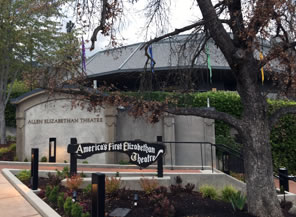
Oregon Shakespeare Festival's Allen Elizabethan Theatre. Photo by Eric Minton.
The one constant has been William Shakespeare. Although Southern Oregon University is in Ashland, Shakespeare is the town's chief industry. On the highway heading into town we pass the Ashland Motor Company, its sign bearing an illustration of Droeshout's Shakespeare driving a convertible. Downtown is the Bard's Inn and the All's Well Herb and Vitamin Shoppe. At the very hub of downtown, both geographically and socially, is the three-theater complex of the Oregon Shakespeare Festival, the oldest Shakespeare festival in the country. "America's First Elizabethan Theatre" a sign proclaims near an ivy-covered wall, the remnants of a 1,500-seat domed structure built in 1917 for the Chautauqua movement, an effort begun in the late 19th century to bring culture and entertainment to rural communities. That movement died out in the 1920s, and the dome was torn down in 1933, but its concrete wall was left in place.
Angus L. Bowmer, a teacher at the Southern Oregon Normal School (which would become Southern Oregon University), thought that wall resembled sketches he'd seen of Elizabethan theaters. He proposed producing a festival of Shakespeare plays within the walls in conjunction with the city's 1935 Independence Day celebrations. WPA funds built the theater inside the Chautauqua walls, and the city advanced Bowmer $400 to stage his festival with the proviso that he also use the stage for boxing matches to cover the losses the plays would incur. Twelfth Night kicked off what Bowmer optimistically billed as the "First Annual Oregon Shakespeare Festival" on July 2, 1935, followed the next night by The Merchant of Venice, and then a repeat of Twelfth Night on the Fourth of July. Ticket sales not only covered the costs of the productions but recouped the losses the boxing matches incurred. Shakespeare was Ashland's heavyweight champion, and Bowmer's optimism was well founded. The Festival has been an annual event since that inaugural season every year except 1941–1946 when Bowmer served in World War II.
Tiny Ashland became a bold dot on the Shakespeare map in 1939 when the Festival took its production of The Taming of the Shrew to the Golden Gate International Exposition in San Francisco, from where a radio broadcast reached a national audience. NBC Radio and Armed Forces Radio began broadcasting the Festival's plays in the 1950s, further solidifying the company's fame. A new theater replaced the original in 1949, and 10 years later that was replaced with the current half-timber structure. Now named the Allen Elizabethan Theatre, it is based on the Fortune Theatre in 1599 London. The indoor Angus Bowmer Theatre opened in 1970, allowing the Festival to begin its season in February and extend it deep into the autumn. The Black Swan studio theater came online in 1977, and the new Thomas Theatre took over its mission in 2002. The Festival draws about 100,000 visitors a year, its 11-play season achieving a total attendance of more than 381,000 in 2017, despite nine performances in the Allen Elizabethan Theatre being cancelled that year because of smoke. The Festival has completed the traditional Shakespeare canon (the First Folio's 36 plays plus Pericles) three times over, in 1958, 1978, and 1997.
Given its long history and traditional setting—but in keeping with the town's temperament—the most remarkable quality of Oregon Shakespeare Festival is the cutting-edge nature of its operations as well as its productions. It has an aggressive diversity policy in the hiring of its acting company. It has launched a controversial program called "Play On! 36 Playwrights Translate Shakespeare," commissioning modern reworkings of Shakespeare's plays. It has premiered many new works, including the "American Revolutions: The United States History Cycle," a Shakespeare-inspired series of plays centered on America's historical characters and events. We saw one such play on our 2012 visit here, Robert Schenkkan's All the Way about President Lyndon Johnson's first year in office, which went on to New York and won a couple of Tony Awards (for a review of that production, click here).
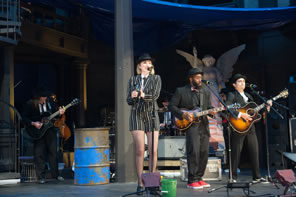
The Designated Mourners, featuring, in the front from left, Royer Bockus (Jaquenetta), Cedric Lamar (Costard) and Shawn Taylor-Corbett (Moth), perform in Oregon Shakespeare Festival's production of Shakespeare's Love's Labour's Lost. The backing band members are Rachel Crowl on guitar, Michal Palzewicz on cello, Reed Bentley on drums, and Alex Magni on bass guitar. Photo by Jenny Graham, Oregon Shakespeare Festival.
The Shakespeare here tends to be cutting edge, too. Like tonight's Love's Labour's Lost, directed by Amanda Dehnert, who lauds Shakespeare's literary and dramatic management of words in the play. “Words rhyming, words meaning two things at once, romantic words set down on paper, and sharp-witted words launched in volleys like arrows,” she writes in her program notes. “The playwright plays with his writing, and all that wordplay creates this giddy, fantastical realm—a gorgeous paper castle that stands, then, in stark relief against the plain language of reality.” Yet, what stands out about her production is the music, the original songs she and co-composer Andre J. Pleuss thread into the play. This production is a musical in the sense that the characters reveal their emotional states in song, but it plays more like a rock concert with Shakespeare wrapped around it. The opening act is the Designated Mourners, a band that, it turns out, is mostly comprised of characters in the play. The main attraction is The Muscovites, “reunited for one night only,” featuring the King of Navarre (Daniel José Molina) on drums, Berowne (Stephen Michael Spencer) on guitar, Dumaine (William Thomas Hodgson) on keyboard, and Longeville (Jeremy Gallardo) on cowbell. They play for the Princess of France (Alejandra Escalante) and her women, all dressed in slinky red skirts, fishnet stockings, and aggressively high heels and platform boots.
Dehnert sets the play in a cacophony of colors, sights, words, and playfulness. The main characters cover themselves in paint as the play progresses. A giant pink pig occupies the upper reaches of the stage, and the King won't tell Berowne why it's there. Sir Adrian O. Dearmaddow, an English makeover of Don Armado played by Oregon Shakespeare veteran Richard Howard, wears a white leisure suit covered in scripted segments of sonnets. Spencer's Berowne, debating the proclamation for Navarre's academy that sets the play's plot in motion, asks for a program from a patron in the front row. Leafing through the cast lists, he suddenly says to Molina, "You are playing two kings this season!" Molina sheepishly acknowledges the fact (he's also playing Shakespeare's Henry V). Though Dehnert rearranges passages and trims much of the script's obtuse humor (but turns the moral and l'envoy of the goose, the fox, the ape, and the humble-bee into a rap), this Love's Labour's Lost still keeps the play's beating heart and brings home the heartbreak at the end. In this flurry of frenetic energy emerges one of the most profoundly singular Berownes I've witnessed, Spencer skillfully reimagining Shakespeare's tone for the witty lord with a life's-a-lark attitude and almost constant interaction with the audience. For the first time, I consider Berowne to be the closest Shakespeare came to an autobiographical portrayal in his canon.
Spencer's is a performance that is timely yet timeless, a new way of seeing a 16th century intellectual scoundrel as one of our own. Such timely timelessness exemplifies this company and the town that orbits it.
Thursday, October 4—A Most American Shakespearean
Shaun Taylor-Corbett is playing Moth in Oregon Shakespeare Festival's production of William Shakespeare's Love's Labour's Lost. We'll be talking to him in a bit; I'm just mentioning his name now.
Here are some other names of actors cast in the production: Daniel José Molina as Ferdinand, the King of Navarre; Alejandra Escalante as the Princess of France; Stephen Michael Spencer as Berowne; Tatiana Wechsler as Katharine; Armando Durán as Dull; Cedric Lamar as Costard; and Alex Magni as a member of the band. Go ahead and apply your ethnic and racial assumptions to that list. Remember, though, that names do not point to sexual orientation, gender identity, or transgender people, and the Love's Labour's Lost cast covers that spectrum, too. Last night we saw Romeo and Juliet with William Thomas Hodgson (mixed race) as Romeo, Greg Watanabe (Japanese American) as Capulet, Sara Bruner (woman) as Mercutio, Monique Holt (Deaf) as Lady Montague, and Lauren Modica (little person) as Gregory.
Oregon Shakespeare Festival is a leading practitioner in casting diversity, a tradition that predates Artistic Director Bill Rauch, who took the company's reins in 2007. “It's a longstanding commitment at this Festival, and we all stand on the shoulders of the giants who came before here in Ashland, Oregon,” Rauch says during an interview in his office in the Festival's downtown Ashland complex. It's also personal for Rauch. “I'm a gay man with a Deaf brother with cerebral palsy and two mixed-race children, so it's reflecting my world as I understand it.” Under Rauch, the Festival has heightened its diversity conscience, in the company, in the community, and among the audience. When Rauch took over, the acting company was 22 percent people of color: “Today it's 70 percent actors of color,” he says. This year's Festival Playbill includes pronoun preferences for those company members and guest artists who wish to reveal their gender identity: she/her/hers, he/him/his, or they/them/theirs.
“It's a fact: The United States is a diverse country and becoming increasingly diverse,” Rauch says. “So, the question is not whether or not we live in a diverse society. The question is what we do with that fact.” Rauch knows that, to some Americans, this looks like a liberal political agenda. “No, it's a human agenda,” he says, and, by extension, a Shakespearean agenda. “Shakespeare's work is so vibrant because he crams such a cross-section of humanity into every play and across the body of the canon. My goodness! How do we dare to call ourselves a Shakespeare theater and not reflect the full diversity of the nation and the world that we live in today?” Rauch echoes the refrain I've been hearing from San Diego to Memphis to Stratford to New York: that Shakespeare is an American playwright by virtue of the diversity within his plays reflecting the diversity of America. Rauch even calls the Bard a “radical populist.” “I know every culture feels like they see themselves reflected in Shakespeare, so I know there's probably some stupid American exceptionalism at play in me saying it, but I do think there's something about cultural collision that is particularly Shakespearean and particularly American. I really do believe that.”
Ironically, the one population in America that tends to be overlooked in discussions of diversity is the one with the only solid claim to being American: the continent's indigenous people. Oregon Shakespeare Festival last year produced its first Native American play, Choctaw playwright Randy Reinhold's Off the Rails, an adaptation of Shakespeare's Measure for Measure. Rauch directed it. “Thank goodness for Off the Rails,” he says, for it launched a string of Native-authored plays at the Festival this year and next. “With 10 native actors in the acting company now, 10 percent of our acting company are Native actors. And it all came about thanks to Off the Rails.”
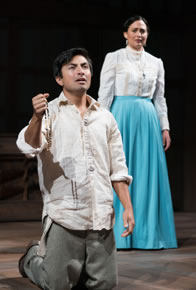
Shaun Taylor-Corbett as Momaday prepares for his death as Isabel (Lily Gladstone) watches in the Oregon Shakespeare Festival's 2017 production of Randy Reinholz's Off the Rails, an adaptation of William Shakespeare's Measure for Measure. Photo by Jenny Graham, Oregon Shakespeare Festival.
Meet, again, Shaun Taylor-Corbett, Love's Labour's Lost's Moth. I meet him at the Bricks, the plaza at the center of the Festival's theater and office complex, and we walk to a Starbucks around the corner. He is of Blackfeet descent (along with Swedish, African-American, and Irish). He debuted with the Festival last year and played Momaday in Off the Rails, the Claudio character of Shakespeare's original. He and I range across our 90-minute conversation covering Love's Labour's Lost (for which he played guitar in public for the first time), the Oregon Shakespeare Festival (he's also in Henry V playing Nym, John Bates, and the Earl of Cambridge), and his experience in the cast of In the Heights on Broadway with Lin-Manuel Miranda. We also talk about his heritage as both Blackfeet and Shakespearean. He trained at The Public Theater's Shakespeare Lab in New York and the Royal Academy of Dramatic Art in London. His stage credits include playing Romeo at Will Geer's Theatricum Botanicum in Los Angeles. Though he had gravitated into musical theater, his Shakespeare training and experience helped him tackle what he says was one of his most difficult roles, Frankie Valli in a touring production of Jersey Boys.
“I've always seen myself as an artist first,” he says over coffee as I down my second chai tea latte of the afternoon (I interviewed his castmate, Stephen Michael Spencer who plays Berowne, in this same Starbucks in the hour before I meet Taylor-Corbett; my brain is getting deep-fried with sweetened caffeine). Growing up on Long Island, New York, he says, "I always thought, I'm an artist; no matter what my identity is or background, that's where I start from.” His neighborhood buddies were Italian and Jewish—he even went to a Jewish camp. As he began asking about his own heritage, his mother (who provided his Swedish DNA) offered to take him to the Blackfeet Reservation in Montana when he was 15. “The Native identity for me has really given me power,” he says, and he's made it his life mission to help preserve Native languages. “All the different stories that haven't been heard yet in Native country, I want to champion and bring to the forefront.” As he was ending his run with In the Heights, he began writing a musical based on his Blackfeet visit, Distant Thunder, which he co-wrote with his mother. “I saw what In the Heights did for the Latinx communities and the youth around the country, and I said I'd love to have a Native musical like In the Heights for Native people,” he says.
Shakespeare in his later plays makes a couple of specific references to indigenous Americans, including the character of Caliban in The Tempest. In his own interactions with Shakespeare, Taylor-Corbett says he hasn't encountered anything that particularly addresses the Native American experience, except perhaps in Henry V. He is one of several cast members speaking the part of Chorus, a character who reflects the prevalence of oral storytelling in Native cultures. “I just feel so cool being a person of Native identity and doing Shakespeare, without even necessarily finding something culturally tying me to it yet,” Taylor-Corbett says. With that comes the opportunity to be a role model for other Native people. “Growing up, some of my favorite actors were not people of color, and to me it doesn't affect how much I love them or don't love them, but I didn't know if I had a spot doing Shakespeare because, A, it's hard and you have to be really damn good to do it, and B, what company will take that chance and have such a mix?” Oregon Shakespeare Festival is one such company, but it took Off the Rails for Taylor-Corbett to get the opportunity to play here (he also played in Disney's Beauty and the Beast last season). But, he notes, he was not in Mary Kathryn Nagle's Manahatta this year, nor was he cast for next year's Between Two Knees created by the Native American sketch-comedy troupe the 1491s. Instead, Taylor-Corbett has been cast to play Oliver in As You Like It and Lennox in Macbeth next year. “I'd love to do another Native show,” Taylor-Corbett says, “but I'm just an actor who happens to be a person of color doing Shakespeare.”
Richard III, upstart crow collective and Seattle Shakespeare Company,
Leo K. Theatre, Seattle Repertory Theatre,
Seattle, Washington, October 6
Porscha Shaw is finishing up a light breakfast at Café Zingarro, a coffee shop across the street from Seattle Repertory Theatre. She is playing three characters—Lady Anne, Second Murderer, and Richmond—in William Shakespeare's Richard III at the Seattle Rep's 282-seat Leo K. Theatre. Our conversation turns to Lady Anne's most prominent scene in the play, when Richard woos her to marry him even as she's following the corpse of her father-in-law, King Henry VI, whom Richard had killed. "Was ever woman in this humor woo'd? Was ever woman in his humor won?" Richard famously says after Anne's left the stage. What's playing out on the national political stage this very day has become a context for both Lady Anne and the actress playing her as the U.S. Senate is voting to confirm Judge Brett Kavanaugh as Supreme Court justice, compressing the 425-year passage of time between Shakespeare's composition and today's political realities.
Shaw describes her difficulty coming to terms with Lady Anne in the wooing scene, how she gives in to Richard despite the extent of her hatred of him, beyond the fact that he's killed her father, husband, and father-in-law. The key guidance Shaw received from her director, Rosa Joshi, was noting how “Richard's toxicity is greater than Anne's power,” Shaw says. This sends my mind to the Senate chambers back in Washington, D.C., where Kavanaugh's gilded path to confirmation had run into accusations of sexual and other behavioral impropriety, leading into the petulantly ballistic manner of his defense. Criss-crossing the continent with my wife in my company this year, I've been conversing with many women of all ages and social strata and have witnessed a seething frustration building in women who are gagging on the toxic social, economic, and sexist posturing of privileged white men wielding political power.
I ask Shaw, “With the Senate vote coming this afternoon,”—I don't even need to clarify what vote—“how does the wooing scene reflect on what women are going through right now?” She hesitates long enough for me to ask, “Or is there a connection?”
“Oh, I think there's a huge connection,” Shaw says. “Rosa talked a lot in our rehearsal process about complicity, how people become complicit, and Anne 's moment of switching for Richard as a moment of complicity. She's out of power. What's she going to do? He's killed everyone who could ever protect her, and she's alone in the street. I think it speaks to how sometimes no matter how hard you fight against something, when the system is founded on toxicity—because Richard's family is in power—there's only so much you can do if you are not willing to literally die.” Or figuratively die via threats to your family, via slander, via lost livelihood, or via “who you are as a person [being] stripped away from you,” Shaw says. She pauses, then continues. “You would think that would be left in history. You would think that once people saw people hanging from trees, we should not get to that kind of situation. I don't want to fight so much against a cause or the government for my rights about how to use my body that I end up hanging from a tree.”
The Richard III I'm here to see is a coproduction of the upstart crow collective (note to copy editors: that's all lowercase) and the Seattle Shakespeare Company. The upstart crow collective was founded in 2006 to produce “classical works with all-female casts for contemporary audiences,” says its literature. The company staged King John in 2006 and Titus Andronicus in 2012. Then came Bring Down the House, a two-part conflation of Shakespeare's Henry VI trilogy produced with Seattle Shakespeare Company in 2017. The production proved such a hit—winning Seattle's annual Gregory Awards for Best Production, Best Ensemble, Best Director, Best Actress, and Best Supporting Actress—that mounting Shakespeare's sequel became inevitable.

The Space Needle and the International Fountain, the centerpieces of Seattle Center. Photo by Eric Minton.
The reputation of Bring Down the House is what brought me to Seattle. Well, that and the wedding of my youngest son, Ian. When I learned that upstart crow's Richard III would be kicking off the Seattle Shakespeare Company's 2018–2019 season, and that the play's run would end on the weekend of Ian's nuptials, I booked it. Unfortunately, while I've been able to land interviews with upstart crow members in the three days I'm here, I've not been able to book meetings with anybody from Seattle Shakespeare Company itself to get a better feel of the company's place in the city's cultural landscape. Theater in general, at least, has a prominent presence in the city's physical landscape surrounding Seattle's iconic centerpiece, the 605-foot-tall Space Needle built for the 1962 World's Fair. The 74-acre exhibition grounds comprise Seattle Center, containing museums, sporting venues, multipurpose halls, and theaters. Near the center of the grounds is The Armory, built in 1939 and now housing, among other activities, the 202-seat Center Theater, Seattle Shakespeare Company's indoor home (the company does summer Shakespeare in the park shows, too). On one corner of Seattle Center is the site of the Seattle Playhouse built for the World's Fair. The year after the Fair, Seattle Rep debuted in the Playhouse with a production of King Lear and grew into its current two-theater structure on the site in 1983. Next door to that is the Cornish Playhouse; next door to that is the home of the Pacific Northwest Ballet; and next door to that is the new home of the Seattle Opera. Also on the Seattle Center grounds is the Frank O. Gehry–designed, multicolored slug of a building that houses the Museum of Pop Culture, better known as MoPOP. In there you'll find the largest collections of artifacts associated with Seattle native musicians Jimi Hendrix and Nirvana.
Richard III is playing on Seattle's theater row, but MoPOP and its contents speak more to the production's aesthete under Joshi's direction. The set with a black brick background consists of what look like suspension bridge cables angling out of triangular bases. Set Designer Shawn Ketchum Johnson has turned the stage into a large musical instrument: the actors pluck these cables to create various tones at key points in the play and use the cable bases for percussion. The cables also represent guillotines for the execution of each of Richard's victims. Costume Designer Christine Tschirgi dresses the 15-member cast in all black: modern shirts, jeans, boots, satin lapel jackets, and cloaks with attached capes. The only color on the stage is skin and some costume accoutrements: a gold pin, chain, belt, or medallion. Lighting Designer Geoff Korf supplements his ominous stage lighting with flashlights that actors shine on a character's face during soliloquies.
The play opens with such a flashlight spot on Sarah Harlett's Richard. The hands of other cast member reach to Harlett out of the darkness, grabbing parts of her body and helping her step forward. The hands take hold of different parts of the body and help Richard take another step. This repeats, like bringing Frankenstein's monster to life, a man created by his society, as Richard moves to a microphone at the front of the stage to deliver his opening “Winter of our discontent” speech. Harlett reprises the character she played in Bring Down the House, using posture to represent Richard's physical deformity and a sneering aspect with occasional maniacal laughter to represent his deformed soul. I've seen so many famous Richards on stage—Derek Jacobi, Kevin Spacey, Mark Rylance, Ralph Fiennes, and a couple of indelible performances in Antony Sher (Royal Shakespeare Company) and Ian McKellen (National Theatre)—but the key to portrayals that were superior to these are those that continue the role from the Henry VI cycle. My favorite all-time Shakespeare experience was seeing Benjamin Curns capping the three-play arc (over three years) with his portrayal of the titular Richard III for the American Shakespeare Center in 2012 (click here for a review). Harlett, too, benefits by playing the backstory that Shakespeare gives the character (instead of the actor merely guessing at one). Such performances attain the truth in Richard's final soliloquy after the ghosts of his victims visit him, and Harlett makes that soliloquy heart-wrenching, a man coming to terms with what he's become, someone he himself can't even admire.
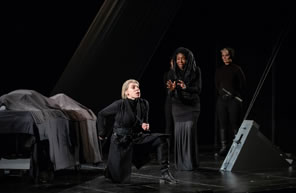
Richard III (Sarah Harlett) offers to kill herself in wooing Lady Anne (Porscha Shaw, center) as Mari Nelson stands guard of Henry VI's corpse under the sheets on the left in the upstart crow collective and Seattle Shakespeare Company's production of William Shakespeare's Richard III. Photo by HMMM Productions, Seattle Shakespeare Company
Harlett leads a strong company displaying piercing focus on the text, such as Chantal De Groat's Hastings. So many Hastings I've seen are weak, gullible, or blatantly naïve; De Groat's Hastings is as ruthless as the rest, heightening how dangerous Richard is in his own grab at the crown. As Buckingham, Suzanne Bouchard employs the smooth gentility of a subtle politician, pointing to another timely lesson of this production. Not only is tyranny itself an existing danger, so are all those Buckinghams in political arenas who abet or condone the rise of that tyrant. While acting in their own self-interests—whether ideological, economical, or political—they are selling short their country and inevitably shortening their own existence, falling victim to the nature of the monster they help create. In this Richard III, after each character meets his or her grisly end, the player slowly, expressionlessly walks offstage as the subsequent scene begins. This includes the young princes, who are killed on stage in this production. As they walk off, we see Shaw's Lady Anne strolling across the back of the stage as Richard says, “The sons of Edward sleep in Abraham's bosom, and Anne my wife hath bid the world good night.” The next time we see Shaw, she's Richmond, dressed in white shirt, jeans, and jacket, walking across the stage being formed by the hands of other cast members.
I was originally scheduled to meet with Harlett and Shaw together this morning at the Café Zingarro, but Harlett is a no-show (Shaw thinks Harlett is battling illness). Shaw tells me she loves her acting arc through the play, not only in the variety of her characters (tragic Anne, comic Second Murderer, and triumphant Richmond) but also in her Richmond exacting a measure of revenge for her Anne. The 26-year-old Shaw had a “very Southern Baptist” upbringing in Richmond, Texas, she says, which gave her a love for heightened language and music. She didn't embrace Shakespeare until her graduate work at the University of Washington in Seattle, where she just finished her third year in the Professional Actor Training Program. This is her first production with upstart crow, and she revels in soaking in the knowledge of the “Shakespeare warriors” in the cast.
Being the only person on stage dressed in white, Shaw's Richmond is clearly cast as the savior in the society of upstart crow collective's Richard III, a savior nevertheless built by that society. Shaw delivers Richmond's closing speech at a microphone at the front of the stage, a similar setup to the opening scene with Harlett's Richard. Joshi has trimmed and rearranged Richmond's speech so that after his references to a new era of peace and smiling heaven, the stage lights go out and Shaw's face is isolated in a flashlight beam, her white outfit lost in the darkness, her smile turned dangerous. “What traitor hears me, and says not amen?” she says, and the flashlight extinguishes, leaving the theater in darkness and the sound of the audience reacting to a gut punch.
Sunday, October 7—Shakespeare Aside, Here's True Love
After leaving Jonathan at his swim lesson, I took Ian to the playground adjacent to the pool. Ian was 5 years old. My two sons from my first marriage were with me for their court-ordained seven-week summer visit. This was in Dayton, Ohio, where Sarah and I were then living. With some editing to do, I sat on a bench to work, occasionally glancing up to make sure Ian was OK. We were alone until a couple of mothers arrived with their children. I kept working until “Excuse me, sir?” broke my concentration. One of the mothers had approached me. “Is that your son?”
Uh-oh, I thought, and looked over at Ian. He was perfectly safe and playing by himself. I looked at the woman and determined that she was indeed referring to my son. “Yes,” I replied. What had Ian done? I wondered. “Is he…” The woman paused as she gathered up her courage, “reciting Hamlet?” I looked back at Ian, and, yep, he was acting out a scene from Hamlet, though not quite the right words. I turned back to the woman. “Yeah,” I replied, now wondering why this was an issue. “I don't believe it!” she said. “I can barely even read Hamlet, let alone recite it.” I could only shrug and tell her that my wife and I exposed my sons to a lot of Shakespeare, including taking them to their first live productions, Hamlet and Twelfth Night, at the American Players Theatre in Spring Green, Wisconsin, earlier that summer. That experience initiated Jonathan's path to becoming a Shakespearean actor. His performance of the Shakespeare-penned speech in Sir Thomas More for Night Shift's Drunken Shakespeare in New York City was stop number nine on the Shakespeare Canon Project.
Ian, now 29, didn't pursue an acting career beyond his playground and school days, but he is still a Shakespeare fan and helping me with my Shakespearecurean project, creating meals themed on Shakespeare plays. His marriage this weekend in Seattle serves as the impetus for stop number 38 on the Canon Project tour. He moved here to Seattle late last year after spending the bulk of his life in and around Anchorage, Alaska. Visiting us over New Year's, he told us he would be getting married sometime in the autumn. He later announced the date of October 5 for the private wedding ceremony (nobody invited) and October 7 for the wedding reception (everybody welcome) at the Seattle Glassblowing Studio where he works as a packager. So, Sarah and I came to Seattle this weekend to celebrate Ian's wedding. Seeing upstart crow collective's Richard III at Seattle Shakespeare Company was gravy.
Before that show last night, Sarah and I met for the first time our new son-in-law, Joshua Quinton: Minton-Quinton, Quinton-Minton—there's serendipity. When I gave Ian my play schedule while in Seattle, he asked that I book an accompanying ticket for him and Josh. I later realized that Josh already would be my son-in-law by the time we'd meet him. Some people have been surprised that I had not before met the man my son would marry, though Ian and Josh have been a couple for about two years. Josh's work schedule precluded his joining Ian for the New Year's visit. Besides, I was confident Ian had made a good match.
Ian had “an interesting childhood”—his words—tied to growing up with divorced parents. By his account, he had trouble making friends with peers. My sons didn't have steady playmates when staying with me every summer at our various homes (we moved every two or three years because of Sarah's Air Force assignments), despite my attempts to give them social opportunities through swim lessons, community center activities, baseball camps, and, one year, ballet class. When I published an online newsletter covering the amusement industry, Ian, still in middle school, served as my paid assistant and made several close friends among roller coaster enthusiasts—but they were all adults. He always was wiser and more mature than most people his age—still is (heck, he's more mature and wiser than most people my age, including his father). He became a mentor for kids with autism while still in high school, later a job coach for The Arc of Anchorage, and then an employment advocate for the homeless. He always seemed well-adjusted.
However, early in his life, he says, he began coming up with imaginary friends who would eventually begin to take over his life and behavior. In 2010, Ian was diagnosed with Dissociative Identity Disorder, a form of schizophrenia involving multiple personalities. “It's a coping mechanism to deal with some kind of trauma or prolonged issues, whatever they may be,” he says. “Basically, those issues are compartmentalized into different personalities that address them in different ways.” Some personalities are modeled on real people, some are “manifestations of a deeper id or psyche,” he says. He knows his various personalities by name. As a journalist who specialized in writing about people with disabilities and as a man who suffers ongoing depression, I know that mental illnesses tend to be chronic. A significant other can play a huge role, positive or negative, on an individual's mental health. Ian had been in such a negative relationship for awhile.

Joshua Quinton, left, married Ian Minton in their new home, Seattle, Washington. Photo by Eric Minton.
Enter Josh, who grew up in Alaska the son of a wildlife photographer. Josh was working for a company that arranges custom tours of Alaska when he and Ian met online. They began dating and soon set up a household together in Wasilla. They moved to Seattle last year for Josh to pursue a degree in linguistic anthropology at the University of Washington (he currently works at a boutique hotel in downtown Seattle). Of all the life changes Ian made that improved his condition over the past few years, meeting Josh and moving to Seattle were “really, really, really big,” to use Ian's words. He had talked before about how Josh, fully accepting Ian's condition, has been a psychological stabilizer for him and keeps him grounded and safe if personality shifts do occur. Who wouldn't want such a husband for their son?
Last night's Richard III was the second staged Shakespeare Josh has seen. Years ago he attended a Fairbanks Shakespeare Theatre production but doesn't remember what play it was. He's not read any Shakespeare, but he enjoyed the play last night, and he no doubt has been exposed to Ian's enthusiasm, just as Ian and his brother were exposed to my enthusiasm. Sarah and I read plays to them before bed, showed them videotapes of the BBC series Shakespeare: The Animated Tales (hosted by the most incomparable of Shakespeareans, Robin Williams), and took them to live stage productions from Wisconsin to Alabama, Atlanta to Stratford, Ontario. Their mother also cultivated Shakespeare and theater opportunities for them at home in Anchorage. On one of their Christmas visits with me when my parents were also visiting, we all worked on a puzzle with a montage of images from Shakespeare's plays. Ian sought to identify each image, including a woman without hands and wearing a mask. Titus Andronicus, I told him. “There was mention of somebody's hands and tongue being cut out,” Ian recalls, “and I thought, [WTF] is happening in Shakespeare?!” In the fourth grade, Ian was in a production of A Midsummer Night's Dream that prompted him to become even more immersed in Shakespeare “as a way to entice and make my teachers appreciate me more,” he says. “I rediscovered Titus Andronicus, and I thought, Let's find out about this hand and tongue getting cut off. So, fourth grade was the first time I read a Shakespeare play in its entirety, and it was Titus Andronicus.” Not only that, Julie Taymor's film Titus was the first R-rated film he sneaked into, “well before any of my parents would let me.” He argues that, thanks to me, he already had seen Macbeth's bloody baby on the Stratford Festival stage and up close during a backstage tour, “so I considered myself justified in my desensitization to Shakespearean violence.”
Titus Andronicus, meanwhile, provided special advantages for him in school. “It was an obscure-enough Shakespeare play that my teachers in Anchorage, Alaska, were not really familiar with it. None of my classmates had any idea what it was. I could just throw together a book report real quick and draw all sorts of themes from it, and nobody would ever question me about it because, yeah, it's Shakespeare, right on! Ever since then I saw the practicality and the feasibility and the availability of Shakespeare and the relevance of it.” He also developed a distinctive writing style shaped by Shakespeare, even with the job-coaching strategies Ian wrote for his clients with developmental disabilities at The Arc of Anchorage and his grant proposals for various programs. His supervisors marveled at the lyricism in his writing, he says, and his current boss at the glassblowing studio also has commented on his stylish emails.
I get to meet her and Ian's other coworkers at tonight's reception. My niece, Kelly, and her boyfriend, Tim, are on hand, too. They drove up from their home in Portland. This is our second meeting with them this year, as they were visiting with her brother, my nephew David, in West Lafayette, Indiana, when we stopped there on our way from Winnipeg (Timon of Athens) to Louisville (Comedy of Errors) in June. We also spend some time with Ian's mom, our first encounter in almost 10 years, catching up in a pleasant conversation. As Ian takes us on a tour of the studio and its operations, I'm amazed, as I always am, with his knowledge of the minutest details of things. That trait appears in his appreciation of Shakespeare, too. What's also on display is how much his coworkers and employers love him. He's pure passion and compassion wrapped in flesh.
Upon meeting Josh last night, we welcomed him into our family and got a report on the previous night's private marriage ceremony (Josh and Ian and two others, one licensed to marry them, the other the requisite witness, had the ceremony at a favorite park between rainstorms). We were sitting around a table in the Seattle Repertory Theatre lobby before Richard III, and a moment of silence descended on us. I was experiencing one of those momentous benchmarks in a man's life, the first of my offspring to get married, and I simply wanted to soak in the occasion and all it meant, past, future, and, of course, present, finally meeting Josh. Then I couldn't help myself. I hope the twinkle in my eyes sufficiently masked a degree of seriousness behind them as I leaned forward and looked steadily at the cozied couple across from me. “So,” I said, “when can I expect grandchildren?”
Thursday, October 11—Checking The Forecast
We red-eyed home from Seattle, Washington, to Washington, D.C., arriving at Dulles International Airport shortly after dawn on Tuesday. Thirty hours later we were back at Dulles, flying out for our next date, Prenzie Players' production of William Shakespeare's and John Fletcher's Henry VIII in Davenport, Iowa.
As we repacked for this trip, I checked my iPhone weather ap. Davenport seemed to be continuing a heat wave through the weekend with temperatures topping 90 on a couple of days. I switched out my long sleeve shirts for polos, and Sarah removed her sweaters from the suitcase, lightening the load. Heading out the door, I suggested we grab our jackets because “you never know,” as we discovered shivering through Southern California evenings in June. Arriving at the Quad City International Airport (Davenport along with Betttendorf, Iowa, and Moline and Rock Island, Illinois, comprise the Quad Cities), I saw the tarmac crew in coats, stocking hats, gloves, and scarves yet still obviously cold in a brisk wind. As we waited to deplane, I pulled out my iPhone. Moline came up on the weather ap at 48 degrees and lower forecasted for the weekend, with a chance of snow on Sunday. How can a state line, even if it's the Mississippi River, make for a 30-degree difference in temperature? I looked up Davenport again and this time noticed a choice of two Davenports, Florida's and Iowa's—in that order. Uh-oh. At least we brought jackets.
They were barely enough to ward off the chill as we headed this morning to Starbucks in Molina where I meet Mischa Hooker. He's on the marketing committee for the Prenzie Players board, and he's also in the cast of Henry VIII playing the Lord Chamberlain and Griffith. He volunteered to coordinate my visit here and has set up a full itinerary of interviews for me this weekend with cast and longtime company members. At the Starbucks, I pick up a copy of the River Cities' Re@der, “your key to Quad Cities' Culture.” Back at the Hampton Inn, I flip through the 28-page tabloid for a cursory glimpse at the area's arts and entertainment scene and come upon a spread that, at first glance, gets me snickering. I read aloud to Sarah the titles of the two features: on the left-hand page, “The Science Advice Goddess,” a column by Amy Alkon, and opposite that the “Free Will Astrology” by Rob Brezsny. What kind of life tips for a troubled couple would a science advice goddess offer? Pretty good, I discover as I actually read it. Alkon cites sociological studies in her answer, wiping the dis from my initial disrespectful attitude.
OK, so what is “free will” astrology? I stopped reading horoscopes long ago because they always read like BBC weather forecasts for England, pretty much everything is going on for everybody somewhere. It occurs to me that in the past few months I haven't had any supernaturalistic omens regarding the Canon Project like those I experienced in the early stages of the project. Not that it really matters now. I've got just four more theater visits and 3 1/2 weeks to go. What seemed like divine guidance and Sarah's will inspired me to get this far, but those encouraging portents last winter didn't foretell how Sarah's neurological prognosis would become the governing factor in our lives, including the possibility that she will never again be employable. My primary concern now is trying to ensure we have cash flow into next year. I likely will have to find full-time employment before I finish writing Where There's a Will. Appending my desire for a reassuring omen to my sense of amusement, I start reading out loud my Free Will horoscope for Taurus. “According to PopBitch.com, most top-charting pop songs are in a minor key.” OK, I can't imagine a stranger opening to an astrological reading. “In light of this fact, I encourage you to avoid listening to pop songs for the next three weeks." Really? "In my astrological opinion, it's essential that you surround yourself with stimuli that don't tend to make you sad and blue, that don't influence you to interpret your experience through a melancholic, mournful filter. To accomplish the assignments that life will be sending you, you need to at least temporarily cultivate a mood of crafty optimism.”
I sit quietly for a moment. “Huh,” I say.
“Sounds about right,” Sarah says. Yeah, she should talk. Sarah insists she wants to get well enough to go back to work. Her condition, though, is not improving: the seizures continue on an irregular basis, her memory functions on a semiregular basis, and her cognitive skills have no regularity at all. I've told her that, given her long career of service, she has every right to spend the rest of her life as a veritable cat (and I'm good to cats). She won't hear of it. And yet, she can't grasp work-around techniques I give her to deal with her cognitive issues, she won't cultivate habits that could counteract her memory lapses, and she shows no iniative to take the reins of her prognosis herself. Without a firm diagnosis while her neurologist pursues a “work-in-progress” plan as medical treatment, what can I do?
Well, not give up, for one thing. “Let's see what yours says,” I say, and read Scorpio. “There is no such thing as a plant that blooms continuously. Phases of withering and dormancy are just as natural as phases of growth. I bring this fact to your attention to help you remain poised as you go through your own period of withering followed by dormancy. You should accept life's demand that you slow down and explore the mysteries of fallowness. You should surrender sweetly to stasis and enjoy your time of rest and recharging. That's the best way to prepare for the new cycle of growth that will begin in a few weeks.”
I can't even speak. I just look up at Sarah in time to see the amusement in her face give way to confident contentment. "That sounds about right, too," she says.
Seems there's something to this “Free Will Astrology.” For Where There's a Will…
Henry VIII (All Is True), Prenzie Players
Davenport, Iowa, October 12
Last December, when I told the folks at New York's Fiasco Theater that I was leading off the Canon Project with their Twelfth Night, Co-Artistic Director Noah Brody replied, “That's quite an audacious project. Who is bold enough to do Henry VIII?” The answer, it turns out, is Prenzie Players in Davenport, Iowa. It turns out, too, that this was inevitable for this place and this time: Henry VIII, a Shakespeare–John Fletcher collaboration first staged in 1613, is a perfect fit for 2018, and the Davenport theater company was destined to do it this year.
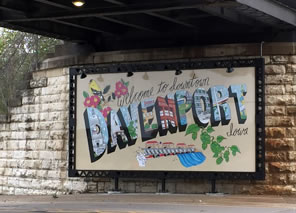
"Welcome to downtown Davenport, Iowa" sign greets traffic crossing the Mississippi from Rock Island. Photo by Eric Minton.
Davenport is one-fourth of the Quad Cities, neighboring with Bettendorf on one side of the Mississippi River and Moline and Rock Island, Illinois, on the opposite bank. Despite four individual municipalities and two state governments, this close-knit confluence of communities embraces its unified Quad Cities identity (in fact, East Moline wants to be known as the fifth Quad City). The collective cities have a hip arts scene with some dozen community theaters, including the Quad City Music Guild, based in Moline, that has produced musicals since 1949, and the Genesius Guild that has produced free Shakespeare and Greek drama in a Rock Island park since 1956.
In 2003, a group of Genesius Guild actors wanted to do Shakespeare year-round and go deeper into the canon. They formed Prenzie Players, performing in vacant stores, warehouses, and various other venues among the Quad Cities. The company now performs at the Quad Cities Theatre Workshop's 40-seat studio theater occupying a former school in a Davenport neighborhood. In moving indoors and to more intimate spaces, Prenzie's players grew more intimate with Shakespeare's texts, honing their understanding of each play's staging intricacies and their own textually driven deliveries, engaging in direct address and including audiences in the play's action. Now in its 16th season, Prenzie Players is undertaking a campaign to complete the Shakespeare Canon by its 20th season.
Mischa Hooker is the coordinator of my visit. A member of Prenzie's marketing committee, he also is playing both Lord Chamberlain and Griffith, Queen Katharine's usher, in Henry VIII. He has set me up with a four-day itinerary of 10 interviews with cast members and founding company members. After my initial meeting with Hooker, my next interview requires a half-hour drive north to Geneseo and the home of Angela Rathman. Why? I wonder: She's not a founding member, and she's playing three minor roles in Henry VIII: Patience (Katharine's waiting woman), the Surveyor who testifies against Buckingham, and the Duchess of Norfolk in the final scene. As we sit in her book-filled den, cluttered with toys from her grandmother babysitting duty, I'm soon enraptured by this woman—who grew up at the low end of the socioeconomic spectrum in Rockford, Illinois—as she recounts her life of community theater. Since moving with her now ex-husband to the Quad Cities, she taught Shakespeare programs for at-risk youths and acted with Genesius Guild. There she learned of Prenzie Players and found her calling, a company with which she could play The Tempest's Trinculo in hot pants and fishnet stockings, downing a shot of whisky before going on stage so that she would smell drunk when she sat on a patron's lap. Her wholehearted passion for Shakespeare is derived not from studying the Bard but living him, and not just on stage but through the experiences of troubled youths and in her own hardscrabble life.
In the evening I see her pull off one of the most immersive performances I've seen this year as the Surveyor. In this modern dress production, Rathman portrays him as a 1960s-styled New York numbers runner, altering her voice, posture, and facial muscles so much I don't recognize her. Later, at Katherine's beck, Rathman's Patience calls across the room for Anne Boleyn, shouting “Wench!” so vilely it would incite a fistfight in real life. Rathman exemplifies the attitude of this company, though most other members were born and raised here and either never left (going to college at one of the two Quad Cities liberal arts schools, Augustina in Rock Island and St. Ambrose in Davenport) or returned in early adulthood. Acting is a sideline; most have full-time jobs not related to theater. However, having grown up in this theater-rich environment, they are dedicated to the craft and their portrayals. Twenty-two-year-old Payton Brasher playing Henry is the youngest actor to play a title character in Prenzie's history. Michael Carron playing Cardinal Wolsey is now four plays shy of acting Shakespeare's canon. Kitty Israel playing Katherine worked hard to learn a Spanish accent in order to stress the text's emphasis on the queen being a foreigner in the English court without falling into caricature.
Henry VIII is so seldom played for a reason: It's overwhelming to produce but underwhelming to watch. Most characters are two-dimensional, and Henry himself is barely one-dimensional: Brasher fleshes him out by putting his impatience, both to anger and to love, on full display while also exhibiting genuine respect for Katherine. The plot is a string of four plots: Buckingham is tried for treason, Henry meets Anne Boleyn and divorces Katherine, high-reaching Wolsey falls out of favor, and Cranmer doesn't fall out of favor and ends the play prophesizing great things for the newborn Princess Elizabeth. As for the poetry, every cast member complains that Henry VIII has given them unprecedented fits in learning lines, including the veteran Carron, who came to realize that his Wolsey's rambling verse reflects the character's thinking-on-his-feet nature.
Ah, yes, Wolsey. Even when Shakespeare is at his weakest (as is Fletcher with this play, though a worthy playwright in his own right), he can't help his greatness. Wolsey is among Shakespeare's most interesting studies in human nature. He rises from a middle-class upbringing to the height of political power and wealth by outsmarting the nobles and using other more underhanded means. When he meets his sudden fall, Wolsey displays heroic traits as a truly repentant man, finding grace in his own comeuppance.
Then there is Katherine. Two of Shakespeare's criminally overlooked creations reside in the bookends of his career, and both are women: Margaret in the Henry VI tetralogy and Katherine in Henry VIII. Katherine of Aragon starts out the play as Henry's equal. As her political stature falls, her character stature heightens, and she speaks lines that could have been culled from cable news interviews and U.S. Senate testimony. To King Henry, who intends to divorce her:
Sir, I desire you do me right and justice;
And to bestow your pity on me: for
I am a most poor woman, and a stranger,
Born out of your dominions.
To Cardinal Wolsey, who serves as her prosecutor and judge:
You sign your place and calling, in full seeming,
With meekness and humility; but your heart
Is cramm'd with arrogancy, spleen, and pride.
You have, by fortune and his highness' favors,
Gone slightly o'er low steps and now are mounted
Where powers are your retainers, and your words,
Domestics to you, serve your will as't please
Yourself pronounce their office. I must tell you,
You tender more your person's honor than
Your high profession spiritual.
Coming on the heels of Richard III's Lady Anne last weekend in Seattle, Washington, Katherine's words are further evidence that Shakespeare speaks literally for women in 2018, though that simply may be due to men not evolving in proportion to the rest of society since 1613.
Director Alaina Pascarella tells me she has been lobbying to do Henry VIII for 10 years. She loves the material so much—cast members say she is an encyclopedia of the historical events portrayed in the play—that she is working on a novelization of the story. During our interview, she offers up fascinating details of Henry's relationship with Katherine and his long pursuit of Anne, historical elements that Shakespeare and Fletcher gloss over but factor into Pascarella's directorial choices. To get the production down to two hours, Pascarella made several cuts, including the Cranmer subplot (but she keeps his prophesy of Elizabeth at the end). Nevertheless, she adds a coronation scene featuring a very pregnant Anne (Anna M. Schneider), with Henry himself doing the crowning ceremony, and then combines this moment with Katherine's deathbed scene.
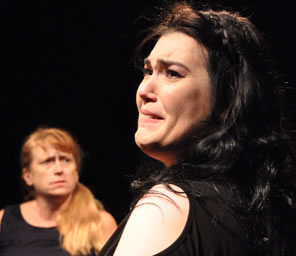
Katherine (Kitty Israel, right) endures her heartache as Patience (Angela Rathman) tends to her in Prenzie Players' production of Henry VIII. Photo by John Turner, Prenzie Players.
Pascarella's aim was to highlight Katherine and Anne while maintaining Wolsey's arc. She keeps all of Katherine's scenes and expands Anne's presence both physically and thematically beyond her two scenes in the original text, meeting Henry at the masque and a subsequent sex-pun-filled conversation with an “Old Lady.” In this production, Anne's sister, Mary (Liz Sager), replaces the Old Lady. While the other Boleyn girl is not in the original text, her speaking those lines brings historical reverberations to the scene's sexual innuendo and more incisively explores Anne's claim that she would not be a queen. Anne and Mary attend Katherine as waiting women in all but her last scene, and it is Anne (the target of Patience's “Wench!”) who sings to Katherine in Act III, Scene 1, replacing the Orpheus song in the text with “Greensleeves,” a composition credited to Henry VIII. Both Israel and Schneider describe this moment as a catfight via eyes. Katherine gets in the last word later in this scene. When Wolsey arrives and asks for private conference, Katherine replies, “Speak it here. There's nothing I have done yet, o' my conscience, deserves a corner: would all other women could speak this with as free a soul as I do!” a line she directs at the attending Anne.
Pascarella also replaces Katherine's deathbed dream of the “personages” offering her a garland with a vision of her and Henry dancing in their younger days. Brasher plays Henry at his happiest here, looking on Katherine so sweetly it breaks our hearts when we see him noticing Anne beckon to him. His expression doesn't change: He just goes to Anne, leaving Katherine alone. Henry does look back to Katherine before walking into the wings—no love lost, just displaced, but it's all the same to Katherine, whose vision this is.
This Henry VIII is a multiangled love story with pertinent political reverberations layered in. The love, though, is not just textual; it's a love story between director and play, between a community and theater, and between a company of actors and Shakespeare. Henry VIII in Davenport, Iowa; that's as it should be.
Henry IV, Part Two, Atlanta Shakespeare Company
Shakespeare Tavern Playhouse, Atlanta, Georgia, October 20
We're in Atlanta, so, of course, we're on Peachtree Street. Even from the air, the Georgia city's main drag dominates the landscape, a snaking line of buildings slithering through the lush vegetation of leafy neighborhoods from downtown to uptown to Buckhead and beyond.
We exit our hotel, the Georgian Terrace, just north of downtown. Opened in 1911, this grande dame has been the luxury choice for movie stars, famous musicians, statesmen, business titans, and socialites. We're a journalist and his sick wife staying here for its convenient location. It's across the street from the Fox Theatre, conceived as a mosque-inspired home for the Shriners (who never finished it), born as a movie palace (opened on Christmas Day 1929 with Steamboat Willie, Mickey Mouse's debut), and resurrected in 1975 as a not-for-profit theater hosting more than 250 shows a year (the touring Broadway production of School of Rock is playing there this week). We, however, are walking four blocks down Peachtree Street to the Shakespeare Tavern Playhouse built in 1990 by and for the Atlanta Shakespeare Company, six years after Artistic Director Jeff Watkins founded the company.
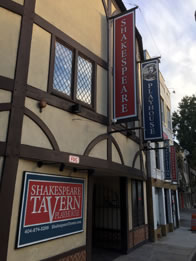
The Shakespeare Tavern Playhouse on Peachtree Street. Photo by Eric Minton.
When we first came here in 1997 to see The Tempest, Sarah was stationed at Robins Air Force Base a couple hours south of Atlanta. Back then, the walk we are taking today was nefarious, though the porn shop next door to the theater made this location perfectly Shakespearean. The first time we brought my parents here, my mom nervously asked twice, “Are you sure we're in the right place?” She never expressed that sentiment on subsequent visits. Once inside, all was good, and still is. Good food: This is a bona fide tavern, with 23 brews (six on draught, one of those locally brewed), 19 choices of wine, and pub grub that includes one of the best shepherd's pie I've had anywhere. Good company: The staff is ever-pleasant even when crushed, the audience (the 250-seat venue is sold out tonight) is relaxed and anticipating, and Watkins strolls among the tables talking to patrons in his Peachtree drawl and the wily humor of a Chicago or New York street-performing magician, which is how he started his show biz career. Good fun: The Shakespeare productions, all historically costumed and by the book, sometimes are uneven in quality, but they always are intimately entertaining as the actors bring the action to our tables. Tybalt once took a swig of my Coke before brawling with Mercutio.
One of my favorite Shakespeareances happened here. Sarah and I brought my parents and two sons for A Midsummer Night's Dream. The production was firing on all four cylinders (Athenians, lovers, rude mechanicals, and fairies), and three actor/dancers doubled as Titania's train of lithely airy fairies and as clumsy rude mechanicals. By the time Quince screamed at Bottom's Pyramus (played by Watkins) to die already, three generations of Mintons around our table were convulsed in laughter, every one of us wiping tears from our cheeks. A couple of Christmases ago, son Jonathan's gift to me was a framed playbill of that production, Puck with goat horns on his head emerging out of darkness.
Before we moved out of Georgia in 2000, I bought an Atlanta Shakespeare Tavern winter jacket bearing the company's logo of Droeshout's Shakespeare, wearing an Atlanta Braves baseball cap, clutching a mug of frothing beer. I've worn it often in our subsequent homes in Ohio, Utah, and in the D.C. area, where it gets a lot of attention. People ask, “Where is the Shakespeare Tavern?” I tell them. They ask, “It's a real tavern?” I explain it's both tavern and theater. They ask, “Doing real plays or…?” I tell them it produces Shakespeare plays, some of the best I've seen anywhere. “Oh.” Then, with a smirk tainting their tone, they ask, “Have you been to the Folger Theatre?” I tell them yes, that I'm a Folger Theatre subscriber, and that the Shakespeare Tavern produces some of the best Shakespeare I've seen anywhere. Such conversations inspired my creating Shakespeareances.com, to shed light on all the great (usually greater) Shakespeare happening away from the more famous, more established, and more endowed institutions of Shakespeareans. As the Shakespeare Canon Project was intended to put that particular truth on vivid display, I was determined to include the Atlanta Shakespeare Tavern. I didn't need to fret that: It was the only theater on the continent producing Henry IV, Part Two, this year, playing in repertory with Henry IV, Part One, which we saw last night.

A Shakespeare Tavern Playhouse audience waits for a play to begin. Photo by Meg Rose, Atlanta Shakespeare Company.
The four-block walk from the Georgian Terrace and the Fox Theatre to the Tavern Playhouse now passes condominiums, upscale apartments, and businesses. The porn shop is gone. The Atlanta Shakespeare Company has acquired an adjoining apartment building on the other side of the Tavern Playhouse that serves as its Shakespeare Academy. Laura Cole, Atlanta Shakespeare's director of education and training (and also playing Rumor, Doll Tearsheet, and Lady Northumberland in the play) takes me on a tour of the premises still undergoing major renovations to create rehearsal studios and classrooms. When we attended plays here in the latter half of the 1990s, the Atlanta Shakespeare Company was the new kid on this block and the Atlanta theater scene. Now, it is an economic driver on the block and a progenitor of Atlanta theater, thanks in large part to its Apprentice Program breeding actors who have filtered out into the community.
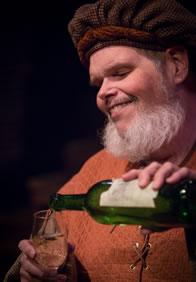
Sir John Falstaff (J. Tony Brown) helps himself to a glass of wine as he speaks on the qualities of sherry during the Atlanta Shakespeare Company's production of William Shakespeare's Henry IV, Part Two, at the Shakespeare Tavern Playhouse. Photo by Jeff Watkins, The Atlanta Shakespeare Company.
Inside the Tavern, the theater has been expanded, but nothing else has changed: the good food (the stilton salad is a great side to the shepherd's pie), the good fun (Falstaff takes a bottle of wine from one patron's table for his speech on sherry), the good company. And the company of good actors. In fact, we first saw tonight's Falstaff, J. Tony Brown, play the fat knight here in a 1999 production of The Merry Wives of Windsor. Brown, in his 27th season with the company, has played the character “ten times, give or take,” he tells me. “Sir John has become an old friend by now.”
Another “old friend” is somebody I've never formally met before today: Drew Reeves, who played an indelible Trinculo in that 1997 production of The Tempest, the Coke-stealing Tybalt in 2000, and Puck in that dream of a Dream (staring out at me from Jonathan's Christmas gift). Tonight, in Henry IV, Part Two, he brings new dimensions to Northumberland and continues his Part One scene-stealing role as Francis in the Eastcheap tavern scene. He also is the resident fight director and considers his best work to be the Prince Hal-Hotspur fight at the end of Henry IV, Part One. The brawl starts with blades, moves into a bloody fistfight, and ends after almost five minutes with a knife thrust so realistically rendered that a doctor at one performance thought Hal had really stabbed Hotspur.
For the Henry IV repertory, the three-level stage has been extended with a low, square platform thrust into the dining area. Part of what makes the Hal-Hotspur fight so intense is that it ends on that platform. Indeed, tonight, the hostess seats us at a "Table of Excitement" next to that thrust stage. “For your own safety," the placard on the table reads, "please do not move this table. If it does accidentally get moved, please see the House Manager.” Henry IV, Part Two, doesn't have any battles except the exaggerated one in the tavern with Pistol combating Doll Tearsheet, Hostess Quickly, Falstaff, Bardolph, and the general environment, the bulk of that action happening on that thrust stage. That extended platform also serves as the bedchamber where Prince Hal, thinking his father dead, takes off with the crown, leading to his final, emotionally charged interview with King Henry IV.
Henry IV, Part One, is acknowledged by most critics as one of Shakespeare's best (it's my favorite play after King Lear). Henry IV, Part Two, not so much. Sure, it has a larger dose of Falstaff, but it lacks the narrative drive, thematic unity, and sharp composition of Part One. Some actors in tonight's cast even wonder if Shakespeare was the sole writer. Watkins opines that the play “has all the hallmarks of a sequel” coming after an unexpected big hit (the historical record indicates Henry IV, Part One, was a hugely popular in Shakespeare's time). The play seems to have been written in a rush with piecemeal elements strung together until we get to the point of the story: Hal, after becoming king, banishing Falstaff. The last act—from Hal's last scene with the dying Henry through the prince's accession to the crown and subsequent reconciliation with the Lord Chief Justice juxtaposed with his final Falstaff encounter—is vintage Shakespeare delivering a poignant payoff.
This company pays it off with interest. Jonathan Horne plays Hal's arc from Part One through Part Two with shrewd psychological depth, gradually accepting his ordained fate while negotiating evolving relationships with Falstaff, Poins, his brothers, and his father. Troy Willis plays the Lord Chief Justice, balancing the role's comedy with enough gravitas in the early scenes to imbue the character with dignity and empathy. This enriches the moment near the end of the play when he must defend his previous actions toward Hal now that the prince is king. This scene, when done right, clutches at my heart, and it's done right here with the new King Henry V kneeling to the Lord Chief Justice.
Brown plays Falstaff as a comic scoundrel, but he doesn't shy away from the character's supersized ego. This Sir John has a dark edge, baring his teeth and growling when he feels cornered. Nevertheless, his shock at Hal's turning him away plays as truly tragic. Mary Ruth Ralston turns in an astounding performance as Hostess Quickly, mining comic gold in the rhythms and subtle phrasings of the woman's babbling lines. Demanding that two officers arrest Falstaff for an outstanding debt, she shouts “Do me, do me, do me your offices!” as she flings her head around, dismaying every character in the scene with the unintended sexuality of her command. I've never before seen that reading for that line, and I've never laughed so hard at a Mistress Quickly.
Yep, the Shakespeare Tavern produces some of the best Shakespeare I've seen anywhere.
The Spanish Tragedy, Hudson Shakespeare Company
Montclair Library, Westfield Memorial Library, South River Library,
New Jersey, October 23–25
We've come to the penultimate play and theater visit in the Shakespeare Canon Project, and this 41st stop offers up a number of significant firsts for the tour. My first library as a theater. My first interview with a Shakespearean actor who built his career in another country and another language. My seeing a play for the first time. I am stretching Shakespeare's Canon beyond even my previous experience by devoting a week with the Hudson Shakespeare Company as it tours The Spanish Tragedy to libraries across northern New Jersey.
William Shakespeare as playwright has been linked to five plays outside the traditional 38-play canon (the First Folio plays plus Pericles and The Two Noble Kinsmen). This year I checked off the almost-never-produced Sir Thomas More (Night Shift Drunken Shakespeare) by watching my son perform portions of a scene long known to have been written by Shakespeare. Edward III (Colorado Shakespeare Festival) is increasing its presence in Shakespeare theater repertoires, and Arden of Faversham (Shakespeare at Winedale) will do so, too, as more people discover it. Shakespeare and John Fletcher are known to have written a play called Cardenio, but the Lewis Theobald–edited version that has come down to us, aka Double Falsehood (which I saw produced in 2011), contains no remnants of Shakespeare (my opinion and that of artists who have worked on the play). I found no North American productions of that play this year, and I was fine with that (terrible play; terrible). The fifth play is The Spanish Tragedy.
Written by Thomas Kyd some time between the late 1580s and 1592, The Spanish Tragedy was Elizabethan theater's first blockbuster, inspiring playwrights from Christopher Marlowe and Shakespeare to John Webster. It launched a new genre, revenge tragedies, which notably includes Titus Andronicus and Hamlet, both bearing thematic, linguistic, and plotline connections to Kyd's play. The Spanish Tragedy was reprinted several times in the two decades after its debut, and it was revised for new productions in the late 1590s, one of those apparently by the Lord Chamberlain's Men, Shakespeare's company (lead actor Richard Burbage played Hieronimo at some point in his career). Scholars since 1833 have speculated that Shakespeare might have written the revisions and additions to the fourth edition of The Spanish Tragedy printed in 1602, and recent stylistic studies support that theory, making its relationship with Hamlet more intriguing. Might a revival of The Spanish Tragedy have prompted the writing (or revising) of Hamlet, or vice versa?
Jersey City, New Jersey, 1992. Luther Robert Johnson was an occupational rehabilitation counselor for the New Jersey Division of Rehabilitation, and after his day job, he would cross the Hudson River to work as a technician for New York theater companies, including the late great Riverside Shakespeare Company. New York was brimming with Shakespeare, but Johnson noted that the Jersey side of the Hudson had a dearth of such theater, so he launched a company of actors, now the Hudson Shakespeare Company, to tour productions to parks in Jersey City and Hoboken. Jon Ciccarelli joined some five years later and became an operating partner with Johnson, expanding the company's geographical reach across northern New Jersey (and to Stratford, Connecticut). They also widened the company's repertoire to include Greek drama as well as Shakespeare's lesser known titles and works by his contemporaries. Johnson died from complications of diabetes in 2010, “and we've just been keeping it going since then,” says Ciccarelli, now artistic director.

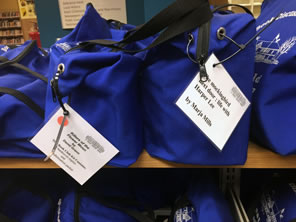
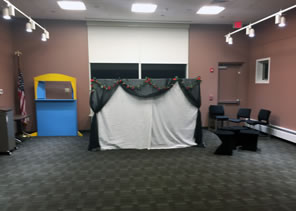
Top to bottom, the Montclair Public Library, book club kits at Westfield Memorial Library, and the Hudson Shakespeare Company's set for The Spanish Tragedy at South River Public Library. Photos by Eric Minton.
The librarians I talk with at Montclair, Westfield, and South River are glad Hudson Shakespeare Company keeps going. The Internet has undermined libraries' traditional role as a local source of free books and research, so they are intent on becoming cultural centers for their communities. Hosting Hudson Shakespeare's touring troupe of professional players has proven a popular addition to such programming. The library officials who book the shows tell me audience sizes range from as many as 70 at Montclair and 50 at Westfield to a couple dozen at South River. This week the numbers are 42, 29, and 14 respectively.
These communities lie within a 40-mile stretch of Jersey's industrialized suburbia, but they have cultural identities all their own. Montclair is such a literate community its library has a 10-section shelf devoted to Montclair authors, including Stephen Colbert, Bill Bradley, Yogi Berra, Brandi Chastain, Buzz Aldrin, and Herman Gollob, who wrote Me and Shakespeare: Adventures With the Bard. The library at Westfield (local author Charles Addams based his Addams Family mansion on homes in the town) has four shelves of “Book Club Kits,” tote bags each devoted to single titles and containing hardcover copies of that book along with an information packet. South River is a community comprising mostly Russian, Portuguese, and Latinx immigrants, and I see a diverse crowd around the front desk securing library cards or checking out books and DVDs.
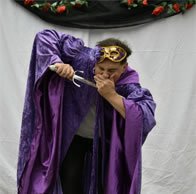
Hieronimo (Jon Ciccarelli) slices off his tongue in The Spanish Tragedy. Photo by Noelle Fair, Hudson Shakespeare Co.
Of the three, South River's audience is the most intensely engaged in the show, including a woman doing needlework in one corner. A little girl and grade-school boy (there with their mothers, despite the show's PG-13 rating) take in the stage violence and steam-punk Victorian-era costuming with wide-eyed wonder. The generally older audience at Montclair seems mostly bemused by the play, though one woman walks out halfway through. The strongest audience reaction, universal at all three libraries, comes near the play's end when Hieronimo, played by Ciccarelli, cuts off his tongue. Stagecraft covers the deed, but it nonetheless cues squeamish gasps.
It's tempting to regard Shakespeare productions in libraries as the merging of the Bard's theatrical and literary traditions, but these shows are performed in auditoriums and meeting rooms. The actors report that the tour previously visited one library where the stage was set in a space adjoining the stacks. This caused an ambient distraction I'd not yet heard of at any theater: actors glancing through books on the shelves as they await their entrances.
This production with a cast of eight and crew of one (Director Noelle Fair, the company's managing director, running fight calls and soundboard) travels in one car carrying the richly rendered costumes and one van carrying a small backdrop with a white sheet, black drapes, and a garland of roses, plus four small tables. The cast includes Juan Pablo Mendive, born and raised in Argentina, playing Balthazar, the Portuguese prince in the Spanish court—yes, the play's non-Spaniard is the only character speaking with a heavy Spanish accent, which does stress his foreignness in the story. He played in Spanish-language productions of Hamlet and Macbeth back home before coming to New York to attend the American Academy of Dramatic Arts. The Spanish Tragedy is his professional English-language Shakespeareanish debut. He cites a profound difference between performing Shakespeare in the two languages: Spanish sufficiently replicates the plays' image-filled storytelling qualities but not the rhythms of the lines, a key to Shakespeare's character portrayals.
Kyd, of course, is not Shakespeare. Is The Spanish Tragedy Shakespeare? I made a point of not reading the play before seeing it. My intent, for the sake of the Canon Project, was to experience a Shakespeare production as a Shakespeare virgin. That, it turns out, is impossible and proves me disingenuous. I've read each play at least six times and have seen 560 staged Shakespeare productions up to this point; I could more accurately be called a Shakespeare gigolo. However, not knowing the play, I wasn't sure I was seeing the actual play, making my experience similar to that of a real Shakespeare virgin seeing a Shakespeare play subjected to a director's conceptual adaptation. I knew that Fair had done some serious trimming to get the running time down to just over 90 minutes, but I learn over the course of my time with the tour that she's made some contextual changes, too, including adding two more dead bodies at the end (Revenge, acting as chorus, magically kills the last mortal character on stage, which makes for cool stagecraft if not absolute fealty to the text). Reading the play this week after seeing the shows doesn't help because I've got the 1592 text: I'm two adaptations behind the curve. There's no Shakespeare in what I'm reading, but there is in some phrases, line structures, and extended allegorical allusions that have jumped out at me during the shows. Notably, most of these Shakespearean elements are not in the 1592 edition of the play; Fair used the 1602 text, the one containing the additions identified as Shakespeare's. The actors note these internal variances, too. Kyd may have been one of the earliest champions of blank verse, but he didn't have the poetic dexterity Shakespeare displays employing the form.
While I may not be a Shakespeare virgin (I'm not even a Kyd virgin, as his pen has been linked to Titus Andronicus, Henry VI, Edward III, and maybe Arden of Faversham), I am new to The Spanish Tragedy, the godfather of Elizabethan and Jacobean theater. The play has some strange matter (Hieronimo beating the Painter makes no sense whatsoever—though that turns out to be a Shakespeare-adapted scene), but I quite enjoy how Kyd weaves a half dozen revenge plots into a single storyline. He also creates a couple of standout characters, aside from Hieronimo being an antecedent to Hamlet, and this production's best attribute is its cast fleshing out these roles. Bell-Imperia (Brett Molik) is a thoroughly modern woman. Intellectually strong, sexually free, and self-empowered, she speaks lines that sound so contemporary. Shakespeare is lauded for drawing strong female characters for his time, but the leading women in The Spanish Tragedy and Arden of Faversham are strong female characters for our time. Lorenzo is one of the most fascinating villains I've ever encountered, with much of the credit going to Jeffrey Robb playing him. What subsequent Shakespeare villain does Lorenzo serve as prototype? How about all of them: the scheming strategist Iago, the glibly violent Aaron, the politically ambitious Richard, the self-centered opportunistic Edmund, the virile despotic Macbeth, the hypocritical moralist Angelo, and the snitty brother Don John. Revenge (Anne Whitaker) is disturbingly seductive as she leads the ghost of Don Andrea (Olivia Lodge) through the play, showing Don Andrea what subsequently befalls his lover (Bell-Imperia), best friend (Horatio), and killer (Balthazar). Revenge is more than mere chorus in the play as she sometimes instigates behavior that leads to the play's concluding chaos, much to Don Andrea's satisfaction.
And our satisfaction, too, though this is no pat ending. Kyd revels overlong in mythological depictions of the afterlife, including Don Andrea opening the play by describing his journey through purgatory and ending the play assigning characters to various eternities. He directs that Hieronimo, the play's chief mastermind of revenge, be led to “where Orpheus plays, adding sweet pleasure to eternal days.” In Kyd's account, revenge not only fills the vacuum of an insufficient legal system but also ultimately is rewarded with an eternity spent in the equivalent of heaven. This is not the moralists' view, which Shakespeare adheres to in his plays, but it is the instinctually human view.
Friday, October 26—Magical Theater Tour
You may recall back on Valentine's Day this year that I was in Shelton, Connecticut, attending a rehearsal of Romeo and Juliet: Choose Your Own Ending, which would play the next night in a local bar. Directing that show for Valley Shakespeare Festival was the company's founding artistic director, Tom Simonetti, a Valley native and now resident of New York City, a commute away. I had several enjoyable conversations with him over the course of my Valley Shakespeare visit, but there was something I didn't learn about him until a couple of weeks ago when he began following me on Twitter. In his brief bio he describes himself as “your tour guide to NYC.” I saw an opportunity and emailed him a proposal.
My first theater visit for the Shakespeare Canon Project was on January 6 to see New York's Fiasco Theater do Twelfth Night at Classic Stage Company. It was a one-night-only trip. The Canon Project has brought me back to New York four times now (once for follow-up interviews with the folks at Fiasco), but other interview requests to fill out my portrayal of the city's Shakespearean essence hit scheduling snags or silence. For my current trip to northern New Jersey for Hudson Shakespeare Company's touring production of The Spanish Tragedy, all of my interviews are taking place in Manhattan where most of the company's members work their day jobs. This offered me one last chance—this being my final Canon Project trip—to gather the matter I need for the book's first chapter on Twelfth Night.
I scored twofold. Two days ago I met with Tyler Moss, artistic director for Shakespeare Forum at that company's new digs up on the edge of Spanish Harlem. Moss and his wife, Sybille Bruun-Moss, the company's executive director, co-founded Shakespeare Forum to offer New York actors free training on the Shakespearean acting techniques that the two learned during their time with the American Shakespeare Center in Staunton, Virginia. Shakespeare Forum soon expanded into producing plays, conducting theater camps for children, and doing school tours and workshops. I've known the Mosses for several years and figured tapping into their experience and connections would give me a fuller picture of the underbelly of New York theater that I had experienced only as a patron.
New York is unarguably the theater capital of the United States. It's Broadway, Off-Broadway, Off- Off-Broadway, and many more Offs beyond. Seldom does Shakespeare make it to Broadway, and most hit shows are imports from Great Britain. Nevertheless, Shakespeare is everywhere in this city, starting with The Public Theater, an internationally famous Shakespeare institute with its flagship offering, Free Shakespeare in the Park at Central Park's Delacorte Theater (the company also gave us Hair, A Chorus Line, and Hamilton). You also can find Shakespeare productions year-round in studios, parks, parking lots, vacant stores, church halls, and former sweatshop spaces as come-and-go theater companies put on plays for friends, families, each other, and other diehard Shakespeare fans. Moss recounts his time in some of these venues that are a dozen Offs off Broadway, what Simonetti (with similar experience) describes as places “where you watch a rat give birth in an ashtray.” Nevertheless, Public and Fiasco both emerged from this scene, and Moss notes how the longer-tenured companies, including Shakespeare Forum, have established social and artistic relationships with their neighborhoods, in essence becoming sub-community theaters of New York's five boroughs.
This morning comes part two of my exploration into Shakespeare's intrinsic relationship with New York City. I'm scurrying up 8th Avenue from Penn Station—having taken the train in from Linden, New Jersey, where we're staying—to meet Simonetti at Schnippers on the corner of 41st Street. One of his jobs is leading tours, mostly school groups, through New York's theater scene, and I proposed he give me a custom tour of New York's Shakespearian theater history with lunch as my treat. His enthusiastic response sets us up for a great day of discovery, fellowship, and lots of walking. Unfortunately, that last factor means Sarah is not with me. Yesterday, as we were beginning a trip to my high school stomping grounds down in central Jersey, Sarah had a seizure, and I had to get her back to the hotel. I'm not risking her getting sick as we walk block upon block of Manhattan.

The East River Amphitheater in Manhattan's Lower Eastside, the site of Joseph Papp's first Free Shakespeare in the Park production. Below, Tom Simonetti. Photos by Eric Minton.
We start with a cab ride down to the Lower Eastside and the East River Amphitheater where in 1956 Joseph Papp staged his first free Shakespeare in the Park, Julius Caesar. His second show here that summer, The Taming of the Shrew, caught The New York Times' interest and launched a tradition that would subsequently move to Central Park. Before he started free Shakespeare at the East River Park, Papp launched his Shakespeare Workshop in the basement of a Presbyterian church. That church is gone, but Simonetti takes me to the site on the corner of Avenue D and East 6th Street. We walk four blocks over and two blocks up to Theatre 80 St. Marks (its actual address) near 1st Avenue. This was an early home of the Pearl Theatre, established in 1984 with David Hyde Pierce as an original member (after a couple of moves this decade, the company filed for bankruptcy in 2017). The building has its own interesting history, starting as a jazz club during Prohibition. Frank Sinatra and Thelonious Monk performed here. It later became a theater, and in 1967 when You're a Good Man, Charlie Brown had its premiere here with Gary Burghoff in the title role, Shakespeare actor (of sorts) Billy Crystal was in the theater, too, working as an usher. On the sidewalk are signatures and handprints of several stars, including Dom DeLouise, Myrna Loy, Kitty Carlisle, and Joan Rivers.
We resume Papp's history with our next stop, the former Astor Library on Lafayette Street near Astor Place. Papp acquired this building in the mid-1960s to house The Public Theater. I've been to this recently remodeled structure many times and vaguely knew its history as the city's first major library, begun in 1849. As we stroll about the lobby, Simonetti regales me with anecdotes about the Public's early residence after taking over the premises from the Hebrew Immigrant Aid Society, which used the building from 1926–1965.
Near here is the site of one of history's famous Shakespeare events: the 1849 Astor Place Riots. Fans of two famous Shakespearean actors, England's William Charles Macready and American Edwin Forrest, brawled when the two actors were playing Macbeth in rival local productions, Macready at the Astor Opera House. The dispute—essentially grounded in class consciousness but also over differing styles of acting Shakespeare—left at least 22 dead and 120 injured (I'm trying to picture a similar melee today between devotees of Ian McKellen and Al Pacino or cosmopolitan supporters of conceptual adaptations brawling with provincial fans of text-centric, original-staging practices). Simonetti is not sure of the riot's actual site; he is holding a contemporary illustration of the riot, but the opera house was torn down in 1890 and the landscape has changed—but maybe not by much. With my amateur appreciation of architecture, I compare the existing landscape with the buildings in the drawing while recalling San Diego's Old Globe Artistic Director Barry Edelstein telling me earlier this year that the riot occurred “across from The Public” (he used to run The Public's Shakespeare program). I determine that where we are standing, in front of a Starbucks, is in the middle of where the riot occurred (indeed, the Starbucks occupies a building on the site of the Astor Opera House).
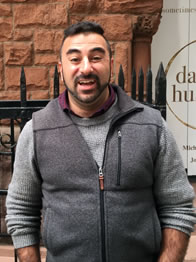 Sticking with matters of class consciousness, Simonetti next takes me to The Players, a highbrow social club for theater artists ($1,500 initiation fee and $2,150 annual dues) founded by Edwin Booth in 1888. Original incorporators included Mark Twain and William Tecumseh Sherman. No, Simonetti is not a member, and we don't go inside, but being in this tony neighborhood makes me realize how much wealth an internationally famous Shakespeare actor could accumulate in the 19th century. Across the street is Gramercy Park, a private park for the neighborhood (residents have keys for the gates), within which stands a statue of Edwin Booth. These Booth landmarks prompt another of Simonetti's entertaining anecdotes about an actor's life in New York City. One of his theater tours included an avid theater fan we'll call Peg from South Carolina. Wearing a Broadway pin, she told him, “Oh, Tommy, I love theater, I adore theater, I just think theater is the best thing in the world, I go all of the time, I've seen Mama Mia! I've seen Jersey Boys,” which Simonetti delivers in a single-sentence rant. As the tour group turned the corner on which the Booth Theatre stands, Peg looked up at the marquee and grabbed Simonetti, “scaring the s*** out of me,” he says. “Oh my Lord,” he quotes Peg, “they named a theater after him.” Simonetti had to explain it was not named for John Wilkes Booth but his brother, a piece of theater history the woman did not know. Simonetti fully fleshes out both characters in this account, Peg and the flabbergasted "Tommy," reminding me that he's an actor as well as a director.
Sticking with matters of class consciousness, Simonetti next takes me to The Players, a highbrow social club for theater artists ($1,500 initiation fee and $2,150 annual dues) founded by Edwin Booth in 1888. Original incorporators included Mark Twain and William Tecumseh Sherman. No, Simonetti is not a member, and we don't go inside, but being in this tony neighborhood makes me realize how much wealth an internationally famous Shakespeare actor could accumulate in the 19th century. Across the street is Gramercy Park, a private park for the neighborhood (residents have keys for the gates), within which stands a statue of Edwin Booth. These Booth landmarks prompt another of Simonetti's entertaining anecdotes about an actor's life in New York City. One of his theater tours included an avid theater fan we'll call Peg from South Carolina. Wearing a Broadway pin, she told him, “Oh, Tommy, I love theater, I adore theater, I just think theater is the best thing in the world, I go all of the time, I've seen Mama Mia! I've seen Jersey Boys,” which Simonetti delivers in a single-sentence rant. As the tour group turned the corner on which the Booth Theatre stands, Peg looked up at the marquee and grabbed Simonetti, “scaring the s*** out of me,” he says. “Oh my Lord,” he quotes Peg, “they named a theater after him.” Simonetti had to explain it was not named for John Wilkes Booth but his brother, a piece of theater history the woman did not know. Simonetti fully fleshes out both characters in this account, Peg and the flabbergasted "Tommy," reminding me that he's an actor as well as a director.
The Pegs of this land, of course, are integral to the New York theater scene; some might say more so than Shakespeare. The Pegs, though, don't tend to experience pressing a button by the door to gain access to a rowhouse, walking up three flights of creaking stairs because they look safer than the elevator, passing down a dingy hallway, checking in at a desk to pick up tickets and learn the single lavatory is back down the hall and around a corner, and taking one of 30 seats in a studio theater which will soon be packed for a production of Romeo and Juliet.
Simonetti and I end our day at Kodama Sushi on 45th Street. We are so hungry we each order the equivalent of two meals. Since our cab ride this morning, we've covered four miles in four hours but did so by zigzagging across 12 avenues 51 blocks up Manhattan. “I always say you have to walk New York,” Simonetti says. “You can't do it on a bus. You need to feel the energy from those streets.” And from a Shakespearean actor, too.
Henry V, Faction of Fools Theatre Company
Elstad Auditorium, Gallaudet University,
Washington, D.C., November 2
For the last stop on the Shakespeare Canon Project, we have to go back to the beginning.
November 17, 2017, Sarah had just signed off on my undertaking this venture, with the key advice that I do it all in 2018. Because I intended to cover a variety of production styles, I emailed Paul Reisman, artistic director of Faction of Fools, a Washington, D.C., theater company specializing in commedia dell'arte. He replied that he was considering a Shakespeare play for the company's 10th anniversary season beginning in the fall. He revealed the title with a request for strict secrecy as, he said, he hadn't confirmed the schedule yet. Almost a year later, I'm concluding the Shakespeare Canon Project with his commedia dell'arte version of William Shakespeare's Henry V, and Reisman tells me that my inquiry sealed his decision to do the play.
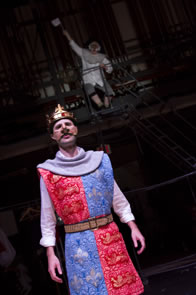
Harfleur's Governor (Hannah D. Sweet), waving a white flag on the ladder in the background) surrenders to King Henry (Kiernan McGowan) in Faction of Fools' commedia dell'arte production of William Shakespeare's Henry V. Photograph by C. Stanley Photography, Faction of Fools.
Everywhere I've gone this year, theater folks have excitedly inquired about where I'm seeing what for the Canon Project. Eyebrows would spike on four choices: Romeo and Juliet: Choose Your Own Ending in a Connecticut bar, Titus Andronicus by puppets in Saskatoon, Henry VIII in Davenport, Iowa, and ending with a commedia dell'arte Henry V. The last always prompted the same response: “That's interesting.” The tone of that response, though, ranged from excited intrigue to puzzled wariness. Finally seeing the production tonight, the key discovery for me comes not from its commedia dell'arte structure but in how this Henry V incorporates American Sign Language into the play. I wasn't expecting that.
The fact is, Faction of Fools long ago convinced me how aptly Shakespeare fits the commedia theatrical form and its hyperphysical performing style, its slapsticks (the device), its slapstick (the knockabout humor), and its masks, postures, and gestures assigned to specific archetype characters: Zanni, the lower-class clown; Brighella, the shrewd and greedy Zanni; Pantalone, the old wealthy man; Il Dottore, the long-winded patriarch or academic; Il Capitano, the soldier-like braggart; La Signora, the randy female; Innamorati, the young lover; Arlecchino, the clever servant; Colombina, the perky maid; and Pierrot, the sad servant. Commedia traces back to early 16th century Italy, where troupes toured the country, putting on shows with a few costumes, props, and masks. Actors could play several parts merely by changing masks and outerwear while their go-to formula of archetypal character behaviors and set-piece gags precluded scripts; they just improvised off plot summaries. Commedia dell'arte reached London by the 1560s, and Shakespeare most likely was exposed to it. His earliest plays, particularly The Taming of the Shrew and The Two Gentlemen of Verona, use commedia's stock characters and gags.
Faction of Fools first forayed into Shakespeare in 2012 with Romeo and Juliet, using a cast of five and a set comprising a trunk that could be transfigured into other props. The play may not be commedia dell'arte, per se, but the stock characters are there. The moment that opened my eyes to this side of Shakespeare was the “oh woe” scene after Juliet's fake death, which fits a standard commedia gag of excessive grief. Friar Laurence's reaction to the grieving, "Peace, ho, for shame!" indicates how excessive everybody else is behaving on stage. He and the audience alone know the truth, and therein resides the scene's comic potential. Faction of Fools continued its Shakespeare track with a production of Hamlecchino, Clown Prince of Denmark, and then one of the company's biggest hits, Titus Andronicus. The all-white set, costumes, and masks ended up bearing a distinctively pink hue by the end of each show, the first two rows were decreed a blood squirt zone, and a picnic scene during intermission had the one-handed Titus and no-handed Lavinia trying to manage a jar of candy, a banana, and a lobster in the shell. The play had us laughing ‘till we cried, but it also had us holding back empathy-induced tears by the end.
Faction of Fools' crowning Shakespeare achievement was The Merchant of Venice in 2016, using commedia's stereotype performances to unshackle the play of its reputed stereotypes. It also rendered the absolute best Portia I've seen, an Innamorati at Belmont but an Il Capitano when disguised as a young man for the trial scene. Why? Because in Shakespeare's script she tells us she'll behave that way, yet I don't recall seeing any other Portia pick up on that character direction. (I must mention, too, that Faction of Fools' 2015 production of Our Town, perfectly melding commedia's conventions and conscience to Thornton Wilder's metatheatre format and themes, is one of the most profound theater experiences I've ever had, its life lessons directly influencing my navigation of the Canon Project in the wake of Sarah's health crisis.) Portia's portrayal in that Merchant is a key clue to Faction of Fools' approach to Shakespeare (and Wilder and Chekhov, as well): the text drives the commedia tropes.
For the Reisman-helmed Henry V, the 50-seat theater occupies the Elstad Auditorium stage on Gallaudet University's campus. The closed curtain is on our left as the naked back-stage elements surround us (entering, we walk a path through various stashed props and scenery panels). The company regularly performs in the auditorium and a studio theater at the back of the building; using the stage itself as the theater is a thematic choice for this play as the six actors in working rehearsal clothes enter and, after being startled to see us sitting there, begin speaking Chorus's opening lines, “O, for a muse of fire.” The speech, apologetic in nature, describes the commedia playing format: a troupe of actors using masks, hats, and cloaks (all available on racks and in a prop cabinet on the stage) will combine with our imagination to create an epic play. And the first scene in that epic? The archbishop's Salic Law speech, a classic long-winded Il Dottore gag.
Character-wise, Henry V is a commedia dell'arte dream. It has three groups of Il Capitanos (the English lords, the French lords, and the English captains), a group of Zanis led by a Brighella (Pistol, played by Ben Lauer, and the Eastcheap gang), a Pantalone (French King Charles VI, played by Jesse Terrill), a Pierrot (Montjoy, played by Casey Johnson-Pasqua), and a surprising Signora in Queen Isabel (Hannah D. Sweet) hitting on Henry in the last scene. Henry himself (Kiernan McGowan) and the Page (Sweet) are not easily defined in the commedia tradition. Instead, I learn via interviews on this visit that the two roles are transitional commedia characters belonging to what has become known in Faction of Fools parlance as the Eric Minton category (the company formulating this concept from my reviews of their work, which is humbling and frightening to discover). The Page is a Zanni moving toward Arlecchino while Henry combines Il Capitano and Innamorati.
The bottom line is to be entertaining, and this production is wonderfully so. I marvel at the wide variety of characters each actor plays. Because of the masks and cloaks, I have to look at their legs and the pants or leggings they're wearing to determine who is playing this or that part. Henry's famous speeches become more like soliloquies (“Once more unto the breach” gives the rest of the cast a first chance to get offstage for a few gulps of water), each speech serving as a stepping stone as the former Prince Hal molds his royal self. The production does spring one key theme on our 2018 sensitivities: The victorious British army comprises the breadth of that country's nationalities and socio-economic strata whereas the French are elite nativists. Julie Weir plays Gower as an Il Capitano with exaggerated stoicism, but this established seriousness lands with great poignancy when Gower tells Pistol, who has just been beaten by the Welsh Captain Fluellen (Terrill), “You thought because he could not speak English in the native garb, he could not therefore handle an English cudgel: you find it otherwise.”
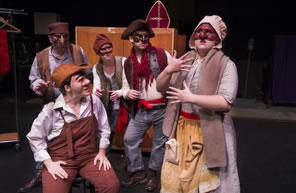
Mistress Quickly (Casey Johnson-Pasqua, right) uses sign language to describe the dying John Falstaff to the Page (Hannah D. Sweet) and, from left to right in the back, Bardolph (Jesse Terrill), Nym (Julie Weir), and Pistol (Ben Lauer) in Faction of Fools production of William Shakespeare's Henry V. Photo by C. Stanley Photography, Faction of Fools.
The thought behind that line, by the way, could also apply to those who don't speak with any tongue. Gallaudet is a university for Deaf and hard-of-hearing students, and Faction of Fools includes Gallaudet theater students as interns. Unlike other Shakespeare companies that cast Deaf actors in unobtrusive secondary roles, Faction of Fools gives its Deaf interns key parts, blending sign language into their performances while other characters interpret. Johnson-Pasque, who graduated from Gallaudet in the spring and is making her second Faction of Fools appearance (she was in The Cherry Orchard earlier this year), plays Montjoy, Mistress Quickly, the traitor Thomas Grey, the soldier Bates, and Alice, who must teach English to the French Princess Katherine (Weir). “La main [hand],” inquires Katherine, and Alice hands her a lemon—a lip-reading joke. The scene ends with Alice totally clueless as to why Katherine is so consternated by “le foot et le coun,” adding another layer to Shakespeare's raunchy pun. In my interview with Johnson-Pasque before the show, she describes the challenges of learning Shakespeare in American Sign Language and learning the physical performance style of commedia on top of that. She played Helena in a high school production of A Midsummer Night's Dream, and as the only nonhearing person in that production, she felt like an isolated outsider whereas Faction of Fools integrated her into the creative process. Her comment, though, gets me thinking of the thematic possibilities of a Deaf Helena.
I've seen such thematic use of a Deaf actor in the title role of Richard III (his deafness was his disability rather than a hump). The director of that NextStop Theatre Company production in Herndon, Virginia, was Lindsey D. Snyder, director of access for Faction of Fools and my first interview this afternoon. She turns out to be one of the stars in tonight's Henry V, too, though you won't see her name in the cast list. Snyder earned her doctorate in theater and performance studies from the University of Maryland in 2009 with a dissertation she titled Sawing the Air Thus on American Sign Language translations of Shakespeare. She's developed an ongoing thesis that sign language interpreters should not be relegated to a spotlighted corner of the stage but integrated into a production. Which she does in tonight's performance. She's not at the center of the action or shadowing speaking characters, but she remains within the action's periphery and sometimes becomes part of the scene. She waves bye-bye to Montjoy running away from Henry's anger, and she is a passenger in the mimed boat crossing the channel (and signs “vomiting” on Chorus's line “We'll not offend one stomach with our play”). As Henry threatens the citizens of Harfleur, Snyder motions a graphic image of “infants spitted on pikes,” eliciting vocal shudders from Henry's army watching her. Nevertheless, she is less distracting than would be an interpreter off to the side earnestly speaking to a select few people in the audience who are watching the signing instead of the play (as the rest of us often do, too). Snyder makes herself, her interpretation, and her targeted audience part of Shakespeare's environment.
That's the capping lesson of my year with Shakespeare across this continent: His environment encompasses us all.
Sunday, November 11—Numb and Numbers
The end has arrived, and with it, one last confluence of events so fitting to the conclusion of my quest, the Shakespeare Canon Project: 42 plays, 42 theaters, one year.
My 42nd and final play and theater came last weekend with Henry V at Faction of Fools, a commedia dell'arte company based at Gallaudet University in downtown Washington, D.C. I attended three performances of the play, one with a Russian friend. I interviewed the cast at a between-shows pizza party (my third pizza party/interview session this year) as well as the costume designer and the company's director of access and American Sign Language interpreter. I started in on an interview with Artistic Director Paul Reisman, who directed Henry V, but we were cut short, necessitating my returning today. That worked out perfectly because Alisha Huber, whom I met for the first time as the director of the Much Ado About Nothing we saw at the Rose Theatre in Michigan on June 2, was staying with us for the weekend. She is one of eight theater artists I've interviewed in one location during the Canon Project and met up with again in another location later in the year. She accompanied us on this final Canon Project outing, which was cool bringing two entries on the itinerary together like that.
On the drive across suburbia and the city to the theater, the inevitable happened: Sarah had a seizure. It was her 68th seizure—that I know of—since they started happening back on March 21. Upon our arriving at the theater, Huber and Reisman moved a couch into a classroom while I guided Sarah in. She camped out in the dark room for the two hours before curtain while I finished my interview with Reisman. Sarah did join us for the play, but she was still in something of a stupor through to intermission. The inevitable is not merely that Sarah had a seizure but that the theater community provided her with care and comfort.
Thus concludes a project of which more than one actor said, "that's insane!" Here are some other numbers.
- I've seen all 42 plays that scholars, theater artists, and I believe were written at least in part by William Shakespeare, plus 24 more Shakespeare productions not counted in the Project and 10 non-Shakespeare plays.
- I visited 42 theater companies for the Project, plus attended plays at four other theaters not included in the Project.
- 24 theater companies I had never seen before.
- These theaters were located in 23 states, four provinces, and one district.
- I took 62 airline flights.
- My luggage went missing only one time, and that was my most important carry-on bag.
- I saw a total of 647 actors in the 42 Canon Project productions.
- Of these, I saw eight perform in productions at two different theater companies:
- Seth Trucks in Hamlet and Antony and Cleopatra;
- Josh Innerst in Richard II and Henry VI, Part One;
- Tim Sailer in Richard II and King John;
- Ian Blackwell Rogers in Coriolanus and Othello;
- Jessica Lefkow in Coriolanus and Henry VI, Part Three;
- Katelyn Manfre in Cymbeline and Henry VI, Part Three;
- Kiernan McGowan in Cymbeline and Henry V;
- Shaleen Cholera in The Comedy of Errors and The Two Gentlemen of Verona.
- I interviewed at least 310 actors, directors, technical crew, artistic directors, community leaders, and fans.
- My policy with Shakespeareances.com is to accept no comp tickets from theaters. For the Canon Project, I purchased a total of $6,681 in tickets (two per show, though Sarah did not join me at several) and dropped a total of $575 in buckets, bags, and skulls at free shows.
- As further support of the theaters that hosted me, I purchased the following swag:
- 15 T-shirts
- 11 posters
- 8 baseball hats
- 6 mugs
- 4 hoodies
- 3 pins
- 3 bottles of wine
- 2 sweatshirts
- 2 shopping bags
- 2 fans
- 2 wine tasting glasses
- 2 sun hats
- 2 knit stocking caps
- 1 pair of gloves
- 1 polo shirt
- 1 denim shirt
- 1 women's tanktop
- 1 fleece jacket
- 1 tie
- 1 picnic wine glass (encased)
- 1 theater cup (encased)
- 1 sweet tea jar
- 1 book
- 1 wristband
- 1 dashboard bust of Shakespeare
- 1 keychain
- 1 mini Tudor set
- 1 bandana
- 1 water bottle
- 1 bottle opener
- 1 candle
- 1 stage board.
- I've written 99 entries in this journal.
- I still have 52 reviews to write for Shakespeareances.com. I then have to finish writing a book with 42 chapters.

All the theater company swag and baseball souvenirs stacked up on our sofa (hand-built by my grandfather, by the way) during my busy year of travels. Photo by Eric Minton.
I can't put a number on the prayers, best wishes, thoughts, and encouraging words sent our way by this community. I wish I could put a number on the days when Sarah gets past her affliction, either by treatment (still waiting on the "work in progress" under the medical community's purview) or by rehabilitation (still waiting for guidance, but I'm working on my own methodology, ranging from brain exercises to a daily dose of blueberries).
Today is Veterans Day in the United States—the day I formally recognize my wife's service, though I honor her as a matter of course every day—and Armistice Day everywhere else. Reisman sees serendipity in the fact that his Henry V's run included St. Crispin's Day and Armistice Day. After we get home from the play, we say goodbye to Huber, who has a couple of hours of driving ahead of her. A weight slides off my shoulders, but a vacuum settles in my heart. I feel like a rock star coming off a 42-city tour, tired of all the travel, the crowded schedule, and being hyperfocused all the time, but elated by the thrill of the shows and the love and support I've experienced at almost every location (at only one theater did I fail to get any interviews with a member of the company). I'm ready for a break, but I already miss the communal interactions. At least I'll relive it all again while writing the reviews, transcribing the recorded interviews, and writing each chapter of the book—oy, I don't have time for a break.
I shall sign off with a simple but sincere thank you to everybody who spent time talking with me and to all of the already-overworked staffers and volunteers who went through incredible effort to coordinate my visits. Your names will be listed in the book. I can't fully express my gratitude to theaters and friends for the care and comfort Sarah received over the course of this journey, and especially for the willingness so many companies expressed to catch her if she should fall during our visits. I also must acknowledge the astounding talent I witnessed on stage, back stage, in the booths, and at the helms of productions I attended across the Shakespearean landscape of America.
Two people I need to single out, without whom this project wouldn't have been possible. First and as always foremost, Sarah, my wife, who said "yes" to the project when I broached it with her and "no" every time I suggested suspending it to focus on her health and our ever-more-precarious finances. One thing this year has reinforced is how blessed I am to have encountered this woman to ride with me on my life's passage.
And thank you William Shakespeare. He wrote all or portions of 42 plays. Many are great, all have some element of greatness in them, and each one spoke directly to me this year. People have called my undertaking audacious, heroic, and insane, but the guy who really achieved something incredible this year was Shakespeare. He had 41 of his 42 known plays produced somewhere at least once on this continent in 2018 (and most produced between five and 25 times), more than 400 years after he wrote them.
Hey, a lot of great Shakespeare is going on all over the United States and Canada, from Fairbanks, Alaska, to Miami, Florida, to San Diego, California to St. John's, Newfoundland, from shining Shakespeare by the Sea to shining Shakespeare by the Sea. It's happening in new state-of-the-art theaters and in re-created Shakespeare playhouses, in parks and in parking lots, in fellowship halls and in tents, in stockades and in barns, in city squares and on lawns, in vineyards and in taverns, at mansions and in ruins, on campuses and in libraries.
He is your Shakespeare. He's talking to you personally and to our society today. And he's just down the road from your home.
